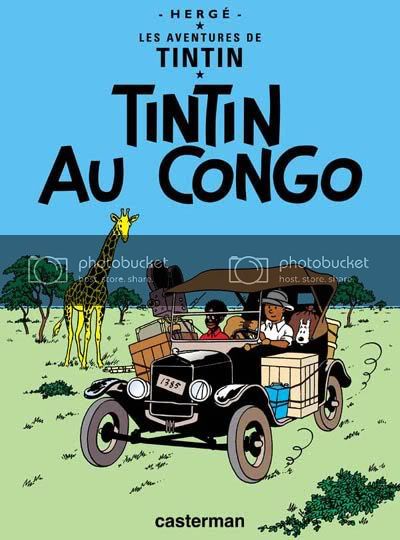In October of 2010, a Belgian couple (Josephine and Frederik) decided to spend a month driving their Landcruiser across the Democratic Republic of the Congo. That alone would be quite an adventure, but they added one extra rule to their trip:
They refused to pay any bribes.
Yeah.
Below is their story as told by them. This is a mirror of their posts on the Expedition Portal forums. The original thread is very long and contains many unsubstantiative comments from onlookers. The version below has edited those out and contains only the words and images written by the couple. All spelling and syntax errors are kept from the original posts.
Enjoy!
Congo Zaire
Featuring
Josephine:
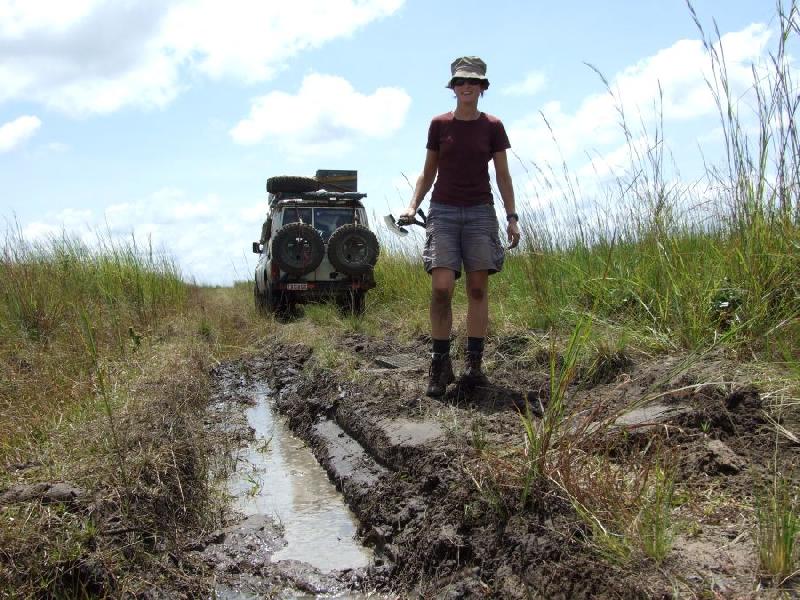
Frederik:
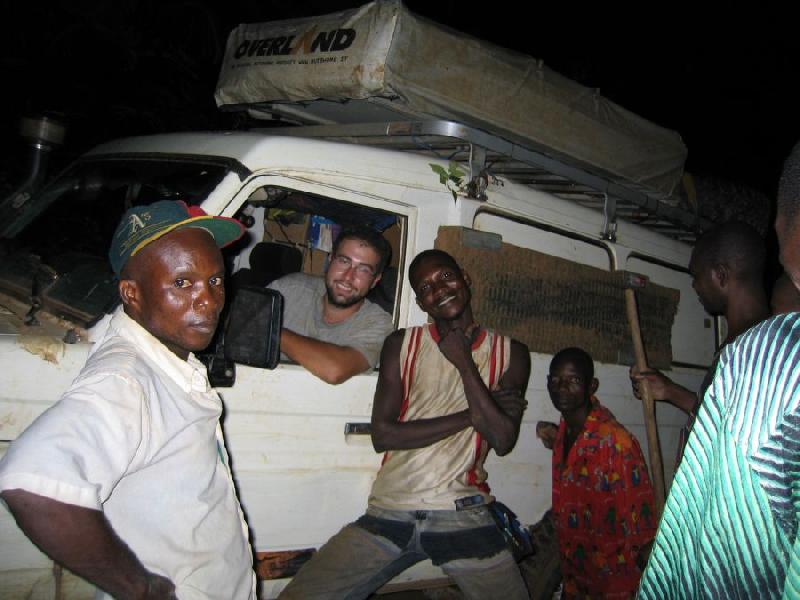
and our trusty steed:
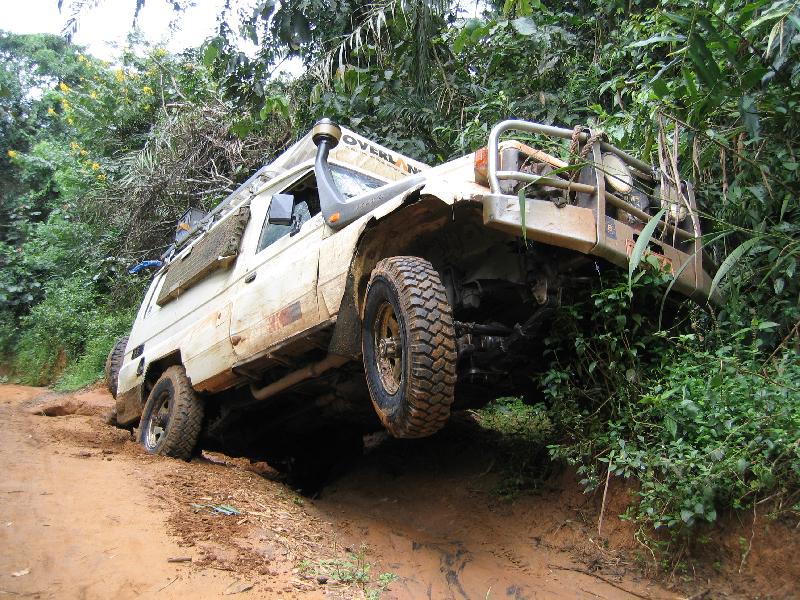 [/quote]
[/quote]
Featuring
Josephine:

Frederik:

and our trusty steed:

Map of congo. Lubumbashi in the bottom right corner. Kinshasa on the left.
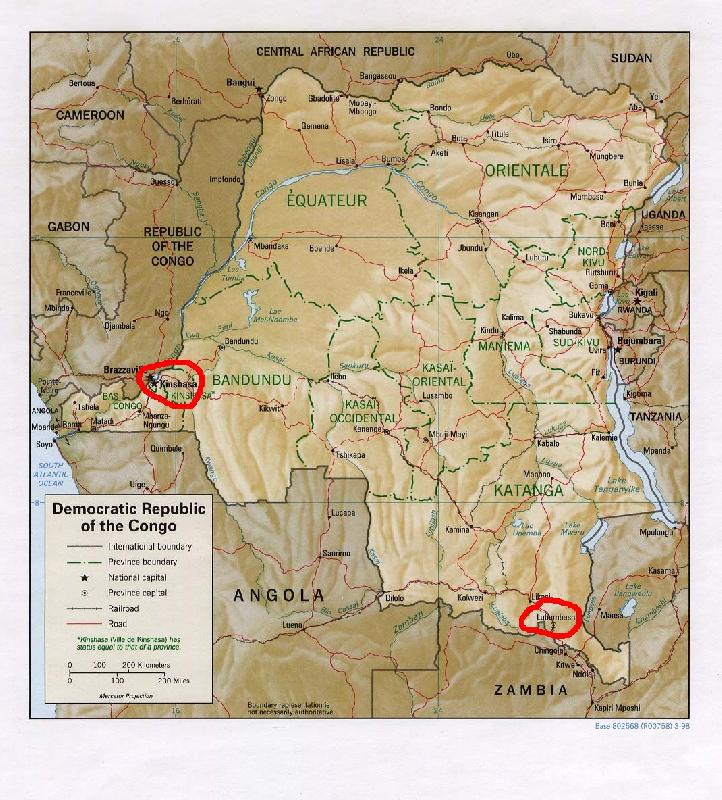
Or as depicted on our Michelin 746 map
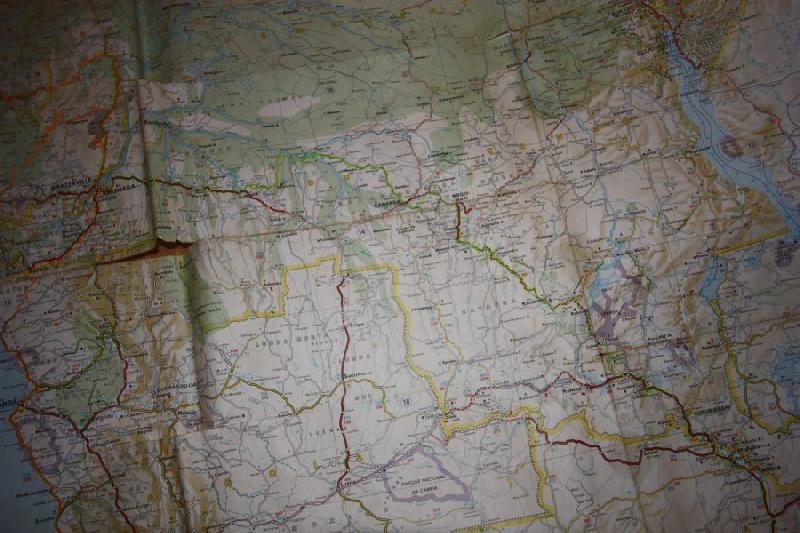
The Michelin is a pretty good map but it has a few known flaws. One of the biggest flaws is probably the "Route National 1" in DRC.. as we are soon to find out...
I will be posting this report as I write it.. please be patient ;-)

Or as depicted on our Michelin 746 map

The Michelin is a pretty good map but it has a few known flaws. One of the biggest flaws is probably the "Route National 1" in DRC.. as we are soon to find out...
I will be posting this report as I write it.. please be patient ;-)
Sorry for the delay, I had some problems logging in.
Thanks Taco & Christian for the enthousiasm
Thanks Taco & Christian for the enthousiasm
The
story starts in Pionee... No, that's not true, it actually starts 2
years earlier, but I will come back to that later. So for now let's
start this story at in Pioneer campsite just outside Lusaka where we
treat ourselves on some home made French fries (but as you all know,
French fries have got nothing to do with France, as they have been
invented by the Belgians!)
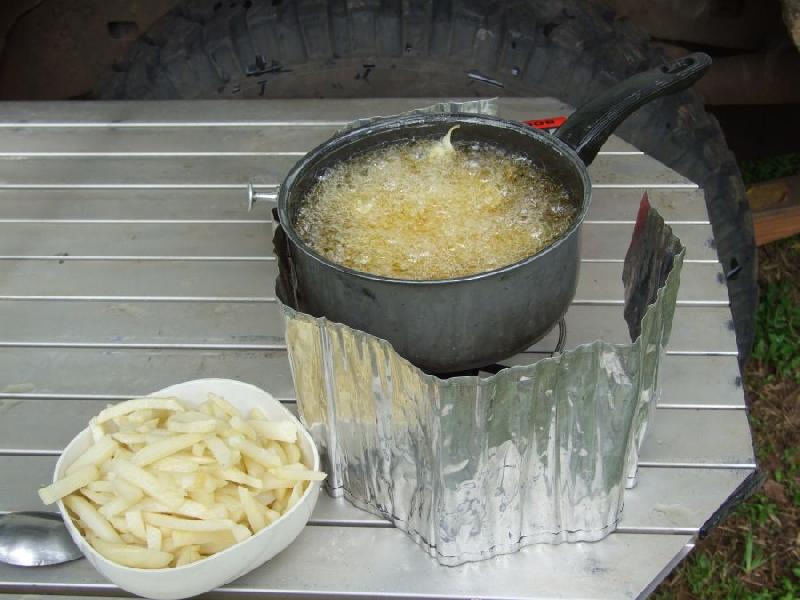
We deserved it as it had been about 600 days since we last seen set foot in our home country and we missed the food! The other reason was that we were not expecting to be eating good in the next month or two. After all we were about to go deep into the Congo (Democtratic Republic of Congo, Congo-Kinshasa or Congo-Zaire, all the same but I will refer to it simply as "Congo").
As supplies would be very hard to get we decided to stock up on supplies. I know that for South Africans it very normal to transport an entire pick&pay to your destination :twisted: but for us this was very unusual as we usually eat what we can find. But not so in this case, we bought food for an entire month. 3 meals a day. This would prove to be a very good decision
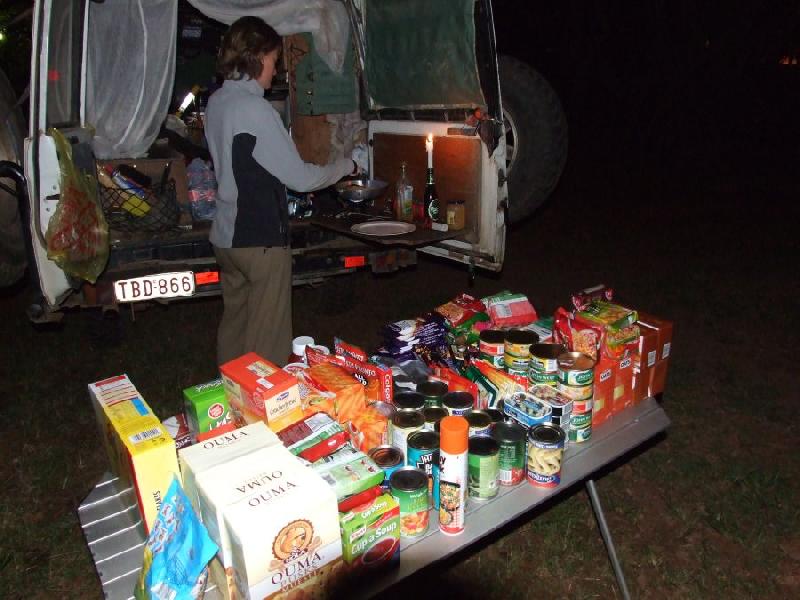
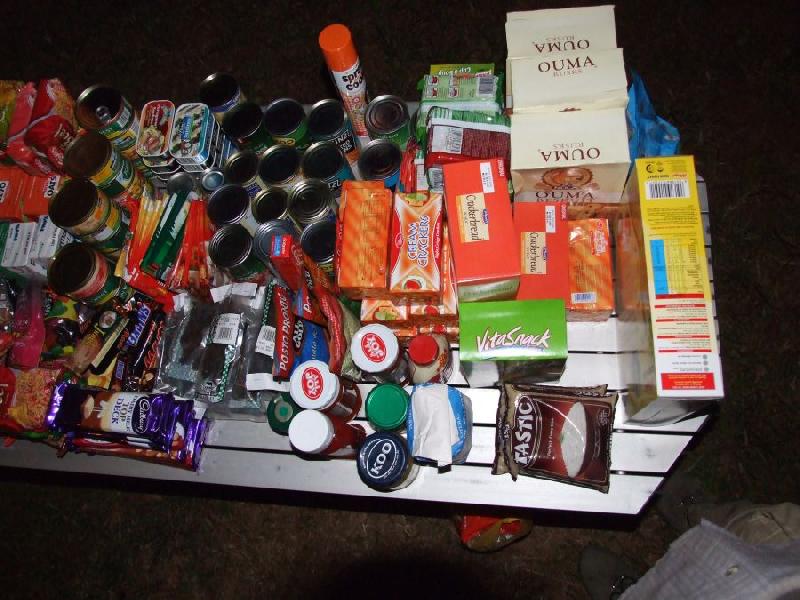
I also gave the Landcruiser a last service, everything was working pretty much as expected, so just the regular oil/filter change. I also stocked up on some good oil (diff + engine) as this would also be hard to get there.
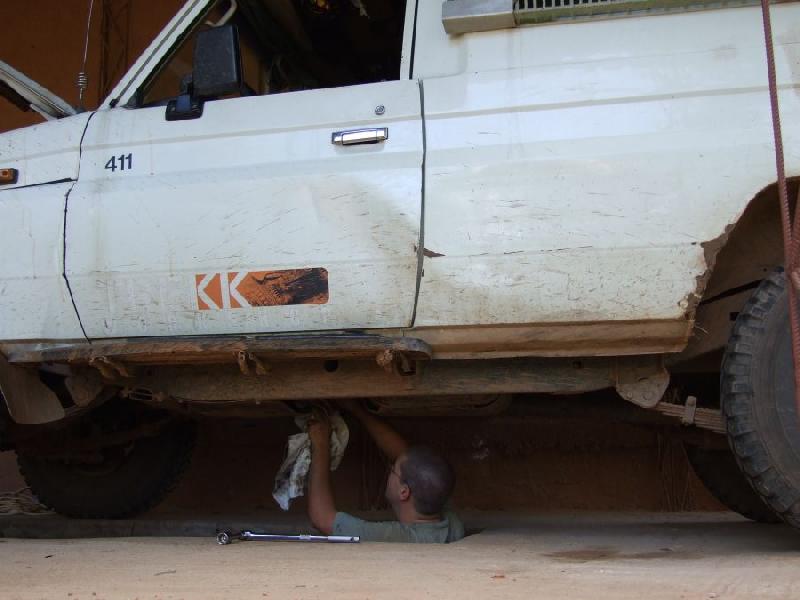
Fully loaded we left Lusaka. We always had a strange anxious/nervous feeling when entering a new country. But this time the feeling was much stronger. Was this the first time we were actualy nervous for entering a country?

We deserved it as it had been about 600 days since we last seen set foot in our home country and we missed the food! The other reason was that we were not expecting to be eating good in the next month or two. After all we were about to go deep into the Congo (Democtratic Republic of Congo, Congo-Kinshasa or Congo-Zaire, all the same but I will refer to it simply as "Congo").
As supplies would be very hard to get we decided to stock up on supplies. I know that for South Africans it very normal to transport an entire pick&pay to your destination :twisted: but for us this was very unusual as we usually eat what we can find. But not so in this case, we bought food for an entire month. 3 meals a day. This would prove to be a very good decision


I also gave the Landcruiser a last service, everything was working pretty much as expected, so just the regular oil/filter change. I also stocked up on some good oil (diff + engine) as this would also be hard to get there.

Fully loaded we left Lusaka. We always had a strange anxious/nervous feeling when entering a new country. But this time the feeling was much stronger. Was this the first time we were actualy nervous for entering a country?
The border at Kasumbalesa was
the usual chaotic affair. Especially the Zambian side proved to be an
annoying experience. Many pushy touts and very crowded. The Congolese
side on the other hand had very little touts. It was chaotic too, but
much smoother then their neighbours.
We were warned about the "5$ dollar first entry" bribe at the Congolese side.
This conversation was in French ofcourse:
Customs Officer: "Hi, that'll be 5$US"
- Me: "Ofcourse,but what is it for exactly?"
CO: "Tourist tax"
- Me: "Oh, I was not aware of the existance of a tourist tax?"
CO: "Yes, but only on the first entry"
- Me: "Aaaah, ofcourse how could I forget. I already paid this when I entered at by boat in Kinshasa a few months ago" <-- I lied, there is no such tax and I never paid such tax. But I did have the proof of my previous entry in Congo in my passport
Co: *long silence*
Co: *hesitating* "You still have to pay..."
He lost, I won. He knew it but he would not give in ofcourse. I sat there for another 10 minutes before I was let go without any further words. This went smoothyl... very smoothly! I was starting to think that all these corruption stories about Congo were overrated. Little did I know at that time...
We actually bougt insurance at the border. Not that we believe that it would be of any use in case of an accident. But just to avoid the bribes associated with not having any insurance.
Next obstacle was the road tax for the short distance between the border and Lubumbashi. 50US$ for foreigners! I waited until a lorry was waiting at the barrier and then just drove past it and floored it. 50$ in the pocket
We are normally very principle about official (!!!) taxes, we just pay them as they usually benefit the roads, etc.. . In this case it is known that all of the money for this road toll goes directly to Kinsahsa. Nothing ever returns to the maintenance of these roads, or anything remotely related to the province it is in. It shows:
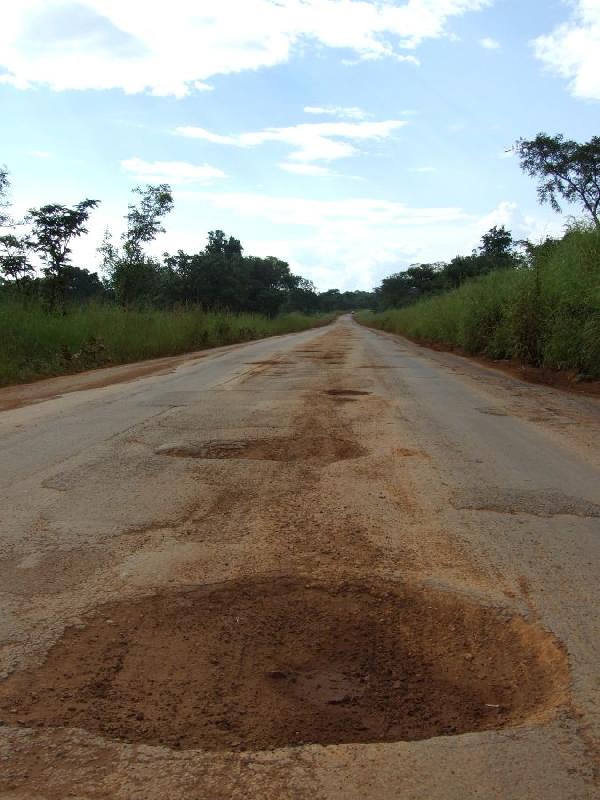
We were warned about the "5$ dollar first entry" bribe at the Congolese side.
This conversation was in French ofcourse:
Customs Officer: "Hi, that'll be 5$US"
- Me: "Ofcourse,but what is it for exactly?"
CO: "Tourist tax"
- Me: "Oh, I was not aware of the existance of a tourist tax?"
CO: "Yes, but only on the first entry"
- Me: "Aaaah, ofcourse how could I forget. I already paid this when I entered at by boat in Kinshasa a few months ago" <-- I lied, there is no such tax and I never paid such tax. But I did have the proof of my previous entry in Congo in my passport
Co: *long silence*
Co: *hesitating* "You still have to pay..."
He lost, I won. He knew it but he would not give in ofcourse. I sat there for another 10 minutes before I was let go without any further words. This went smoothyl... very smoothly! I was starting to think that all these corruption stories about Congo were overrated. Little did I know at that time...
We actually bougt insurance at the border. Not that we believe that it would be of any use in case of an accident. But just to avoid the bribes associated with not having any insurance.
Next obstacle was the road tax for the short distance between the border and Lubumbashi. 50US$ for foreigners! I waited until a lorry was waiting at the barrier and then just drove past it and floored it. 50$ in the pocket
We are normally very principle about official (!!!) taxes, we just pay them as they usually benefit the roads, etc.. . In this case it is known that all of the money for this road toll goes directly to Kinsahsa. Nothing ever returns to the maintenance of these roads, or anything remotely related to the province it is in. It shows:

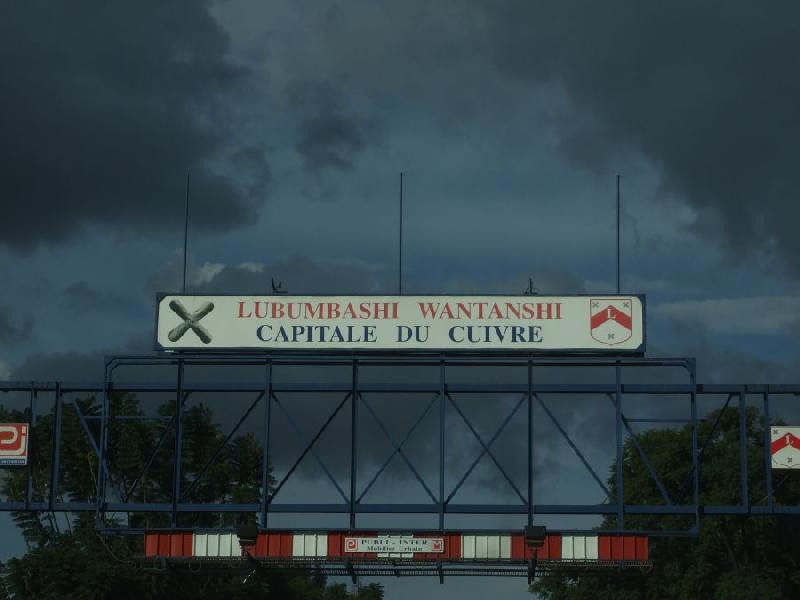
We arrived in Lubumbashi - "Capital du cuivre" (Capital of Copper) and were instantly stopped by the police. Checked all papers, checked vehicle, asked for "Un jus" (cold drink). Very pushy and aggressive. We got rid of them but two blocks further we got stopped again. Same story. This was getting tiring!
We just stopped stopping altogether after a while. It was obvious that our white skin and strange number plates attracted a lot of unwanted attention!
At the border we had been lucky to bump into a Belgian lady. She was living in Lubumbashi together with Soeur Bernadette, a Congolese "Maman" (literally translated = mother). She invited us to stay at her place.
They lived in a lovely little villa called "Bonne Esperance". They take of orphans and constantly have 3 or 4 children living in the house. There was no room in the house, but we could stay in our rtt in the driveway. They were wonderful people, we really enjoyed staying there.
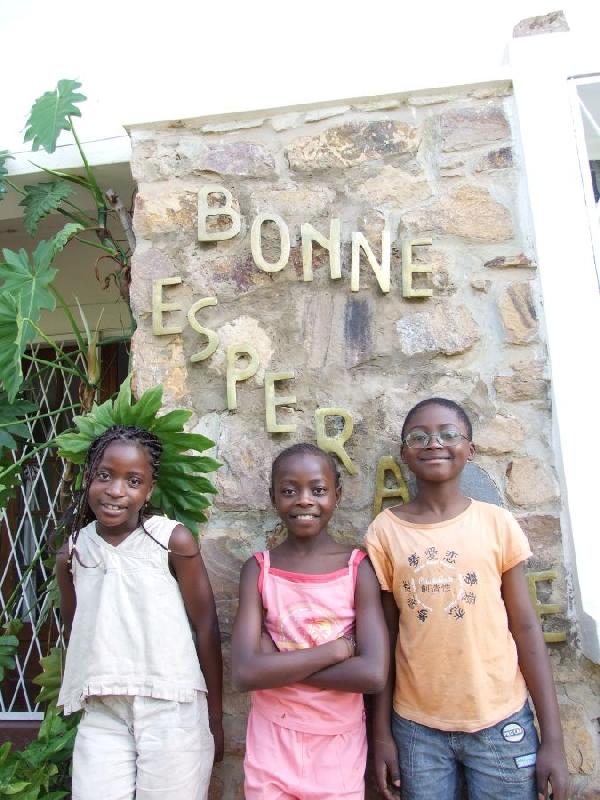
They also had no electricity when we where there. When we inquired about this (after all, this was central Lubumbashi) we were told about the odd system in Lubumbashi. Because the electricy factory is in such a bad state it cannot cope with the demand. Therefore there is always one area that gets no electricity. They change the area every week or so.
The next few days we spent in Lubumbashi arranging all sorts of things. Money, Permits, information, ... The word went round quickly that Belgian tourists had arrived and our network of contact grew by the minute. Soon we were welcome guests in the Belgian Consulate and we moved to another house of Belgians working in Lubumbashi. They worked for CTB, the Belgian aid organisation. These contacts would prove extremely valuable during our trip.
We also got in touch with the director of the big coper mine in Lubumbashi and were invited for a tour of the factory
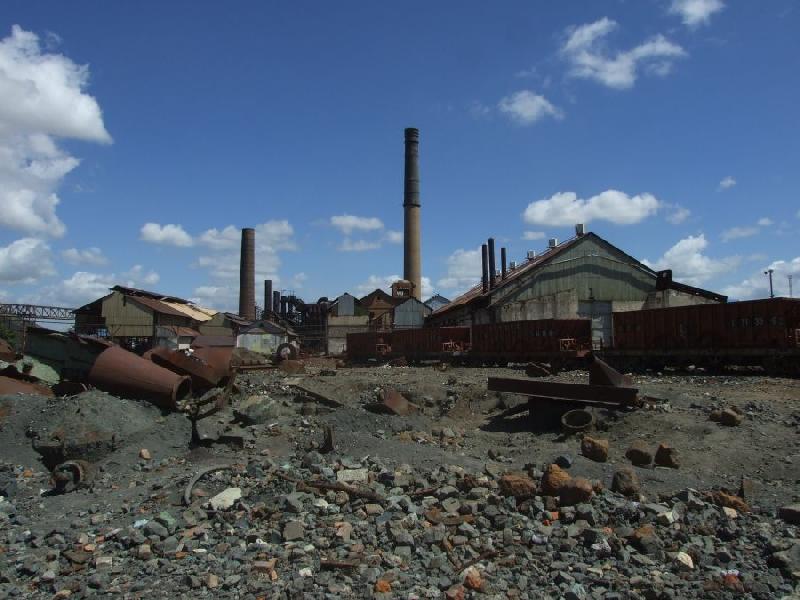
Congo must be one of the richest countries in the world. They could have been the Dubai of Africa with what they have in the ground. Ever since their independance the biggest mining company in Congo is Gécamines. Once a hugely profitable company it is now only a shadow of its former self. Years of corruption and mismanagement have left Gécamines in a state of defacto bankrupt. All their mines are nothing more but ruins.
Info about Gécamines: http://en.wikipedia.org/wiki/Gécamines
The ruins of these mines are now home to many "creuseurs". Usually young children who are digging in the remains of the mines for whatever is left. They work long days and have to give most of their profit to organised gangs.
The mine in Lubumbashi also has a huge pile of mining waste. The pile is actually still so rich in cobalt and copper that a foreign company (Forest) is running a production factory.
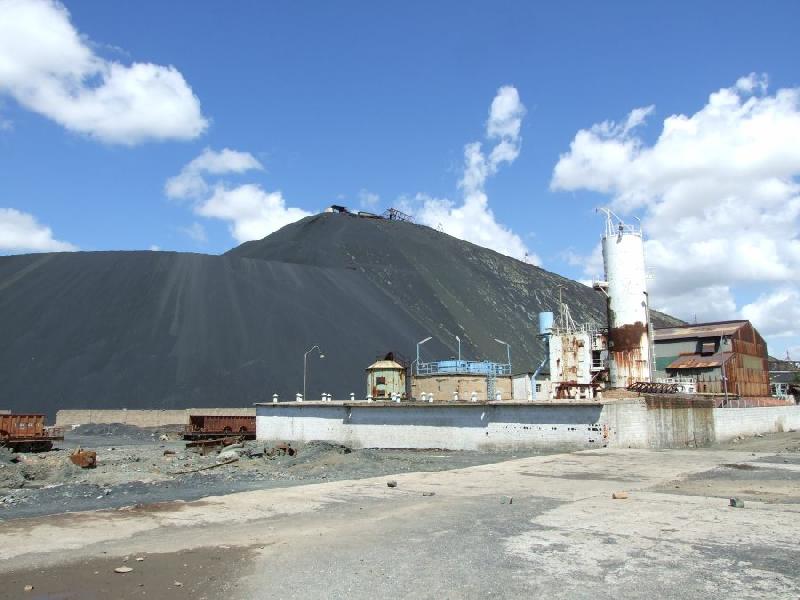
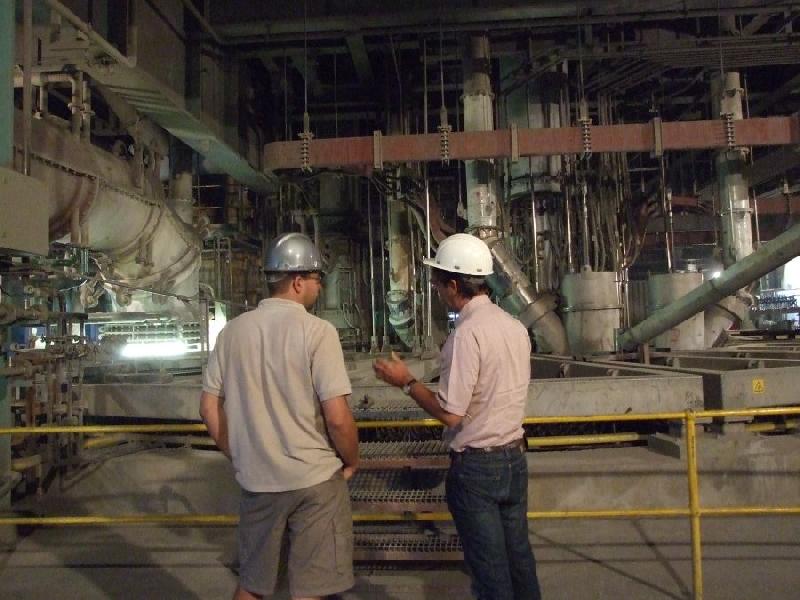
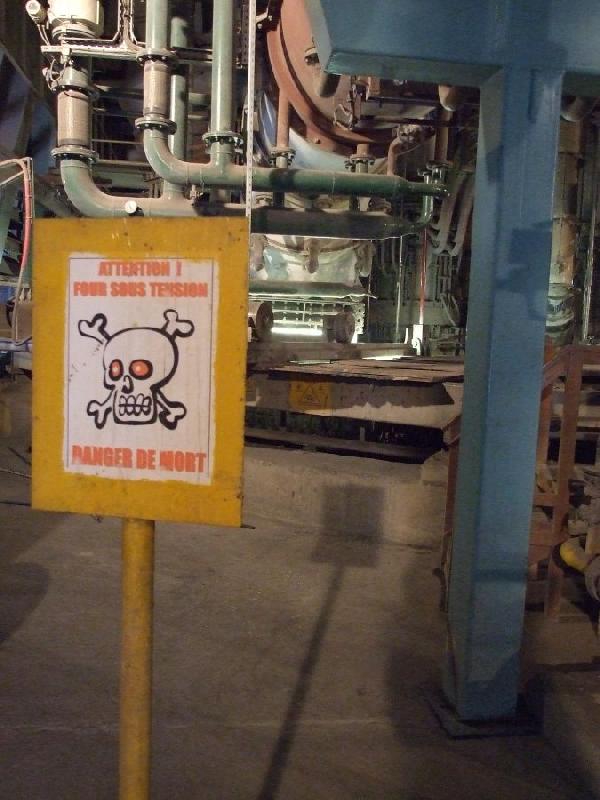
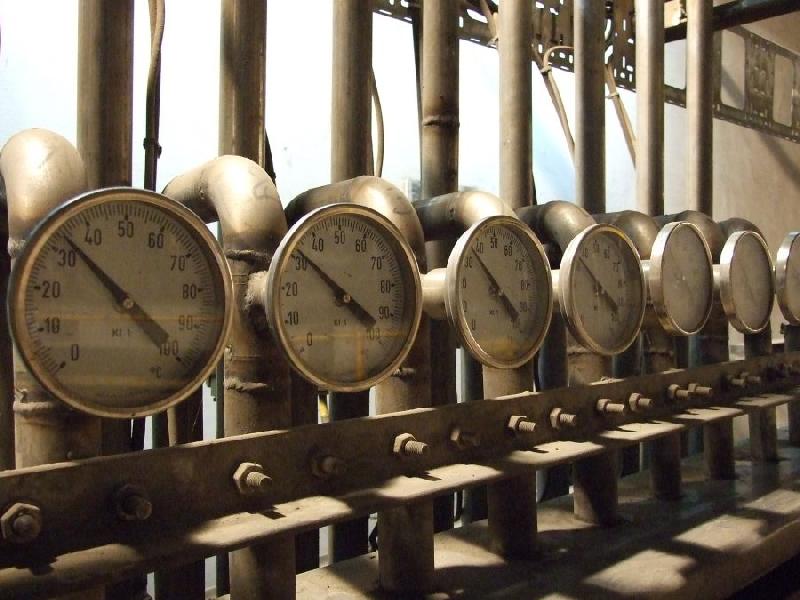
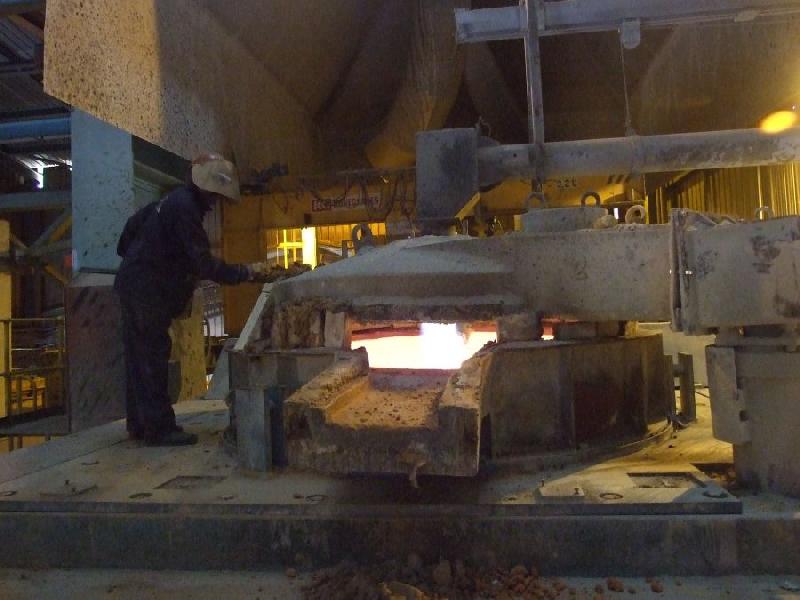
And ofcourse the company car of the director was..
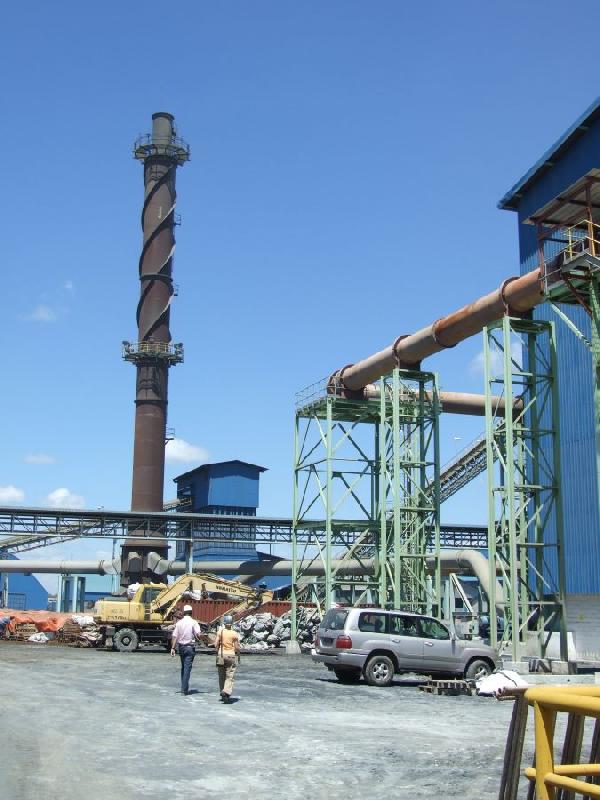
A major showstopper for our trip was a Permit to travel trough Congo.
Nobody really know what kind of permit one needs, let alone where to apply for it. But everybody agrees that a permit is required. Officially it has got something to do with the many mining areas to be crossed. We contacted the few people who have attempted travelling trough congo but they too never managed to get hold of the permit. One of these guys did get arrested and deported because he could not provide a permit.
Our Belgian Consulate really tried hard to get this stupid little piece of paper for us, but to no avail. They even managed to get us invited with the governer of Katanga, but he too could not give it to us. After many days of trying we asked the consulate to give us some sort of official looking letter with an official looking stamp. We would chance it without the permit!
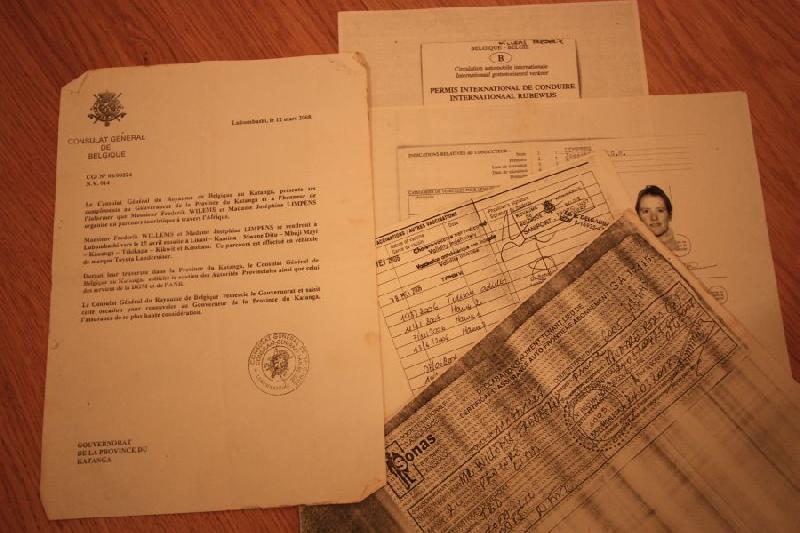
The permit is on the right. It has no real value, it basicly says no more then "There are tourist from Belgium and they are travelling trough congo, please assist them in their travels". But then in official speak.
On the left are copies of all sorts of other official documents. We had aout 30 copies of all of these.
This is our DRC visa:
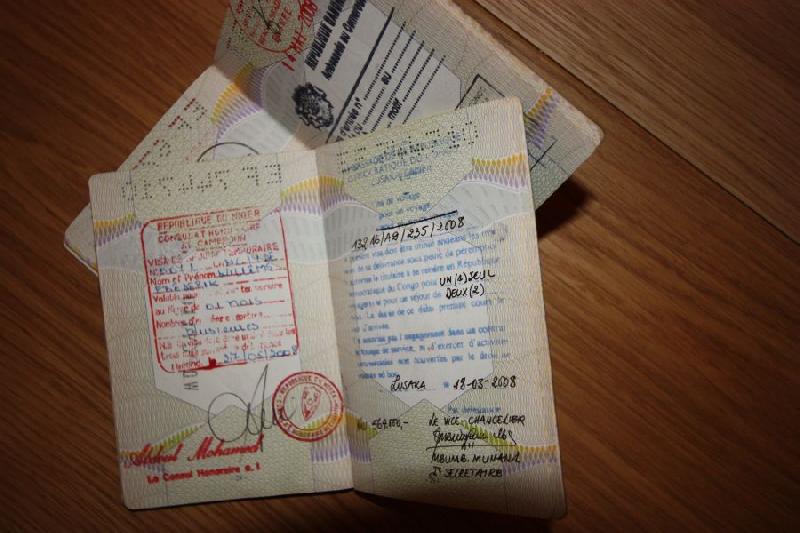
It's time to hit the road!
Nobody really know what kind of permit one needs, let alone where to apply for it. But everybody agrees that a permit is required. Officially it has got something to do with the many mining areas to be crossed. We contacted the few people who have attempted travelling trough congo but they too never managed to get hold of the permit. One of these guys did get arrested and deported because he could not provide a permit.
Our Belgian Consulate really tried hard to get this stupid little piece of paper for us, but to no avail. They even managed to get us invited with the governer of Katanga, but he too could not give it to us. After many days of trying we asked the consulate to give us some sort of official looking letter with an official looking stamp. We would chance it without the permit!

The permit is on the right. It has no real value, it basicly says no more then "There are tourist from Belgium and they are travelling trough congo, please assist them in their travels". But then in official speak.
On the left are copies of all sorts of other official documents. We had aout 30 copies of all of these.
This is our DRC visa:

It's time to hit the road!
After leaving
Lubumbashi one quickly arrives at yet another toll booth. 50$US again
(!) for a short piece of horribly potholed tarmac. This time I stop the
car a long end before the booth and walk to get my ticket. There is a
big "queue" (read: a pile of people). I just stuck my arm trough the
window without letting them see myself and give the equivalent amount
for locals (1$US). They give me back a receipt and presto. Another 49$
saved!
The road starts out good
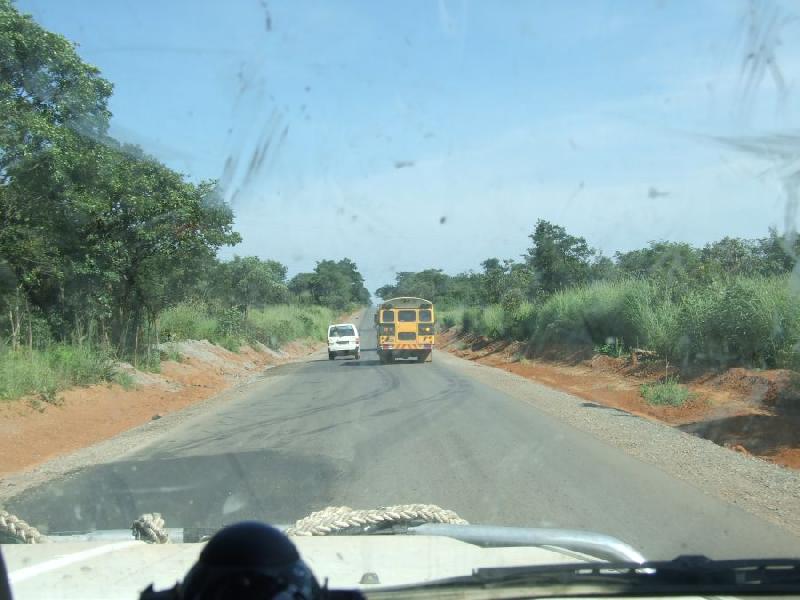
But the asphalt soon stops and makes way for a graded dirt road. It is in pretty good condition.
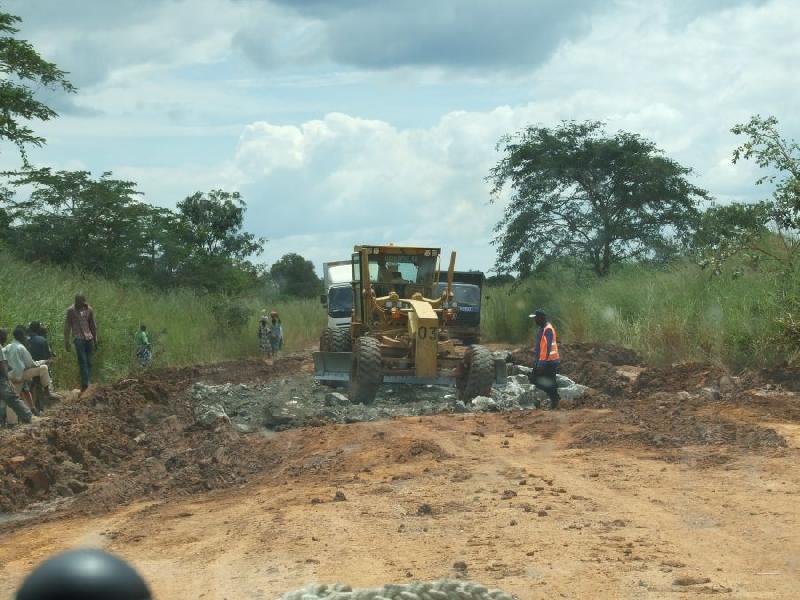
We make good progress until we hit the end of a traffic jam. A seemingly endless series of big lorries stand still on the entire width of the road. We stop and are greeted with demands for "cadeaux", "un jus", etc... Mind you, these are not officials, they are just the truckdrivers.
Josephine stays in the car while I walk to the front of the queue (a kilomter or so). In the valley there is a huge mud pit that just about swallowed an articulated lorry. This obviously happened quite some time ago. Next to it is another lorry stuck, leaning dangerously. Next to that one is yet another stuck lorry. And another, ... There are 5 lorries next to eachother. All stuck. This is now blocking the entire road. 20 man are digging away but when they see me they instantly stop and start shouting at me
"Hé le Blanc!"
"Mundele!' = mzungu
"Le Blanc, Il va payer!" = The white guy, he is going to pay (if I want to pass)
"Donner moi de l'argent" = Give me money
There were about a 100 people on the side of road watching the spectacle and they started laughing at me and shouting all sorts of nasty things.
This entire situation felt very treatening and I just wanted to get out of there as quickly as possible. While walking back to Josephine some more friendly people talked to me. Apparantly they had been there for 4 days now without any movement. But they said small 4x4's could get past.
Not without hesitation we started negotiating our way trough the parked trucks and around the mudpit. You could see that the crowd was just waiting for us to get stuck.
Fortunately we got trough.
Sorry, no pictures of this mess. The enviroment was just to hostile to start flashing expensive cameras.
The road starts out good

But the asphalt soon stops and makes way for a graded dirt road. It is in pretty good condition.

We make good progress until we hit the end of a traffic jam. A seemingly endless series of big lorries stand still on the entire width of the road. We stop and are greeted with demands for "cadeaux", "un jus", etc... Mind you, these are not officials, they are just the truckdrivers.
Josephine stays in the car while I walk to the front of the queue (a kilomter or so). In the valley there is a huge mud pit that just about swallowed an articulated lorry. This obviously happened quite some time ago. Next to it is another lorry stuck, leaning dangerously. Next to that one is yet another stuck lorry. And another, ... There are 5 lorries next to eachother. All stuck. This is now blocking the entire road. 20 man are digging away but when they see me they instantly stop and start shouting at me
"Hé le Blanc!"
"Mundele!' = mzungu
"Le Blanc, Il va payer!" = The white guy, he is going to pay (if I want to pass)
"Donner moi de l'argent" = Give me money
There were about a 100 people on the side of road watching the spectacle and they started laughing at me and shouting all sorts of nasty things.
This entire situation felt very treatening and I just wanted to get out of there as quickly as possible. While walking back to Josephine some more friendly people talked to me. Apparantly they had been there for 4 days now without any movement. But they said small 4x4's could get past.
Not without hesitation we started negotiating our way trough the parked trucks and around the mudpit. You could see that the crowd was just waiting for us to get stuck.
Fortunately we got trough.
Sorry, no pictures of this mess. The enviroment was just to hostile to start flashing expensive cameras.
When
we continued on the same road we would pass other smaller mudpits.
These bogholes always had a "crew". When a truck arrived, they would
throw in rocks so the truck could pass... for a fee ofcourse. After the
truck passed they removed the rocks again. A lucrative occupation!
In our books this is just plain wrong and we refuse to support such behaviour. So we always charged trough in 4x4, hoping we would not get ourself stuck.
We neared the first town: Likasi. At the town border we got stopped by an agressive bunch of policeman - 12 of them to be exactly. They quickly made it clear that we did not have the necessary permit and therefore we were under arrest!
Oops! 8O
Come to think of it. It is rather disturbing that I can say that I know what to do in such a situation. First thing to do is to remain calm and - politely - deny that you are under arrest. This may sound strange, but it is a simple test and always worked for me. If they are serious they will just take you to a police station. If they start discussing you know you'll be allright and they are trying to discriminate you but the goal is just to get a bribe.
They started discussing. This was good. It was a heated discussion though and they clearly were not amused. It took us the best part of an hour to make them believe that our "official letter from the embassy" was a valid permit. They probably never saw a "tourist" permit before (does it even exist?) and we could tell they were not sure about their case. The official stamps did the trick.
They turned their attention to the Landcruiser, checked al the lights, windscreen wipers, fire extinguisher (Yes, we had 2 ), emergency triangle (Yes, we had 2
), emergency triangle (Yes, we had 2  ) and finally found a culprit: we only had 1 reversing light! I
explained that in Belgium only 1 reversing light is obligatory (its
true) and still refused to pay anything. Then things turned a bit ugly.
Without a doubt they just wanted to make a quick buck from us and they
were getting impatient. We heard somebody kicking the car, they started
shouting and made it very clear that we are in Congo and that they were
the boss here and we should listen and pay. They tried opening both
doors at the same time (locked) and started shouting we were arrested
and we had to go to the "police station". NOW!
) and finally found a culprit: we only had 1 reversing light! I
explained that in Belgium only 1 reversing light is obligatory (its
true) and still refused to pay anything. Then things turned a bit ugly.
Without a doubt they just wanted to make a quick buck from us and they
were getting impatient. We heard somebody kicking the car, they started
shouting and made it very clear that we are in Congo and that they were
the boss here and we should listen and pay. They tried opening both
doors at the same time (locked) and started shouting we were arrested
and we had to go to the "police station". NOW!
This was bad. No more room for negotiations. At all costs did we want to prevent ending up in a police station as that would mean bad news! As a final resort I called our embassy and they talked to the police officers. Their names and ranks were asked - which they refused to give. At the same time Josephine kicked into action. The people here that know Josephine can surely attest that although she is tough as nails, she is truly an incredible sweet girl. She got very angry at the police officers and got very cross. This made an impression. They kept us there for another half hour but lost interest eventually.
Before we were let go one office said "Ce n'est pas la Belgique ici, tu es en Congo!" - "This is not Belgium, you are in Congo". He hissed and gave us a terrifying look
With our adrenaline levels at maximum we continued into Likasi.
We did not even drive for a full kilometer or we were stopped again by the police..
In our books this is just plain wrong and we refuse to support such behaviour. So we always charged trough in 4x4, hoping we would not get ourself stuck.
We neared the first town: Likasi. At the town border we got stopped by an agressive bunch of policeman - 12 of them to be exactly. They quickly made it clear that we did not have the necessary permit and therefore we were under arrest!
Oops! 8O
Come to think of it. It is rather disturbing that I can say that I know what to do in such a situation. First thing to do is to remain calm and - politely - deny that you are under arrest. This may sound strange, but it is a simple test and always worked for me. If they are serious they will just take you to a police station. If they start discussing you know you'll be allright and they are trying to discriminate you but the goal is just to get a bribe.
They started discussing. This was good. It was a heated discussion though and they clearly were not amused. It took us the best part of an hour to make them believe that our "official letter from the embassy" was a valid permit. They probably never saw a "tourist" permit before (does it even exist?) and we could tell they were not sure about their case. The official stamps did the trick.
They turned their attention to the Landcruiser, checked al the lights, windscreen wipers, fire extinguisher (Yes, we had 2
This was bad. No more room for negotiations. At all costs did we want to prevent ending up in a police station as that would mean bad news! As a final resort I called our embassy and they talked to the police officers. Their names and ranks were asked - which they refused to give. At the same time Josephine kicked into action. The people here that know Josephine can surely attest that although she is tough as nails, she is truly an incredible sweet girl. She got very angry at the police officers and got very cross. This made an impression. They kept us there for another half hour but lost interest eventually.
Before we were let go one office said "Ce n'est pas la Belgique ici, tu es en Congo!" - "This is not Belgium, you are in Congo". He hissed and gave us a terrifying look
With our adrenaline levels at maximum we continued into Likasi.
We did not even drive for a full kilometer or we were stopped again by the police..
This
time it was a jolly fat guy. He laughed when he stopped us, gave us a
friendly hello and without skipping a beat continued that we had to pay a
fine. "Malchargé" (badly loaded) he claimed. At the same time a truck
passed with a dozen people hanging of the back.
That was the funniest thing we heard all day and we burst out laughing. He too joined in the laughing. Anyhow, back to reality so we just said goodbye and started to drive of. He jumped onto the driving boards and asked for "un jus" in a final attempt before letting go.
The good gravel road continued for a short while after Likasi but continues to a mining town. That is ofcourse the reason that this road exists, the mine. The Route National 1 (RN1) - the highway to Kinshasa - forks of at a small village called Tenke. The track immediately changed in a sandy jungle track.
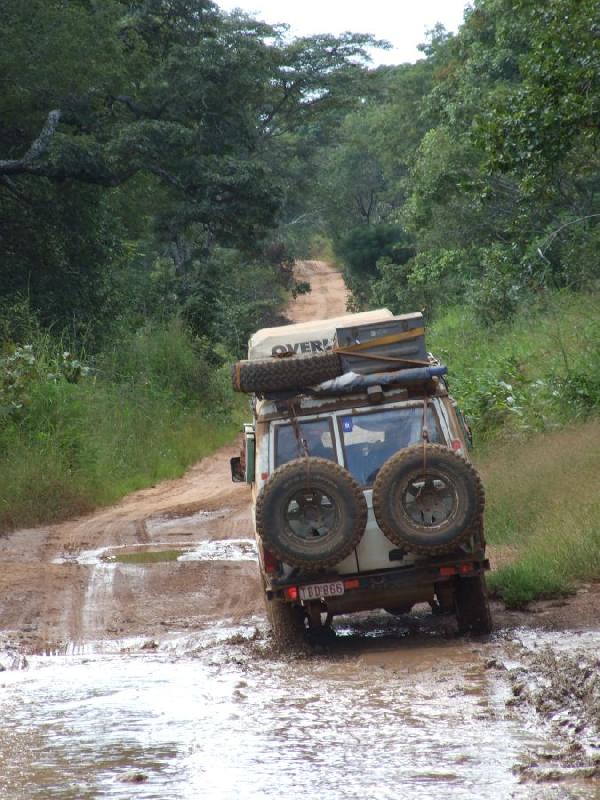
We passed a few small villages. No more trace of Police on this smaller road. What a relief! There was also barely any traffic. We helped a small truck that somehow managed to get stuck next to the road.
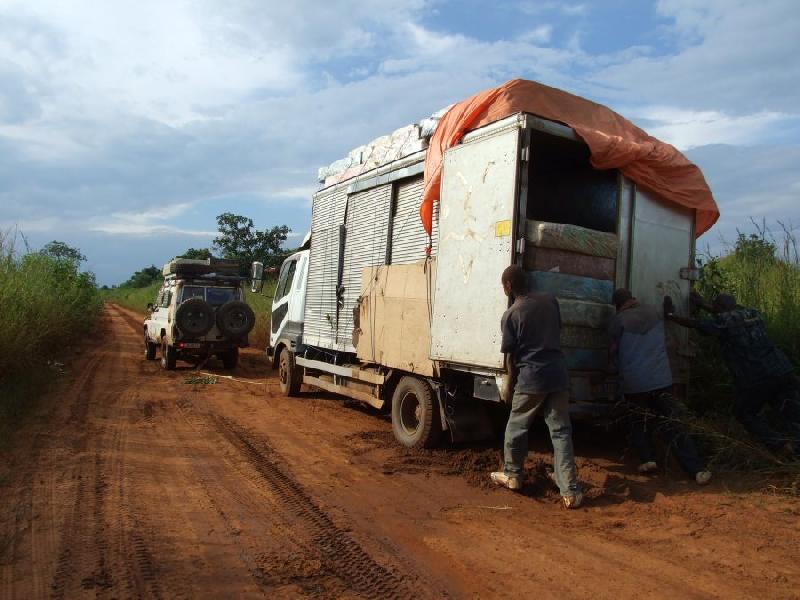
The road forked again a short while later at Tshilongo. The main track continued to other villages. The road we took was the RN1. It followed the railway and saw barely any traffic. Sandy and bumpy.
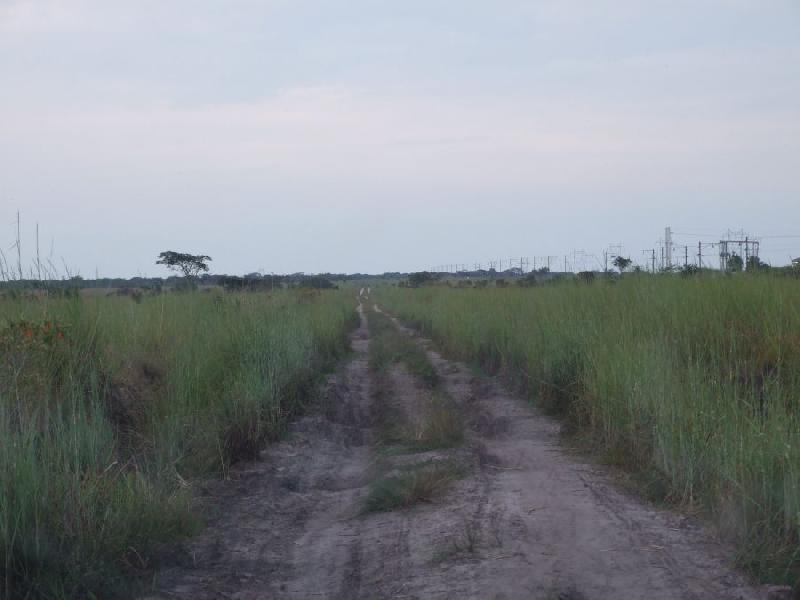
Our goal for our first day was the Catholic mission of Kansenia. About 250 km from Lubumbashi were we left at 7 in the morning. We were 20km away from Kansenia when the sun set at around 6. But we decided to push on.
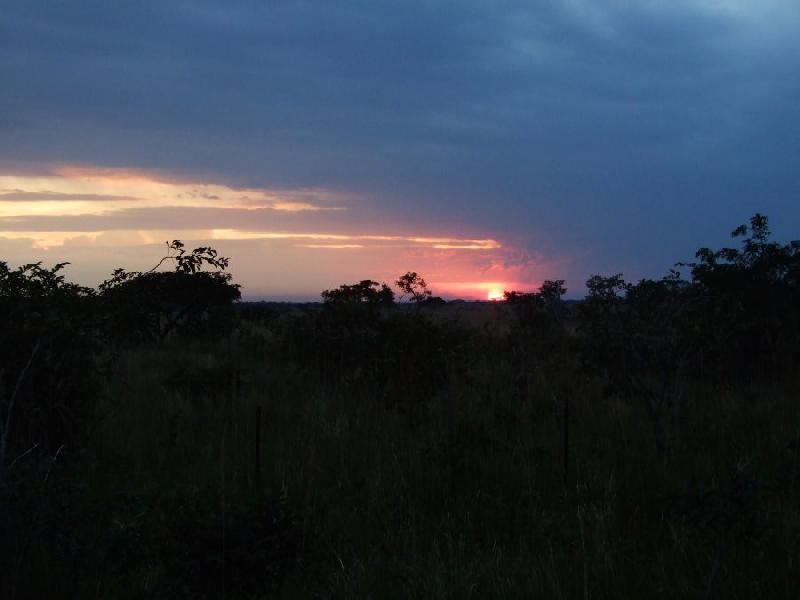
It had rained a lot lately, but in the sand this caused no real problems. Until we hid some sort of a marsh. We passed many traces of other vehicles who got stuck here. The soil was very sticky pitch black cotton mud. We were tired and it was dark. We got stuck :roll:
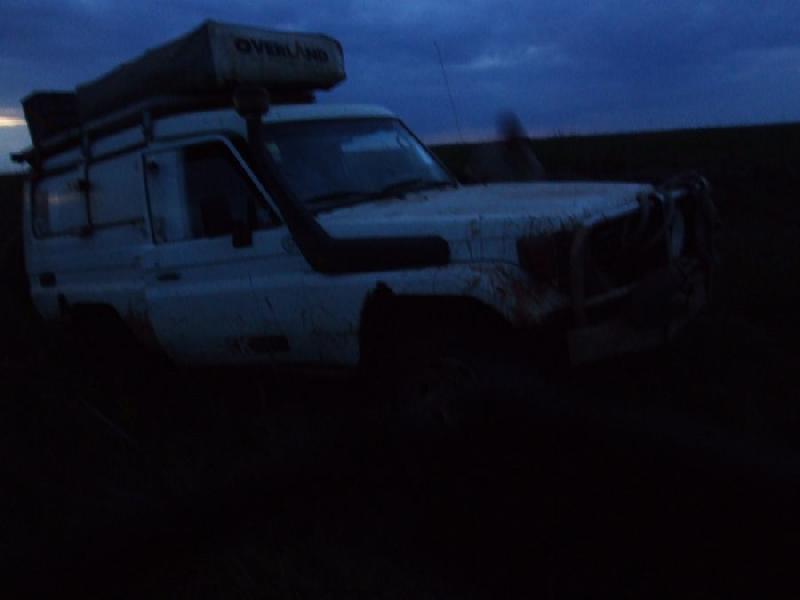
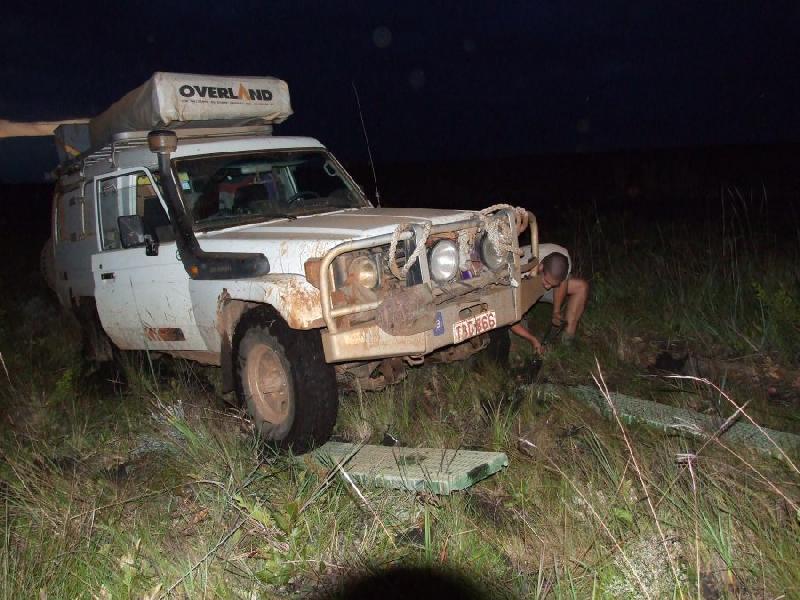
3 hours of digging. Sandpates, hi-lift, the whole lot. Sweating like a pig. We could barely hear eachother with all the insect buzzing around our ears. But we managed to get out.
In the dark we were greeted by the priests in the mission. Before we could even say something they said "Il faut rien dire, on comprend!" - "No need to talk, we understand". They were friendly and gave us a bucket of water to wash in. We could park the car in their garden. We closed our tent at midnight. The adrenaline was still rushing trough our veins.
That was the funniest thing we heard all day and we burst out laughing. He too joined in the laughing. Anyhow, back to reality so we just said goodbye and started to drive of. He jumped onto the driving boards and asked for "un jus" in a final attempt before letting go.
The good gravel road continued for a short while after Likasi but continues to a mining town. That is ofcourse the reason that this road exists, the mine. The Route National 1 (RN1) - the highway to Kinshasa - forks of at a small village called Tenke. The track immediately changed in a sandy jungle track.

We passed a few small villages. No more trace of Police on this smaller road. What a relief! There was also barely any traffic. We helped a small truck that somehow managed to get stuck next to the road.

The road forked again a short while later at Tshilongo. The main track continued to other villages. The road we took was the RN1. It followed the railway and saw barely any traffic. Sandy and bumpy.

Our goal for our first day was the Catholic mission of Kansenia. About 250 km from Lubumbashi were we left at 7 in the morning. We were 20km away from Kansenia when the sun set at around 6. But we decided to push on.

It had rained a lot lately, but in the sand this caused no real problems. Until we hid some sort of a marsh. We passed many traces of other vehicles who got stuck here. The soil was very sticky pitch black cotton mud. We were tired and it was dark. We got stuck :roll:


3 hours of digging. Sandpates, hi-lift, the whole lot. Sweating like a pig. We could barely hear eachother with all the insect buzzing around our ears. But we managed to get out.
In the dark we were greeted by the priests in the mission. Before we could even say something they said "Il faut rien dire, on comprend!" - "No need to talk, we understand". They were friendly and gave us a bucket of water to wash in. We could park the car in their garden. We closed our tent at midnight. The adrenaline was still rushing trough our veins.
Progress after 1 day of driving.
This was supossed to be the easiest part of the entire trip. It would
be the last day we would be able to cover that much distance on a single
day.
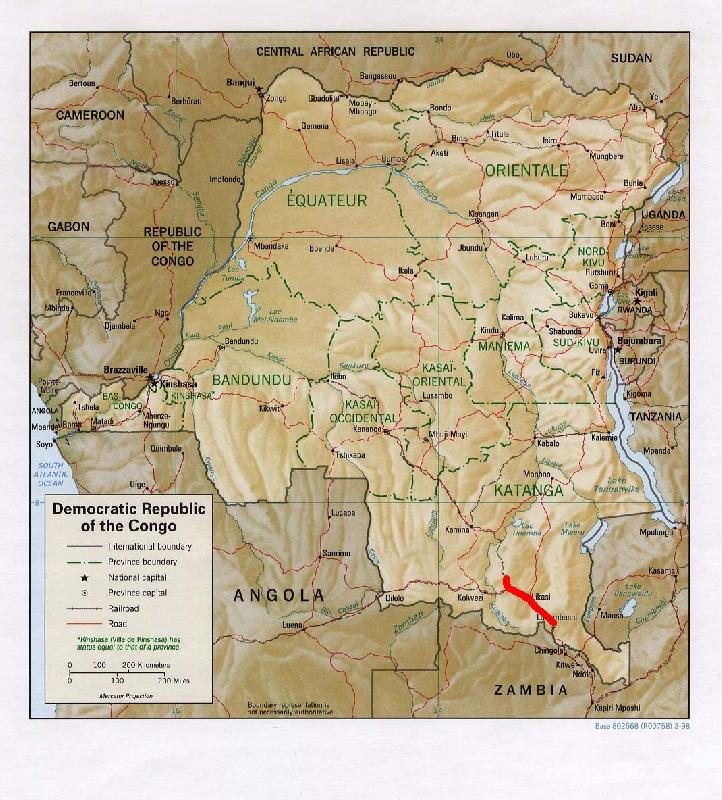

Day 2
It's 6 in the morning when we hear a noise underneath our rooftop tent. It sounds like little kids giggling. It are little kids giggling!
15 of them are waiting under our tent. This is a spectacle they cannot miss. They try to be quiet but fail. We manage to stay in bed until 8 but sleeping is out of the question with all the noise.
Prudence, Séraphin, Olette, Ami, Dombolo, Aimé, Yvette, Europa, Calence, …
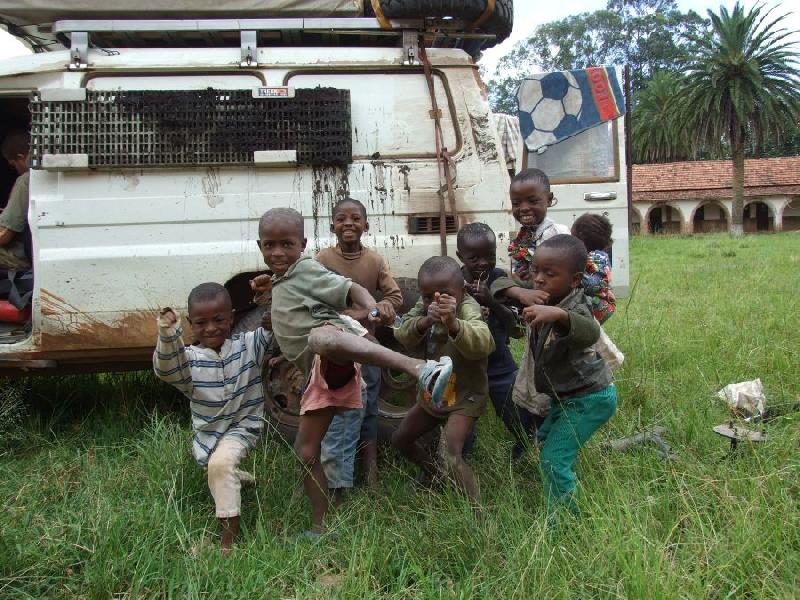
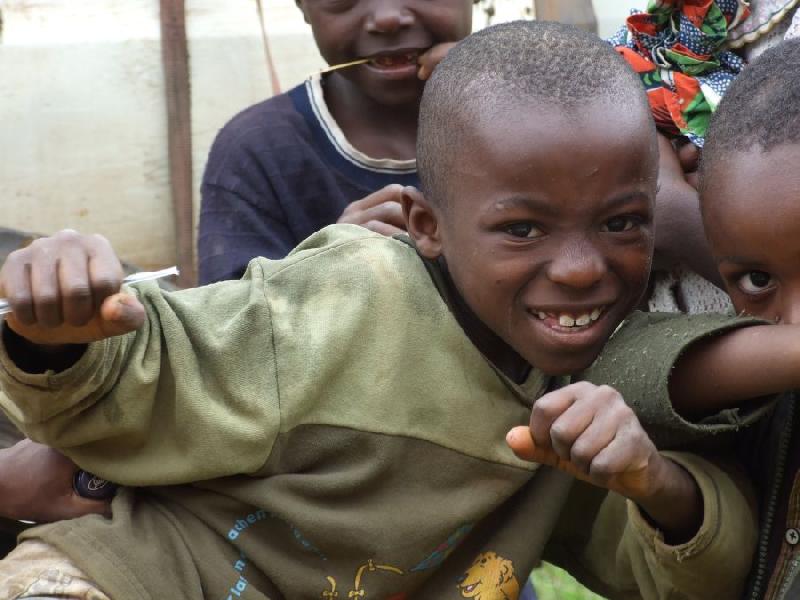
The mission is at the same time a (boarding) school. During our little muddy ordeal of the day before a bolt broke off from our wheelcarrier. We did not have a spare bolt of that size, but the mission had a lathe so they could make one for us. This had to wait until noon because then the generator would be running for an hour. We decided to have a rest day. That gave us plenty of time to reflect on the previous day.
We like kids, but we were silently hoping they would have to go to class today so we could have some rest. Alas, it was a holiday so we were bombarded to babysitter for the day :roll: :wink:
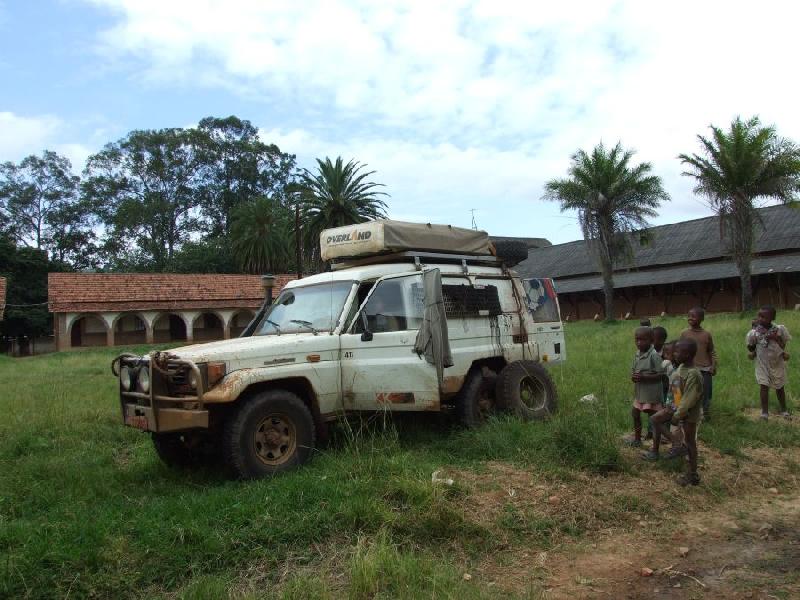
The kids were just like kids everywhere, but somehow the begging had crept in already. They frequently asked for "cadeaux" and all sorts of other things.
As is usual in many countries, the young girls have to take care of their littile sister from a very young age.
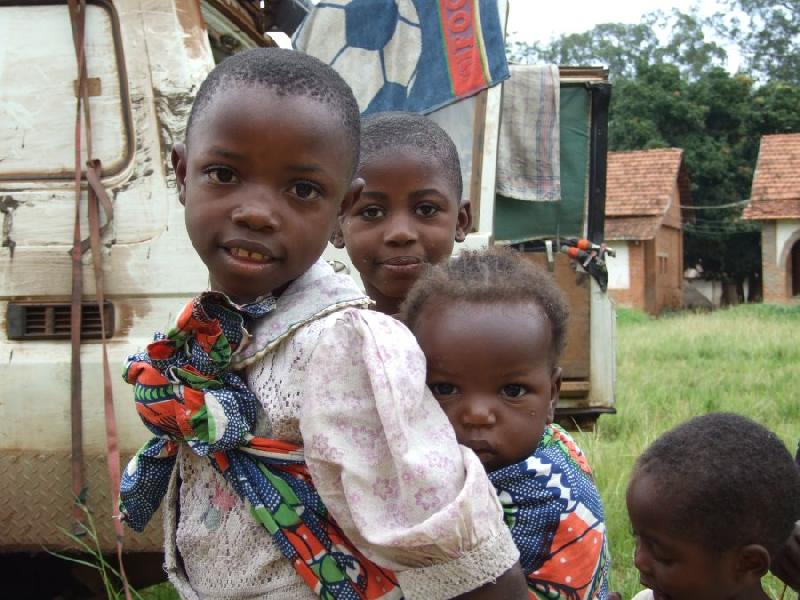
It's 6 in the morning when we hear a noise underneath our rooftop tent. It sounds like little kids giggling. It are little kids giggling!
15 of them are waiting under our tent. This is a spectacle they cannot miss. They try to be quiet but fail. We manage to stay in bed until 8 but sleeping is out of the question with all the noise.
Prudence, Séraphin, Olette, Ami, Dombolo, Aimé, Yvette, Europa, Calence, …


The mission is at the same time a (boarding) school. During our little muddy ordeal of the day before a bolt broke off from our wheelcarrier. We did not have a spare bolt of that size, but the mission had a lathe so they could make one for us. This had to wait until noon because then the generator would be running for an hour. We decided to have a rest day. That gave us plenty of time to reflect on the previous day.
We like kids, but we were silently hoping they would have to go to class today so we could have some rest. Alas, it was a holiday so we were bombarded to babysitter for the day :roll: :wink:

The kids were just like kids everywhere, but somehow the begging had crept in already. They frequently asked for "cadeaux" and all sorts of other things.
As is usual in many countries, the young girls have to take care of their littile sister from a very young age.

The priests (Brothers actually)
are nice guys. There are 4 of them, young and smart. All of them have
studied in Lubumbashi or Kinshasa. After they finished the seminary they
were sent to a mission. They cannot choose which one. We could hear the
sadness in their voices when they told their stories.
They sampled the "world" when studying, they have a degree (one of them had a masters in engineering) and then they are sent to a mission. They know they will probably never have the chance again to live in a city. At the mission they take care of the kids, teach, etc.. A noble and rewarding job. But they carry all this knowledge that they cannot put in practice here. They have no computers, no tools, no electricity, no budget, ...
Their living quarters were very comfy and clean for Congolese standards. They had a radio and a TV set. Because of their proximity to Lubumbashi they had a regular supply of newspapers.
The priest-engineer was setting up a project to generate clean energy from a river. He had a recycling project. A radio project. An irrigation project, ... He had to run all these projects without any funds, without material. So many ideas, so little chances.
They remained positive but you could see it in their eyes that they were sad. Without a doubt they would take the first opportunity to get out of there. It would be a great loss for the mission and the village but I couldn't blame them. In the way our talks went we thought we could hear them crying for help. To take them to Europe, to give them funds, to supply them with material. They did not speak these words, but to us it was clear that they really longed for those things. We were not able to provide this. It made us sad and we felt guilty.
We thought about our experiences of the previous day. As mentioned before we always had this nervousness/anxiousness when going to a new country. Usually it dissapeared within minutes when we were welcomed by friendly people in a friendly country. We had been in Congo for a week now. Of which we only spent 1 day on the road. But the nervousness was still there.
It seemed like so many Congolese tried their best to make us feel unwelcome. And the few friendly people we met made us feel totally out of place with their tragic stories. So many people expected that we would be able to help them. Could we stand it to keep dissapointing those people? We are just tourists passing trough.. it feels wrong.
Was it wrong to come to Congo? Would it be like this for the rest of our trip? We are already exhausted after a single day on the road. The corruption, the roads... where we taking too many risks now?
Never before on our travels did we have so many doubts about what we were doing. My motto always is "Better to be sorry about what you did, then to be sorry about you did not do". I am fortunate to have found a partner who thinks exactly the same. We made a deal: as soon as somebody 'had enough' we would turn around - no questions asked.
We decided to push on, after all we have gotten this far already!
They sampled the "world" when studying, they have a degree (one of them had a masters in engineering) and then they are sent to a mission. They know they will probably never have the chance again to live in a city. At the mission they take care of the kids, teach, etc.. A noble and rewarding job. But they carry all this knowledge that they cannot put in practice here. They have no computers, no tools, no electricity, no budget, ...
Their living quarters were very comfy and clean for Congolese standards. They had a radio and a TV set. Because of their proximity to Lubumbashi they had a regular supply of newspapers.
The priest-engineer was setting up a project to generate clean energy from a river. He had a recycling project. A radio project. An irrigation project, ... He had to run all these projects without any funds, without material. So many ideas, so little chances.
They remained positive but you could see it in their eyes that they were sad. Without a doubt they would take the first opportunity to get out of there. It would be a great loss for the mission and the village but I couldn't blame them. In the way our talks went we thought we could hear them crying for help. To take them to Europe, to give them funds, to supply them with material. They did not speak these words, but to us it was clear that they really longed for those things. We were not able to provide this. It made us sad and we felt guilty.
We thought about our experiences of the previous day. As mentioned before we always had this nervousness/anxiousness when going to a new country. Usually it dissapeared within minutes when we were welcomed by friendly people in a friendly country. We had been in Congo for a week now. Of which we only spent 1 day on the road. But the nervousness was still there.
It seemed like so many Congolese tried their best to make us feel unwelcome. And the few friendly people we met made us feel totally out of place with their tragic stories. So many people expected that we would be able to help them. Could we stand it to keep dissapointing those people? We are just tourists passing trough.. it feels wrong.
Was it wrong to come to Congo? Would it be like this for the rest of our trip? We are already exhausted after a single day on the road. The corruption, the roads... where we taking too many risks now?
Never before on our travels did we have so many doubts about what we were doing. My motto always is "Better to be sorry about what you did, then to be sorry about you did not do". I am fortunate to have found a partner who thinks exactly the same. We made a deal: as soon as somebody 'had enough' we would turn around - no questions asked.
We decided to push on, after all we have gotten this far already!
Day 3
Our second driving day starts off great!
In this area large areas are given in lease to cow farms. They are profitable organisations (mostly owned by foreigners) and maintain their own roads on their property. They can be used by the general public, although sometimes a fee is asked. As the main road is usually pretty horrible, we prefer the private roads. We make good progress on these beautiful sandy tracks.
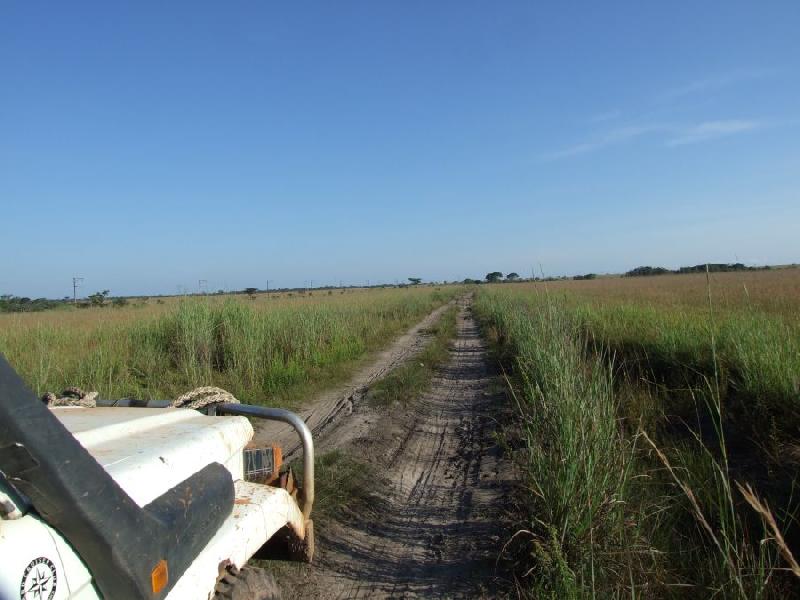
We also pass a ruin of what once must have been a grand building. The walls are marked with logos from a Belgian University. This must have once been some scientific study centre of sorts.
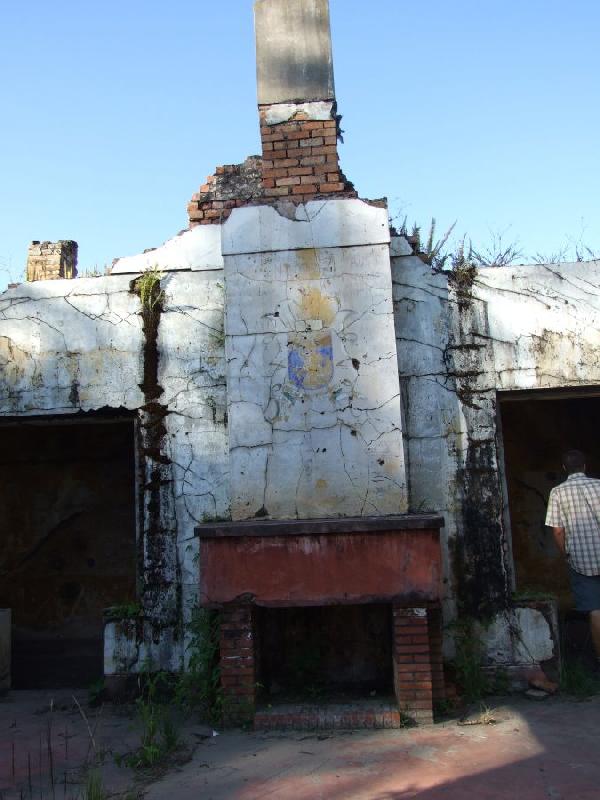
Our second driving day starts off great!
In this area large areas are given in lease to cow farms. They are profitable organisations (mostly owned by foreigners) and maintain their own roads on their property. They can be used by the general public, although sometimes a fee is asked. As the main road is usually pretty horrible, we prefer the private roads. We make good progress on these beautiful sandy tracks.

We also pass a ruin of what once must have been a grand building. The walls are marked with logos from a Belgian University. This must have once been some scientific study centre of sorts.

Even though the road was good, it was still requierd to pay attention. Too slow and no 4x4 and..
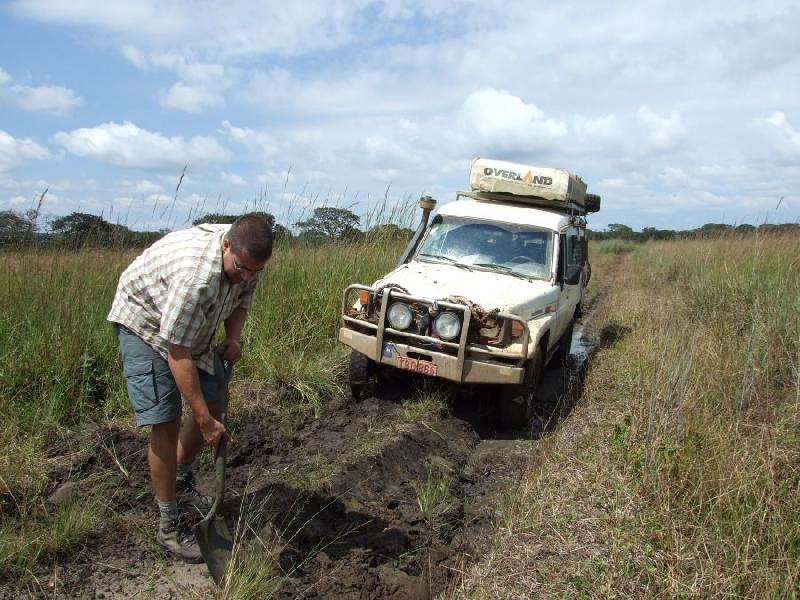
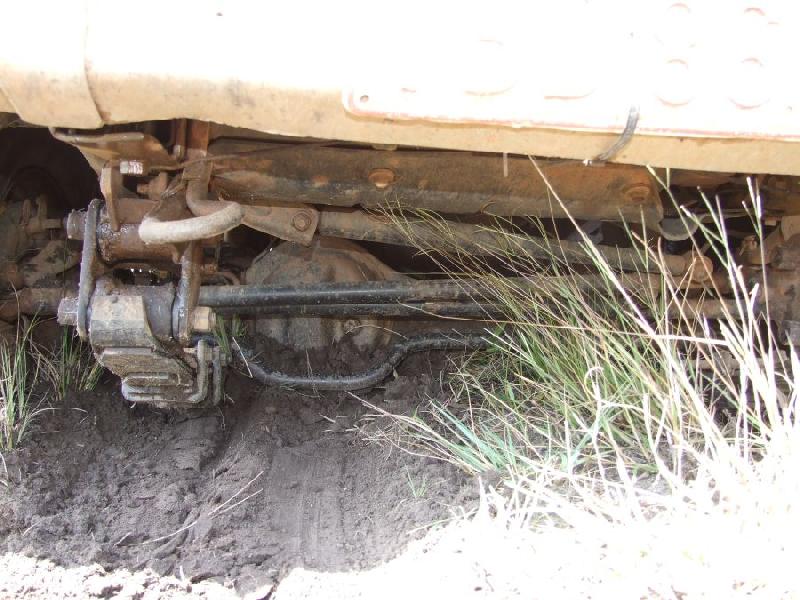
Stupid stupid stupid... but hey, it kept us busy for an hour! :roll:

At the end of the private road is a roadblock. No officials, but just some guy claiming we have to pay a toll fee. At that moment we did not know that this is generally accepted when you make use of the private roads. We were still a bit jumpy from our previous experiences with the police so we might have been a bit rude to the guy We got trough without paying
We got trough without paying  He probably though we were completely nuts :wink:
He probably though we were completely nuts :wink:


Stupid stupid stupid... but hey, it kept us busy for an hour! :roll:

At the end of the private road is a roadblock. No officials, but just some guy claiming we have to pay a toll fee. At that moment we did not know that this is generally accepted when you make use of the private roads. We were still a bit jumpy from our previous experiences with the police so we might have been a bit rude to the guy
The
difference between the private road and the RN1 was immediately clear. 2
kilometers further we got ourselves into this situation.
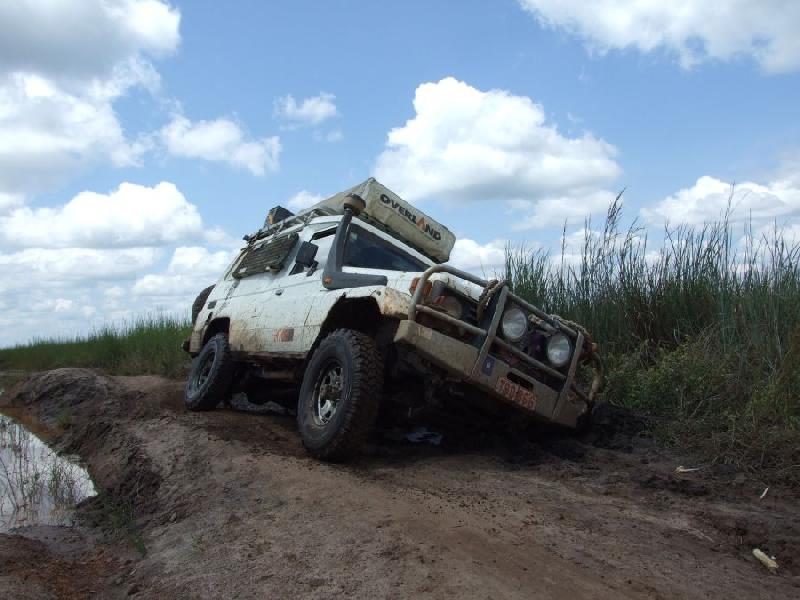
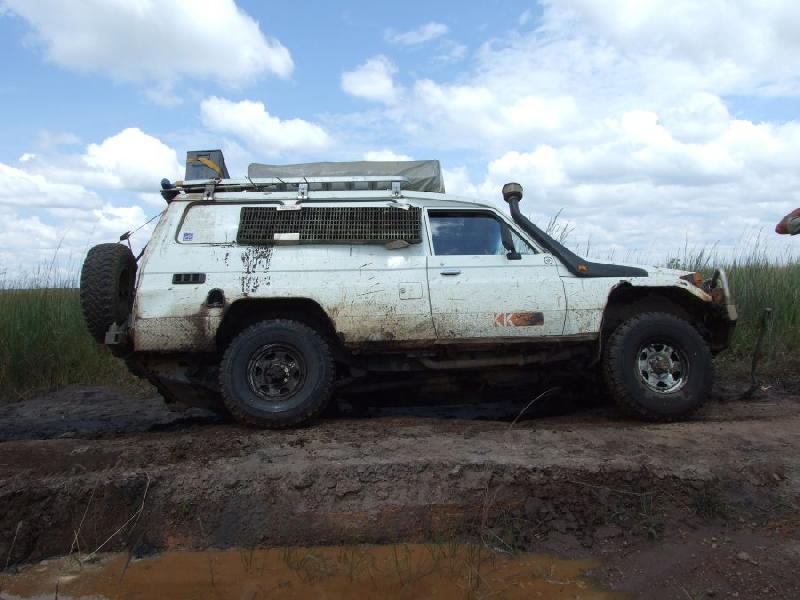
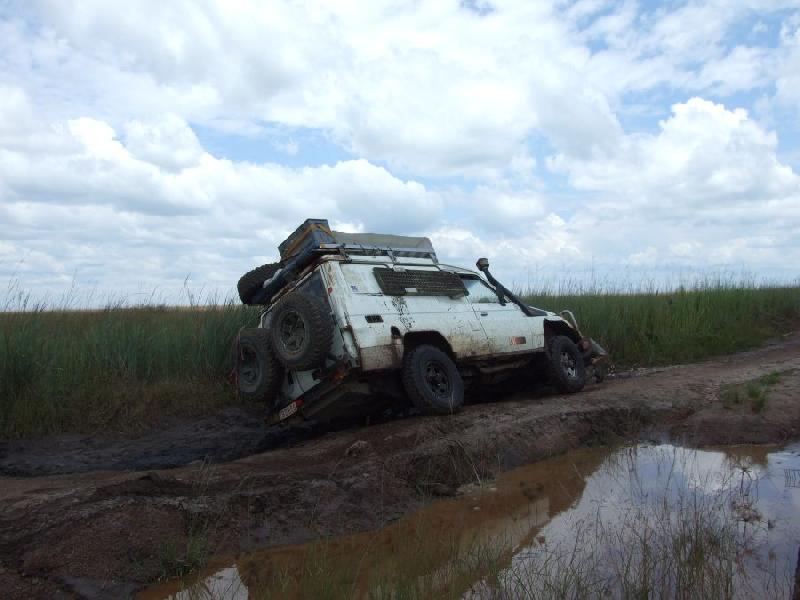
Bugger! Time to get the shovel out again...



Bugger! Time to get the shovel out again...
We
were on a plain on top of a hill. It looked as if a B52 dropped a
series of bombs. Huge craters everywhere. We could see another car in
the distance.. we hadn't seen a car yet today. A lot of activity around
the car, but no movement. Probably stuck as well.
We got out relatively fast only to get ourselves stuck in the next pit. The track between the craters was just to small and we slid into it.
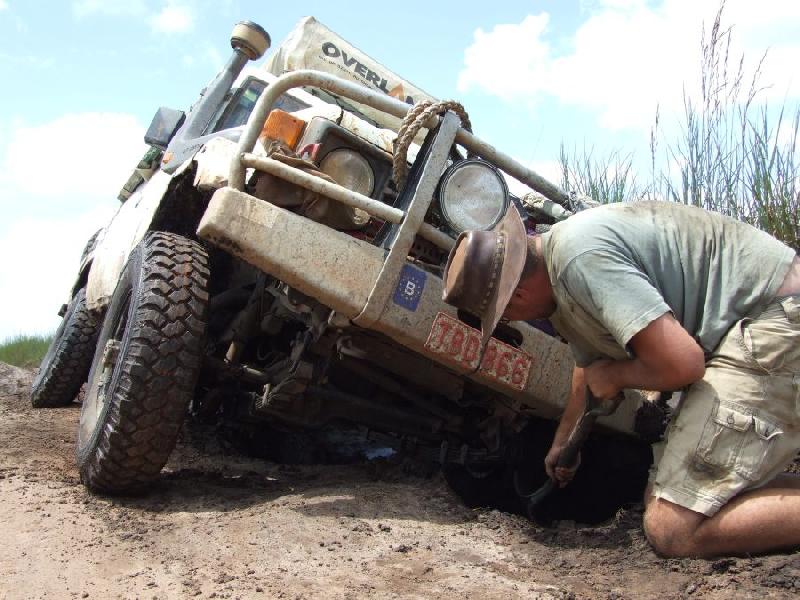
We finally made it to the other car. It was a Landcruiser (ofcourse ;-) ) from an aid organisation. We did not talk much, we exchanged some road information and we let them use us as an anchor to winch them out.
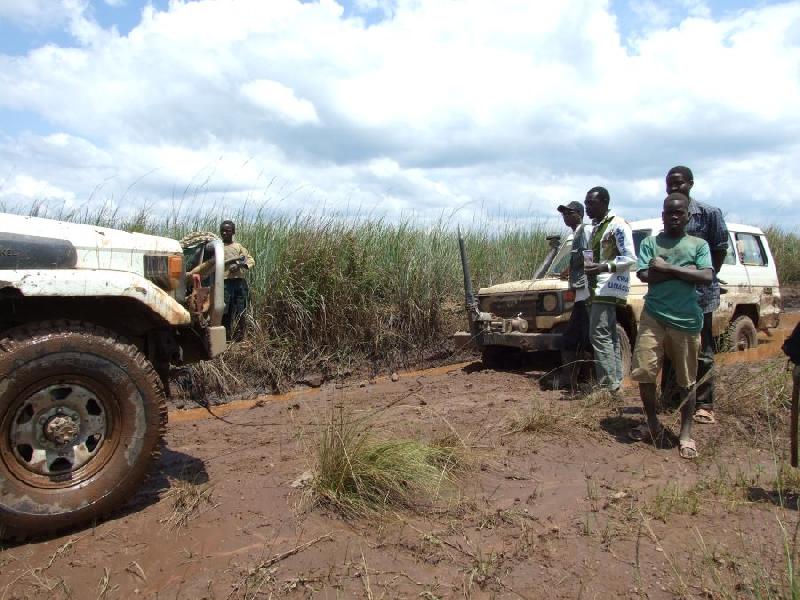
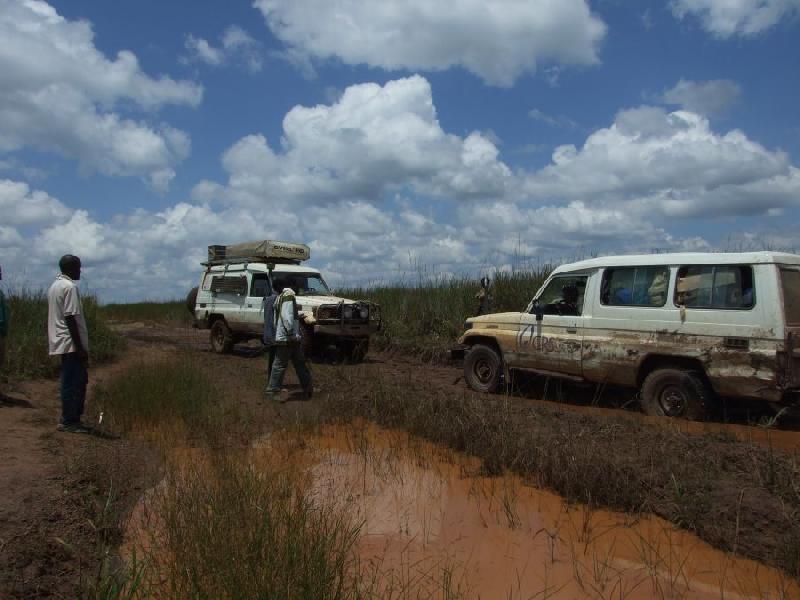
They declared us crazy that we were planning to drive to Kin... nobody does that. But apparantely after the crater field the roads improves a bit, but it remains "très dur" - "Very hard".
We got out relatively fast only to get ourselves stuck in the next pit. The track between the craters was just to small and we slid into it.

We finally made it to the other car. It was a Landcruiser (ofcourse ;-) ) from an aid organisation. We did not talk much, we exchanged some road information and we let them use us as an anchor to winch them out.


They declared us crazy that we were planning to drive to Kin... nobody does that. But apparantely after the crater field the roads improves a bit, but it remains "très dur" - "Very hard".
We
passed a few interesting settlements. One village in particular struck
me as extremely fascinating. It had a big boulevard with grand buildings
on both sides. Everything was in a horrible state, but it must have
been a prestigous place before. The same village had a big roundabout
with remains of fountain. There was a walled compound (with little wall
remaining ) with a church and something that must have been a monastery.
So many interesting things. I would have loved to walk around here, explore, try to find out what it all was. But we couldn't. Stopping would mean that an instant crowd would form and it would be a question of minutes before all the town's officials would be there. Asking for permits and generally demanding money.
We didn't even take pictures whilst driving trough. I could kick myself for it now!
Not only is this country rich in raw materials, it also rich in history, nature, etc... it has all the reasons why tourist would pay prime tourist $dollars$. But that will not happen anytime soon for sure..
Not all is bad though. Occasionally (and I must admit, it was a rare event) we meet nice people. Like this guy on his bike.
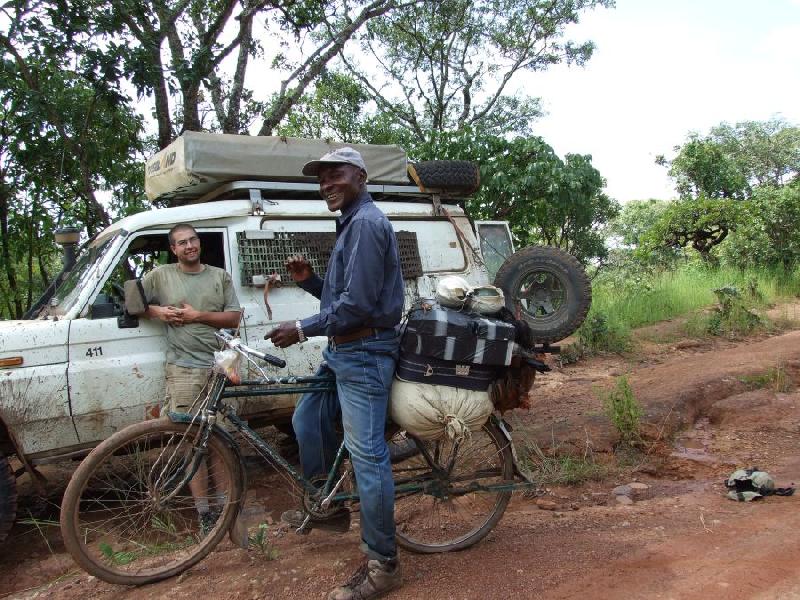
He stopped to say hello. He was a well educated person who previsouly worked as an accountant for a big company. The company is no longer there so now he survives like everybody else by trading a few things.
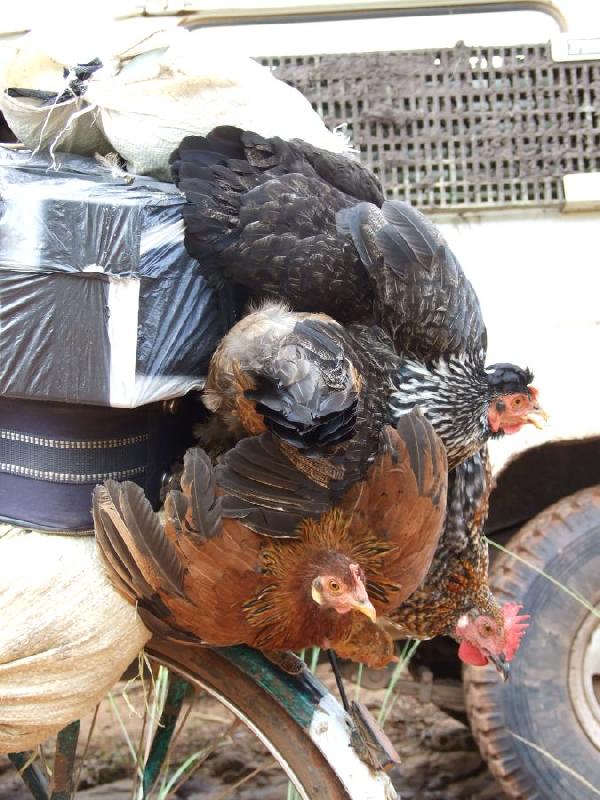
He was a good example of the older generation. Theygrew up in a prosperous (relative) Congo and have seen it go downhill. They still have the pride every person should have. The younger generation grew up in disastrously f*cked up country and lack the pride. Why should they, they know they do not get any chances?
It is that old generation that longs back to the colonial time. They acknowledge there were a lot of problems in that period and that they were discriminated by the white colonisator. But at least they had a functional country. They had roads and schools. They had jobs and could buy supplies. And above all, there was stability. Now there is nothing but uncertainty.. waiting for the next war to start.
So many interesting things. I would have loved to walk around here, explore, try to find out what it all was. But we couldn't. Stopping would mean that an instant crowd would form and it would be a question of minutes before all the town's officials would be there. Asking for permits and generally demanding money.
We didn't even take pictures whilst driving trough. I could kick myself for it now!
Not only is this country rich in raw materials, it also rich in history, nature, etc... it has all the reasons why tourist would pay prime tourist $dollars$. But that will not happen anytime soon for sure..
Not all is bad though. Occasionally (and I must admit, it was a rare event) we meet nice people. Like this guy on his bike.

He stopped to say hello. He was a well educated person who previsouly worked as an accountant for a big company. The company is no longer there so now he survives like everybody else by trading a few things.

He was a good example of the older generation. Theygrew up in a prosperous (relative) Congo and have seen it go downhill. They still have the pride every person should have. The younger generation grew up in disastrously f*cked up country and lack the pride. Why should they, they know they do not get any chances?
It is that old generation that longs back to the colonial time. They acknowledge there were a lot of problems in that period and that they were discriminated by the white colonisator. But at least they had a functional country. They had roads and schools. They had jobs and could buy supplies. And above all, there was stability. Now there is nothing but uncertainty.. waiting for the next war to start.
The next 20 or so kilometer the road was better.
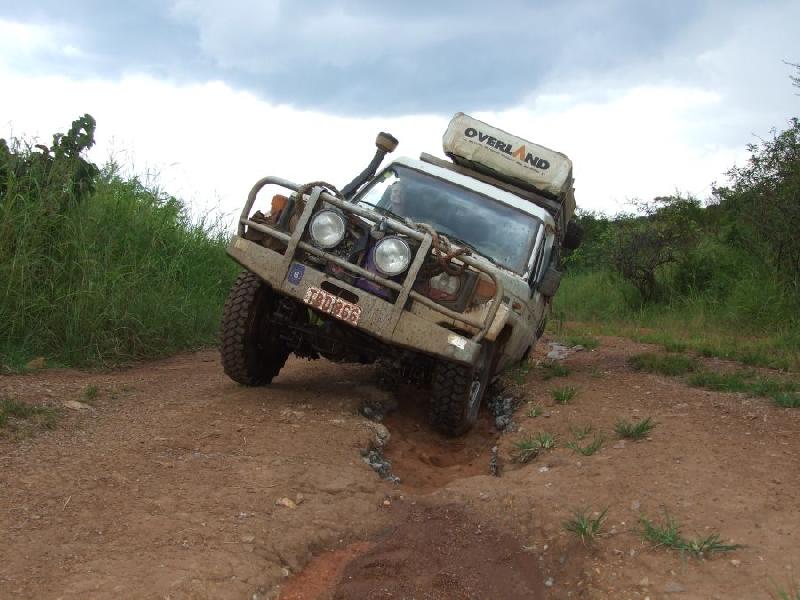
There is virtually no 4 wheeled traffic here, so no tracks exists. It is just a cleared out area in the bush. Usually with some eroded ruts to make it interesting.
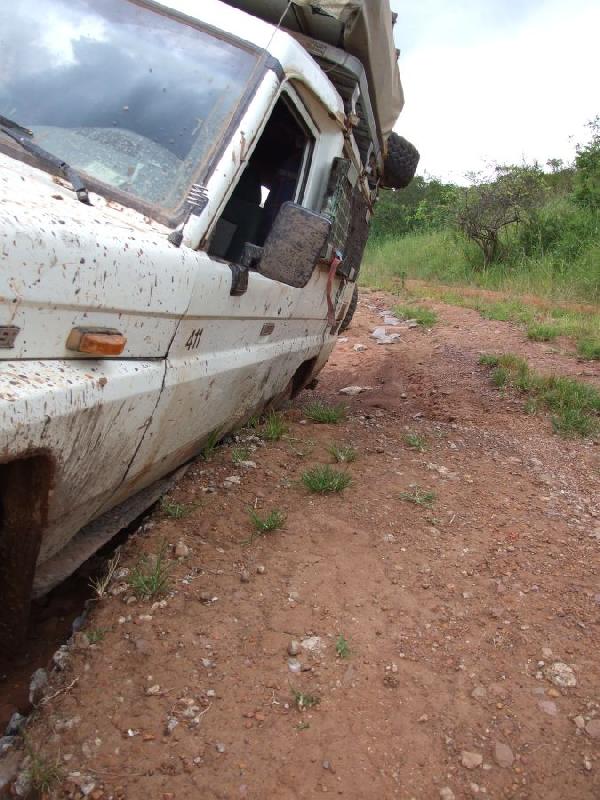
We were pushing it a bit. We had been fighting with the road all day long without any real pauses. It was getting late and we were hoping to reach Luena today, where we know a Belgian brother was living in a catholic mission.
We were pushing it a bit too hard I guess and made a mistake. We normally always walk difficult bit before driving it. This time I thought it would be ok. The ground looked unstable but I was sure I could make it trough by taking enough speed. I did not know, however, that a huge rock was blocking the track just behind a curve. I had to stop and we instantly sunk in.
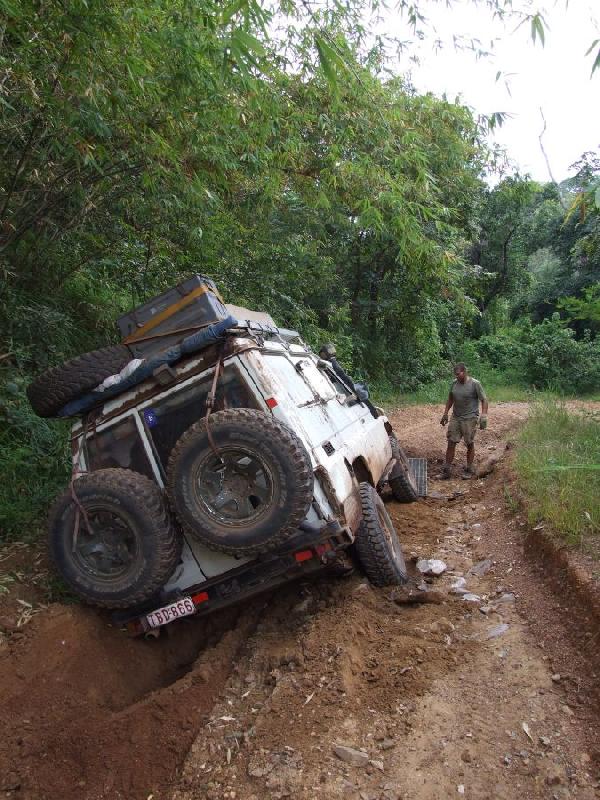

There is virtually no 4 wheeled traffic here, so no tracks exists. It is just a cleared out area in the bush. Usually with some eroded ruts to make it interesting.

We were pushing it a bit. We had been fighting with the road all day long without any real pauses. It was getting late and we were hoping to reach Luena today, where we know a Belgian brother was living in a catholic mission.
We were pushing it a bit too hard I guess and made a mistake. We normally always walk difficult bit before driving it. This time I thought it would be ok. The ground looked unstable but I was sure I could make it trough by taking enough speed. I did not know, however, that a huge rock was blocking the track just behind a curve. I had to stop and we instantly sunk in.

We were tired by now, it was
getting late again. I was angry with myself because I made this stupid
mistake. And I fell sorry for Josephine as she offered - as usual - to
check the road out before driving trough. This could have been
prevented.
We got the shovel out and starting working. 5 minutes. That is how long it took before the first people arrived. It quickly grew to a crowd of about 10 people.
I was digging to get the sandplate underneath one of the wheels. To reach the right spot I had to lay flat down underneath the car in the mud. I was eating mud everytime I dug. Josephine at the same time was dugging underneath another wheel.
"Donnez moi de l'argent" - "Give me money" someone asked
1st time, a second time. The third time he asked I was getting annoyed - understatement of the year ;-). I dropped my shovel and tried to get up. In doing so I bumped my head hard on the front axle (I was under the car in the mud, remember).
*Laughter*
I bit my thong and kept on digging.
"Donnez moi de l'argent"
Josephine asked the mob why they were asking us money
"Vous êtes blanc" - "You are white"
This conversation wouldn't lead anywhere useful... :roll: She told them that we had our own problems, that there would be no way that we would give them any money, and that it would be appreciated to just leave us alone as they were not really helping by talking to us while we were digging. They heard the magic word "help". help is usually associated with reward. So they offered to help us... but only if they would be paid for it.
Now, we have our pride and can be very stubborn. When I take risks I know things can go wrong, and if necessary I will fix it on my own. So I told them they were free to help us, but only if they wanted to really help us. I made it very clear that I was not letting me blackmail into this.
We returned to digging and they stood there and looked.
We did several attempt of trying to drive out, without much succes. More digging was required. Finally somebody took the intiative and offered to help out. I told him I was not going to pay and he agreed. It took another hour to liberate ourselves.
I offered the people that voluntarily helped some money to show my gratitude. That is just the right thing to do. They accepted but wanted more.
We drove off...
We got the shovel out and starting working. 5 minutes. That is how long it took before the first people arrived. It quickly grew to a crowd of about 10 people.
I was digging to get the sandplate underneath one of the wheels. To reach the right spot I had to lay flat down underneath the car in the mud. I was eating mud everytime I dug. Josephine at the same time was dugging underneath another wheel.
"Donnez moi de l'argent" - "Give me money" someone asked
1st time, a second time. The third time he asked I was getting annoyed - understatement of the year ;-). I dropped my shovel and tried to get up. In doing so I bumped my head hard on the front axle (I was under the car in the mud, remember).
*Laughter*
I bit my thong and kept on digging.
"Donnez moi de l'argent"
Josephine asked the mob why they were asking us money
"Vous êtes blanc" - "You are white"
This conversation wouldn't lead anywhere useful... :roll: She told them that we had our own problems, that there would be no way that we would give them any money, and that it would be appreciated to just leave us alone as they were not really helping by talking to us while we were digging. They heard the magic word "help". help is usually associated with reward. So they offered to help us... but only if they would be paid for it.
Now, we have our pride and can be very stubborn. When I take risks I know things can go wrong, and if necessary I will fix it on my own. So I told them they were free to help us, but only if they wanted to really help us. I made it very clear that I was not letting me blackmail into this.
We returned to digging and they stood there and looked.
We did several attempt of trying to drive out, without much succes. More digging was required. Finally somebody took the intiative and offered to help out. I told him I was not going to pay and he agreed. It took another hour to liberate ourselves.
I offered the people that voluntarily helped some money to show my gratitude. That is just the right thing to do. They accepted but wanted more.
We drove off...
We lost a lot of time
and we only had 20 minutes of daylight left. Our goal for that day - The
mission in Luena - was another 50kilometers away. We would not make it.
We would have to stay in a village
We parked the car and got out. They offered us two chairs and asked us to sit. So we did. It was completely dark by now but almost full moon so we could see eachother well.
And there we were: sitting on a chair with 400 eyes looking at us. Nobody talked to us, they just looked. You could hear people talking to eachother and pointing at us... usually followed by some giggling. These people obviously had no idea what was happening to them. Neither did we 8O
The town's officials arrived and wanted to see our papers and we had to "register". They were friendly but very confused about what to do. We asked if we could have some water to wash ourselves which they immediately fetched... it was even warm! And we even got a bar of soap! But there was sill 200 man staring at us... . We hid behind the car and tried to wash us as good as possible.
It started raining.
A father approached us with a kid. The kid instantly started crying when he saw us. The father told us the kid had never seen a white person before. A few more kids were brought in to have them see the great mystery of white skin.
Although we were hungry, this did not seem the best place to get our cooking gear out, so we smugled a packet of biltong and some biscuits up in the tent and went to sleep. The crowd stayed for a long time after we dissapeared in our tent.
That night it rained hard. Our tent had developped some leaks. Every few minutes we could feel drops splashing on our body..
We stopped in the next village. The crowd that gathered grew huge very quickly. There must have been about 200 man around us. We asked if there was a church here, and if we could see the priest. The priest was summoned and we asked him if we could camp in the grounds of the church. His French was not very good. As a matter of fact, very few people spoke French. But he ageed and showed us a place.
We parked the car and got out. They offered us two chairs and asked us to sit. So we did. It was completely dark by now but almost full moon so we could see eachother well.
And there we were: sitting on a chair with 400 eyes looking at us. Nobody talked to us, they just looked. You could hear people talking to eachother and pointing at us... usually followed by some giggling. These people obviously had no idea what was happening to them. Neither did we 8O
The town's officials arrived and wanted to see our papers and we had to "register". They were friendly but very confused about what to do. We asked if we could have some water to wash ourselves which they immediately fetched... it was even warm! And we even got a bar of soap! But there was sill 200 man staring at us... . We hid behind the car and tried to wash us as good as possible.
It started raining.
A father approached us with a kid. The kid instantly started crying when he saw us. The father told us the kid had never seen a white person before. A few more kids were brought in to have them see the great mystery of white skin.
Although we were hungry, this did not seem the best place to get our cooking gear out, so we smugled a packet of biltong and some biscuits up in the tent and went to sleep. The crowd stayed for a long time after we dissapeared in our tent.
That night it rained hard. Our tent had developped some leaks. Every few minutes we could feel drops splashing on our body..
Our progress on our second day of driving (in blue)
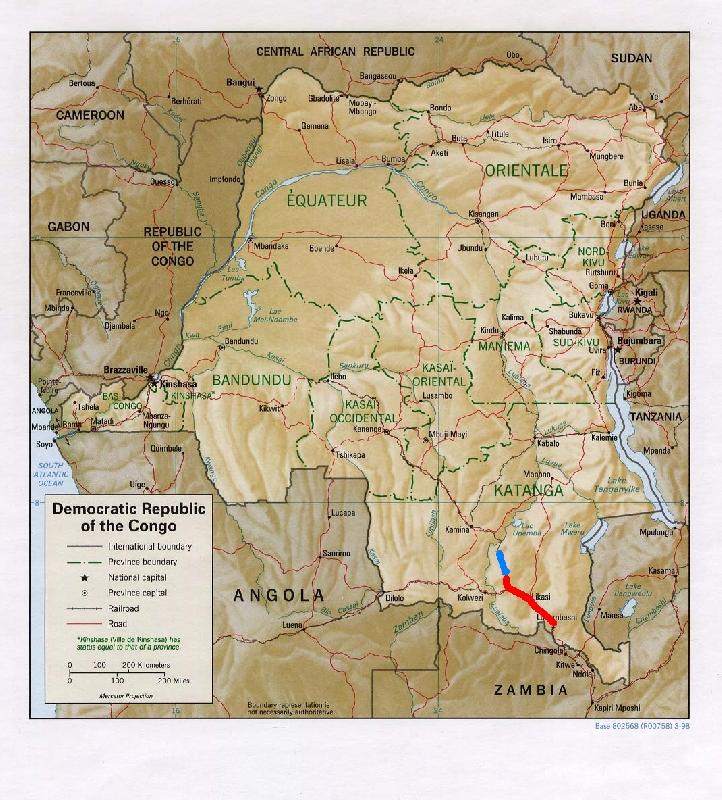

Day 4
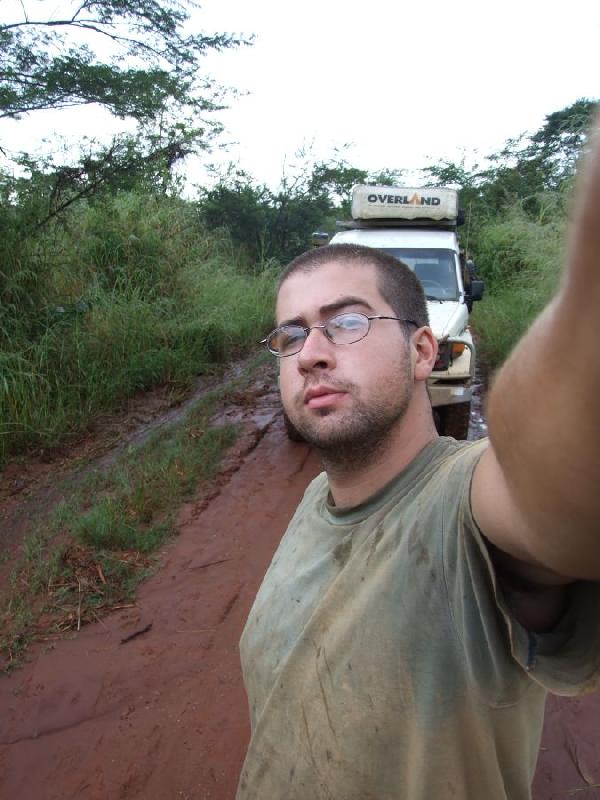
Small eyes... dirty t-shirt.
We got up with the first light at 5. We have a custom that we pay the equivalent of the price of a campsite if we can stay with somebody, so we paid our dues to the priest and we were off. The entire village waved us out and the kids tried to keep up with us for as long as they could.
Staying in villages is great for security. People are friendly. But boy-oh-boy forgot about privacy!
I slept ok, no surprise as I was exhausted. Josephine did not sleep very well. The adrenaline. The leaking tent didn't help either. We stopped a few kilometers down the road to make some breakfast.
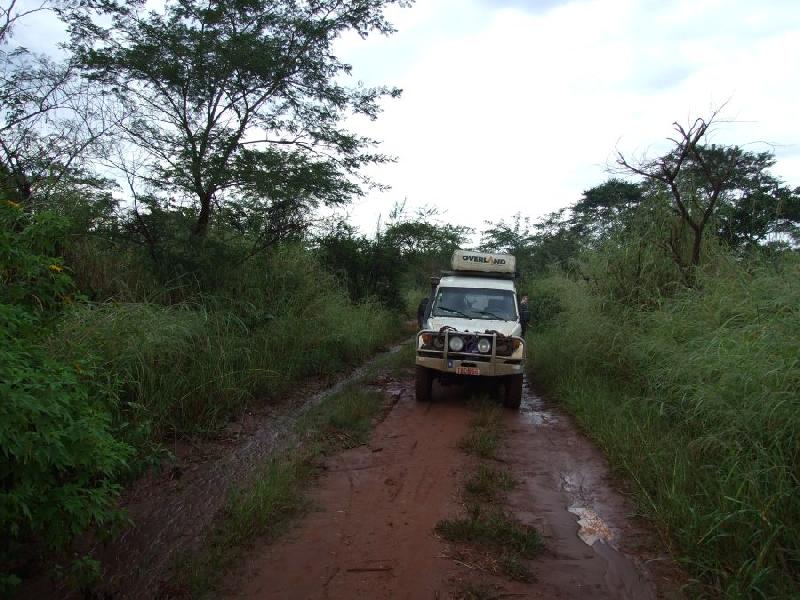
I wasn't hungry. The adrenaline. For a moment Josephine thought about stopping and returning to Lubum. The last few days were really hard and we were still a veeeery long way from Kinshasa. As agreed before we would not try to convince eachother to push on. She contemplated the situation for half an hour with a warm tea. She is no quiter, she wanted to continue! She is my Josephine! :cheers:
:cheers:
We were sucked into Congo. Deeper and deeper.

Small eyes... dirty t-shirt.
We got up with the first light at 5. We have a custom that we pay the equivalent of the price of a campsite if we can stay with somebody, so we paid our dues to the priest and we were off. The entire village waved us out and the kids tried to keep up with us for as long as they could.
Staying in villages is great for security. People are friendly. But boy-oh-boy forgot about privacy!
I slept ok, no surprise as I was exhausted. Josephine did not sleep very well. The adrenaline. The leaking tent didn't help either. We stopped a few kilometers down the road to make some breakfast.

I wasn't hungry. The adrenaline. For a moment Josephine thought about stopping and returning to Lubum. The last few days were really hard and we were still a veeeery long way from Kinshasa. As agreed before we would not try to convince eachother to push on. She contemplated the situation for half an hour with a warm tea. She is no quiter, she wanted to continue! She is my Josephine!
We were sucked into Congo. Deeper and deeper.
Thanks for all the positive comments thus far!
Matt: nice to hear from you again. I will try not to forget to stop next time I pass Destelbergen. How is the troopy going? I saw you even made the frontpage of expo! ;-)
Matt: nice to hear from you again. I will try not to forget to stop next time I pass Destelbergen. How is the troopy going? I saw you even made the frontpage of expo! ;-)
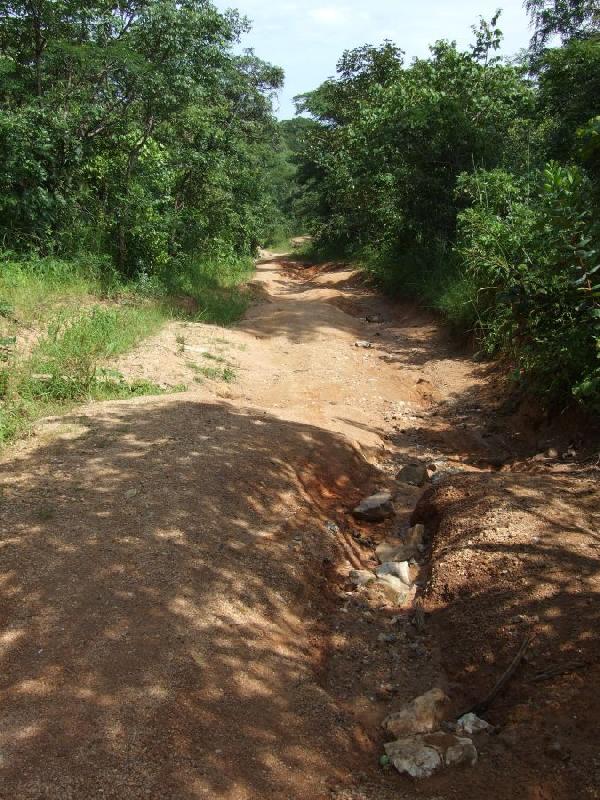
We were still aiming for Luena. The road was ok but had lots of water in so called "flaques d'eau" - "Puddles". Often the road would be completely immersed. It could be less then 1 cm deep, but it might as well be 1 meter deep.
We (I
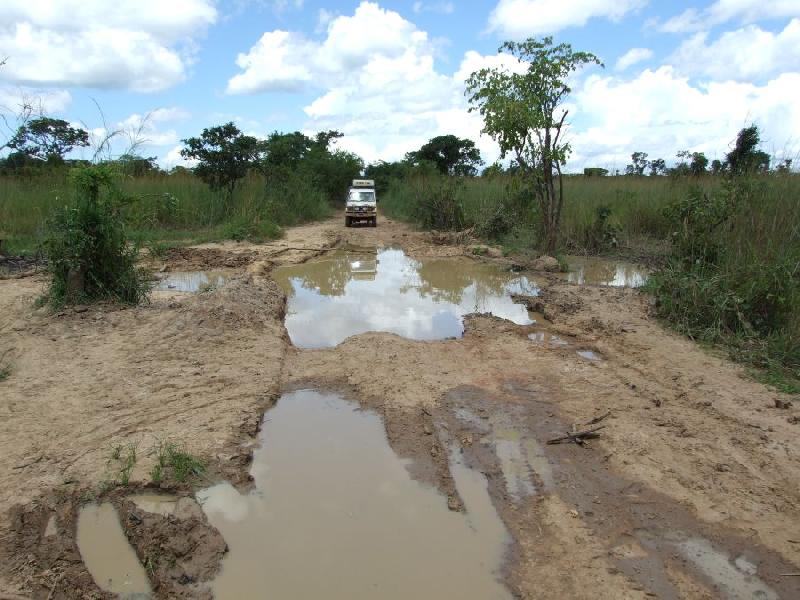
We came across another vehicle. Every vehicle we saw in the last few days was stuck it seems.
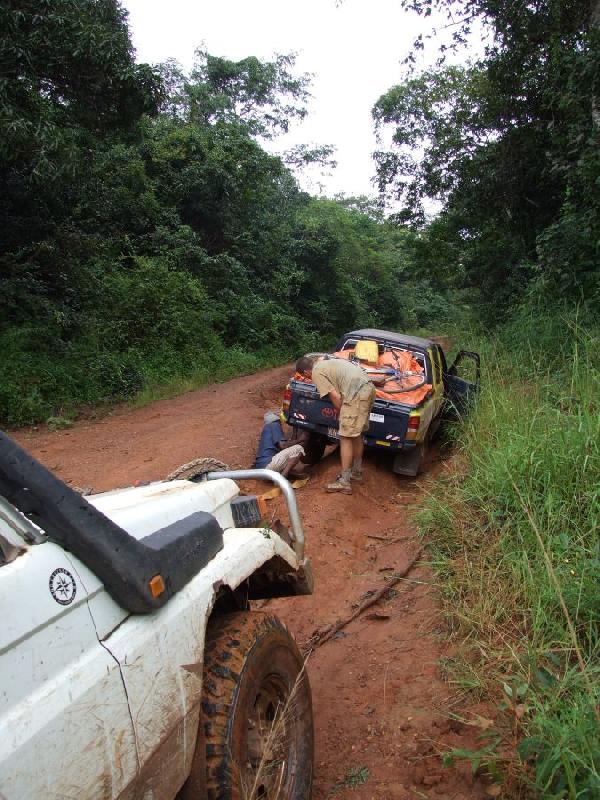
They were on their way to Kananga. Same directions as us. They had bought the vehicle in Lubumbashi but did not have the money to transport to Kananga, so they decided to drive. They were pretty deseperate by now as their "new" car getting damaged by the road and it took them much longer then anticipated. We would pass eachother a few times. We never knew if they made it to their destination.
There is no trough traffic at all on this traject. All transport in the area is done by train. There is an old colonial trainline between Lubumbashi and Kananga. All transport is done via this train or by air.
All in all it was a plesant day. Sun was shining (that's good because it dries out the roads), no major problems with police, and above all: it was the first day since we entered congo that we did not get ourselves stuck! What a feature!
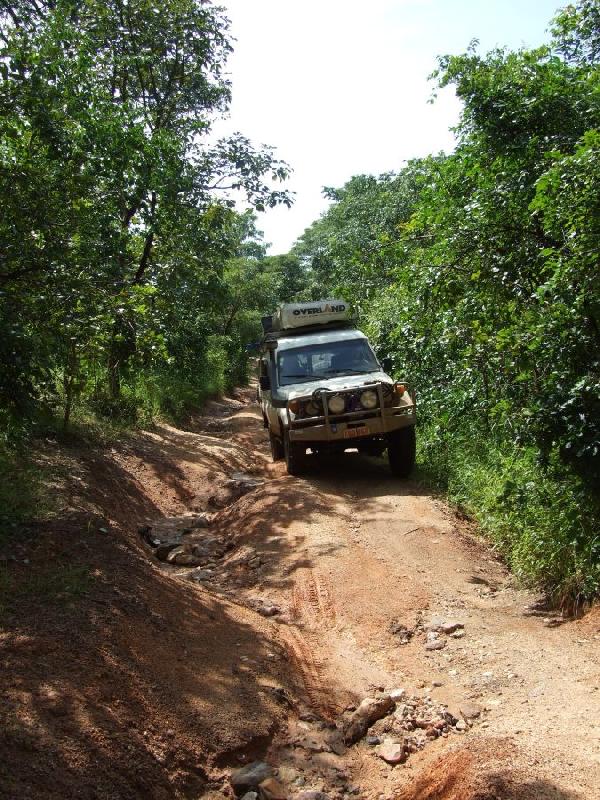
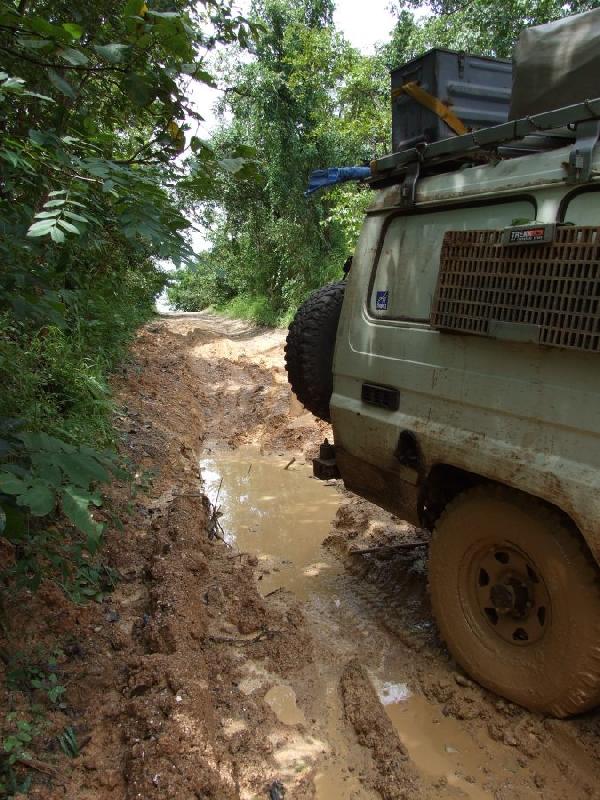
We left at 5 this morning and arrived in Luena at 14:30. 50 km's covered.
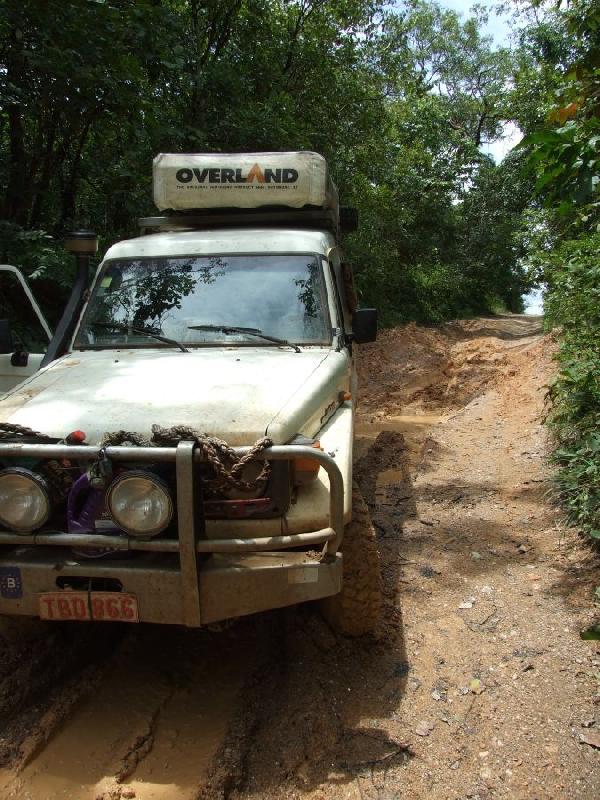
We had received the contact
details from Frère Louis via our connections in Lubumbashi. We had
already called him, but unfortunately he was not home. He was at the
main mission post in Kamina for some meetings. He was kind enough to
inform his own mission that we were coming and to let us stay there.
And so we had a leisurely afternoon at his mission. We must say that at first we were a bit dissapointed. Thus far the missions were havens of peace and quiet. Were things were functional (sometimes) and clean (sometimes). Not so at the home of Frère Louis. He lived like the Congolese lived... in a rundown building without any comfort. He had a bathroom that hadn't seen a brush in ages,.. . It struck us as a bit odd, but later we would understand that Frère Louis is one of these rare people that does not care about himself, but only about the others. We would meet Frère Louis later on this trip and everything would become clear then.
He was well organized though. He was the only one in town with transportation
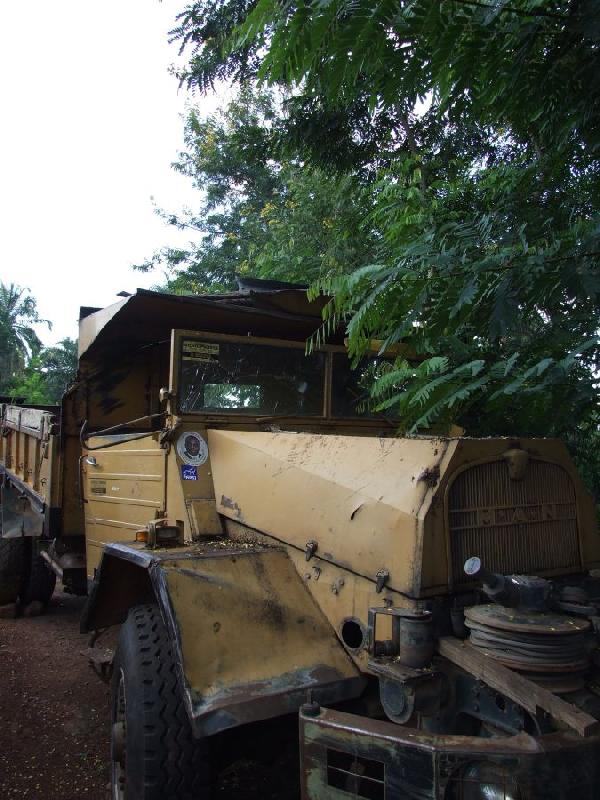
He uses this truck to get supplies from Lubumbashi to all of the project he is running in the area. The big wheels, the portle axles and the huge winch make it a capable bundybasher. It is expensive to run (fuel) so it does not see much action. He had two of these.. but one was broken.
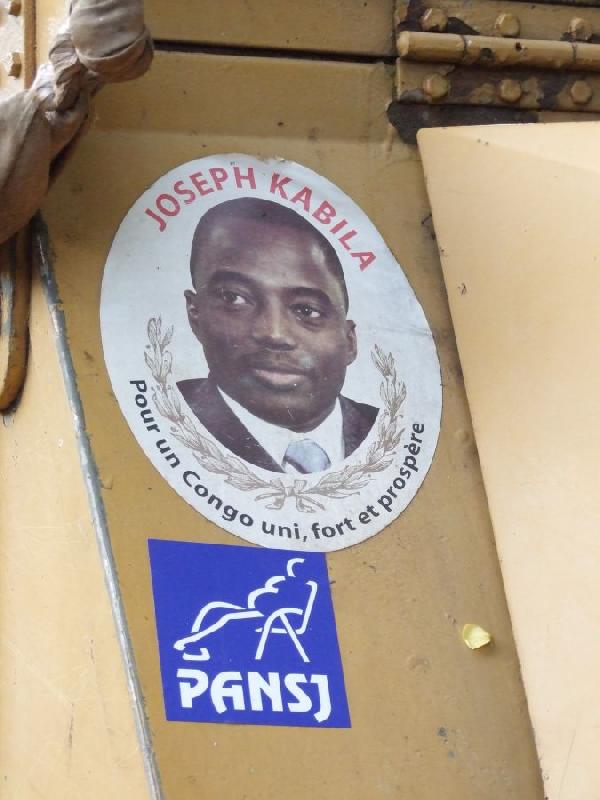
And so we had a leisurely afternoon at his mission. We must say that at first we were a bit dissapointed. Thus far the missions were havens of peace and quiet. Were things were functional (sometimes) and clean (sometimes). Not so at the home of Frère Louis. He lived like the Congolese lived... in a rundown building without any comfort. He had a bathroom that hadn't seen a brush in ages,.. . It struck us as a bit odd, but later we would understand that Frère Louis is one of these rare people that does not care about himself, but only about the others. We would meet Frère Louis later on this trip and everything would become clear then.
He was well organized though. He was the only one in town with transportation

He uses this truck to get supplies from Lubumbashi to all of the project he is running in the area. The big wheels, the portle axles and the huge winch make it a capable bundybasher. It is expensive to run (fuel) so it does not see much action. He had two of these.. but one was broken.

While we were there several
people came to visit. Among them was a friendly older lady. She had
beautiful (homemade) clothes. She was responsible for the orphanage that
was run by Frère Louis.
Her name was Henriette Raman Kitwa Jujinga. What a lovely name it is.
She told us a bit of what she did. I can no longer remember how many orphans they had, but it was enormous! She also said that there were many many more orphans that they could not help.
She invited us to visit the orphanage and suggested that maybe we could help.
We declined Our moral was low already, we were exhausted and above all we knew that
they would ask us for all sorts of things we could not give to them.
The only thing we would have left behind would be dissapointment.
Our moral was low already, we were exhausted and above all we knew that
they would ask us for all sorts of things we could not give to them.
The only thing we would have left behind would be dissapointment.
I am looking at her phone number now in Josephines notes. I wonder how she is doing..

Her name was Henriette Raman Kitwa Jujinga. What a lovely name it is.
She told us a bit of what she did. I can no longer remember how many orphans they had, but it was enormous! She also said that there were many many more orphans that they could not help.
She invited us to visit the orphanage and suggested that maybe we could help.
We declined
I am looking at her phone number now in Josephines notes. I wonder how she is doing..
Progress after 4 days since we left Lubumbashi. Of which we drove 3
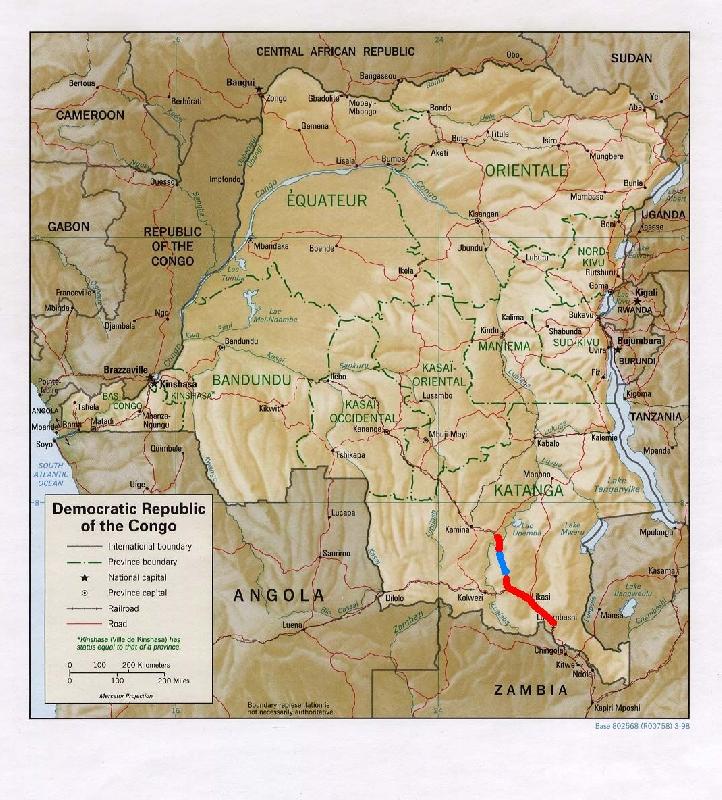

Day 5
It rained again last night. The rainy season had really started now. Our tent is leaking badly. It seems as if every second raindrop just falls straight trough. Our mattres, pillow, etc... are all soaked. During the day it is hot and sticky. Too humid to let it all dry out. Mould is starting to form on our mattress now. Not nice..
Shortly after Luena we have to cross the Lubidi river. We were told there is a bridge, and indeed.
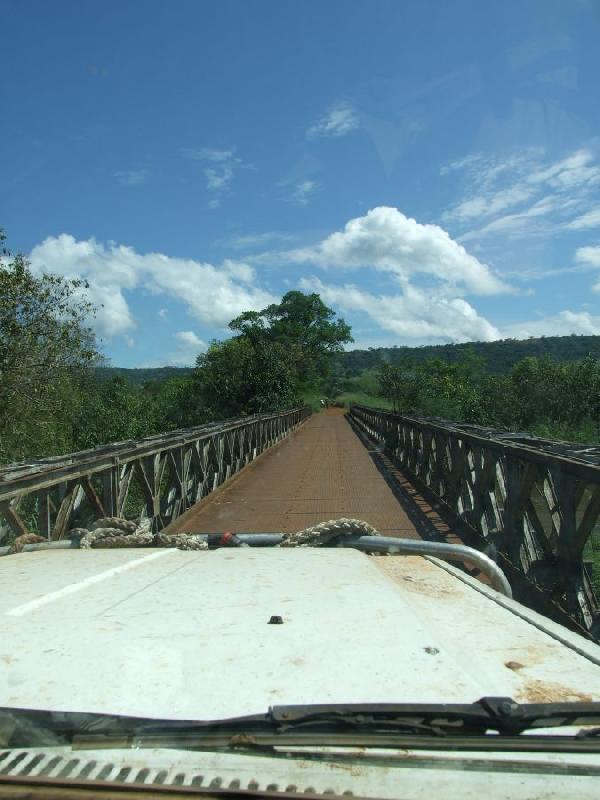
This would have been the end of our trip if the bridge hadn't been there
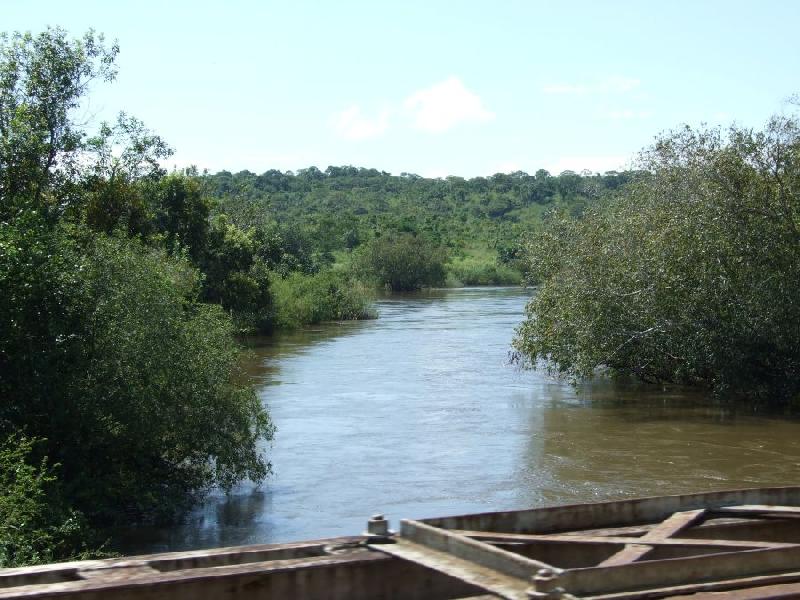
The bridges were something we were very concerned about upfront. Congo has a lot streams and rivers and we knew the roads had not seen maintenance in many many years. If a bridge broke down, that could be a major problems. Up until now however we did not have any problems with the bridges. Some of the smaller bridges might have been dodgy, but all of them were passable. Most of the large bridges were fortunately made out of steel and in reasonably good nick.
Take the bridge we just crossed for example. I find it amazing that is still there. Numerous armies have crossed the Congo in the last 20 years, chasing their enemies down to the capital. Now, I am not a military expert, but if my army was losing terrain to the enemy army and I have to retreat. The one thing I would certainly do was blow up all bridges after me. Had it happened but was the damage so small that it could easily be repaired? Or did they just not bother? Or did they lack the explosives and time to actually blow it up? Who knows.... but at least the outcome is good for us now!
After the bridge was a long climb on a hill. The road was filled with rocks the size of small cars. Josephine had to guide me trough in 1st gear low. Very technical driving.
All of a sudden we hear somebody approaching. Running. He does not even look at us and speeds past us. A few seconds later another young guy speeds past us. We stop briefly to check out what is chasing them but cannot see anything.
This is odd... very odd. Congolese man are strong and explosive. But the only time we've seen prove of their strength is when they are working. We had never seen a Congolese run... just for the fun of it.
We continued slowly and started to get worried when more men hurried past us. Something was up.
It rained again last night. The rainy season had really started now. Our tent is leaking badly. It seems as if every second raindrop just falls straight trough. Our mattres, pillow, etc... are all soaked. During the day it is hot and sticky. Too humid to let it all dry out. Mould is starting to form on our mattress now. Not nice..
Shortly after Luena we have to cross the Lubidi river. We were told there is a bridge, and indeed.

This would have been the end of our trip if the bridge hadn't been there

The bridges were something we were very concerned about upfront. Congo has a lot streams and rivers and we knew the roads had not seen maintenance in many many years. If a bridge broke down, that could be a major problems. Up until now however we did not have any problems with the bridges. Some of the smaller bridges might have been dodgy, but all of them were passable. Most of the large bridges were fortunately made out of steel and in reasonably good nick.
Take the bridge we just crossed for example. I find it amazing that is still there. Numerous armies have crossed the Congo in the last 20 years, chasing their enemies down to the capital. Now, I am not a military expert, but if my army was losing terrain to the enemy army and I have to retreat. The one thing I would certainly do was blow up all bridges after me. Had it happened but was the damage so small that it could easily be repaired? Or did they just not bother? Or did they lack the explosives and time to actually blow it up? Who knows.... but at least the outcome is good for us now!
After the bridge was a long climb on a hill. The road was filled with rocks the size of small cars. Josephine had to guide me trough in 1st gear low. Very technical driving.
All of a sudden we hear somebody approaching. Running. He does not even look at us and speeds past us. A few seconds later another young guy speeds past us. We stop briefly to check out what is chasing them but cannot see anything.
This is odd... very odd. Congolese man are strong and explosive. But the only time we've seen prove of their strength is when they are working. We had never seen a Congolese run... just for the fun of it.
We continued slowly and started to get worried when more men hurried past us. Something was up.
Thanks for the motivating words guys! Appreciated.
Here's more..
Here's more..
The efforts of the rocky
climb were paid of with a beautiful view. We rarely had an overview of
the landscape we were driving trough as there were walls of jungle on
both sides of the roads. Luena can be seen below.
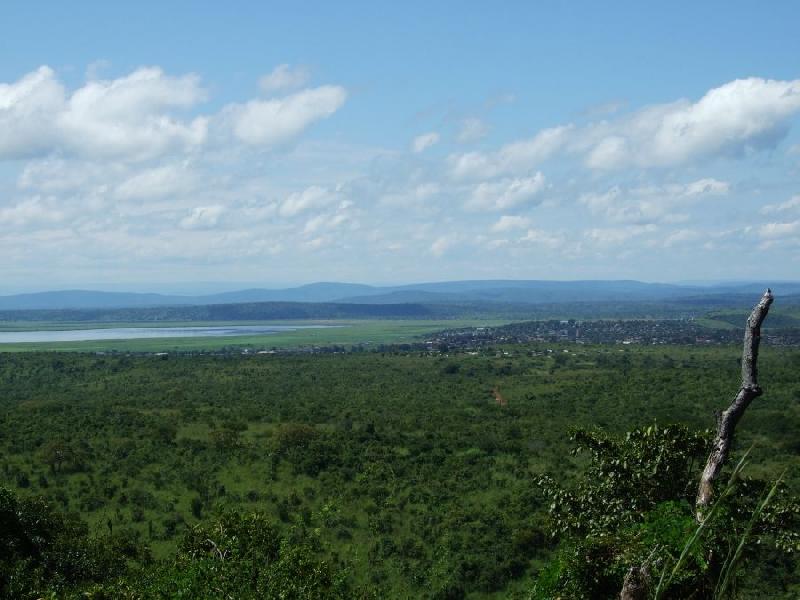
The road immediately went down again. Fortunately the road was in better condition.
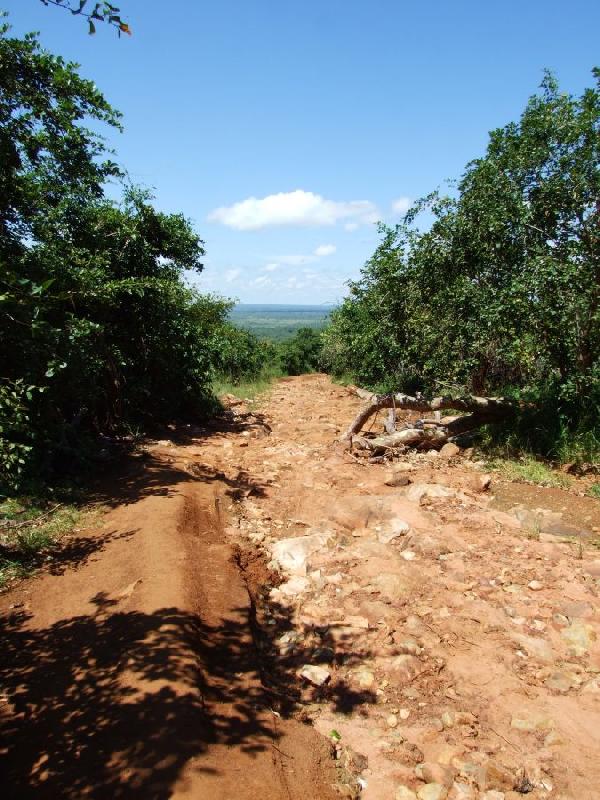
At the bottom of the hill, were water would accumulate, there was a boghole. The "runners" were there too. We could have guessed it. They looked happy.
We gave them a hello and started exploring the possibilities. There were 3 routes that could lead trough the hole. The runners were quick to point out that we had to take the rightmost route. They claimed it was the best route and we would have no problems going trough there.
We did not even try to walk it, it was obviously the worst of the three options. Driving in there would mean we would get stuck. Not for hours, but for days.
We ignored their "advice" and started wading trough the other two options. The middle route had water up to chest height, but the underground was relatively solid. The left route was very muddy. It was not a very long patch of mud but we would have to drive on an angle and risked sliding sideways in the deep water. A tree was seperating the middle and the left route. Left seemed like the best way to go.
Once we made intentions to clear the left route of sticks one of the runners got really angry. His face turned red and he shouted. he was really upset that we did not ask them to help us. After all, "we were rich and we could pay them to help us trough".
We asked him why he was so surprised that we did not want to trust him with the duty of helping us trough after they had clearly given us false advice at first.
The "runner" now got really upset and shouted even louder, gesticulating wildly. He seemed so convinced that we did wrong to him that we thought he was about to start fighting with us. He threw a whole lot of arguments at us that did not make sense at all. This was nothing short of extortion. This is how corruption crept into normal life here. These were not officials making abuse of their power, this was a normal guy who wanted a piece of the cake that he strongly believed was his.
We got really mad at everything he said, but did not react. We were not in a position to make enemies there. The obstacle ahead of us made it quite likely that we would get ourselves stuck. We needed friends, not enemies. But we don't pay people to be our friends.
We chanced it. Josephine walked across first and gave me directions. I slowly entered the mudpit in 1st low and creeped forward. There was very little traction and I started to slide sideways into the deep water.
In a normal situation, this would the point that you stop, and reverse out again. And then try to build a dam to stop you sliding sideways and try again. But I could feel the the eyes of the angry runner in my back. I wanted to get out of here. Now!
I floored it. Mud flying everywhere. Sliding sideways I made it far enough not to slide in the deep water but hit the tree in the middle hard on the side of the car. The tree kept us upright and we plowed trough.
I could feel my hart beating wildly. Adrenaline pumping trough my veins. Josephine hopped in the car and we drove off. She was equally pumped up and we roared out our excitement. We couldn't care less about the dent.
We didn't look back at the runners when we dissapeared in the jungle.
How did a simple obstacle like this become such a nerve wrecking experience?

The road immediately went down again. Fortunately the road was in better condition.

At the bottom of the hill, were water would accumulate, there was a boghole. The "runners" were there too. We could have guessed it. They looked happy.
We gave them a hello and started exploring the possibilities. There were 3 routes that could lead trough the hole. The runners were quick to point out that we had to take the rightmost route. They claimed it was the best route and we would have no problems going trough there.
We did not even try to walk it, it was obviously the worst of the three options. Driving in there would mean we would get stuck. Not for hours, but for days.
We ignored their "advice" and started wading trough the other two options. The middle route had water up to chest height, but the underground was relatively solid. The left route was very muddy. It was not a very long patch of mud but we would have to drive on an angle and risked sliding sideways in the deep water. A tree was seperating the middle and the left route. Left seemed like the best way to go.
Once we made intentions to clear the left route of sticks one of the runners got really angry. His face turned red and he shouted. he was really upset that we did not ask them to help us. After all, "we were rich and we could pay them to help us trough".
We asked him why he was so surprised that we did not want to trust him with the duty of helping us trough after they had clearly given us false advice at first.
The "runner" now got really upset and shouted even louder, gesticulating wildly. He seemed so convinced that we did wrong to him that we thought he was about to start fighting with us. He threw a whole lot of arguments at us that did not make sense at all. This was nothing short of extortion. This is how corruption crept into normal life here. These were not officials making abuse of their power, this was a normal guy who wanted a piece of the cake that he strongly believed was his.
We got really mad at everything he said, but did not react. We were not in a position to make enemies there. The obstacle ahead of us made it quite likely that we would get ourselves stuck. We needed friends, not enemies. But we don't pay people to be our friends.
We chanced it. Josephine walked across first and gave me directions. I slowly entered the mudpit in 1st low and creeped forward. There was very little traction and I started to slide sideways into the deep water.
In a normal situation, this would the point that you stop, and reverse out again. And then try to build a dam to stop you sliding sideways and try again. But I could feel the the eyes of the angry runner in my back. I wanted to get out of here. Now!
I floored it. Mud flying everywhere. Sliding sideways I made it far enough not to slide in the deep water but hit the tree in the middle hard on the side of the car. The tree kept us upright and we plowed trough.
I could feel my hart beating wildly. Adrenaline pumping trough my veins. Josephine hopped in the car and we drove off. She was equally pumped up and we roared out our excitement. We couldn't care less about the dent.
We didn't look back at the runners when we dissapeared in the jungle.
How did a simple obstacle like this become such a nerve wrecking experience?
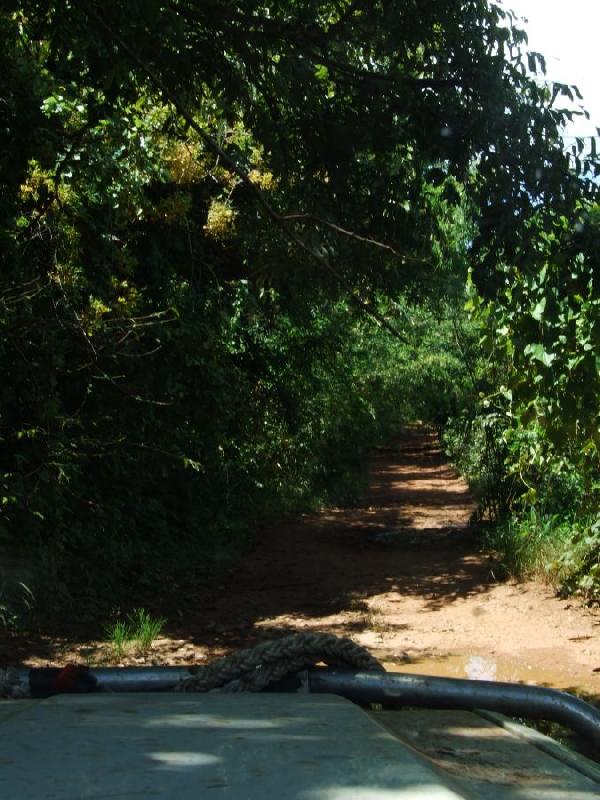
The goal for this day was Kamina. The central Franciscan mission for the Katange provice is there. Progress was slow but no major problems were had.
Most of the road lead trough dense jungle. Great for a short while, but it's not like you get a chance to enjoy the scenery. We passed many bogholes and had to be on the constant lookout of obstacles.
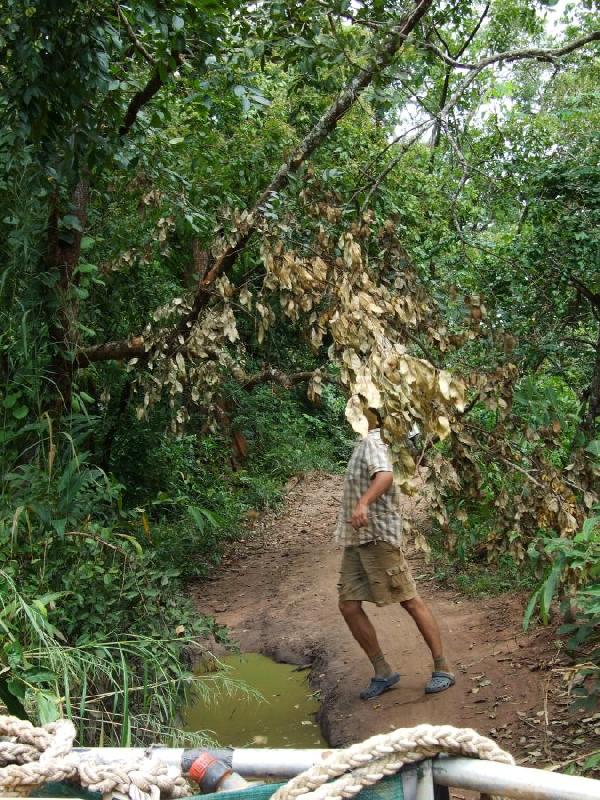
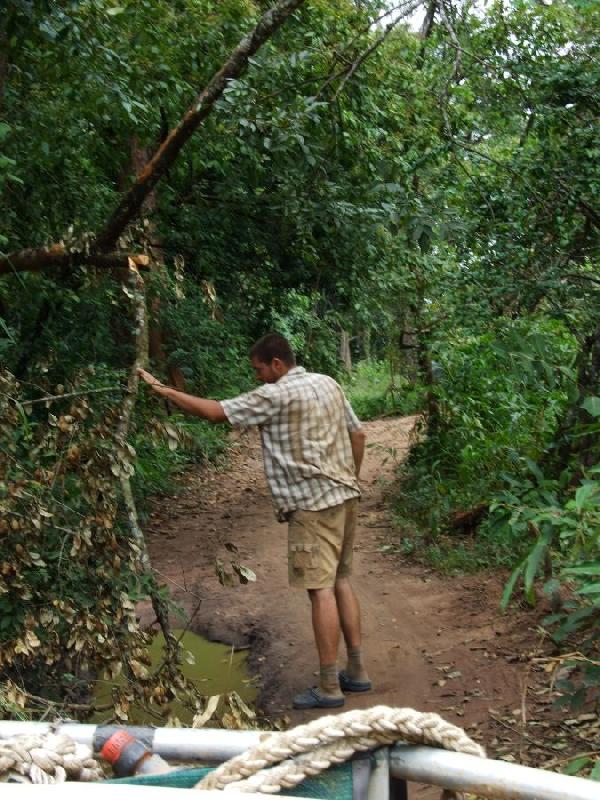
Erosian can do strange things... sometimes it even creates a perfect piste! These bits were short but it was great to use third gear for a change!
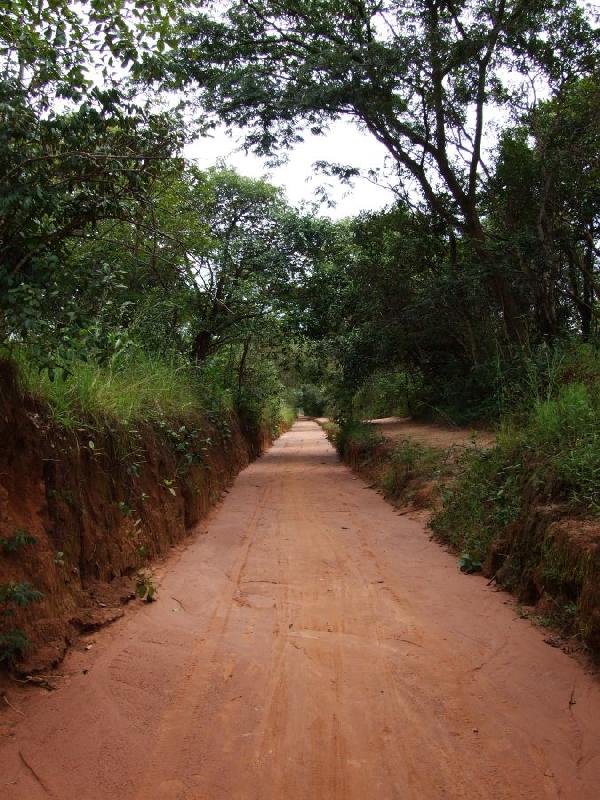
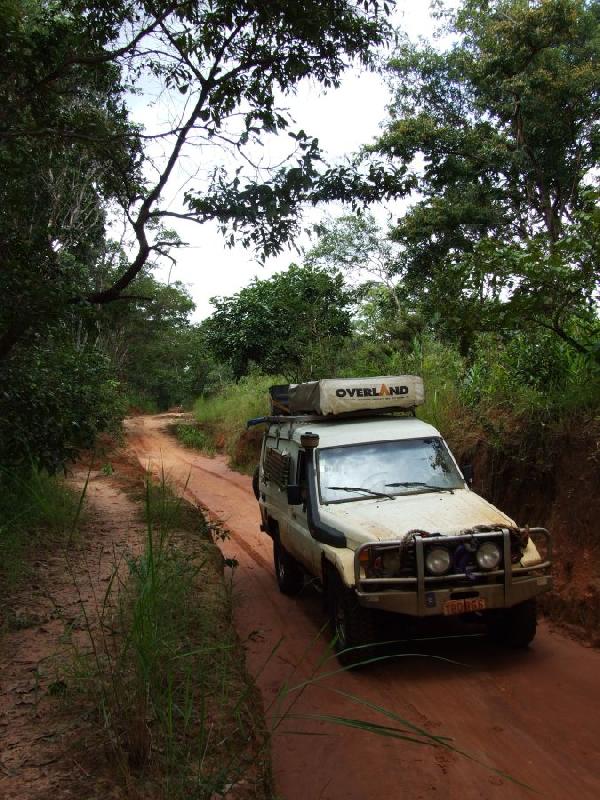
In the dense forest we often bumped into things. We accumulated small dents. Our bullbar also took a good hit when drove into a cut off tree that was hidden in the bushes.
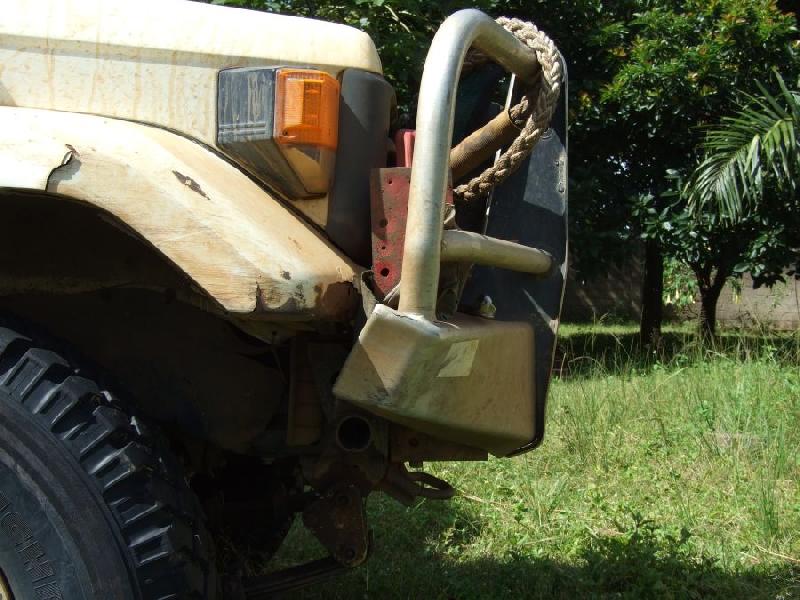
As said, there is no trough
traffic. Everything is done by train or air. Trucks are sometimes used
to transport goods to area that are further away of the railline. They
usually run on a fixed traject between settlements. They never venture
further.
It is also a seasonal activity. They drive until the rainy season starts and the roads become impossible.
This was the start of the rainy season. We came across a stuck truck (can you see the constant here... every vehicle we pass is stuck :wink: ). They were offloading the load onto bicycles. There are very few trucks here, and none of them wanted to take the risk to pull him out now that the rainy season had started. The truck would be here for several months until the mudpit he was in would dry out.
Upon seeing us they got a bit excited and asked for all sorts of things. Whiskey and mobile phones mostly. That was a welcome (?) change from the usual demands for "Un jus" or money. They also asked for water and we poured water from our own bottles into their bottles. We had to throw away our bottles afterwards because of the horrible smell of cheap whiskey that came out ouf their bottles.
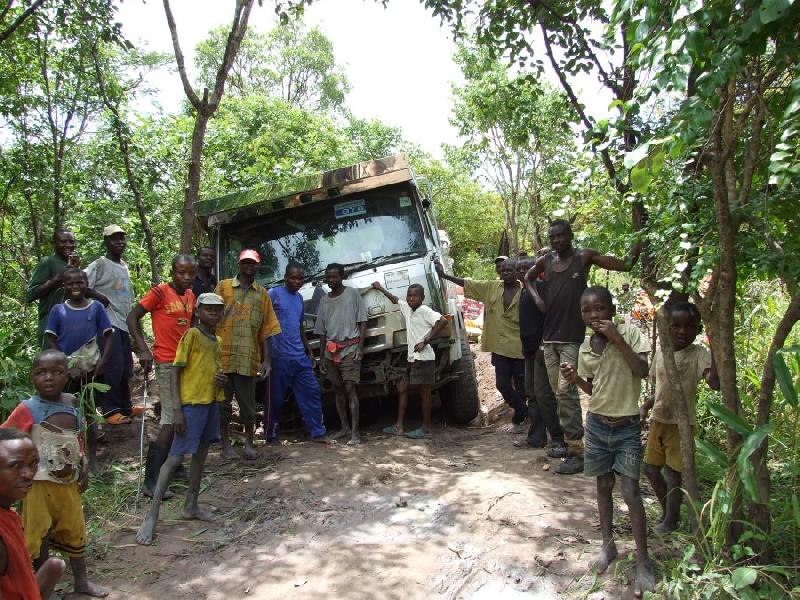
It is also a seasonal activity. They drive until the rainy season starts and the roads become impossible.
This was the start of the rainy season. We came across a stuck truck (can you see the constant here... every vehicle we pass is stuck :wink: ). They were offloading the load onto bicycles. There are very few trucks here, and none of them wanted to take the risk to pull him out now that the rainy season had started. The truck would be here for several months until the mudpit he was in would dry out.
Upon seeing us they got a bit excited and asked for all sorts of things. Whiskey and mobile phones mostly. That was a welcome (?) change from the usual demands for "Un jus" or money. They also asked for water and we poured water from our own bottles into their bottles. We had to throw away our bottles afterwards because of the horrible smell of cheap whiskey that came out ouf their bottles.

Approaching Kamina we could see
people were dressed better. They actually waved to say hello. We saw
kids in school uniforms. We were nearing a major town.
We rolled into Kamina and had a warm welcome by several "frères" (Brothers), among them Frère Louis, the belgian brother that hosted us in Luena. The other frères were Croatian. They all have their missions deep in the brousse, but this week they had their annual gettogether.
The missions was big and well organized. They had all the facilities, even a workshop. They were responsible for almost everything functional in Kamina. Churches, school, farms, factories, ...
They had several trucks and each brother had his own 4x4 to sevice their mission. In these circumstance only 1 vehicle is considered.
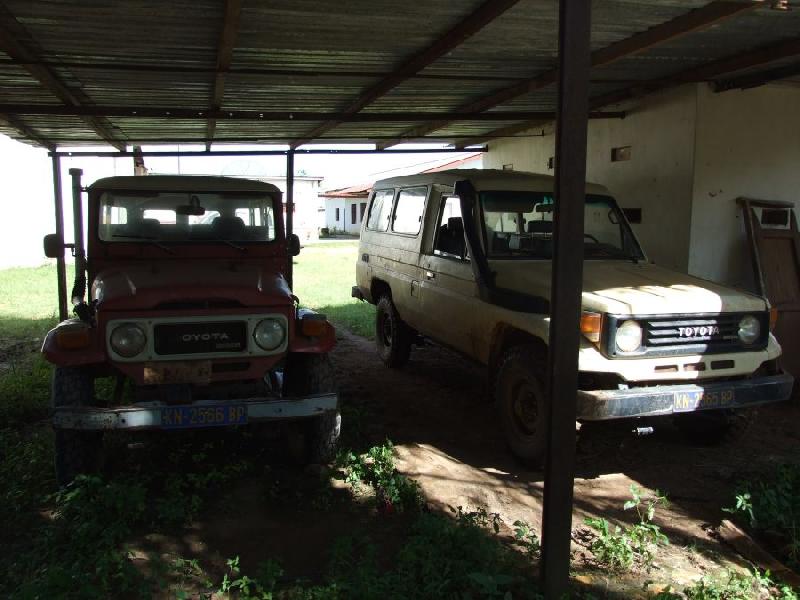
The 40 series was discontinued and no longer had an engine.
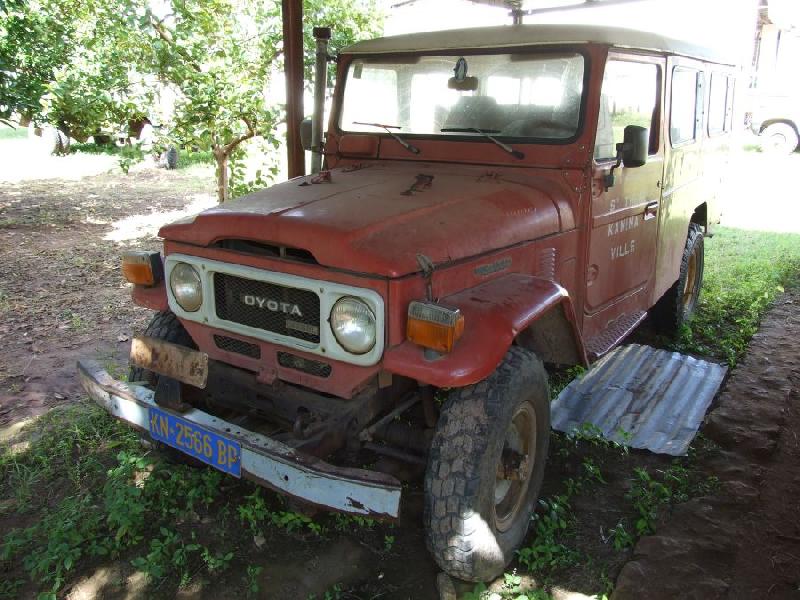
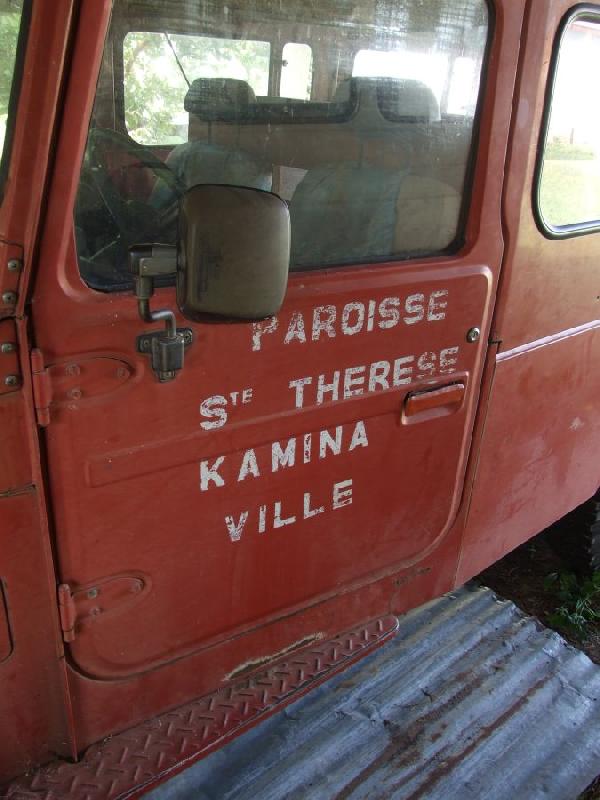
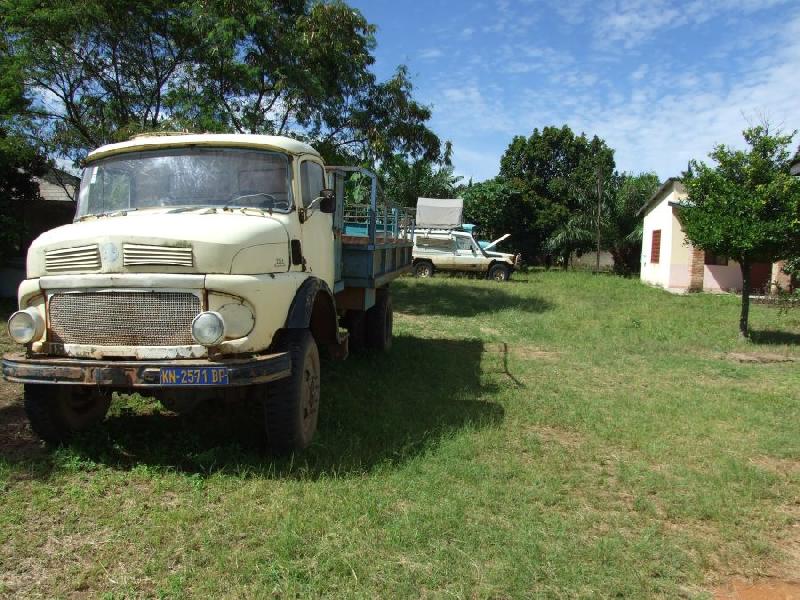
We rolled into Kamina and had a warm welcome by several "frères" (Brothers), among them Frère Louis, the belgian brother that hosted us in Luena. The other frères were Croatian. They all have their missions deep in the brousse, but this week they had their annual gettogether.
The missions was big and well organized. They had all the facilities, even a workshop. They were responsible for almost everything functional in Kamina. Churches, school, farms, factories, ...
They had several trucks and each brother had his own 4x4 to sevice their mission. In these circumstance only 1 vehicle is considered.

The 40 series was discontinued and no longer had an engine.



The last few times we started
the engine we could hear the batteries were having a hard time turning
around the starter motor. Upon checking we noticed that the alternator
was shot. The batteries would have 1 or 2 more starts in it, but then it
would be finished.
This couldn't have happened in a better place ofcourse. The mechanics from the missions dismantled the alternator and found the brushes to be worn down. Spares were ofcourse not at hand, but they found an alternator from a broken down hilux and used those brushes. It worked perfectly.
Up until now this fixed alternator is still in our Landcruiser.
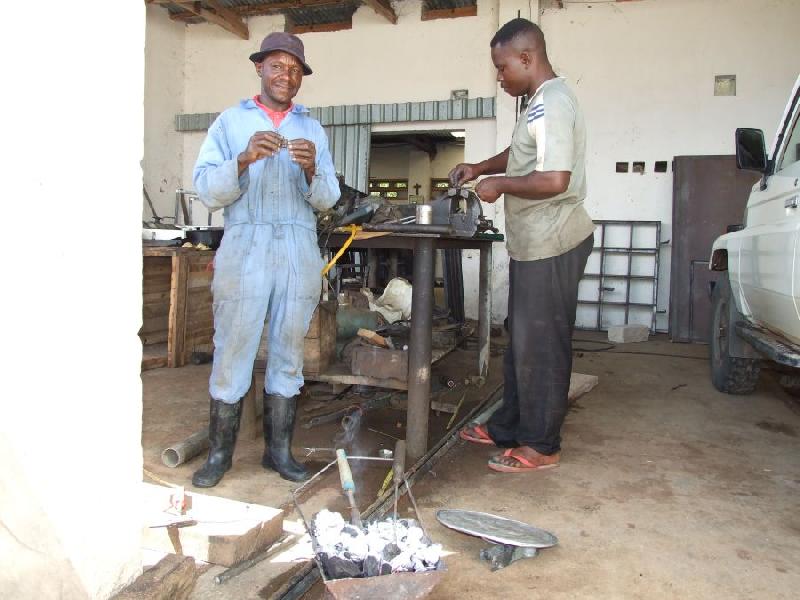
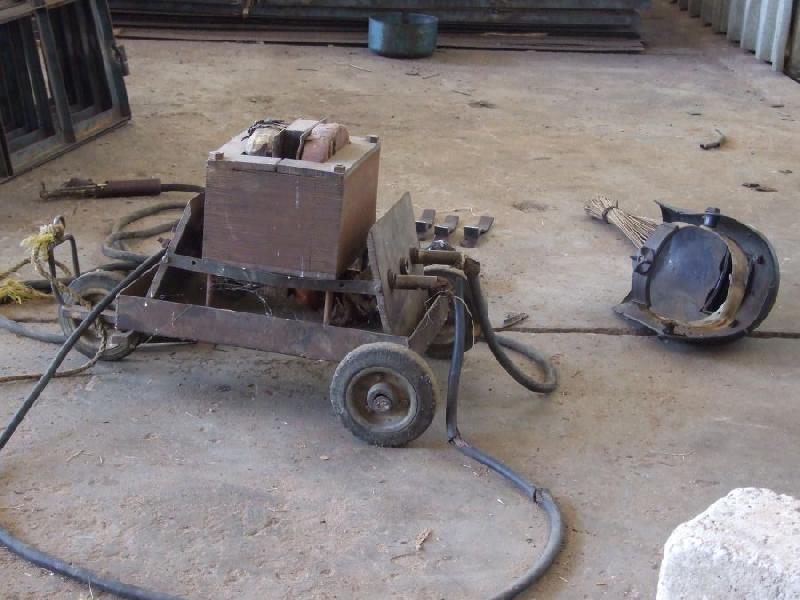
The guys in the workshop were really friendly and extremely proud of their jobs. Nice people!
We felt like we were in heaven at the mission. Everybody was friendly, we had the opportunity to take our first shower since leaving Lubumbashi. And they had beer! Yeah!
That night we talked for hours with Frère Louis. Our little adventures here dissapear in the nothing compared to everything he went trough. He had been in DRC for over 40 years, he stayed during all the wars. He had to abandon everything and run for his live three times as teams were sent out to kill him. But he always returned. Many books could be filled with his adventures.
He is also responsible for most of the bridges Katanga. He build hundreds of bridges himself. He has a small working budget from Franciscans, but he funds most of it all by himself. He has put every last penny in the Congolese people. That is why his house in Luena was so rundown.
He also told us about the Mayi-Mayi rebels that still roam the jungle. We were not prepared for the horror stories we would hear. I still have problems giving these stories a place. They are not just stories though, he gave us a 100 page document with his interviews of victims. If you thought, like us, that cannibalism was something that belonged in comic books and dusty museums about Africa. You are wrong.
A few excerpts from his document..
This couldn't have happened in a better place ofcourse. The mechanics from the missions dismantled the alternator and found the brushes to be worn down. Spares were ofcourse not at hand, but they found an alternator from a broken down hilux and used those brushes. It worked perfectly.
Up until now this fixed alternator is still in our Landcruiser.


The guys in the workshop were really friendly and extremely proud of their jobs. Nice people!
We felt like we were in heaven at the mission. Everybody was friendly, we had the opportunity to take our first shower since leaving Lubumbashi. And they had beer! Yeah!
That night we talked for hours with Frère Louis. Our little adventures here dissapear in the nothing compared to everything he went trough. He had been in DRC for over 40 years, he stayed during all the wars. He had to abandon everything and run for his live three times as teams were sent out to kill him. But he always returned. Many books could be filled with his adventures.
He is also responsible for most of the bridges Katanga. He build hundreds of bridges himself. He has a small working budget from Franciscans, but he funds most of it all by himself. He has put every last penny in the Congolese people. That is why his house in Luena was so rundown.
He also told us about the Mayi-Mayi rebels that still roam the jungle. We were not prepared for the horror stories we would hear. I still have problems giving these stories a place. They are not just stories though, he gave us a 100 page document with his interviews of victims. If you thought, like us, that cannibalism was something that belonged in comic books and dusty museums about Africa. You are wrong.
A few excerpts from his document..
I was
not sure if I was going to post this installment, but I feel it is an
important part of our experience in Congo. Nevertheless:
WARNING !!! If you are a sensitive person, skip this post. You can continue reading the rest of the report and you will not even notice you did not read this post. It contains background information on DRC but it is pretty horrific to read and not for the faint hearted.
So, some excerpts out the witness stories Frère Louis gathered. The reports are mixed in Dutch and French. I will quote them and (freely) translate into English, apologies if I make mistakes. I removed the names from the documents for privacy reasons.
20/04/2002
(this is during the "Second Congo War" : http://en.wikipedia.org/wiki/Second_Congo_War )
05/ 12/ 2004.
This is after the war officially ended.
21/04/2006
--
I just selected some random pages of the 131 page long document and copied these excerpt. It is an endless accumulation of horror witness reports. All of this happened on a large scale, and only covers the area where Frére Louis operates in.
When the war ended (+- 2002) most of these activities stopped in this area. The May-may retreated north where they are still operational (the East Congo drama... still going on).
These things were regularly going on until 2 years before we drove trough the area. It was still very fresh in the memory of everybody we must have met on the road. This also explains the huge amount of orphans in these areas.
--
Let's put this in a bit of perspective: Frère Louis told us some of these stories while we were sitting in the comforts of the Kamina mission. He told the stories as if it was a daily occurance.. and that was actually the case indeed. At that moment we were shocked, but thought this was something of the (distant) past. And it was - at least in this area. It is only until after the trip, when we started reading his document, that we started to comprehend the large scale of the massacres that had been going on here.
We were here in 2008. The last reports of cannibalism in this area were from 2006.
All of the people we met in the DRC must have been confronted, one way or another, with these horrible events.
I never heard anything about this in the international news
WARNING !!! If you are a sensitive person, skip this post. You can continue reading the rest of the report and you will not even notice you did not read this post. It contains background information on DRC but it is pretty horrific to read and not for the faint hearted.
So, some excerpts out the witness stories Frère Louis gathered. The reports are mixed in Dutch and French. I will quote them and (freely) translate into English, apologies if I make mistakes. I removed the names from the documents for privacy reasons.
20/04/2002
(this is during the "Second Congo War" : http://en.wikipedia.org/wiki/Second_Congo_War )
"Y"'s brother went fishing in Missa and saw mischief like cutting of ears. They fry the ears in a pan eat them. They make the victims look at how their own ears are being fried and eaten. They are being accused of cooperation with the Congolese FAC army. The May May continue to eat humans. Y's brother managed to escape to Bukama, this is where I met him.Frère Louis said:
They kill those four soldiers and eat them. They then carry one of the heads of the murdered soldiers to Kintobongo and put the head on the table in our mission. They do this as warning not to attack hem, if not this is what happens.Frère Louis said:
..The hunters (May-May) asked food at the woman of Chef Kitumba. The women told they did not have food. The hunters then demanded that they roast their children for them to eat.Frère Louis said:
05/ 12/ 2004.
This is after the war officially ended.
I made use of the time my two guards entered their hut to eat the meal they made out of a young woman that the MayMay just killed.Witness said:
21/04/2006
The commander Bati dared to display a naked woman. With a pen he pointed at every part of the "intimate organs" and told the onlookers the names in dialect. What a humiliation.Frère Louis said:
We are living in a situation of pure and simple cannibalism. The may-may plunder, rape and kill the civilian population. They then eath their meat, raw or smoked. This is true for the May-MAy chief Kabale, who was killed recently (15/05/2006) by the population of Kayumba.Frère Louis said:
--
I just selected some random pages of the 131 page long document and copied these excerpt. It is an endless accumulation of horror witness reports. All of this happened on a large scale, and only covers the area where Frére Louis operates in.
When the war ended (+- 2002) most of these activities stopped in this area. The May-may retreated north where they are still operational (the East Congo drama... still going on).
These things were regularly going on until 2 years before we drove trough the area. It was still very fresh in the memory of everybody we must have met on the road. This also explains the huge amount of orphans in these areas.
--
Let's put this in a bit of perspective: Frère Louis told us some of these stories while we were sitting in the comforts of the Kamina mission. He told the stories as if it was a daily occurance.. and that was actually the case indeed. At that moment we were shocked, but thought this was something of the (distant) past. And it was - at least in this area. It is only until after the trip, when we started reading his document, that we started to comprehend the large scale of the massacres that had been going on here.
We were here in 2008. The last reports of cannibalism in this area were from 2006.
All of the people we met in the DRC must have been confronted, one way or another, with these horrible events.
I never heard anything about this in the international news
Damn,
I made a mistake in my report and skipped a day. Apologies. After our
little ordeal with the "runners" we actually struggled on until we
reached Kabondo Dianda.
So, Our progress after day 5 was:
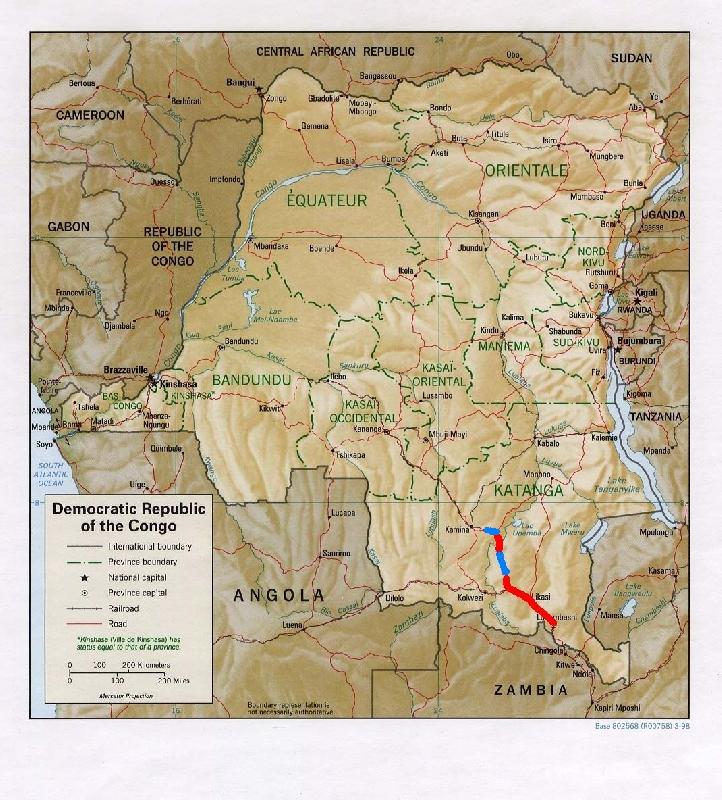
And now after day 6 we got to Kamina (75km from Kabondo Dianda... takes a full day of driving)
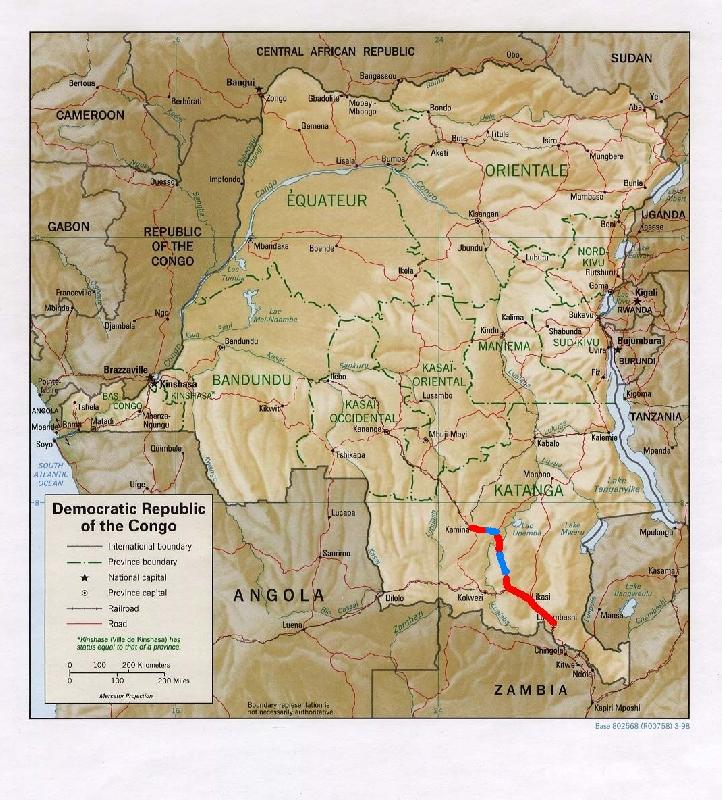
So, the corrected overview is:
Day 1: Kansenia
Day 2: Rest day Kansenia
Day 3: Unknwon village
Day 4: Luena
Day 5: Kabondo Dianda
Day 6: Kamina
Sorry
So, Our progress after day 5 was:

And now after day 6 we got to Kamina (75km from Kabondo Dianda... takes a full day of driving)

So, the corrected overview is:
Day 1: Kansenia
Day 2: Rest day Kansenia
Day 3: Unknwon village
Day 4: Luena
Day 5: Kabondo Dianda
Day 6: Kamina
Sorry
We stayed another day (day 7) in Kamina and talked for hours with Frère Louis and got ourselves organized again.
Day 8
Our stay in the mission in Kamina was really great. We got our alternator fixed, had great conversations with the brothers, drank as much beer as we wanted and had some good food. We even managed to dry out our tent.
When we wanted to leave we wanted to pay for the repairs, the accomodation and the beer but they refused. They were so happy to have visitors. Genuinely great people, the fathers Franciscan at Kamina. They have my greatest respect!
We were invited to join breakfast and received lots and lots of information on the roads that we would be taking in the next days. They never drive all the way to Kananga (next big town), but they know all the roads and backroads in the area. Not surprising, as most of them were built by them.
It's funny how a brother in a white gown explains the best way how to take certain obstacles and which gears to use. They must have been one of the most experienced 4x4 drivers in Africa!
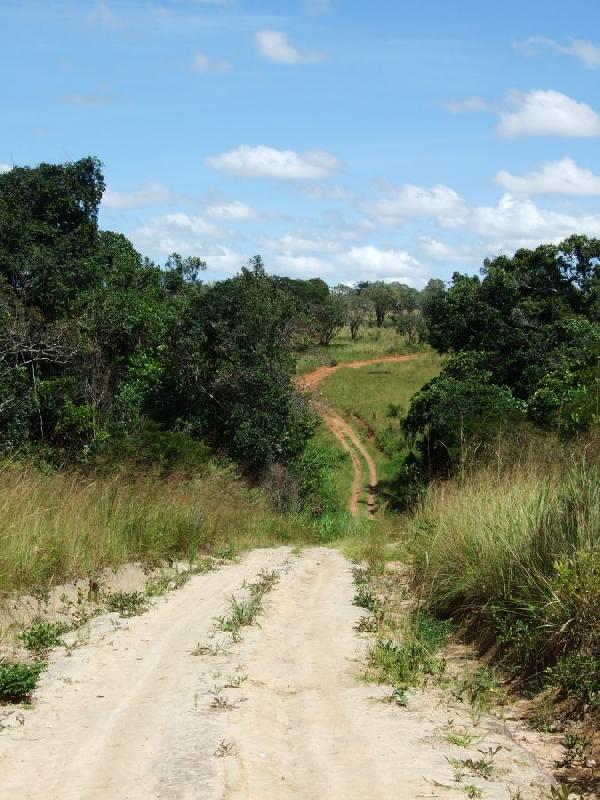
The landscape opened up a bit. Until now we were mostly driving trough jungle forest. Now we entered a more steppe-like area. The road was still mostly sandy, with muddy patches in between.
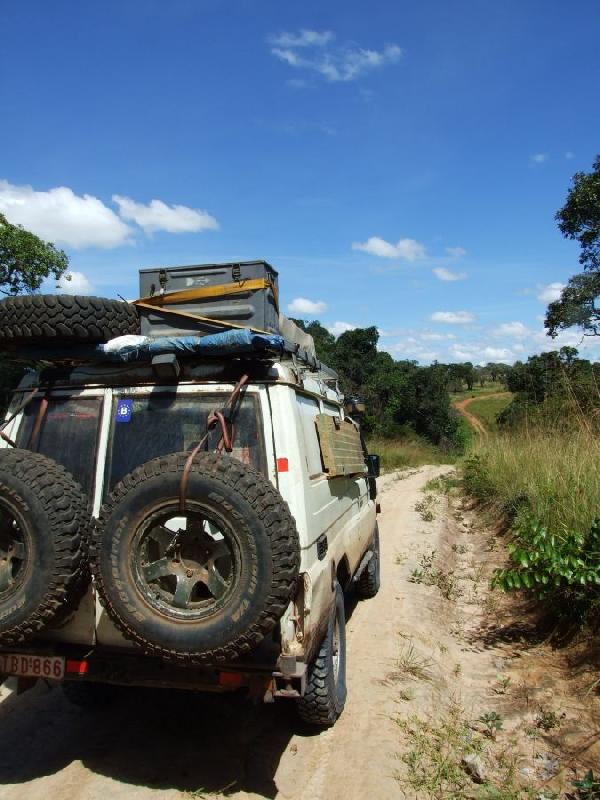
We approached another big farm(ranch?). The Route National went around the farm but was in a horrible state. The farm had a network of excellent dirt roads that could bypass a large part of the RN1. We were stopped at a "toll booth" but upon mentioning that we were friends of the Fathers we can pass for free.
We travel fast now, great little sandy tracks trough the steppe. Yihaa!
Until we reach the next obstacle... one we did not expect!
Day 8
Our stay in the mission in Kamina was really great. We got our alternator fixed, had great conversations with the brothers, drank as much beer as we wanted and had some good food. We even managed to dry out our tent.
When we wanted to leave we wanted to pay for the repairs, the accomodation and the beer but they refused. They were so happy to have visitors. Genuinely great people, the fathers Franciscan at Kamina. They have my greatest respect!
We were invited to join breakfast and received lots and lots of information on the roads that we would be taking in the next days. They never drive all the way to Kananga (next big town), but they know all the roads and backroads in the area. Not surprising, as most of them were built by them.
It's funny how a brother in a white gown explains the best way how to take certain obstacles and which gears to use. They must have been one of the most experienced 4x4 drivers in Africa!

The landscape opened up a bit. Until now we were mostly driving trough jungle forest. Now we entered a more steppe-like area. The road was still mostly sandy, with muddy patches in between.

We approached another big farm(ranch?). The Route National went around the farm but was in a horrible state. The farm had a network of excellent dirt roads that could bypass a large part of the RN1. We were stopped at a "toll booth" but upon mentioning that we were friends of the Fathers we can pass for free.
We travel fast now, great little sandy tracks trough the steppe. Yihaa!
Until we reach the next obstacle... one we did not expect!
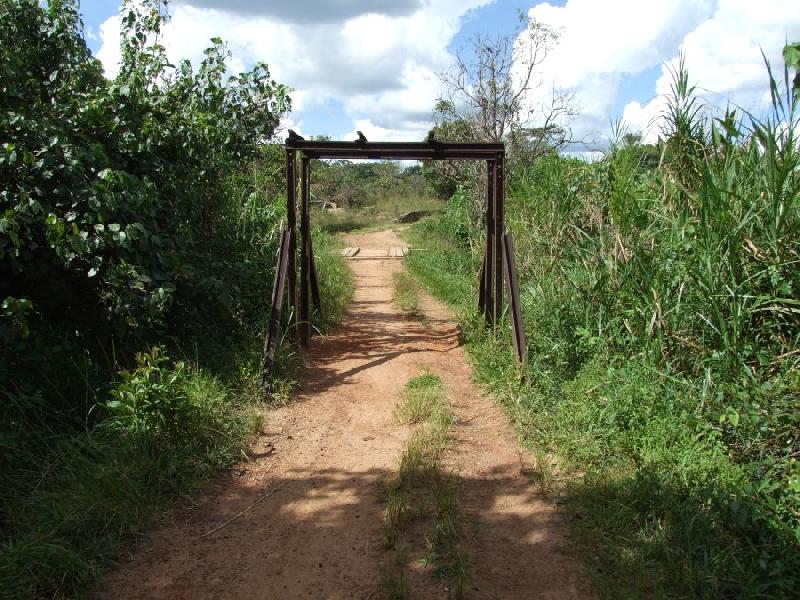
I can see you thinking... what the * is that?
That were pretty much our thoughts too. We were still on the private roads of the farm. The alternative, the RN1, was really horrible, so whomever needed to pass trough here preferred to take the private roads, even if that meant paying a fee. But the farm wanted to prevent trucks from taking their roads, as they erode the sandy tracks and destroy them.
The road led trough a large marsh and spot in the middle they build that "thing". It was about 2,4meter high. Great way of preventing trucks from passing. But with our rooftop tent on we were about 2,6meter high.
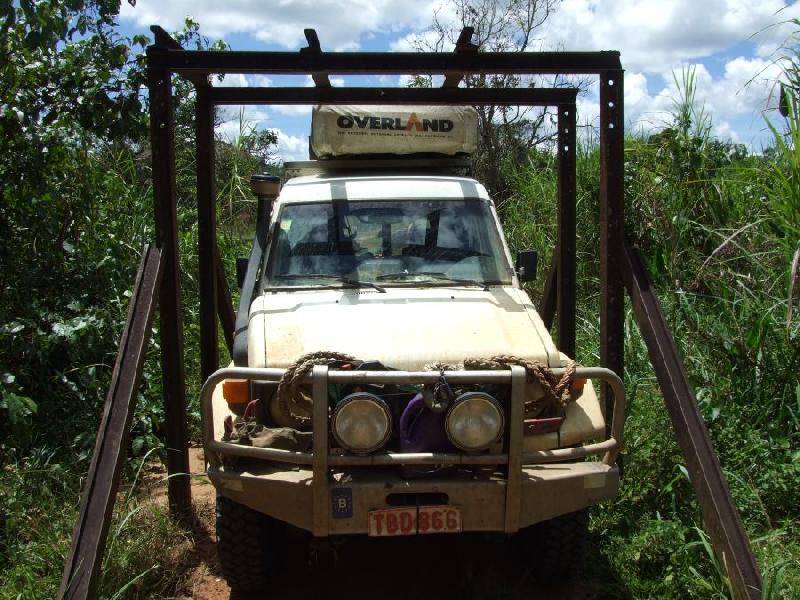
Tough luck...
It was midday. The sun was
particularely fierce today and we had little shade. Returning to the
RN1 was not really an option for us. We checked out the area and driving
around it was no option either.
We started by digging into the ground underneath the construction. It was well thought out as the base was a metal plate. We cleared the plate of all ground... another 5mm won :roll:
The tyres were let down to 0,5 bar but we were still too high. We opened the rooftoptent and removed the mattres, pillows, ... .
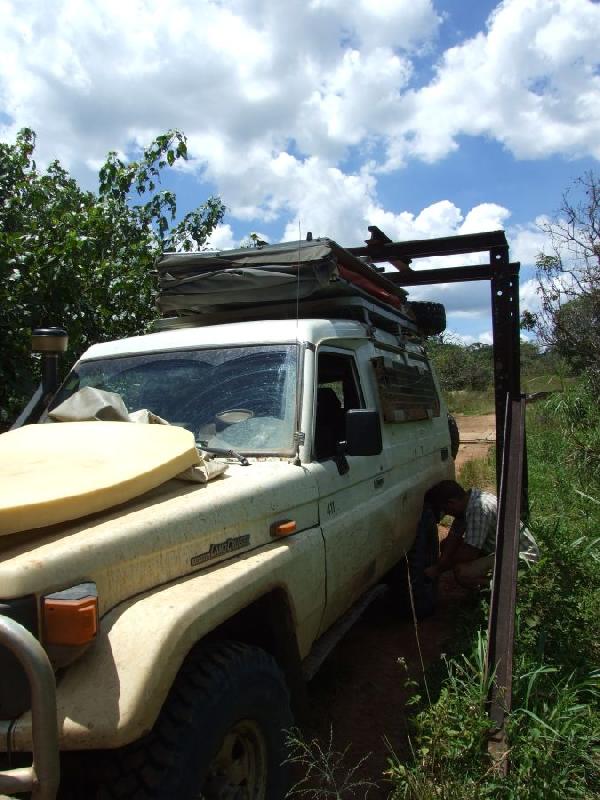
The front cleared now, but the back of the car was still too high. We let out all of the remaining air out of tyres (0bar)... still no go :?
So I climbed on the roof and Josephine took the wheel. We counted to three and I jumped on the roof while Josephine moved forward for a few centimeter at a time. And counted to 3 again, etc... It scraped a bit, but it worked.
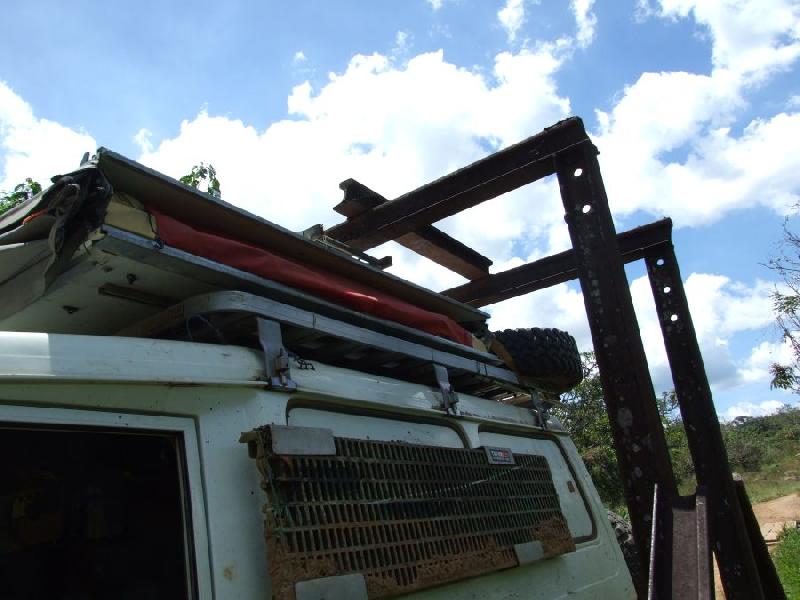
Once we passed we got the compressor out to inflate the tyres again. I really did not want to damage the tyres here!
First tyre, Ok, switches the hose to the second tyre and then *poof* the compressor died. :tantrum:
These kind of things really eat at you. Patience is virtue, but when you are trying to move forward so desperately you really don't want a compressor to die!
Checked the fuse, checked cabling, checked overheat protection. Everything look allright?? This is the moment were you kick a tree (it hurts) out of frustration. We had three flat tyres and we only had two spares. We needed that compressor!
So in the midday heat I started to dismantle the compressor. The compressor was bolted on the roof, so I had to work on the roof... no shade there..
We started by digging into the ground underneath the construction. It was well thought out as the base was a metal plate. We cleared the plate of all ground... another 5mm won :roll:
The tyres were let down to 0,5 bar but we were still too high. We opened the rooftoptent and removed the mattres, pillows, ... .

The front cleared now, but the back of the car was still too high. We let out all of the remaining air out of tyres (0bar)... still no go :?
So I climbed on the roof and Josephine took the wheel. We counted to three and I jumped on the roof while Josephine moved forward for a few centimeter at a time. And counted to 3 again, etc... It scraped a bit, but it worked.

Once we passed we got the compressor out to inflate the tyres again. I really did not want to damage the tyres here!
First tyre, Ok, switches the hose to the second tyre and then *poof* the compressor died. :tantrum:
These kind of things really eat at you. Patience is virtue, but when you are trying to move forward so desperately you really don't want a compressor to die!
Checked the fuse, checked cabling, checked overheat protection. Everything look allright?? This is the moment were you kick a tree (it hurts) out of frustration. We had three flat tyres and we only had two spares. We needed that compressor!
So in the midday heat I started to dismantle the compressor. The compressor was bolted on the roof, so I had to work on the roof... no shade there..
The problem with the
compressor was electrical. A cable inside the compressor worked itself
loose. As expected it was that one cable that is almost impossible to
reach. :twisted: Eventually we got it fixed, managed to inflate the
tyres, put everything in the RTT again and we could continue.
3 hours wasted to cross an obstacle that isn't supposed to be an obstacle... :O Of all the problems we had in Congo, this was the most ridiculous one :roll:
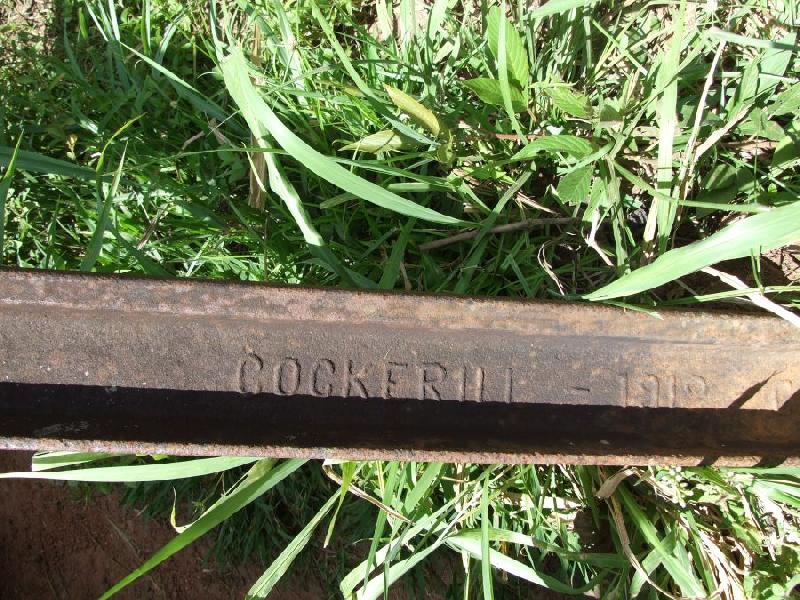
Stupid Belgians! (-> http://en.wikipedia.org/wiki/John_Cockerill_&_Cie. )
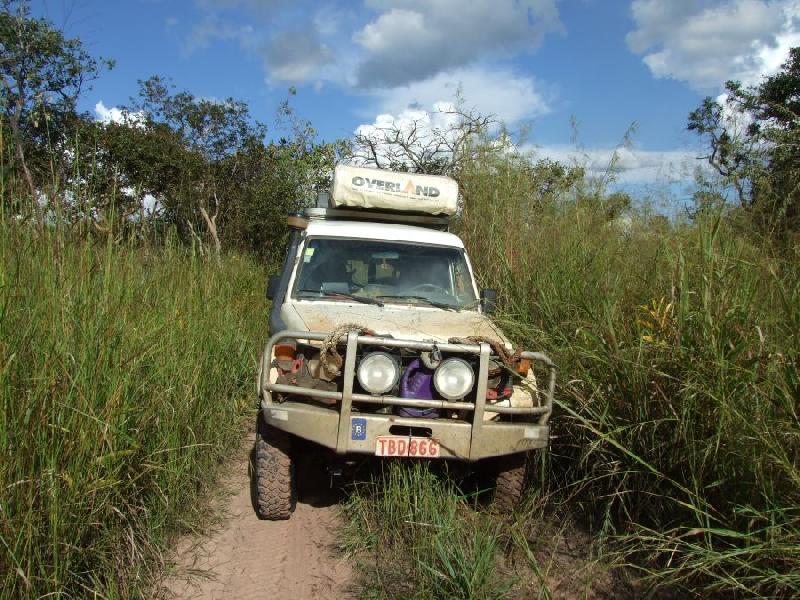
We continued trough grassy fields.... which were on fire! 8O
At the beginning of the rainy season/ end of the harvest they burn their fields but they did have some issues with the firecontrol I must say. We were just hoping that we wouldn't drive straight into a fire. For the next hours we saw nothing at all really...
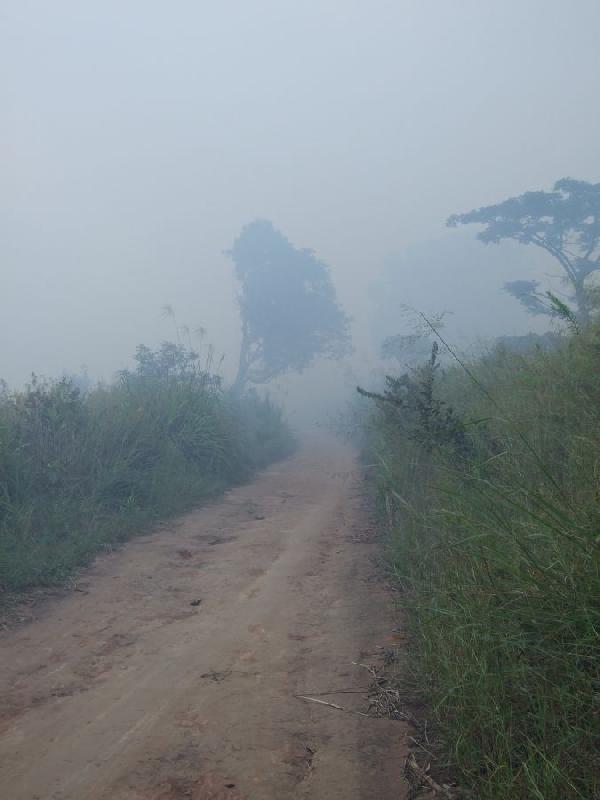
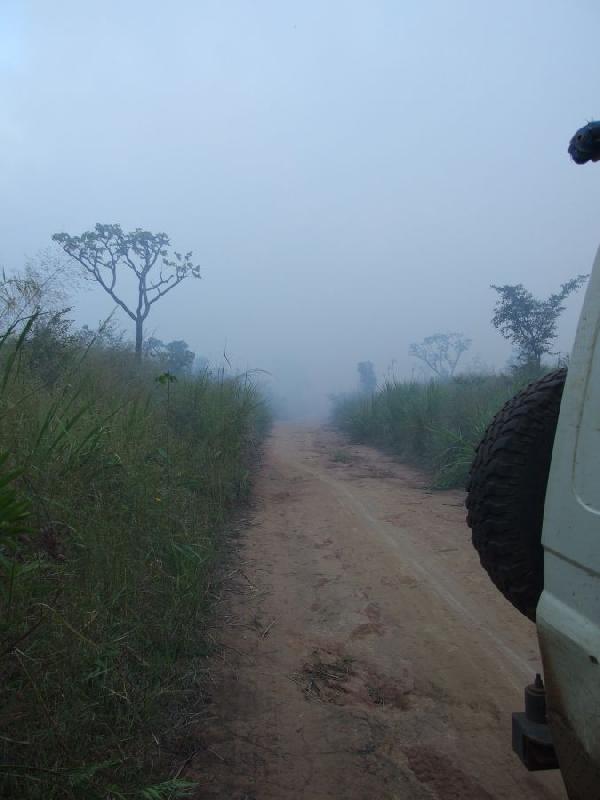
Also note the total lack of tyre tracks on these pistes. The only tracks that exist are bicycle tracks.
3 hours wasted to cross an obstacle that isn't supposed to be an obstacle... :O Of all the problems we had in Congo, this was the most ridiculous one :roll:

Stupid Belgians! (-> http://en.wikipedia.org/wiki/John_Cockerill_&_Cie. )

We continued trough grassy fields.... which were on fire! 8O
At the beginning of the rainy season/ end of the harvest they burn their fields but they did have some issues with the firecontrol I must say. We were just hoping that we wouldn't drive straight into a fire. For the next hours we saw nothing at all really...


Also note the total lack of tyre tracks on these pistes. The only tracks that exist are bicycle tracks.
It
took somewhat longer then expected, but we reached our goal of the day.
The missions of Father Stoïn in Kimpanga. One of the Croatian fathers
we met in Kamina.
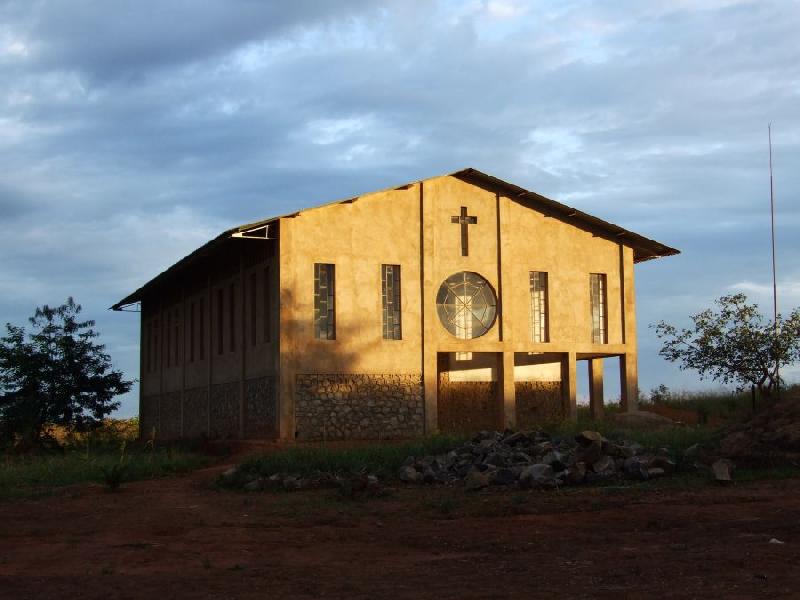
His church was still smelling like new! The inside was still a work in progress.
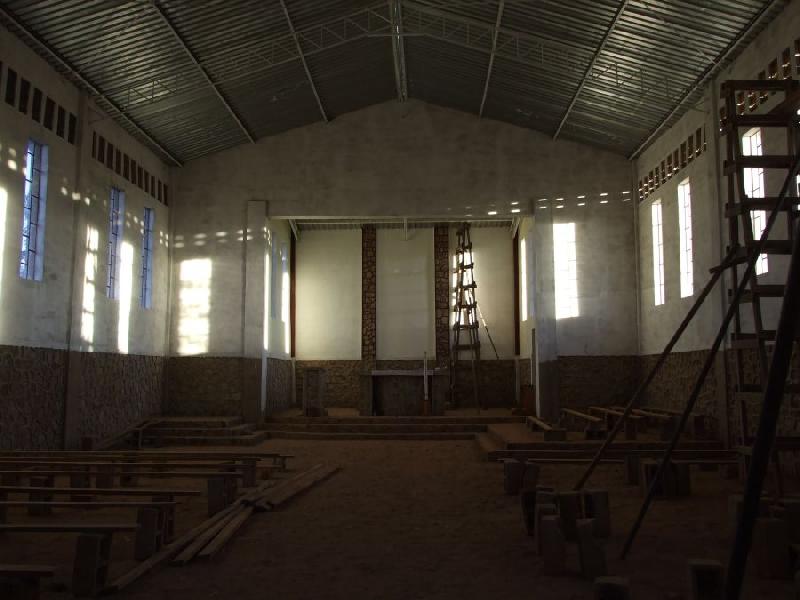
Upon arrival in 'his' village all of the children ran to meet us. They sang and danced. What a welcome! Although I wished they wouldn't have danced on our wheelcarrier... :roll:
A big crowd followed us trough the village and onto the mission. Father Stoïn must have been a popular guy. We did our talks with the village people (happy people!) and were already getting scared that this would once again be one of those zero-privacy nights. Father Stoïn had given us a letter for Jean-Marie, the 'housekeeper' of the mission. It was a multi page letter, probably with all kinds of instructions. One of these instructions must have been that we were to be left alone. Jean Marie talked to the crowd and told them that we were very tired and needed rest. The crowd accepted that and went home.
We parked our car in the compound of the mission, with a beautiful view over the hilly landscape.
For the first time since we entered Congo we had a night for ourselves. We cooked up an improvised spagetti and opened up one of our 'emergency beers'. God, what a magnificently beautiful place this was. Complete with the sound of drums in the distance.
Father Stoïn, you have our eternal gratitude!
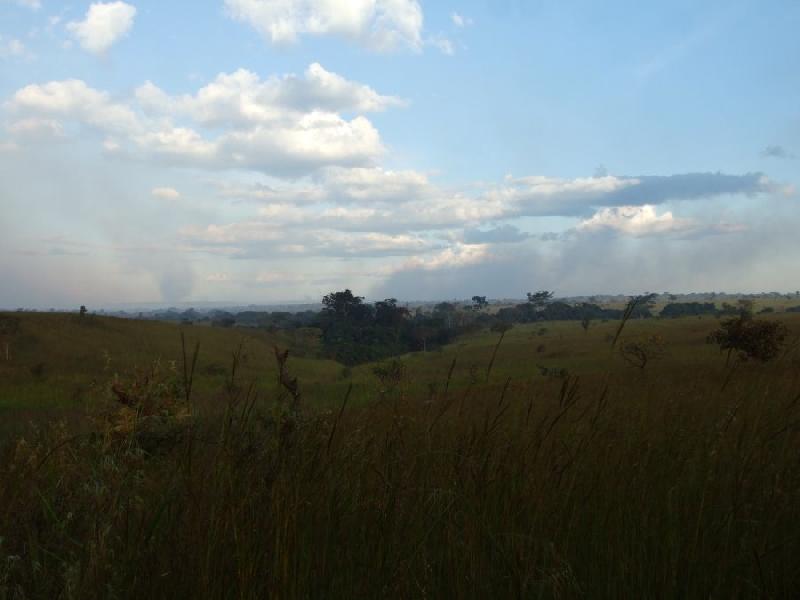

His church was still smelling like new! The inside was still a work in progress.

Upon arrival in 'his' village all of the children ran to meet us. They sang and danced. What a welcome! Although I wished they wouldn't have danced on our wheelcarrier... :roll:
A big crowd followed us trough the village and onto the mission. Father Stoïn must have been a popular guy. We did our talks with the village people (happy people!) and were already getting scared that this would once again be one of those zero-privacy nights. Father Stoïn had given us a letter for Jean-Marie, the 'housekeeper' of the mission. It was a multi page letter, probably with all kinds of instructions. One of these instructions must have been that we were to be left alone. Jean Marie talked to the crowd and told them that we were very tired and needed rest. The crowd accepted that and went home.
We parked our car in the compound of the mission, with a beautiful view over the hilly landscape.
For the first time since we entered Congo we had a night for ourselves. We cooked up an improvised spagetti and opened up one of our 'emergency beers'. God, what a magnificently beautiful place this was. Complete with the sound of drums in the distance.
Father Stoïn, you have our eternal gratitude!

Progress after Day 8 on the road. In Kimpanga.
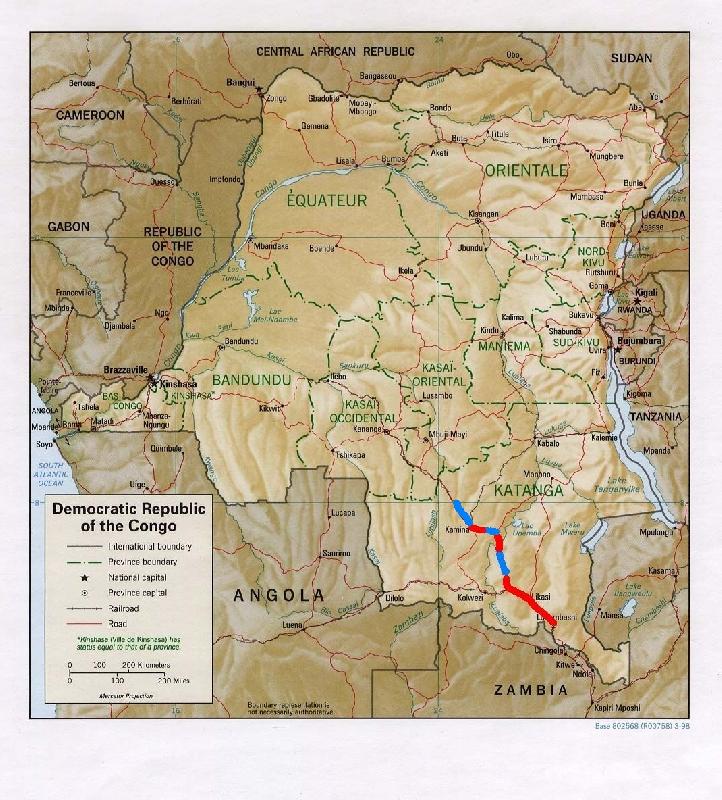

Day 9
Today would be a bit of a step into the unknown. Until now we were still in the Katanga province, we had excellent contacst with the Franciscans that operate here, but they do not operate in the Kasai province. Also, the only person we had found that had travelled these road was an Israeli guy wo attempted to cross Congo a few years ago. He got arrested at the border between Katanga and Kasai because he did not have a permit and got deported. He had to fly out from Mbuji Mayi.
Today we too would cross the border into Kasai. We only had a vague contact in Mbuji-Mayi, but nothing in between here and Mbuji-Mayi, and nothing afterwards either as a matter of fact.
This made us a bit more nervous as usual I must say...
The deeper we got into Congo, the less traffic there was. It's been days since we saw another vehicle on the road. Roads were getting more and more overgrown.
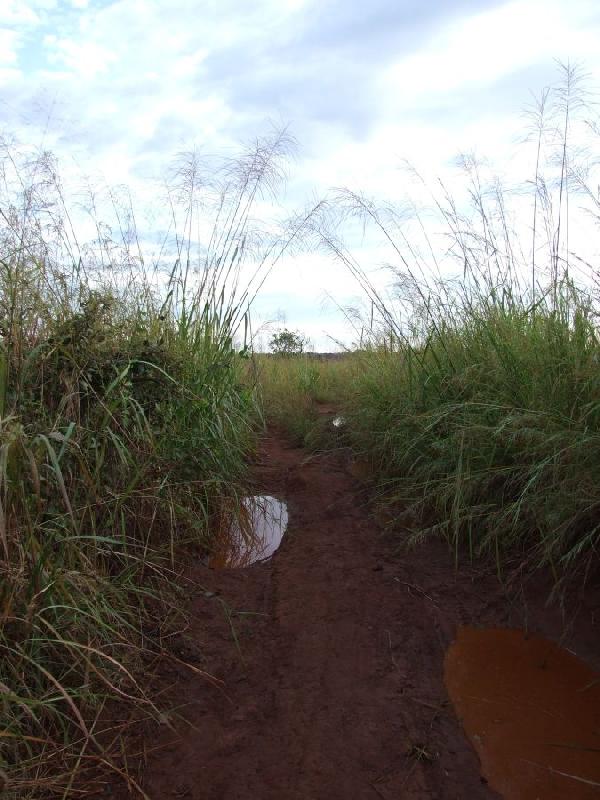
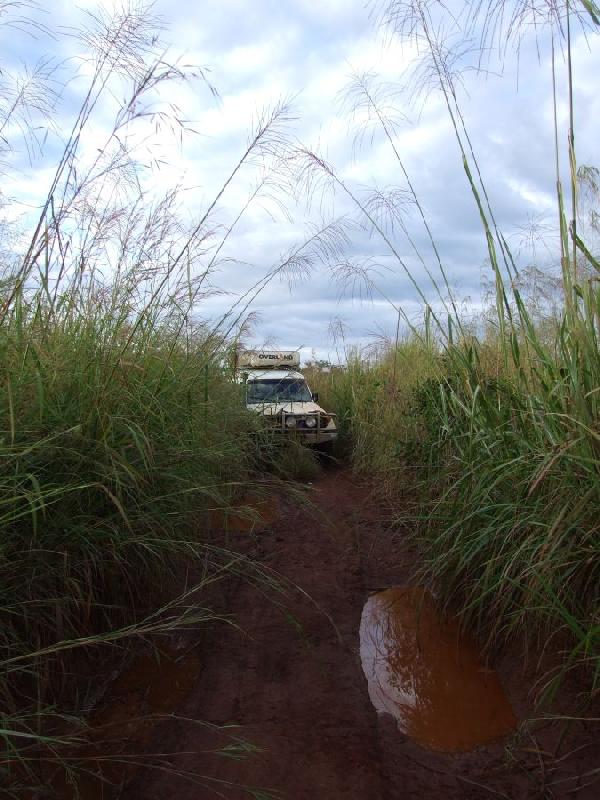
We like to think that the scenery here was fantastic... but we can't tell as we did not see much today..
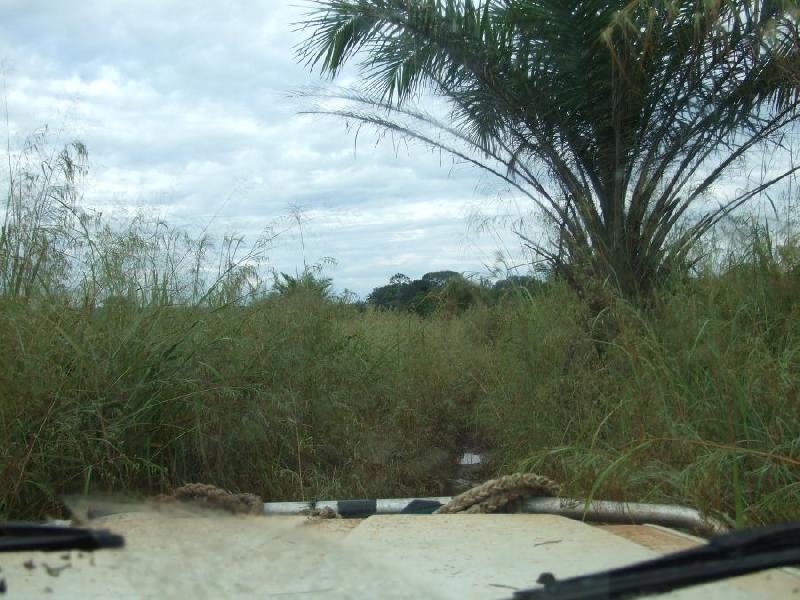
Today would be a bit of a step into the unknown. Until now we were still in the Katanga province, we had excellent contacst with the Franciscans that operate here, but they do not operate in the Kasai province. Also, the only person we had found that had travelled these road was an Israeli guy wo attempted to cross Congo a few years ago. He got arrested at the border between Katanga and Kasai because he did not have a permit and got deported. He had to fly out from Mbuji Mayi.
Today we too would cross the border into Kasai. We only had a vague contact in Mbuji-Mayi, but nothing in between here and Mbuji-Mayi, and nothing afterwards either as a matter of fact.
This made us a bit more nervous as usual I must say...
The deeper we got into Congo, the less traffic there was. It's been days since we saw another vehicle on the road. Roads were getting more and more overgrown.


We like to think that the scenery here was fantastic... but we can't tell as we did not see much today..

Progress was slow and we had to stop numerous times to inspect bridges.
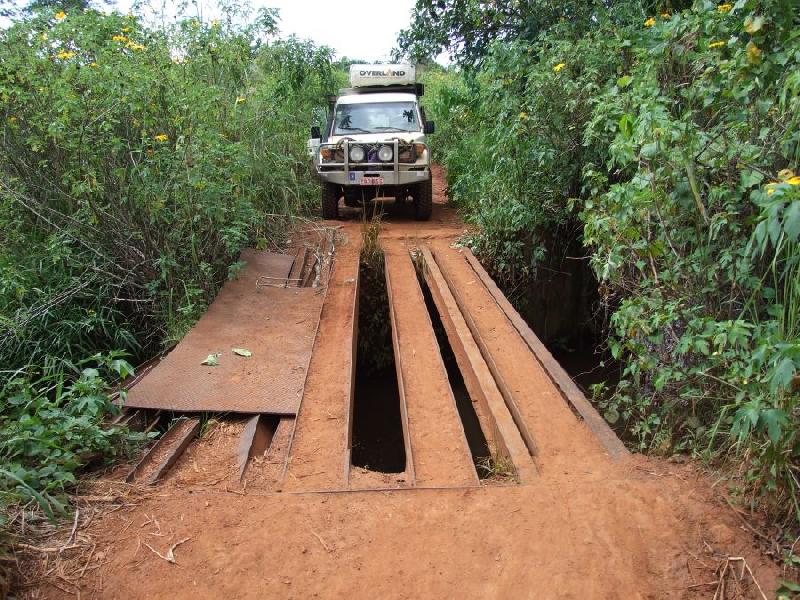
You cannot tell from this picture, but the iron beam underneath the iron plate was broken in two. We had to drive next to the plate. On the far side this meant we only had half a tyre on the bridge.
We were a well oiled team by now. The procedure was always the same. We both got out to inspect the bridge and decide on a traject. Josephine would give directions and I drove over. It usually took no longer then 15 minutes. In most cases we did not bother taking pictures, a shame because there we some beauties of bridges there ;-)
All in all we were very happy with the bridges we encountered as most were made of steel. We still had some bad memories from the wooden bridges in the 'other' Congo (Congo-Brazzavile) when we crashed trough a bridge last year
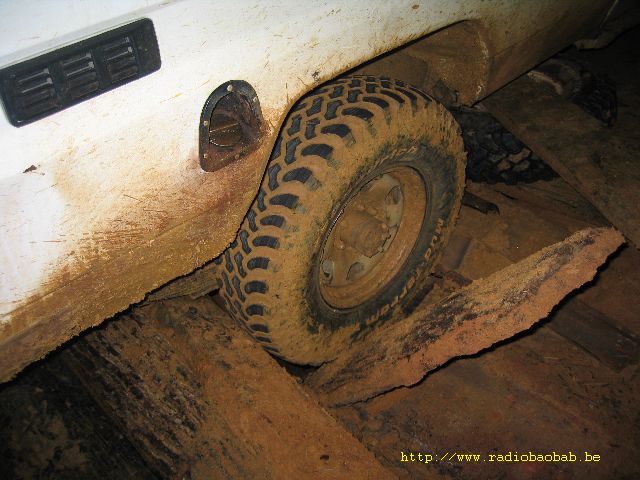

You cannot tell from this picture, but the iron beam underneath the iron plate was broken in two. We had to drive next to the plate. On the far side this meant we only had half a tyre on the bridge.
We were a well oiled team by now. The procedure was always the same. We both got out to inspect the bridge and decide on a traject. Josephine would give directions and I drove over. It usually took no longer then 15 minutes. In most cases we did not bother taking pictures, a shame because there we some beauties of bridges there ;-)
All in all we were very happy with the bridges we encountered as most were made of steel. We still had some bad memories from the wooden bridges in the 'other' Congo (Congo-Brazzavile) when we crashed trough a bridge last year

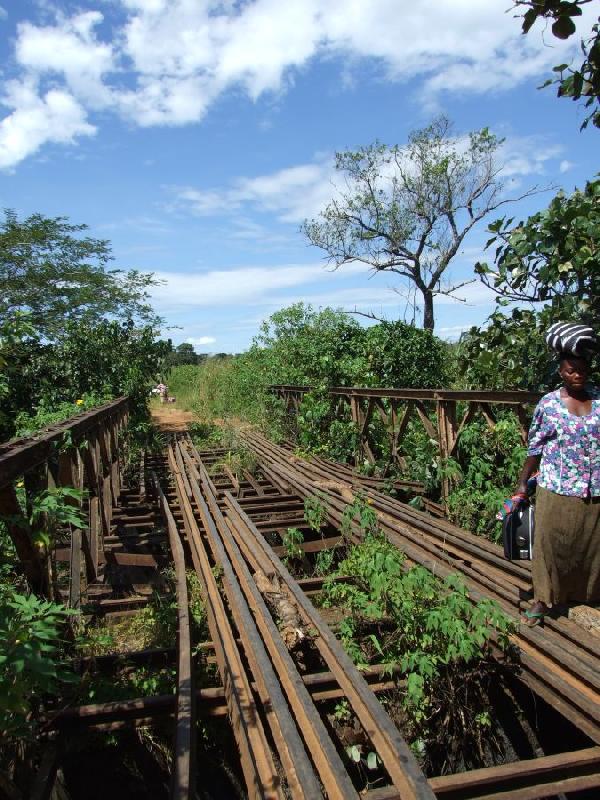
There are many bridges here and the road barely exists. We start to get difficulties with the erosion. For kilometers on end we drive at angles of 25° to 30°. We have to take it very very slowly
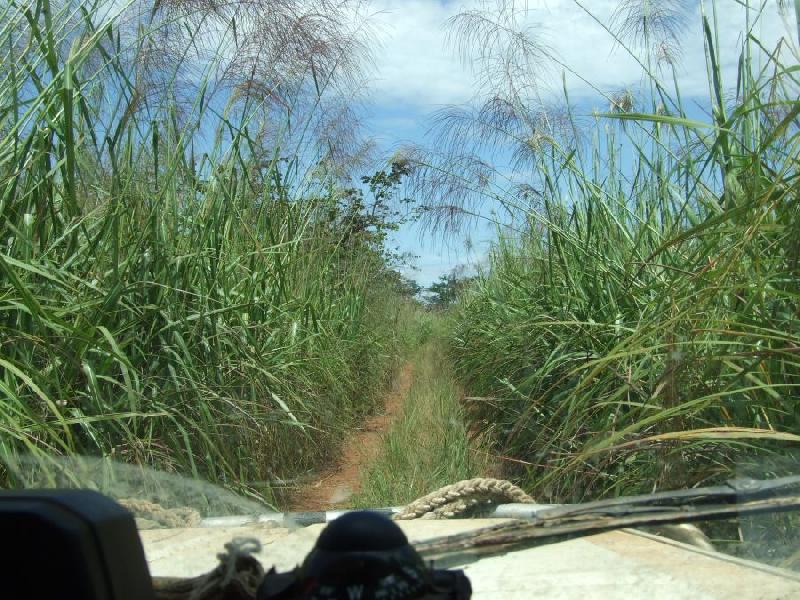
At one of the "flaque d'eau" I think it is not necessary to walk it first. I drive in with a bit of speed and our right side sinks away deeply. Water came in via the right window and the left wheels were of the ground, spinning wildly and giving us a mud shower trough the left window. I have the good reflex to steer into the pit.. we barely manage to stay upright. The interior of our car, ourselves included, are covered in mud. Great!
It was getting late and we started making mistakes again... time to stop before it gets dark. We did not make it into Kasai province today after all...
We stopped in the first village.
A car in the village.. with white people in it. Now that is an
attraction ofcourse. And if they are covered in mud from head to toe it
is even more interesting.
I do not have to explain we drew a bit of a crowd?
But people were actually quite nice. They offered us to use their shower (a tree with a mud wall before it and a bucket) and after an hour or so they actually left us alone.
Later that evening some kind of custom officer came to see us. He wanted to see our permits and whatnot. We kindly told him to bugger off and come back tomorrow. Surprisingly, it worked. Next day we were gone before he came back ;-)
As soon as it got dark we got into our tent and looked outside. We could see several fires in the village were people would gather around and sing and dance (mostly women). Small groups of men were having discussions. Peaceful village.
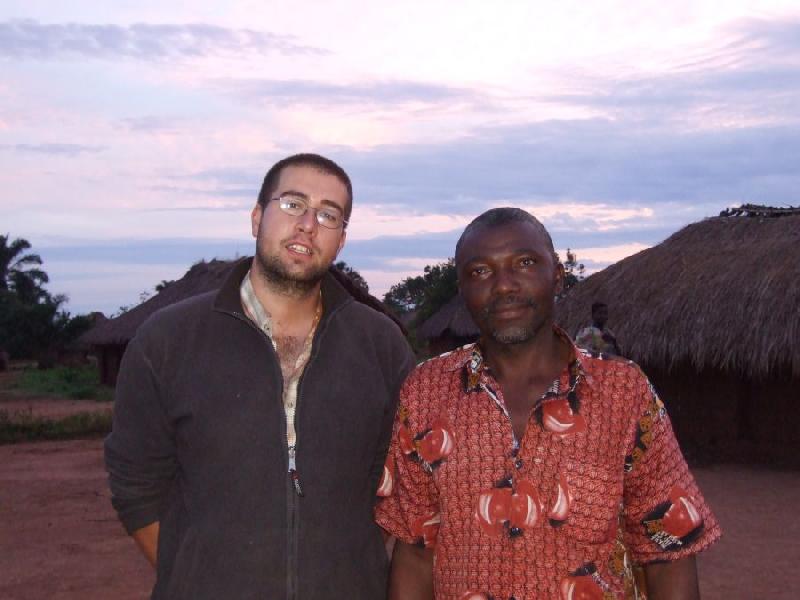
The village chief (on the right ;-) )
I do not have to explain we drew a bit of a crowd?
But people were actually quite nice. They offered us to use their shower (a tree with a mud wall before it and a bucket) and after an hour or so they actually left us alone.
Later that evening some kind of custom officer came to see us. He wanted to see our permits and whatnot. We kindly told him to bugger off and come back tomorrow. Surprisingly, it worked. Next day we were gone before he came back ;-)
As soon as it got dark we got into our tent and looked outside. We could see several fires in the village were people would gather around and sing and dance (mostly women). Small groups of men were having discussions. Peaceful village.

The village chief (on the right ;-) )
Progress after Day 9. In an unknown village just before the Katanga/Kasai border
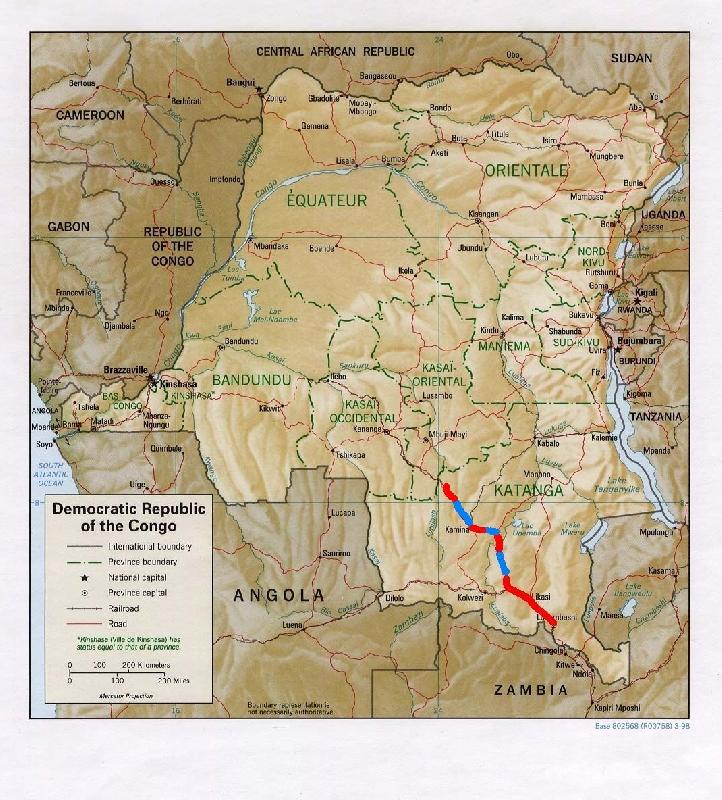

Day 10
The border of the Katange province and Kasai is at the Lubilanji river. A big river with a big bridge. We dare not take pictures here as "border" zones are considered of military importance and it is an excellent reason to get arrested.
Surprisingly there is no checkpoint at the bridge... There is a hut, but it was not manned. Instead they seemed to have moved their checkpoint closer to their base a few kilometers down the road.
It is a torough check. Police, Army, Customs, .. They check it all. Insurance, permit, etc... We manage to bluff us trough the permit issue again. When they run out of excuses to fine us, they just give up and plainly ask us for money. "Just because". We refuse ofcourse. It takes over an hour, we get angry a few times, we flatter them a few times, ... The usual. In the end they are angry but let us go.
We were afraid of Kasai and their people. They have the reputation of being hot tempered people. But until now they seem to be much more relaxed then the people in Katanga.
The border of the Katange province and Kasai is at the Lubilanji river. A big river with a big bridge. We dare not take pictures here as "border" zones are considered of military importance and it is an excellent reason to get arrested.
Surprisingly there is no checkpoint at the bridge... There is a hut, but it was not manned. Instead they seemed to have moved their checkpoint closer to their base a few kilometers down the road.
It is a torough check. Police, Army, Customs, .. They check it all. Insurance, permit, etc... We manage to bluff us trough the permit issue again. When they run out of excuses to fine us, they just give up and plainly ask us for money. "Just because". We refuse ofcourse. It takes over an hour, we get angry a few times, we flatter them a few times, ... The usual. In the end they are angry but let us go.
We were afraid of Kasai and their people. They have the reputation of being hot tempered people. But until now they seem to be much more relaxed then the people in Katanga.
It's
a long driving day again and when we finally arrive in Mwene-ditu we
are knackered. We try to find a mission to stay in. Mwene-ditu is large
city, it has cars and is an important stop on the railroad. It also
feels like a very dodgy place.
Some of the streets resamble an extreme 4x4 course. Extreme erosion mixed with open sewers.
We manage to find a catholic missions that wants to take us in. We can park in their compound, but the street in front of their gate is eroded away. There is 3 meter level ground in front the gate and then a 3 meter deep pit. It takes a 1000turn manouvre to get us in. The roads simply aren't made for cars here. (They used to..)
We have a few hours of daylight left and we get to check the car. The protective plate underneath the gearbox is badly dent and hanging half loose. A few extra dents and lots of scratches. Could be worse I guess. We also noted that we are starting to get low on fuel. With our 270liter onboard we hoped to do at least 1500km, that should have gotten us to Mbuji Mai were we were sure there was Diesel. It is only 120km to Mbuji Mayi from here, but with what we have it might be a close shave. Our consumption was in excess of 20l/100km.
We do not want to risk it, so we try to buy some diesel here. We saw there was a big depot at the railroad. We ask for advice with the local father. He warns us that if we were to go ourselves, the prices would be at least double because of our white skin. He offers to buy it for us. We are a bit hesitant but we give him 80$US. That should buy us 40 liters of diesel.
The father dissapears for a few hours (!) and returns with two 20 liter jerrycans. He wanted to immediately pour it in our tanks but I wanted to check the diesel first. The smell was funny... not very diesel like. It had a red/brown colour and lots of debri. This was not diesel. It might contain a bit of diesel, but it was mixed with something else.
This was a very difficult situation as we suspected the father to try to fool us into buying this stuff and making a buck. But at the same time he was our host. In the end we refused the "diesel" and he gave us back our money. But he did not return the jerrycans. A very strang situation.
We did not feel at ease. Maybe we are starting to get paranoid?
Some of the streets resamble an extreme 4x4 course. Extreme erosion mixed with open sewers.
We manage to find a catholic missions that wants to take us in. We can park in their compound, but the street in front of their gate is eroded away. There is 3 meter level ground in front the gate and then a 3 meter deep pit. It takes a 1000turn manouvre to get us in. The roads simply aren't made for cars here. (They used to..)
We have a few hours of daylight left and we get to check the car. The protective plate underneath the gearbox is badly dent and hanging half loose. A few extra dents and lots of scratches. Could be worse I guess. We also noted that we are starting to get low on fuel. With our 270liter onboard we hoped to do at least 1500km, that should have gotten us to Mbuji Mai were we were sure there was Diesel. It is only 120km to Mbuji Mayi from here, but with what we have it might be a close shave. Our consumption was in excess of 20l/100km.
We do not want to risk it, so we try to buy some diesel here. We saw there was a big depot at the railroad. We ask for advice with the local father. He warns us that if we were to go ourselves, the prices would be at least double because of our white skin. He offers to buy it for us. We are a bit hesitant but we give him 80$US. That should buy us 40 liters of diesel.
The father dissapears for a few hours (!) and returns with two 20 liter jerrycans. He wanted to immediately pour it in our tanks but I wanted to check the diesel first. The smell was funny... not very diesel like. It had a red/brown colour and lots of debri. This was not diesel. It might contain a bit of diesel, but it was mixed with something else.
This was a very difficult situation as we suspected the father to try to fool us into buying this stuff and making a buck. But at the same time he was our host. In the end we refused the "diesel" and he gave us back our money. But he did not return the jerrycans. A very strang situation.
We did not feel at ease. Maybe we are starting to get paranoid?
Progress after Day 10. Mwene-Ditu
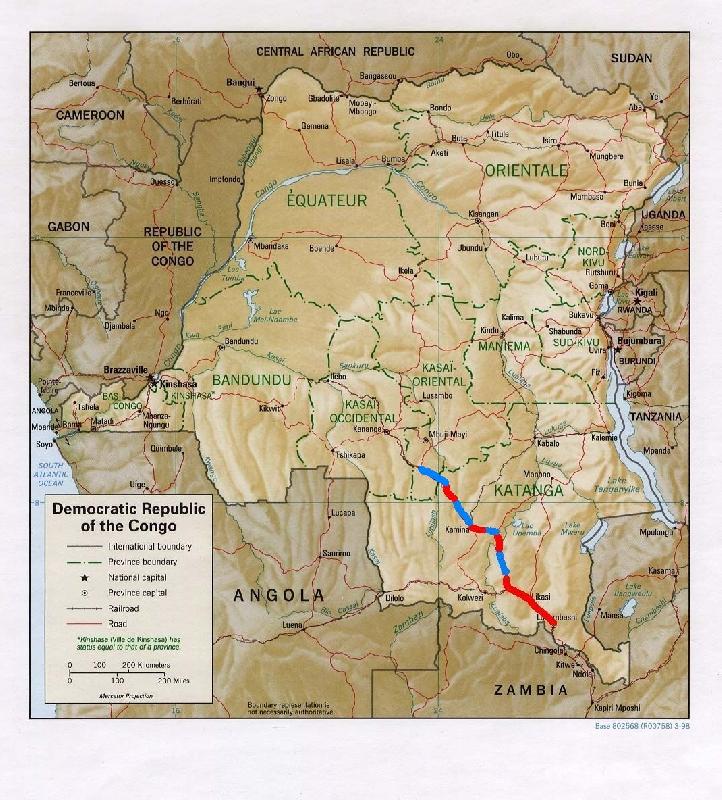

Day 11
When we are leaving Mwene-Ditu the next morning we are stopped by a manifestation. It is a burial. A body is carried in the front of the large group of people. Behind it are weeping women and shouting men. Some of the youngsters are pumped up and when they spot us they draw their attention to us. We are not sure why they were angry at us, but we did not stay around to ask them.
We get stopped again at a police checkpoint. They ask us to pay the "Tax provincial". There is no such thing and we explain it them. They are the sleazy kind of police and our discussions are getting nowhere. They keep asking for money and make some discriminating comments towards us. After half an hour of this I lose it.
"J'EN AI MARRE" - "I'VE HAD ENOUGH"
I shout so loud that even Josephine looks scared at me. She would later tell me that my eyes had turned as red as my face and that I looked very, very dangerous. Complete and utter silence follows for a few minutes. After which one of the police officers asks me for money again. Luckily one of the other officers was more impresed by my shouting and had opened the gate. We blasted off.
I was really starting to get sick of getting extorted by every one we met.
I hadn't returned to normal before we were stopped again. This time it was a toll booth. The usual cadeaux/jus were asked to which I replied in a not so polite manner. The actual toll we had to pay. Foreigners had to pay 10 times the fee of the Congolese. I got out of the car and told them what I thought about corruption in Congo and why I thought nothing was working here. A 10 minute monologue. They were not impressed but I was happy I got it of my heart. We paid the stupid tax. It was an official thing and we got a receipt.
Between Mwene-Ditu and Mbuji-Mayi there is an asphalt road!
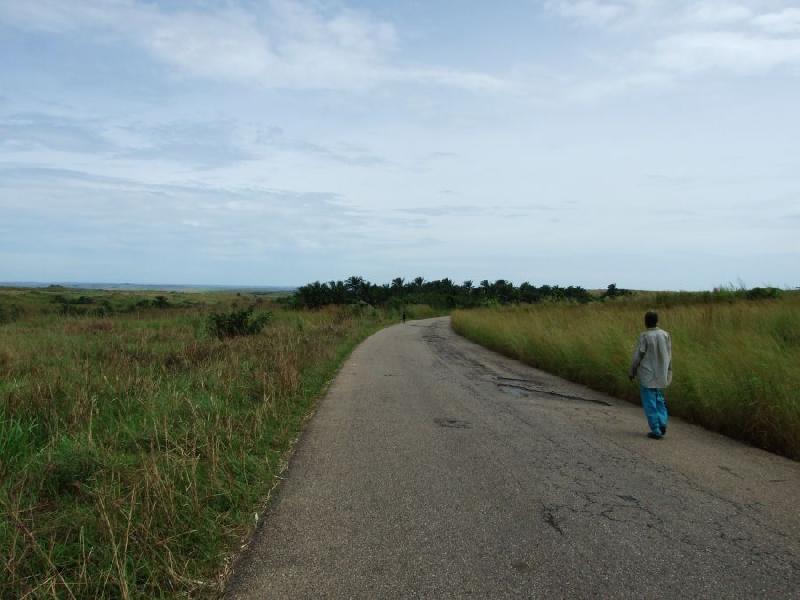
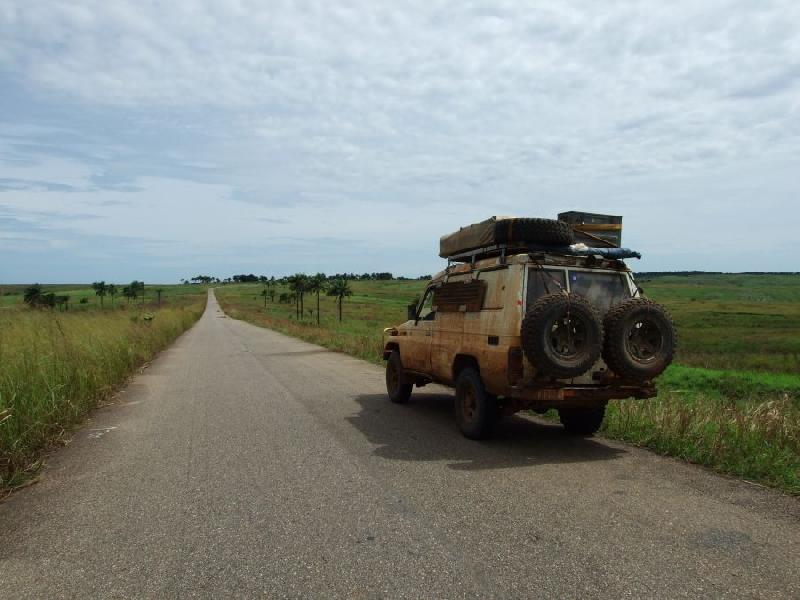
So, why is there an asphalt road in the middle of Congo? Not connected to the rest of the road system (due to lack of road system).
There reason is simple: Diamonds. This is the main diamond center of Congo. This has attracted many people ofcourse, but the local people barely benefit of the natural wealth of the region. Officially it is the third largest city of Congo, after Kinshasa & Lubumbashi. Although by now it is probably the second largest city with over 2 million inhabitants. It also a politically important region. Most of the recent political problems start here. When Mbuji-Mayi "explodes" the rest of the country usually follows shortly after.
The diamong mining companies ofcourse need transport. Most is done via air, but the heavy supplies (fuel) are brought in by train. The nearest train station is in Mwene-Ditu. Hence the tar road between Mwene-Ditu and Mbuji-Mayi.
It makes a great place to walk on... few cars in the area, so there is little traffic.
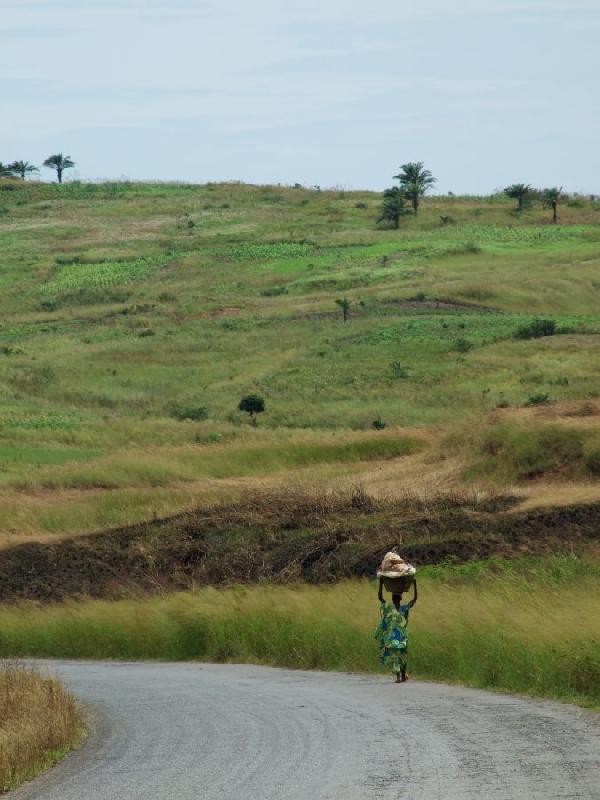
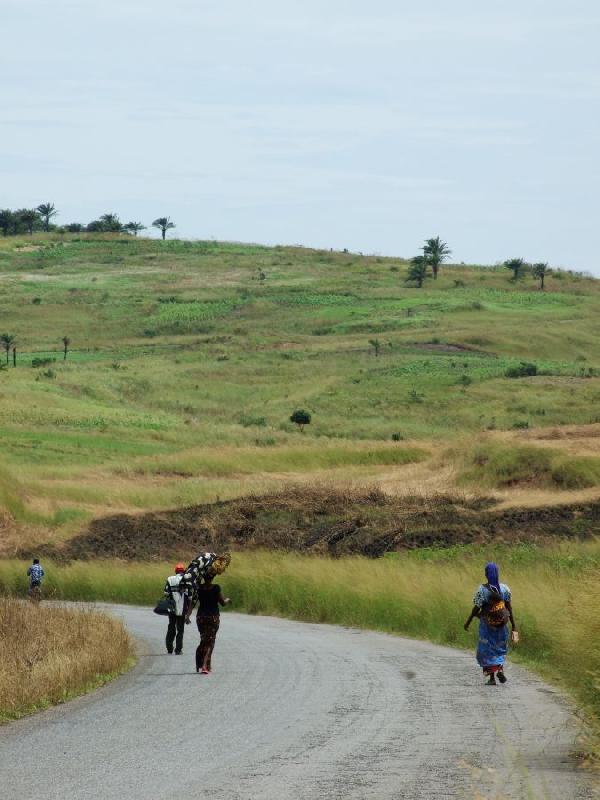
When we are leaving Mwene-Ditu the next morning we are stopped by a manifestation. It is a burial. A body is carried in the front of the large group of people. Behind it are weeping women and shouting men. Some of the youngsters are pumped up and when they spot us they draw their attention to us. We are not sure why they were angry at us, but we did not stay around to ask them.
We get stopped again at a police checkpoint. They ask us to pay the "Tax provincial". There is no such thing and we explain it them. They are the sleazy kind of police and our discussions are getting nowhere. They keep asking for money and make some discriminating comments towards us. After half an hour of this I lose it.
"J'EN AI MARRE" - "I'VE HAD ENOUGH"
I shout so loud that even Josephine looks scared at me. She would later tell me that my eyes had turned as red as my face and that I looked very, very dangerous. Complete and utter silence follows for a few minutes. After which one of the police officers asks me for money again. Luckily one of the other officers was more impresed by my shouting and had opened the gate. We blasted off.
I was really starting to get sick of getting extorted by every one we met.
I hadn't returned to normal before we were stopped again. This time it was a toll booth. The usual cadeaux/jus were asked to which I replied in a not so polite manner. The actual toll we had to pay. Foreigners had to pay 10 times the fee of the Congolese. I got out of the car and told them what I thought about corruption in Congo and why I thought nothing was working here. A 10 minute monologue. They were not impressed but I was happy I got it of my heart. We paid the stupid tax. It was an official thing and we got a receipt.
Between Mwene-Ditu and Mbuji-Mayi there is an asphalt road!


So, why is there an asphalt road in the middle of Congo? Not connected to the rest of the road system (due to lack of road system).
There reason is simple: Diamonds. This is the main diamond center of Congo. This has attracted many people ofcourse, but the local people barely benefit of the natural wealth of the region. Officially it is the third largest city of Congo, after Kinshasa & Lubumbashi. Although by now it is probably the second largest city with over 2 million inhabitants. It also a politically important region. Most of the recent political problems start here. When Mbuji-Mayi "explodes" the rest of the country usually follows shortly after.
The diamong mining companies ofcourse need transport. Most is done via air, but the heavy supplies (fuel) are brought in by train. The nearest train station is in Mwene-Ditu. Hence the tar road between Mwene-Ditu and Mbuji-Mayi.
It makes a great place to walk on... few cars in the area, so there is little traffic.


As mentioned before, problems in
Congo usually start here, in Mbuji-Mayi. It has the reputation of "une
ville chaud" - "a hot town / a heated town". Were hot refers to both
the climate, as to the atmosphere. Literally everybody we met told us to
avoid the city if at all possible. It should be home to some of the
worst police and is generally considered unsafe.
It is true that the climate is really hot and sticky. Tropical climate at its best. The humidity seems to drive everybody nuts.
But we needed fuel. Via the friends we made in Lubumbashi we had the phone number of a Belgian guy who works here in Mbuji-Mayi for CTB (Belgian aid). We don't know him, and he does not even know we exist.
We gave him a call and explained the situation. He agreed to help us out and we were supposed to meet eachother a the filling station in the center of town.
The atmosphere in Mbuji-Mayi is impossible to describe. It seems like nobody here has normal discussions. Only heated discussions. You can hear it in their voice, as if they are constantly angry at each other. We saw a few fights when driving trough town. We negotiated a dozen or so police checks before we arrive at the Total filling station. It's the first real 'pump' we see since leaving Lubumbashi. We fill up and leave a staggering amount of cash behind (2$US/liter).
10 minutes later a Landcruiser with a Mundele in it stops, we quickly shake hands and Christian quickly introduces himself. Equally quickly we drive off again. We follow him into the compound of CTB. They have a nice office here, with bathroom and all. Unfortunately the water system is down for two weeks now, so no water. Christian has a day off today and already made plans for the day, so he cannot stay with us. But we are free to camp in the compound and use their facilities. They have two "guardiens" (guards). Christians recommends us to stay inside.
We are thirsty so we ignore Christian's advice and go out on foot to find us a cold beer. Plenty of bars here. It takes a bit of negotiating before they let us take the beer with us. It is in glass, and they need to recover the empty bottles. We have to pay a deposit and promise to bring the glass back.
People who visited the Congo's will surely recognize the "Skol' brand. Not a bad beer actually. There is a brewery in Mbujy-Mayi and only the beers that are brewed here have the diamond in the logo.
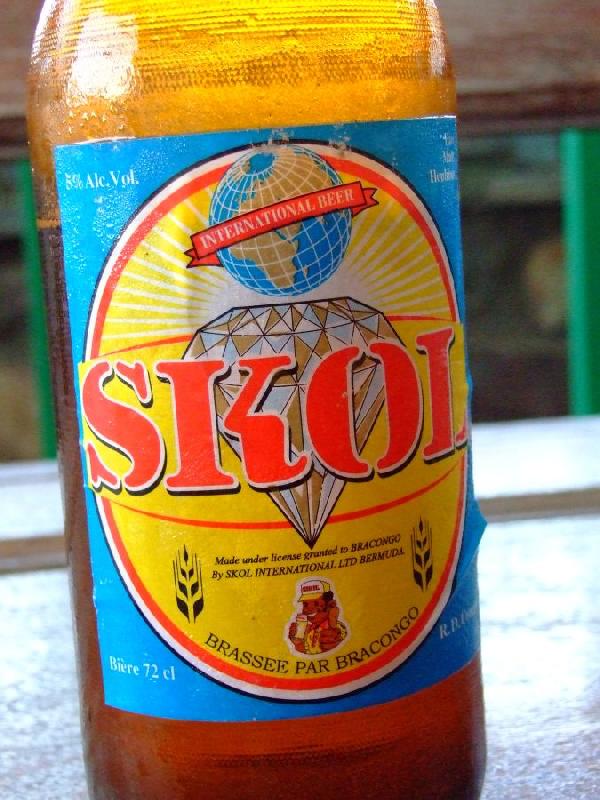
That night we lay in our tent, looking at the stars and listening to the sound of the city. It does not sound like any other city at night. We hear heated discussions and a few fights. Also some gun shots.
It is true that the climate is really hot and sticky. Tropical climate at its best. The humidity seems to drive everybody nuts.
But we needed fuel. Via the friends we made in Lubumbashi we had the phone number of a Belgian guy who works here in Mbuji-Mayi for CTB (Belgian aid). We don't know him, and he does not even know we exist.
We gave him a call and explained the situation. He agreed to help us out and we were supposed to meet eachother a the filling station in the center of town.
The atmosphere in Mbuji-Mayi is impossible to describe. It seems like nobody here has normal discussions. Only heated discussions. You can hear it in their voice, as if they are constantly angry at each other. We saw a few fights when driving trough town. We negotiated a dozen or so police checks before we arrive at the Total filling station. It's the first real 'pump' we see since leaving Lubumbashi. We fill up and leave a staggering amount of cash behind (2$US/liter).
10 minutes later a Landcruiser with a Mundele in it stops, we quickly shake hands and Christian quickly introduces himself. Equally quickly we drive off again. We follow him into the compound of CTB. They have a nice office here, with bathroom and all. Unfortunately the water system is down for two weeks now, so no water. Christian has a day off today and already made plans for the day, so he cannot stay with us. But we are free to camp in the compound and use their facilities. They have two "guardiens" (guards). Christians recommends us to stay inside.
We are thirsty so we ignore Christian's advice and go out on foot to find us a cold beer. Plenty of bars here. It takes a bit of negotiating before they let us take the beer with us. It is in glass, and they need to recover the empty bottles. We have to pay a deposit and promise to bring the glass back.
People who visited the Congo's will surely recognize the "Skol' brand. Not a bad beer actually. There is a brewery in Mbujy-Mayi and only the beers that are brewed here have the diamond in the logo.

That night we lay in our tent, looking at the stars and listening to the sound of the city. It does not sound like any other city at night. We hear heated discussions and a few fights. Also some gun shots.
Progress after day 11. Mbuji-Mayi
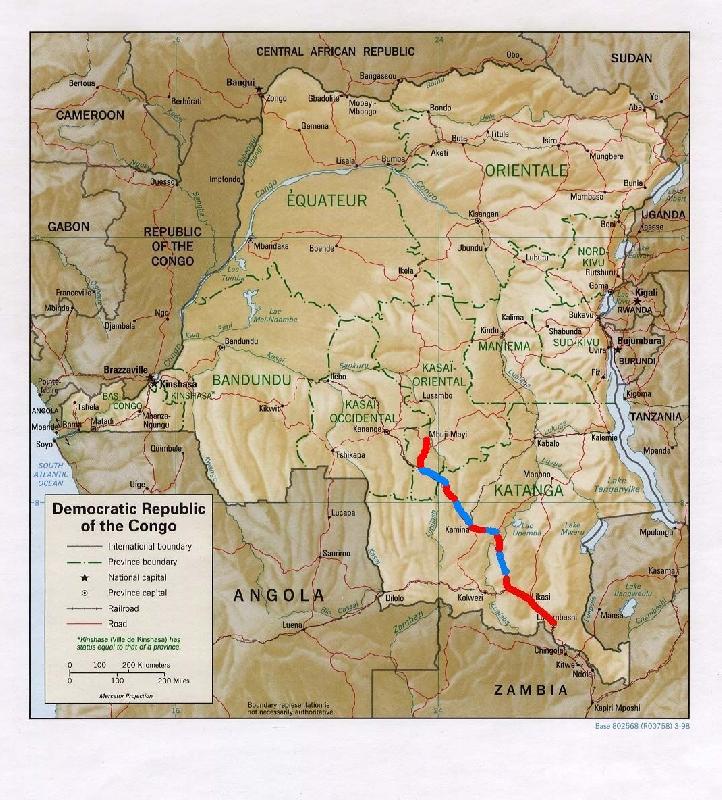

Day 12
We did not want to end up in the wrong place at the wrong time when leaving Mbuji-Mayi. As "the wrong time" takes about whole day long here, we ask one of the guardiens at CTB to guide us out of town. The road to Kananga, our goal for this day, is not really connected to the city. The neverending expension of Mbuji-Mayi has swallowed the road and now one has to drive trough the kilometers of shacks to get to city end.
Once again we are asked to pay toll, we do not complain too much this time as the previous toll had brought us a nice tar road. Not so this time. The road was not horrible, but it was not exactly good either. It certainly wasn't maintained. The scenery on the other hand was stunning. It was great to finally see a bit around us as we were usually stuck in dense jungle or high grass.
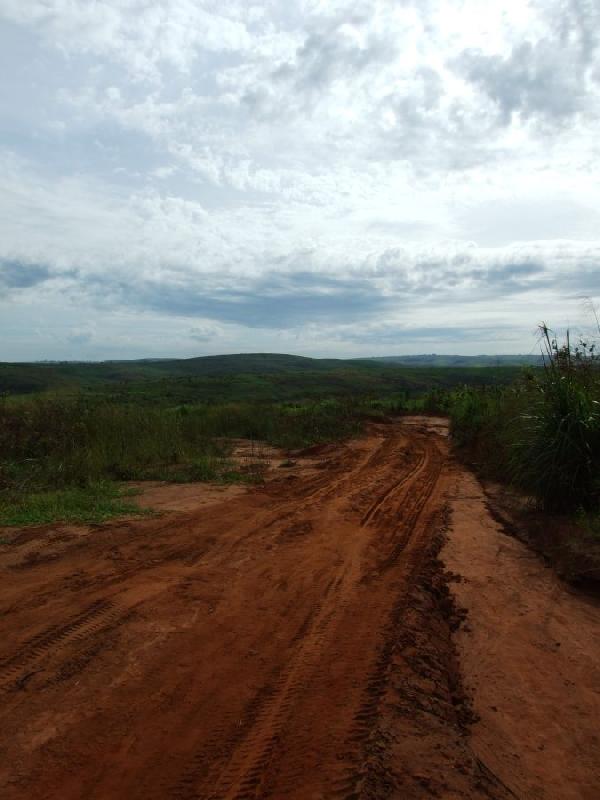
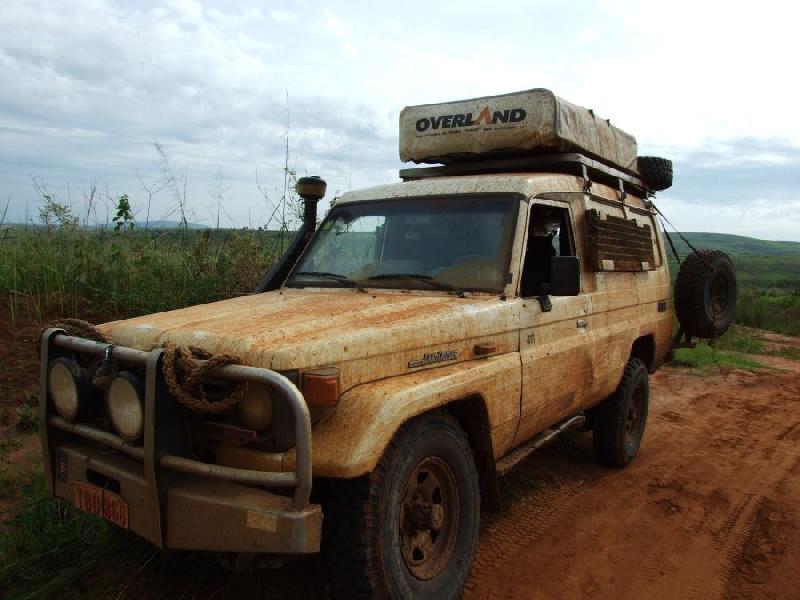
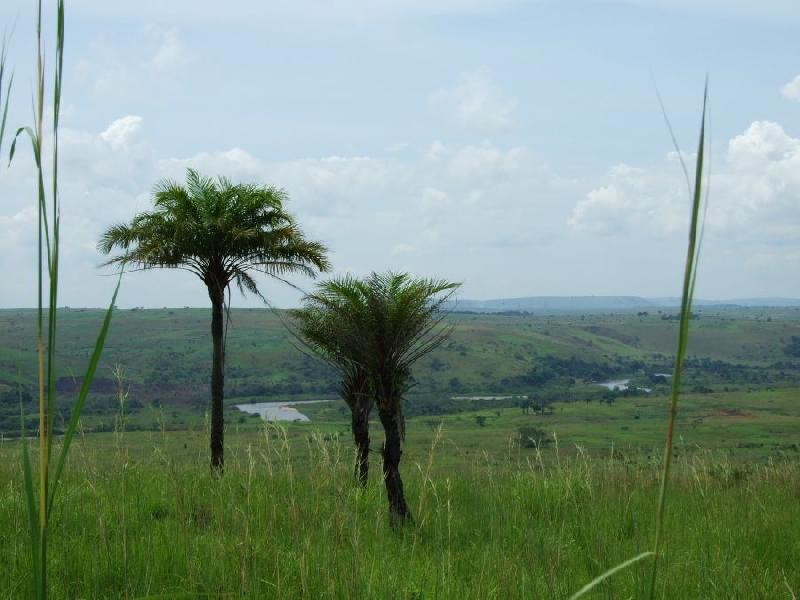
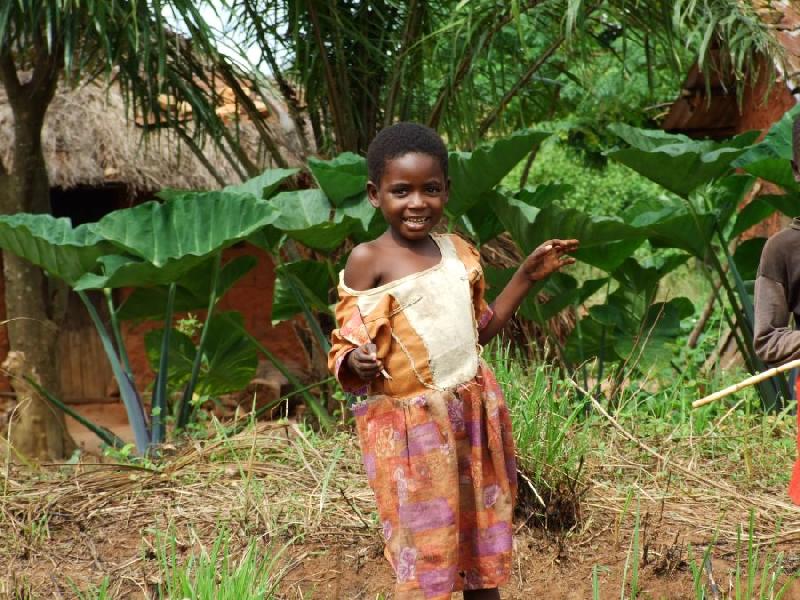
We did not want to end up in the wrong place at the wrong time when leaving Mbuji-Mayi. As "the wrong time" takes about whole day long here, we ask one of the guardiens at CTB to guide us out of town. The road to Kananga, our goal for this day, is not really connected to the city. The neverending expension of Mbuji-Mayi has swallowed the road and now one has to drive trough the kilometers of shacks to get to city end.
Once again we are asked to pay toll, we do not complain too much this time as the previous toll had brought us a nice tar road. Not so this time. The road was not horrible, but it was not exactly good either. It certainly wasn't maintained. The scenery on the other hand was stunning. It was great to finally see a bit around us as we were usually stuck in dense jungle or high grass.




The going is though and slow. About 50km before Kananga to road is blocked. The bridge is gone.
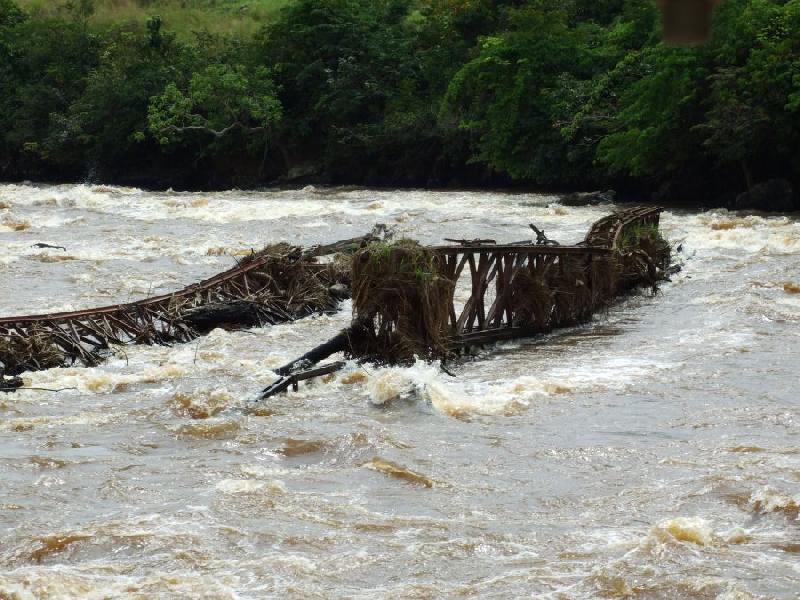
This happened very recently. People there pointed us to a detour. We had to take bicycle tracks all the way to Kamwanda (+- 30km) where there is another bridge and then continue from there.
We set off on a much to narrow track trough dense jungle.
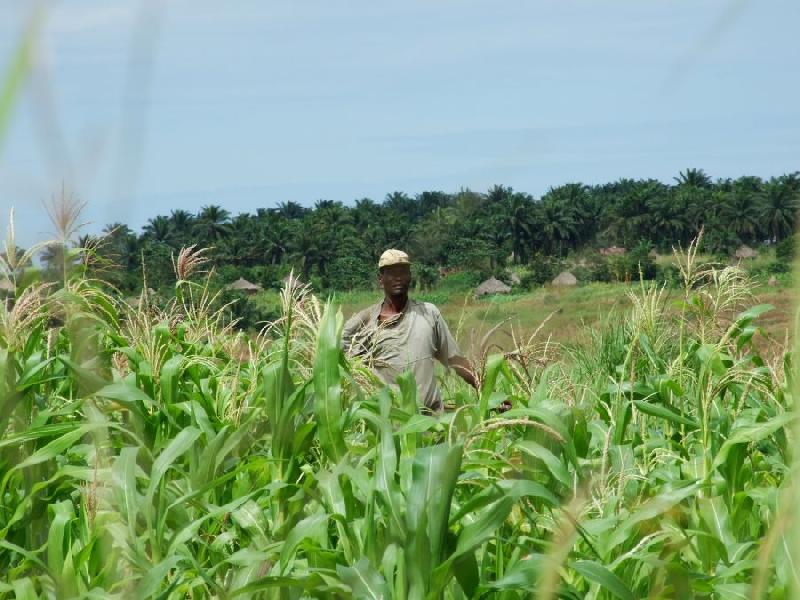
It was getting late already and we were not sure if we would make it to Kananga today. Depending on the state of the bicycle tracks, we would have to stay in a village again.
The first village we encountered seemed deserted at first, but as soon as we entered the village we saw people coming at us from all sides. They had machetes and sticks and were shouting. "Des Blancs. Argent!" - "White people. Money!". They were all over the place. This was not good! I floored it and sped out of the village. A rock hit the back of our car.
What in gods name was that all about?
Very few Congolese had made us feel welcome, but this was plain agression! It scared the hell out of us.
We passed another village, and once again a mob formed as soon as they heard us coming. Machetes flying round, racist slogans shanted. Once again we did not give them the chance to get near us and blasted out of the village. They tried following us. This was turning ugly, if we would get stuck here we would be in big trouble, these people did not want a chat!
With half an hour of daylight left we knew we had a problem. We tried sending our coordinates to the homefront with the instructions to call the embassy if they did not hear from us within the hour. Despite us having bought SIM cards of the two major GSM operators, we did not have reception.
With our hearts racing we neared another village.

This happened very recently. People there pointed us to a detour. We had to take bicycle tracks all the way to Kamwanda (+- 30km) where there is another bridge and then continue from there.
We set off on a much to narrow track trough dense jungle.

It was getting late already and we were not sure if we would make it to Kananga today. Depending on the state of the bicycle tracks, we would have to stay in a village again.
The first village we encountered seemed deserted at first, but as soon as we entered the village we saw people coming at us from all sides. They had machetes and sticks and were shouting. "Des Blancs. Argent!" - "White people. Money!". They were all over the place. This was not good! I floored it and sped out of the village. A rock hit the back of our car.
What in gods name was that all about?
Very few Congolese had made us feel welcome, but this was plain agression! It scared the hell out of us.
We passed another village, and once again a mob formed as soon as they heard us coming. Machetes flying round, racist slogans shanted. Once again we did not give them the chance to get near us and blasted out of the village. They tried following us. This was turning ugly, if we would get stuck here we would be in big trouble, these people did not want a chat!
With half an hour of daylight left we knew we had a problem. We tried sending our coordinates to the homefront with the instructions to call the embassy if they did not hear from us within the hour. Despite us having bought SIM cards of the two major GSM operators, we did not have reception.
With our hearts racing we neared another village.
Once
again thanks for all the great comments. Seeing people enjoying the
report sure makes up for all the work it takes to type it out.
In Josephine's case that resulted in a sort of insomnia. She really slept bad all trough Congo. Always on the lookout I guess. Our leaking tent did not help either.
In my case it resulted in a lack of apetite. My stomach felt like I was desperatly in love. I really had to force myself to eat something.
In both our cases this meant we were getting physically exhausted.
I just reread the report and I am a bit embarrased about the amount spelling mistakes and typo's. I can do a better job. I make these reports during breaks at work or in between other things, so it's always a quick write-up and I post it immediately, without spellchecking. Sorry, but I am sure the message gets along.
[/quote]

When this report is done I will post some aftertoughts about the various aspects of this trip.
So-so. The initial nervousness when entering Congo remained with us for the rest of our trip. We were hoping it would go away as it always did before but it didn't. It is a great feeling not knowing what you are up to next, but up until now almost all of the 'surprises' were not so pleasant. The anticipation for the next 'bad' thing to happen made sure that our adrenaline levels were always high.
In Josephine's case that resulted in a sort of insomnia. She really slept bad all trough Congo. Always on the lookout I guess. Our leaking tent did not help either.
In my case it resulted in a lack of apetite. My stomach felt like I was desperatly in love. I really had to force myself to eat something.
In both our cases this meant we were getting physically exhausted.
Me too :friday:
That was the kinky side of me popping up ;-)
I just reread the report and I am a bit embarrased about the amount spelling mistakes and typo's. I can do a better job. I make these reports during breaks at work or in between other things, so it's always a quick write-up and I post it immediately, without spellchecking. Sorry, but I am sure the message gets along.
I presume you are referring to the "not so nice" role Belgium has had in the history of Congo. For a while I thought that would be a problem as well, but it isn't. Just about anything that still exists in Congo is made by the Belgians. The older generation who had their education from the Belgians really have fond memories of that era. And at the moment Belgium is still one of the main funders of the country (via aid). The dark pages of history during the Leopold 2 era is not what the Congolese people think about. All in all I think being Belgian was actually a plus. As a matter of fact, a lot of people asked how things were going with the "war" in Belgium :-o
[/quote]
Better is a relative term ofcourse. Infrastructure wise it was pobably a lot better. Nothing constructive happened since the 80's. I would have loved to see the country then. And even more so in 50's when it must have been really easy (relative) to travel in the country.
Same could be said about the "bad" areas all major cities in the world have. You are quite right about the fact that we had nowhere to run, we were really on our own. That also leaves you with just one option: continue.. and that's what we did
When this report is done I will post some aftertoughts about the various aspects of this trip.
Now seems like a good time to pause the report :twisted: and have a little flashback to the period before we entered the DRC.
We made the decision to tackle this part of DRC when we were in Egypt. It would take us about 4 months to drive from Cairo down to the Zambia/DRC border. We immediately started our quest for information. It would soon become clear that very little information was available. We did not know of a single traveller that did this traject in the lat 20 years. We knew of two who tried (both on motorbikes) in recent years. One crashed after a few days and got evacuated. The other got arrested and deported. Both didn't get very far.
So we had to be creative and think of other sources of information. A small overview of some of the responses we received from different instances we contacted
1) MONUC. The UN mission in DRC (http://en.wikipedia.org/wiki/United_Nations_Mission_in_the_Democratic_Republic_of_Congo ). They have almost 20.000 people on the ground, they must have some information. Actualy their website has some useful information.
We contacted the "Cellule Infrastructure" and received the following reply (excerpts):
This stretch we already passed by now.
We still haven't reached the Loange river... great prospect ;-)
And then the most worrying bit:
These 'Coupeurs de route' are lawless gangs. 'Road bandits'. They have a nasty reputation in that they have little value for human life. Rape is a common working method for them.
These people I wanted to avoid. On the other hand, one has to read between the lines here, and it was pretty obvious to me: monuc did not have a clue what was going on in the area. They just did not have reliable and up to date information. Do note that monuc is mostly active in East Congo (Goma, Kisangani,..) not in the more 'stable' south/south-west were we are travelling trough.
2) Coca-cola company: If there is ony thing you can find anywhere in the world it is Coca-Cola. They should know how to get their goods in the country. We had no response on mails, so we called them up. Their answer was pretty short: They do not have a distribution network outside the major cities in Congo 8O And it proved to be true, Congo is the first country we have visited were Coca-cola is hard to get once you leave the major cities.
3) About a dozen of NGO's, all answers were negative: they did not have any information
4) Journalists from press agencies and the author from the only guidebooks that exists on the DRC (Sean Rorison): We received a few interesting adresses and contacts in cities, but nothing on the roads. They only travel by air. From a few journalist we received warning on recent events of aggressive attacke by "coupeurs de route" in the area between Kananga and Tshikapa.
5) Foreign affairs office of our own country and several other countries (US, France, ..): they told us we would die if we only thought about the DRC ;-)
6) The Congolese "Office des routes". I was not expecting an answer from them, but they did reply! From a personal mailadres somebody from the Congolese ministry told me that they had no information whatsoever on the condition of their road network. But they would appreciate any information that we could obtain!
The moral of the story was: nobody knew anything about the road conditions. The worrying bit were the "coupeurs de route". Different sources talked about them, and always in the Kananga-Tshikapi area. This seemed like the area to avoid. We had already decided to drive to Kananga but then go north from there to Ilebo as to avoid the Kananga-Tshikapi area.
In my last post I told we had to make a detour because a bridge was out. Guess in what area that brought us?
We made the decision to tackle this part of DRC when we were in Egypt. It would take us about 4 months to drive from Cairo down to the Zambia/DRC border. We immediately started our quest for information. It would soon become clear that very little information was available. We did not know of a single traveller that did this traject in the lat 20 years. We knew of two who tried (both on motorbikes) in recent years. One crashed after a few days and got evacuated. The other got arrested and deported. Both didn't get very far.
So we had to be creative and think of other sources of information. A small overview of some of the responses we received from different instances we contacted
1) MONUC. The UN mission in DRC (http://en.wikipedia.org/wiki/United_Nations_Mission_in_the_Democratic_Republic_of_Congo ). They have almost 20.000 people on the ground, they must have some information. Actualy their website has some useful information.
We contacted the "Cellule Infrastructure" and received the following reply (excerpts):
"Unfortunately, the stretch between Likasi-Mwene Ditu is, from our part, considered impossible. We did not receive any detailed information for a long time. One has to consider that no maintenace has been done on this traject in the last 15 years."MONUC said:
This stretch we already passed by now.
"Concering the Loange river, the ferry is not operational and there is no bridge. According to our latest information the transport of goods is done by pirogue (canoe?). Maybe there is a possibiliy to cross with a vehicle by buidling a vessel with several pirogues. But nothing is certain"MONUC said:
We still haven't reached the Loange river... great prospect ;-)
And then the most worrying bit:
"Certain parts are infested with 'coupeurs de route' (http://fr.wikipedia.org/wiki/Coupeur_de_route), especially the following parts: Likasi-Kolwezi and Tshikapa-Kananga"
These 'Coupeurs de route' are lawless gangs. 'Road bandits'. They have a nasty reputation in that they have little value for human life. Rape is a common working method for them.
These people I wanted to avoid. On the other hand, one has to read between the lines here, and it was pretty obvious to me: monuc did not have a clue what was going on in the area. They just did not have reliable and up to date information. Do note that monuc is mostly active in East Congo (Goma, Kisangani,..) not in the more 'stable' south/south-west were we are travelling trough.
2) Coca-cola company: If there is ony thing you can find anywhere in the world it is Coca-Cola. They should know how to get their goods in the country. We had no response on mails, so we called them up. Their answer was pretty short: They do not have a distribution network outside the major cities in Congo 8O And it proved to be true, Congo is the first country we have visited were Coca-cola is hard to get once you leave the major cities.
3) About a dozen of NGO's, all answers were negative: they did not have any information
4) Journalists from press agencies and the author from the only guidebooks that exists on the DRC (Sean Rorison): We received a few interesting adresses and contacts in cities, but nothing on the roads. They only travel by air. From a few journalist we received warning on recent events of aggressive attacke by "coupeurs de route" in the area between Kananga and Tshikapa.
5) Foreign affairs office of our own country and several other countries (US, France, ..): they told us we would die if we only thought about the DRC ;-)
6) The Congolese "Office des routes". I was not expecting an answer from them, but they did reply! From a personal mailadres somebody from the Congolese ministry told me that they had no information whatsoever on the condition of their road network. But they would appreciate any information that we could obtain!
The moral of the story was: nobody knew anything about the road conditions. The worrying bit were the "coupeurs de route". Different sources talked about them, and always in the Kananga-Tshikapi area. This seemed like the area to avoid. We had already decided to drive to Kananga but then go north from there to Ilebo as to avoid the Kananga-Tshikapi area.
In my last post I told we had to make a detour because a bridge was out. Guess in what area that brought us?
With our hearts racing we neared another village.
We tried to sneak in the village but failed miserably. Same thing happened again, confused looks at first, as soon as they saw us they shouted at eachother and then came storming after us.
What did we do to these people that they wanted us so badly?
Like thieves in the night we raced trough the bush and stopped as soon as we had cell phone reception. We sent our coordinates home and called our Belgian friends in Lubumbashi to see if they could give us a contact in Kananga. They responded quickly (Thanks Valérie!) with a phone number of the "procure" (mission) in Kananga. But no answer there... :-(
From what we saw on the GPS it would be at least another 2 hours before we would arrive in Kananga. It was getting really dark by now. We had no choice, we had to reach Kananga!
These were some of the scariest moments in my life. Everybody we crossed here was mad at us. We sent our coordinates to the home front every 10 minutes or so.
Relentlesly we continued. It got pitch dark and the road was really difficult. We could not afford to make mistakes now, but we also did not feel like getting out of the car to inspect any obstacles. The dark was actually good for us as people would not see that we are white. This seemed to make a major difference in the reaction of the people.
But we made it. We were so happy to reach Kananga and at the same time scared to death that people would react the same here. Fortunately the town was quiet and actually looked friendly in the moonlight. Due to pure luck we drove straight into the compound of the procure and at that into safety.
The friendly father-abt allowed us to camp in the garden. He looked genuinely surprised if we told him about our bad experience but at the same time it was as if he was avoiding the subject too.
We put up the tent, got out our chairs and opened one of our "emergency beers". We just sat there a long time without saying a word to eachother. The sky was beautiful and the sounds of all the insects was magnificent.
We tried to sneak in the village but failed miserably. Same thing happened again, confused looks at first, as soon as they saw us they shouted at eachother and then came storming after us.
What did we do to these people that they wanted us so badly?
Like thieves in the night we raced trough the bush and stopped as soon as we had cell phone reception. We sent our coordinates home and called our Belgian friends in Lubumbashi to see if they could give us a contact in Kananga. They responded quickly (Thanks Valérie!) with a phone number of the "procure" (mission) in Kananga. But no answer there... :-(
From what we saw on the GPS it would be at least another 2 hours before we would arrive in Kananga. It was getting really dark by now. We had no choice, we had to reach Kananga!
These were some of the scariest moments in my life. Everybody we crossed here was mad at us. We sent our coordinates to the home front every 10 minutes or so.
Relentlesly we continued. It got pitch dark and the road was really difficult. We could not afford to make mistakes now, but we also did not feel like getting out of the car to inspect any obstacles. The dark was actually good for us as people would not see that we are white. This seemed to make a major difference in the reaction of the people.
But we made it. We were so happy to reach Kananga and at the same time scared to death that people would react the same here. Fortunately the town was quiet and actually looked friendly in the moonlight. Due to pure luck we drove straight into the compound of the procure and at that into safety.
The friendly father-abt allowed us to camp in the garden. He looked genuinely surprised if we told him about our bad experience but at the same time it was as if he was avoiding the subject too.
We put up the tent, got out our chairs and opened one of our "emergency beers". We just sat there a long time without saying a word to eachother. The sky was beautiful and the sounds of all the insects was magnificent.
So, what was that all about?
In all honesty, we don't have a clue! I only know that this ranks very high in my top 10 scariest moments. Everybody has their limits, well this was over mine. I do not want this to happen to me again.
- Where we just panicking for no reason, paranoid by all the (mis)information we received? Did we create the danger in our minds?
Maybe, I really can't tell. We discussed this afterwards, and we did not make up those mobs that charged at us. They had machetes. They did chase us.
We have a few theories though:
- These villages were on a newly created "detour". Normally no motorized traffic would pass trough here. Bicycles only. Maybe they saw this as new way to generate money, and they wanted their part of the cake. Although somebody should explain to them that this is not a good way to ask for a toll fee.
- We had the feeling that they were focussing on us, not only because we were in a vehicle, but because of our skin color. Did a white person do something wrong here? Where they trying to seek vengeance? I wouldn't surprise me if a white person in car ran somebody over, or destroyed something and then fled away.
- Some fetish reason. Witchdoctors have a lot of influence here. If they had casted a spell of some sorts. Or predicted that something bad would happend if a white person would pass trough here.
- ...
I guess we will never know.
In all honesty, we don't have a clue! I only know that this ranks very high in my top 10 scariest moments. Everybody has their limits, well this was over mine. I do not want this to happen to me again.
- Where we just panicking for no reason, paranoid by all the (mis)information we received? Did we create the danger in our minds?
Maybe, I really can't tell. We discussed this afterwards, and we did not make up those mobs that charged at us. They had machetes. They did chase us.
We have a few theories though:
- These villages were on a newly created "detour". Normally no motorized traffic would pass trough here. Bicycles only. Maybe they saw this as new way to generate money, and they wanted their part of the cake. Although somebody should explain to them that this is not a good way to ask for a toll fee.
- We had the feeling that they were focussing on us, not only because we were in a vehicle, but because of our skin color. Did a white person do something wrong here? Where they trying to seek vengeance? I wouldn't surprise me if a white person in car ran somebody over, or destroyed something and then fled away.
- Some fetish reason. Witchdoctors have a lot of influence here. If they had casted a spell of some sorts. Or predicted that something bad would happend if a white person would pass trough here.
- ...
I guess we will never know.
Progress after day 12. Kananga
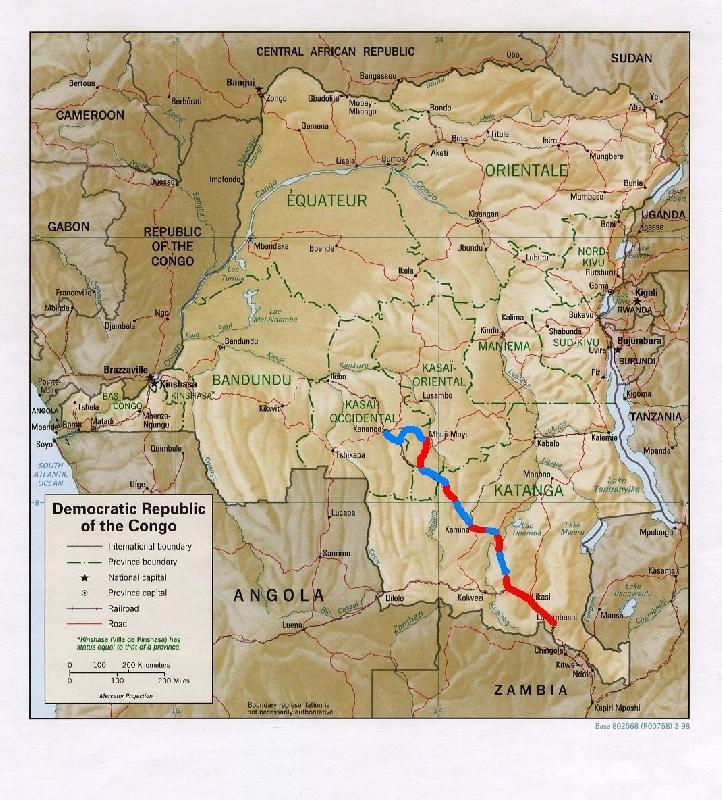

Thanks for the kind words Christian and others.
Regarding OLJ, how does one get an article in there? Not sure if this story is apropriate for publishing in magazines, I have no idea how to make this any shorter without it losing the 'vibe' it requires.
Regarding OLJ, how does one get an article in there? Not sure if this story is apropriate for publishing in magazines, I have no idea how to make this any shorter without it losing the 'vibe' it requires.
Day 13
This was the half way point and up until now we at least had minimal information on what was ahead of us. That would end here. The only thing we knew was that the bac (ferry) at Tshikapa was not working - confirmed here in Kananga - and that the road to Tshikipa was not only suspect for "coupeurs de route" but also in a horrible state (mud!).
The alternative was to go north from here to Ilebo were apparantly there was a ferry. And worst case we could try to put the car on a boat on the Congo river to Kinshasa. Nobody here in Kananga had gone all the way to Ilebo by car. Until about halfway there were some missions, but they were considered 'cut off' due to the state of the roads. Especially the last part of the road into Ilebo was said to be impossible.
But most of it was hearsay anyway. People don't travel much overland here.
We were halfway and it looked like what we just did was the easy part...
Yesterday's events had gotten us exhausted and we decided to stay for a day in the safetey of the procure. We tried to get some sleep and do some cleaning up in the car. I also had to tape/bolt various bits and pieces back to the car.
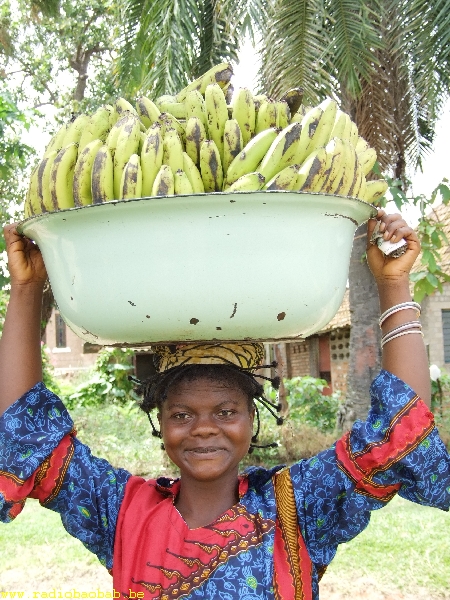
Staying at the procure also gave us the opportunity to meet some interesting people. They also had their own radio station. Because they had a huge antenna this was one of the most important radio stations in the area. For a lot of people the radio was their only means of information from the outside world. They were well equipped and the radio crew was young and extremely motivated.
They did an interview with us, but we asked them not to air the interview immediately but instead wait 4 days. If it would be aired immediately it would be a matter of minutes before the entire police force came for their "share". Also with yesterdays events in the back of our mind, we wanted to keep the aspect of surprise.
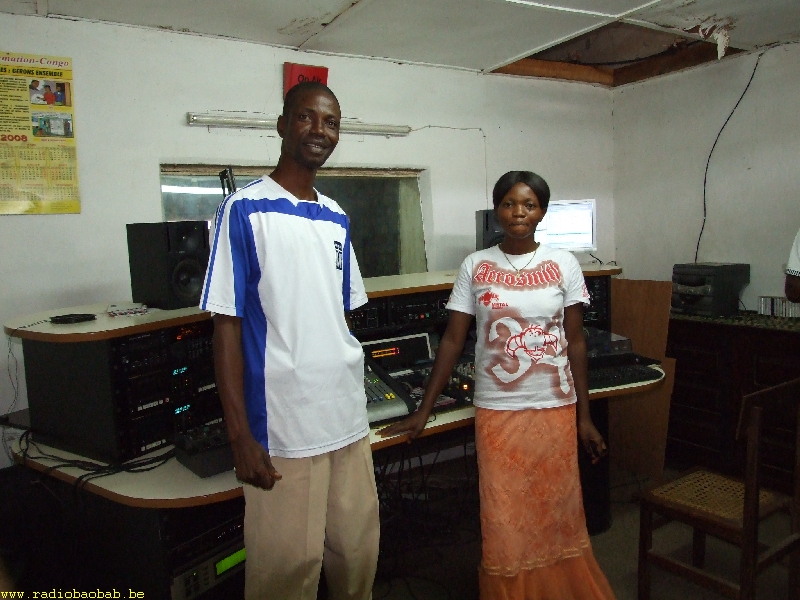
This was the half way point and up until now we at least had minimal information on what was ahead of us. That would end here. The only thing we knew was that the bac (ferry) at Tshikapa was not working - confirmed here in Kananga - and that the road to Tshikipa was not only suspect for "coupeurs de route" but also in a horrible state (mud!).
The alternative was to go north from here to Ilebo were apparantly there was a ferry. And worst case we could try to put the car on a boat on the Congo river to Kinshasa. Nobody here in Kananga had gone all the way to Ilebo by car. Until about halfway there were some missions, but they were considered 'cut off' due to the state of the roads. Especially the last part of the road into Ilebo was said to be impossible.
But most of it was hearsay anyway. People don't travel much overland here.
We were halfway and it looked like what we just did was the easy part...
Yesterday's events had gotten us exhausted and we decided to stay for a day in the safetey of the procure. We tried to get some sleep and do some cleaning up in the car. I also had to tape/bolt various bits and pieces back to the car.

Staying at the procure also gave us the opportunity to meet some interesting people. They also had their own radio station. Because they had a huge antenna this was one of the most important radio stations in the area. For a lot of people the radio was their only means of information from the outside world. They were well equipped and the radio crew was young and extremely motivated.
They did an interview with us, but we asked them not to air the interview immediately but instead wait 4 days. If it would be aired immediately it would be a matter of minutes before the entire police force came for their "share". Also with yesterdays events in the back of our mind, we wanted to keep the aspect of surprise.

Day 14
Kananga looked like a beautiful - but rundown -city, but we did not really visit anything. At this point we just wanted to stay low profile and keep moving.
We set of direction Ilebo, not knowing what to expect. The roads has a bit of an erosion problem
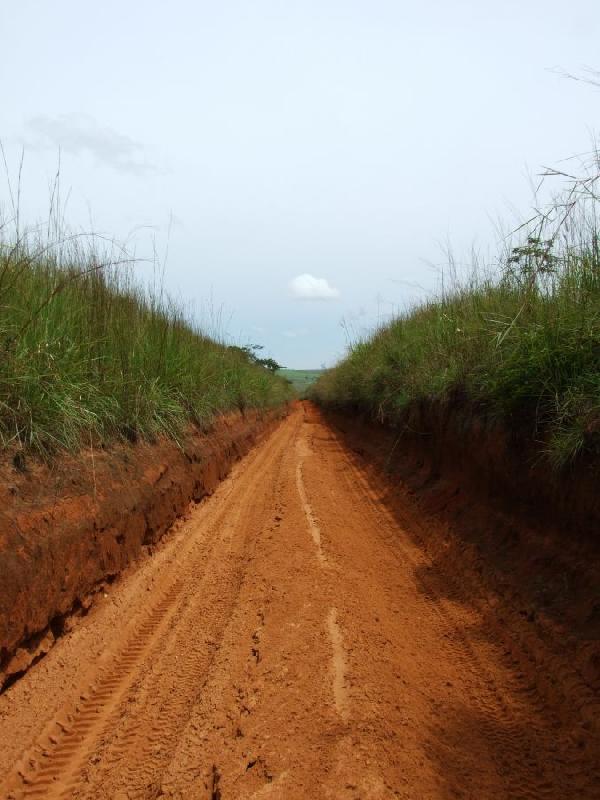
On the above picture you can clearly see where our axle was touching the middelmanetjie.
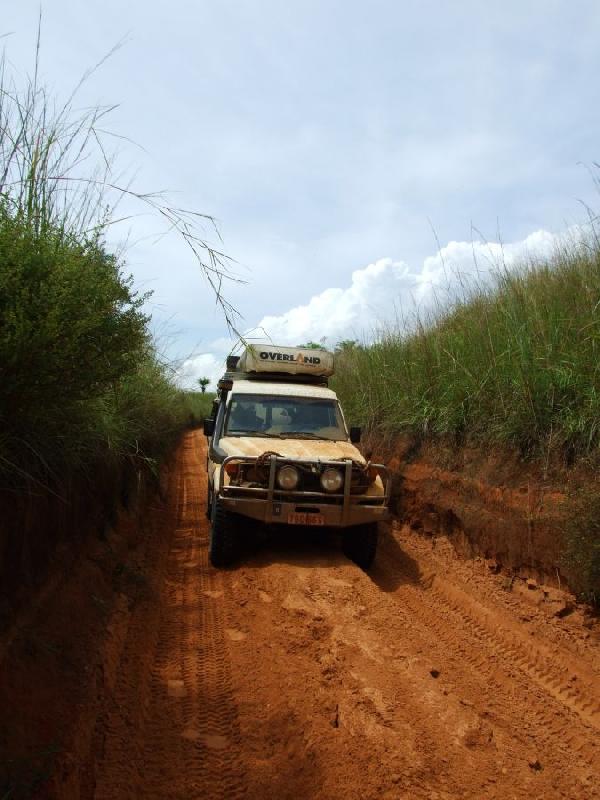
This was all jolly good if both tracks erored equally. This was not always the case and we got into a habit of driving at some extreme angle. Often scraping the sidewalls.
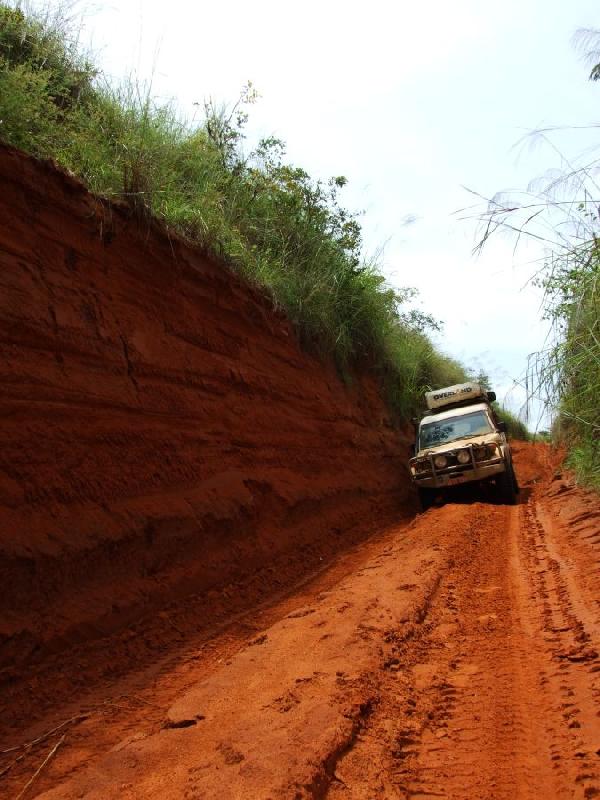
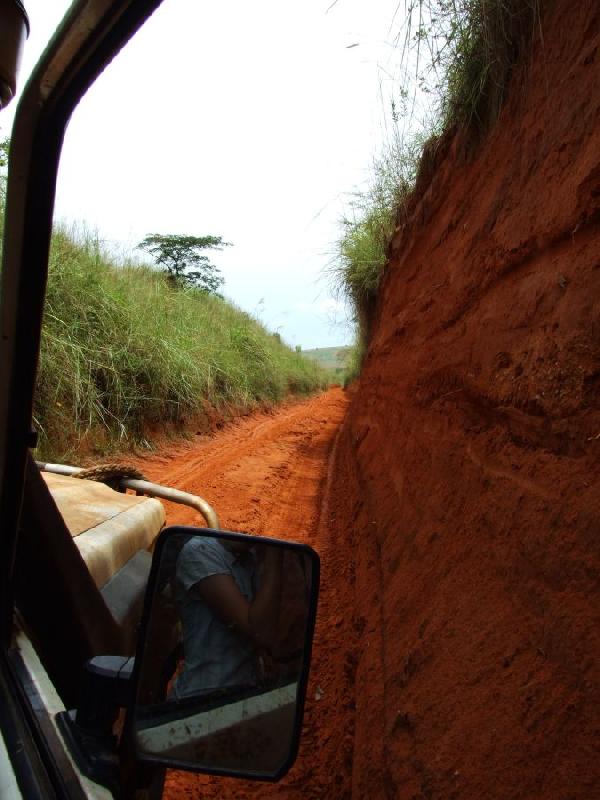
How long ago was it that road was actually "up there" where the grass is.
Kananga looked like a beautiful - but rundown -city, but we did not really visit anything. At this point we just wanted to stay low profile and keep moving.
We set of direction Ilebo, not knowing what to expect. The roads has a bit of an erosion problem

On the above picture you can clearly see where our axle was touching the middelmanetjie.

This was all jolly good if both tracks erored equally. This was not always the case and we got into a habit of driving at some extreme angle. Often scraping the sidewalls.


How long ago was it that road was actually "up there" where the grass is.
As
said, traffic is always local. They somehow manage to get cars into
larger towns and then drive it around town, but no trough traffic. So
cities/towns/village that are not on a river or on the limited railroad
network have very limited supplies.
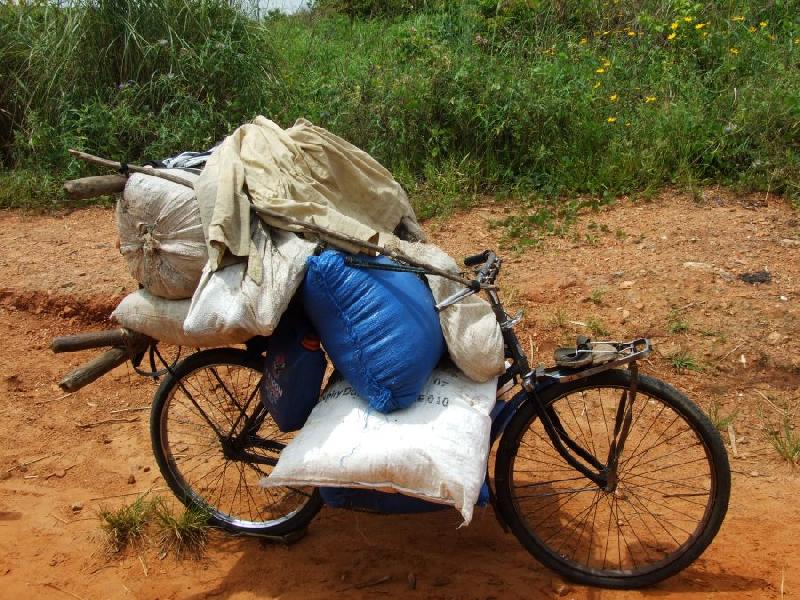
Up to 600kg of goods are transported on these bicycles. They do not 'ride' them, but push them instead. You can see there is a stick connected to the bikes handlebars.
This is the major transport method in Congo. It is probably one of the most 'popular' (this does not seem like a good wordchoice) jobs. There are fixed routes and people often travel in groups. For security reasons but also to help eachother on the hills.
At regular intervals on the main "bicycle" tracks there are "service stations". This is usualy a small hut where one can eat a meal of fufu. They would also have a pump and some basic tools to fix flats.
We saw many of these overloaded bicycles before, but on this stretch of the road it seems to be the only means of transportation.
It must be very hard work to get these loads over the sometimes very rough roads. The 'drivers' are away from home for weeks on end and probably barely make any money out of it.
We never had problems with these guys, they were much to busy with their job.
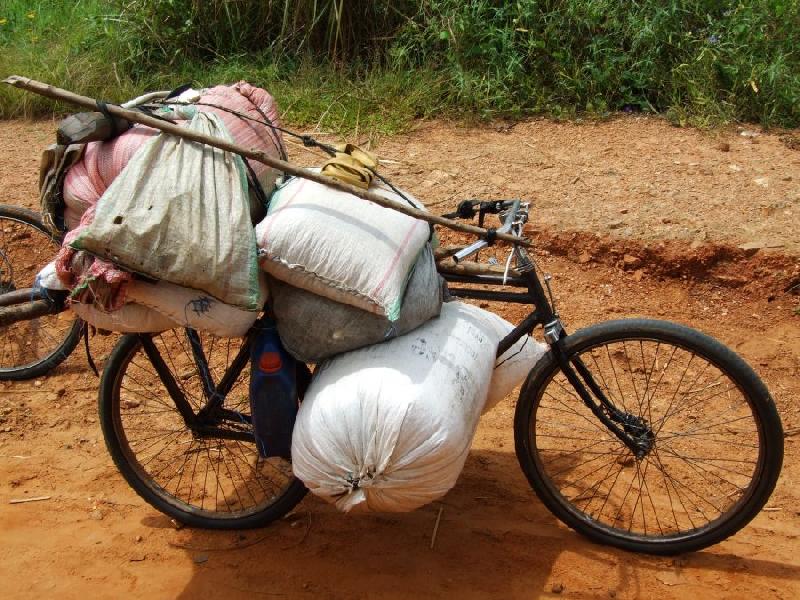
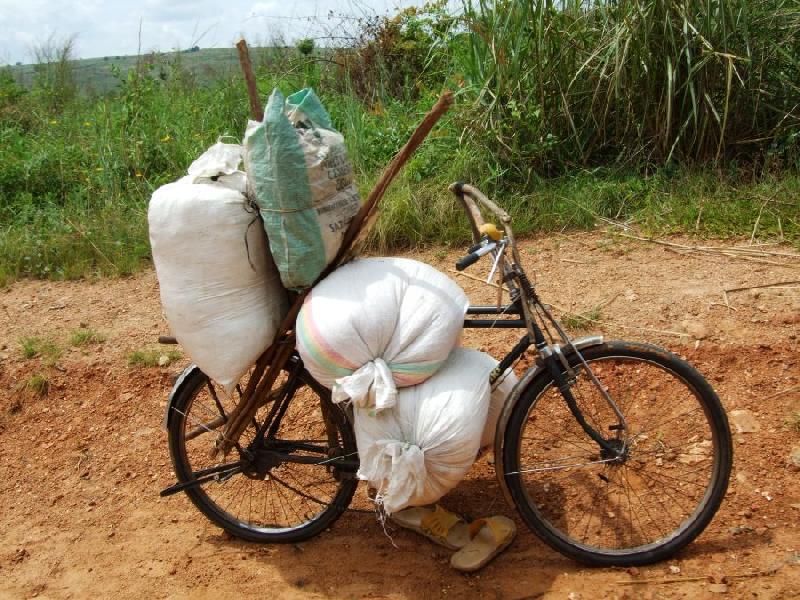
This also meant we were no longer driving on real roads. But on bicycle tracks...

Up to 600kg of goods are transported on these bicycles. They do not 'ride' them, but push them instead. You can see there is a stick connected to the bikes handlebars.
This is the major transport method in Congo. It is probably one of the most 'popular' (this does not seem like a good wordchoice) jobs. There are fixed routes and people often travel in groups. For security reasons but also to help eachother on the hills.
At regular intervals on the main "bicycle" tracks there are "service stations". This is usualy a small hut where one can eat a meal of fufu. They would also have a pump and some basic tools to fix flats.
We saw many of these overloaded bicycles before, but on this stretch of the road it seems to be the only means of transportation.
It must be very hard work to get these loads over the sometimes very rough roads. The 'drivers' are away from home for weeks on end and probably barely make any money out of it.
We never had problems with these guys, they were much to busy with their job.


This also meant we were no longer driving on real roads. But on bicycle tracks...
Until now we mostly followed the Route National 1, which used to be a real road (dirt). Although some of the original parts probably no longer exists. Detours ar formed when the road gets impassible and sometimes the detours then become the main road. The only railway they even built here still exists and connects Kananga and Lubumbashi. I think train rails just made for a convenient building material. Many of the bridges have been fairly recently (20 years ago?) rebuilt by the missions.
So no, I do not think these road we rail road beds.
With regards to questions about our vehicle: fire away. Our website contains a fair amount of information on the car too: www.radiobaobab.be , then click on the UK flag (top right) for the English version and then choose "The car" in the menu. Our website is terribly outdated and due to get an update and revamp.
Our car is a simple affair compared to some of the rigs on this forum. But it worke very well for us.
Some notes from Josephine (posting and reading from the same account as Frederik)
What surprised me was that it were not just men, but also women who were shouting.Frederik Willems said:
Afterwards we heard that Frederik's mom and dad followed our progress on Google Earth in real time. The idea that somebody knew where we were was a relief to us.Frederik Willems said:
We
were pretty optimistic and hoped to reach Ilebo in two days. That meant
that on the first day we had to make it to Pembeyangu, were we knew of a
mission.
Bicycle tracks are not suited for Landcruisers... so we got stuck. The villages usually had the worst obstacles. In this one village there was a big boghole filled with water. We drove in but did not see the pigs that were taking a bath so we slowed down to give them the time to get out.
Big mistake. We were stuck. The water came to the bottom of the door. This particular mudpit had a bit of a funny smell. It was the favourite place of the pigs so it probably contained a fair amount of sh*t. It sure smelled like it. The entire village gathered round us while we got out, knee deep in sh*t.
They did not offer help.
We started clearing the wheels. Josephine hurt her foot on a stick, the pain could be seen on her face. The people thought this was extremely funny and burst out laughing. This was very humiliating for Josephine and I could see the anger on her face. We looked at eachother and understood that this was not the time to get angry or start discussions with 50 or so people. We continued to work. As I bend over to clear the mud from underneath the car my pants get wet up until my ehrm.. 'privates'.. . Once again this is the funniest thing these people have ever seen. Hilarity ensues. This was very humiliating to us.
Eventually they offered to help us if we pay them. I tell them that I do not have money. They did not move an inch.
It takes the best part of an hour to get us out. To their surprise we stop again and I get out and walk up to them. Very calmly I explain that we did not like it when they laughed at us. I asked them how they would react if they hurt themselves and we would laugh at them. The acknowledged that they would get mad at us.
I asked them if they would want us to help them if they had a problem. The acknowledged this. I said what they would think if we asked for money before we would help them. They called us racists and immediately demanded money from us.
I then saw a side of Josephine I hadn't seen before. She got very cross with words and gestures. I will not repeat what she said here... it wasn't pretty I must say 8O Much to the amusement of our adience.
To some of the people in the village our message must have gotten along, and they guided us around the next boghole.
Half an hour later we stopped to eat lunch. We were still shaking after the humiliation, we felt helpess.
We opened a can of Coke (still from Zambia) and a jar of pickled onions to eat with our bread.
Those 'horrible' people did not have a Coke, even if they had the money to buy it, it was not avaialble. They did not have pickled onions either. And between the two of us we ate as much bread as an entire family would eat for an entire day.
We tried putting things into perspective. Maybe we shouldn't be here after all?
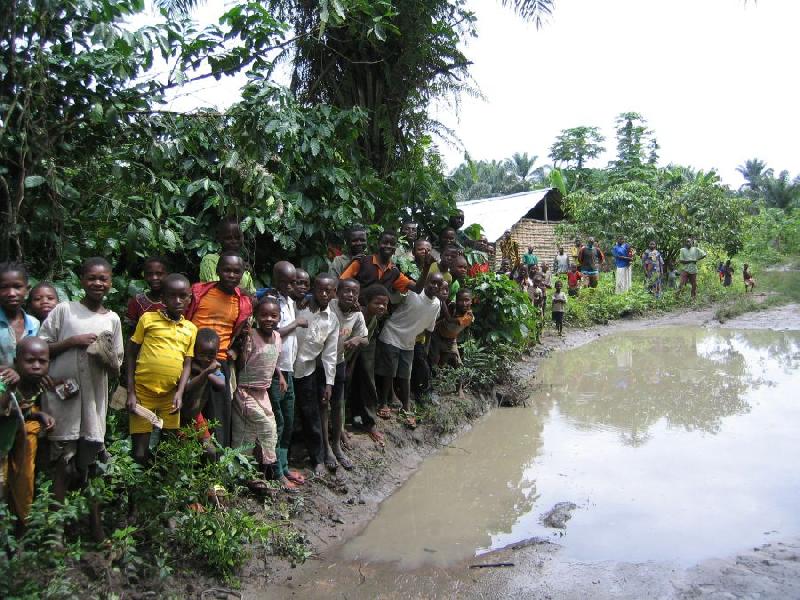
That is not the same pit/people from the above anecdote, but it is very similar. We must have crossed 20 or so villages like this.
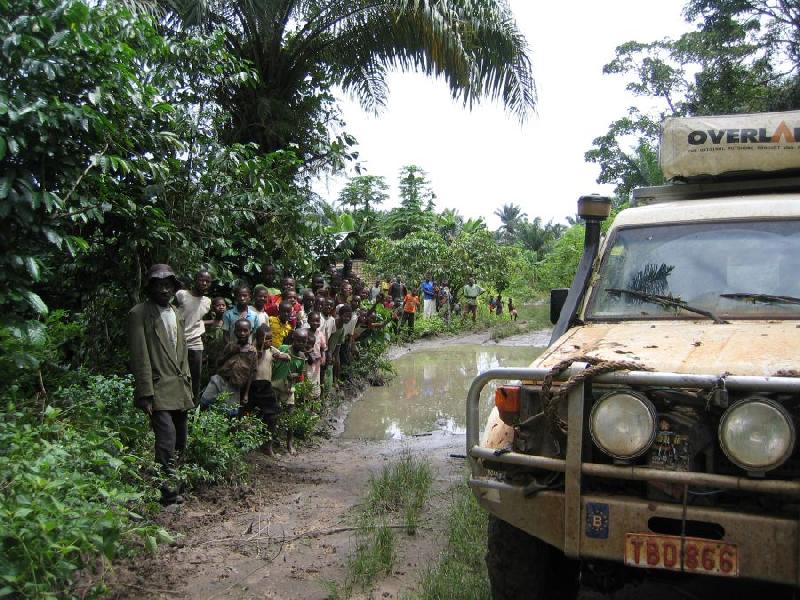
Bicycle tracks are not suited for Landcruisers... so we got stuck. The villages usually had the worst obstacles. In this one village there was a big boghole filled with water. We drove in but did not see the pigs that were taking a bath so we slowed down to give them the time to get out.
Big mistake. We were stuck. The water came to the bottom of the door. This particular mudpit had a bit of a funny smell. It was the favourite place of the pigs so it probably contained a fair amount of sh*t. It sure smelled like it. The entire village gathered round us while we got out, knee deep in sh*t.
They did not offer help.
We started clearing the wheels. Josephine hurt her foot on a stick, the pain could be seen on her face. The people thought this was extremely funny and burst out laughing. This was very humiliating for Josephine and I could see the anger on her face. We looked at eachother and understood that this was not the time to get angry or start discussions with 50 or so people. We continued to work. As I bend over to clear the mud from underneath the car my pants get wet up until my ehrm.. 'privates'.. . Once again this is the funniest thing these people have ever seen. Hilarity ensues. This was very humiliating to us.
Eventually they offered to help us if we pay them. I tell them that I do not have money. They did not move an inch.
It takes the best part of an hour to get us out. To their surprise we stop again and I get out and walk up to them. Very calmly I explain that we did not like it when they laughed at us. I asked them how they would react if they hurt themselves and we would laugh at them. The acknowledged that they would get mad at us.
I asked them if they would want us to help them if they had a problem. The acknowledged this. I said what they would think if we asked for money before we would help them. They called us racists and immediately demanded money from us.
I then saw a side of Josephine I hadn't seen before. She got very cross with words and gestures. I will not repeat what she said here... it wasn't pretty I must say 8O Much to the amusement of our adience.
To some of the people in the village our message must have gotten along, and they guided us around the next boghole.
Half an hour later we stopped to eat lunch. We were still shaking after the humiliation, we felt helpess.
We opened a can of Coke (still from Zambia) and a jar of pickled onions to eat with our bread.
Those 'horrible' people did not have a Coke, even if they had the money to buy it, it was not avaialble. They did not have pickled onions either. And between the two of us we ate as much bread as an entire family would eat for an entire day.
We tried putting things into perspective. Maybe we shouldn't be here after all?

That is not the same pit/people from the above anecdote, but it is very similar. We must have crossed 20 or so villages like this.

The progress we hoped to be making today did not materialize..
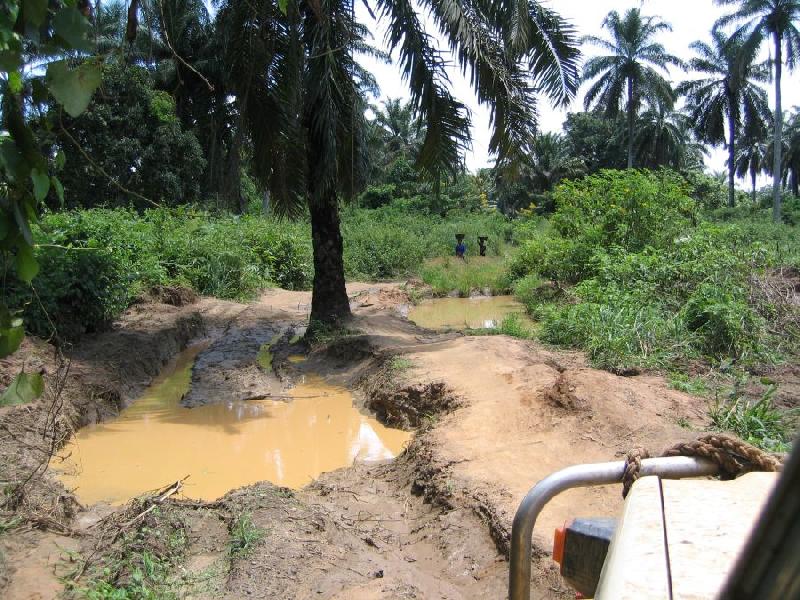
This was the thoughest going we had thus far since we left Lubumbashi. While the road had always been difficult, the inbetween bits used to be ok. Those inbetween bits did no longer exist now. The erosian was pretty bad and we were creeping forward
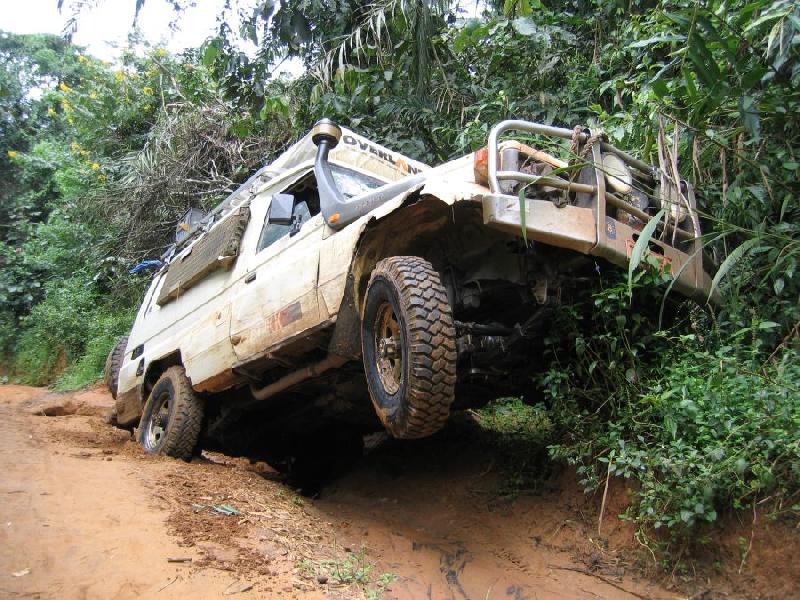
Every obstacle meant a new dent or other damage
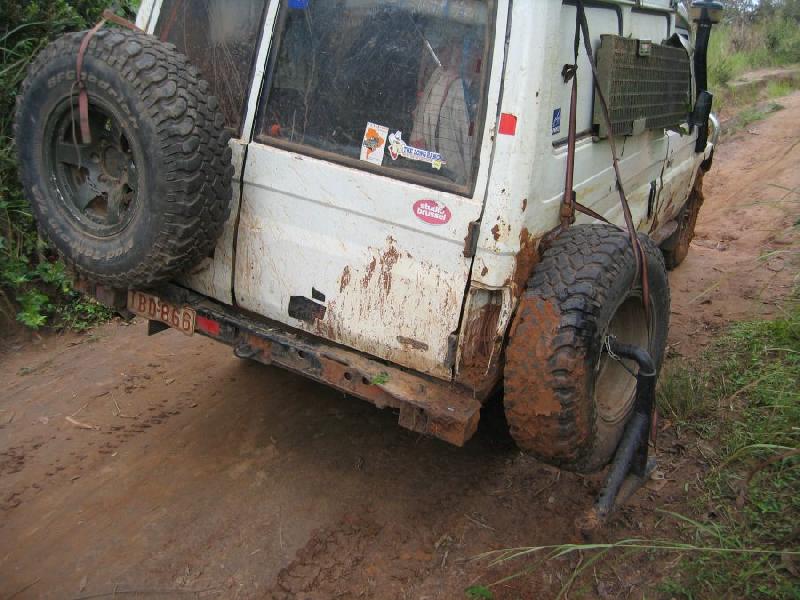
To make matters worse we drove straight into a tropical storm..

This was the thoughest going we had thus far since we left Lubumbashi. While the road had always been difficult, the inbetween bits used to be ok. Those inbetween bits did no longer exist now. The erosian was pretty bad and we were creeping forward

Every obstacle meant a new dent or other damage

To make matters worse we drove straight into a tropical storm..
That is what we did when possible. But we did not take pictures of that ;-) Often the jungle was to dense, or the ridges to steep to drive around obstacles. We tried to avoid obstacles as much as possible.
In a fast pace the clouds
appeared out of nowhere, in a matter of minutes it became as dark as the
night. Winds picked up and jungle forest made terrible noise. Thick
drops started banging on our car. Slowly at first but exponentially
growing in size and number. Lightning almost immediately followed by
deafening thunder. The hard rain stirred the ground and released many
smells.
God, I love those tropical storms! A little less today though, as the track we were driving on quickly became very mudy. The ruts filled with water and became streams. Visibility was down to nil as our windscreen wipers couldn't keep up.
This slowed us down even more. We slid and slide.. sideways more then forward.
We came to another village, refreshingly we had the road for us alone, as everybody had taken cover for the rain. The usual bogholes were present but we could drive around it... or could we?
What looked like a viable bypass was nothing more then a meter thick layer of soft and sticky mud on top of a puddle. Our landcruiser sunk in deep.
I got out and within seconds I was drenched, I could barely breath because of the water that ran down my face and into my mouth. This was useless I couldn't see a thing. We had to wait until the rain stopped.
Luckily those tropical storms go as quickyl as they come and after an half hour wait the downpour transformed in a little drizzle.
We have gotten ourselves properly stuck I must say. Up unto the axles. Out came the sandplates and the shovels and I started digging. The village too had noticed the rain had resided and quickly came to see what was going on.
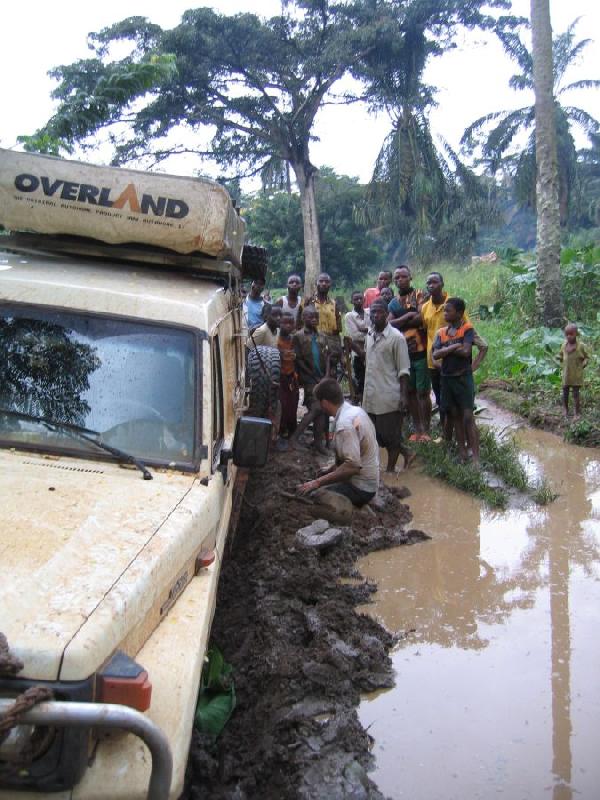
No surprisingly nobody they offered their assistance, they even had some shovels. But they wanted money first. By now you probably think we are just stupidly stubborn and naive. We probably are, but we refused to give in to corruption. I once again told them they were free to help, but we would not give them money. So I continued to dig on my own with an entire village as an audience.
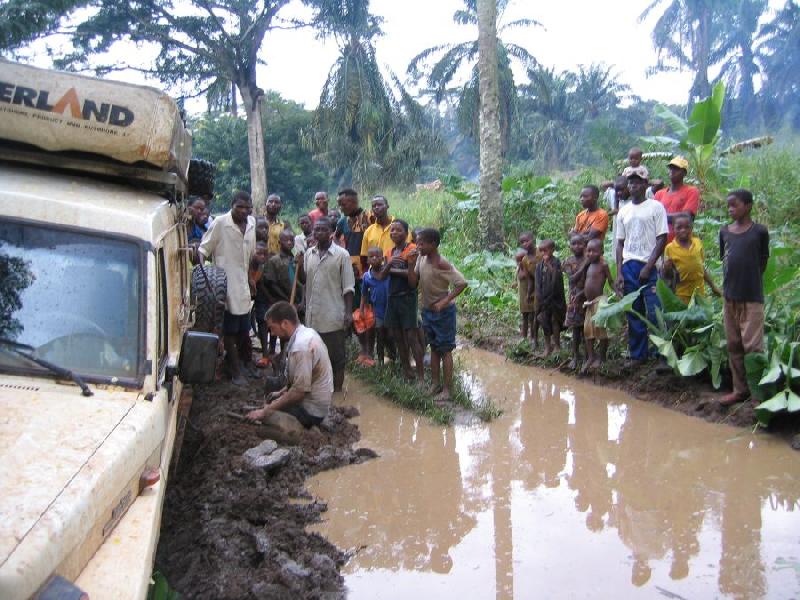
It took three more attempts to drive out before the village priest (7th day Adventist by the way) encouraged a few strong men to help. After a small discussion between the priest and the men they helped us eventually. We did not promise them anything. Good!
Almost two hours after we drove in we succesfully managed to back out. The priest then lead us trough his village (milimeterwork between the huts) around the bogholes.
We offered the priest a small fee for his spontaneous help. We were grateful. He was in trouble now as he had to split up the money between the helpers and we could see a discussion had started already.
Covered in mud we continued... the hope to get to Pembeyanga today has long vanished. Darkness was starting to fall...
God, I love those tropical storms! A little less today though, as the track we were driving on quickly became very mudy. The ruts filled with water and became streams. Visibility was down to nil as our windscreen wipers couldn't keep up.
This slowed us down even more. We slid and slide.. sideways more then forward.
We came to another village, refreshingly we had the road for us alone, as everybody had taken cover for the rain. The usual bogholes were present but we could drive around it... or could we?
What looked like a viable bypass was nothing more then a meter thick layer of soft and sticky mud on top of a puddle. Our landcruiser sunk in deep.
I got out and within seconds I was drenched, I could barely breath because of the water that ran down my face and into my mouth. This was useless I couldn't see a thing. We had to wait until the rain stopped.
Luckily those tropical storms go as quickyl as they come and after an half hour wait the downpour transformed in a little drizzle.
We have gotten ourselves properly stuck I must say. Up unto the axles. Out came the sandplates and the shovels and I started digging. The village too had noticed the rain had resided and quickly came to see what was going on.

No surprisingly nobody they offered their assistance, they even had some shovels. But they wanted money first. By now you probably think we are just stupidly stubborn and naive. We probably are, but we refused to give in to corruption. I once again told them they were free to help, but we would not give them money. So I continued to dig on my own with an entire village as an audience.

It took three more attempts to drive out before the village priest (7th day Adventist by the way) encouraged a few strong men to help. After a small discussion between the priest and the men they helped us eventually. We did not promise them anything. Good!
Almost two hours after we drove in we succesfully managed to back out. The priest then lead us trough his village (milimeterwork between the huts) around the bogholes.
We offered the priest a small fee for his spontaneous help. We were grateful. He was in trouble now as he had to split up the money between the helpers and we could see a discussion had started already.
Covered in mud we continued... the hope to get to Pembeyanga today has long vanished. Darkness was starting to fall...
We
were a in a miserable state. We were both soaked and there was mud
everywhere, exhausted and stirred by todays experiences. Hungry. And
above all nervous as to where we would stop for the night. We passed a
few villages, they looked very poor and rundown. On the GPS we saw we
were nearing a somwhat larger settlement: Kakenge. In the dark we did
another 5km (about an hour).
Kakenge was indeed a large settlement and our luck turned as not only was there a catholic mission, it was a nice catholic mission! A fenced of compound (2 meter high walls.. who were they trying to keep out?) with inside a beautiful garden and two simple but clean buildings. The only brick buildings in town. Four fathers lived here, all Congolese but most of them had studied abroad. One of the fathers, Frère Polydore, had lived in Rome for 8 years. He had the humour and the way of talking of an Italian, a funny guy. They let us camp, have a shower (bucket) and they even let us use their dining room in all peacefulness.
Just what we needed! Today we spent 15 hours on the road in our struggle forward. What a day...
They also gave us the news that the road to Ilebo would progressively get worse and even impassable...
Kakenge was indeed a large settlement and our luck turned as not only was there a catholic mission, it was a nice catholic mission! A fenced of compound (2 meter high walls.. who were they trying to keep out?) with inside a beautiful garden and two simple but clean buildings. The only brick buildings in town. Four fathers lived here, all Congolese but most of them had studied abroad. One of the fathers, Frère Polydore, had lived in Rome for 8 years. He had the humour and the way of talking of an Italian, a funny guy. They let us camp, have a shower (bucket) and they even let us use their dining room in all peacefulness.
Just what we needed! Today we spent 15 hours on the road in our struggle forward. What a day...
They also gave us the news that the road to Ilebo would progressively get worse and even impassable...
Progress after day 14. Kakenge
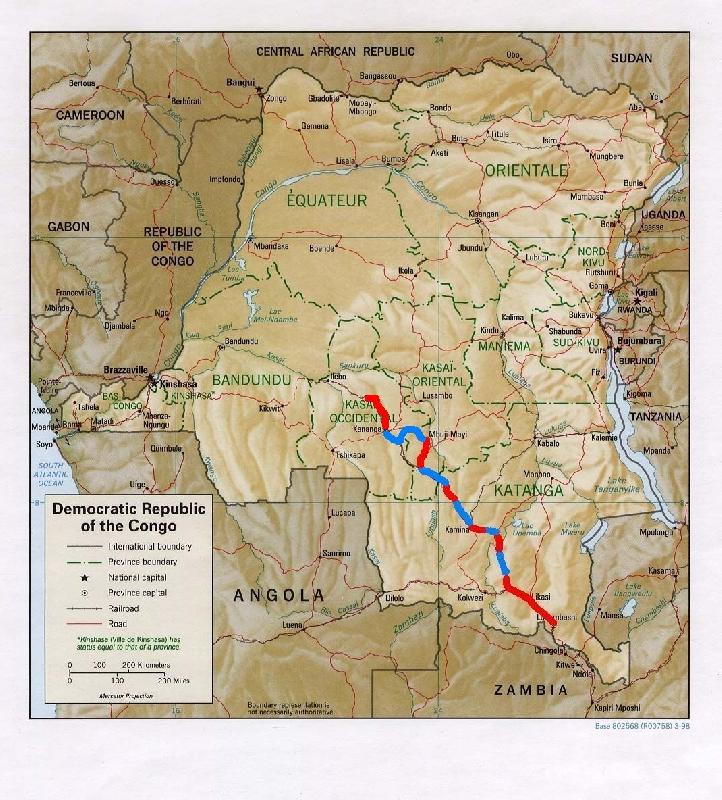

Day 15
We slept until late today and only got on the road at 9. Silently we hoped to reach Pembeyangu today although the road would have to better as yesterday.
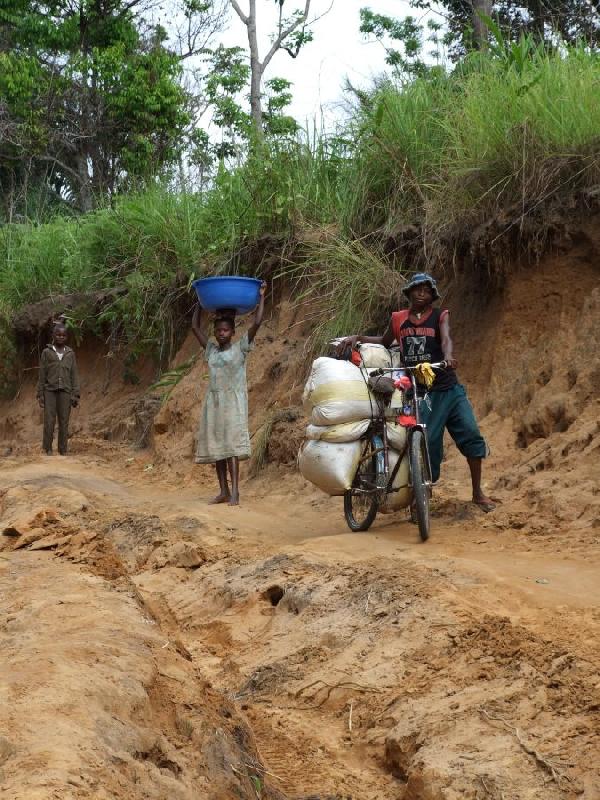
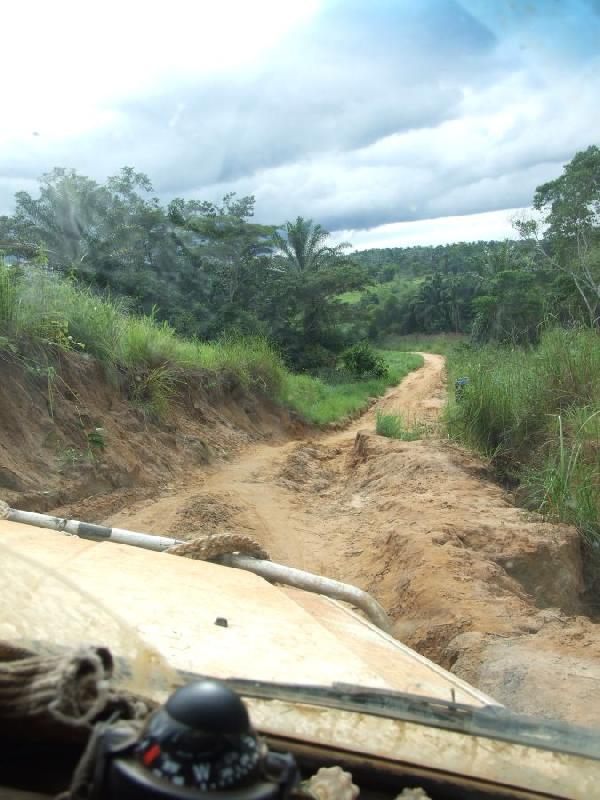
The road was not better then yesterday.
Erosion became a real problem and we spent most of our time "underground"
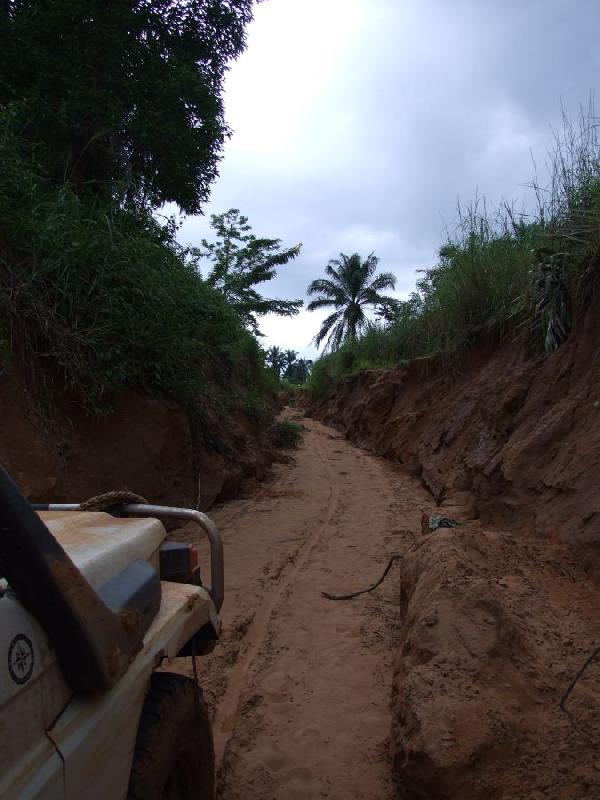
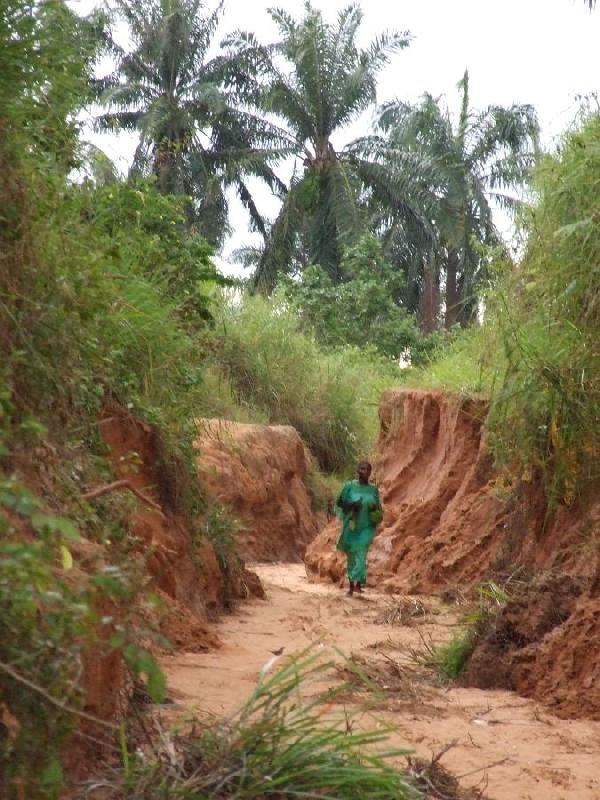
And then we tipped over...
We slept until late today and only got on the road at 9. Silently we hoped to reach Pembeyangu today although the road would have to better as yesterday.


The road was not better then yesterday.
Erosion became a real problem and we spent most of our time "underground"


And then we tipped over...
Thank you so
much for all the kind words. It is a great feeling to know we are not
boring you guys with our little trip report here ;-)
A winch can be handy, but there is always an alternative. Sometimes it meant it takes days to get out, instead of minutes.
Nope, no winch. We would have used it often if we had one, but at when we were preparing for the trip we could choose between buying a winch, or an extra month on the road. We went for the extra month.
A winch can be handy, but there is always an alternative. Sometimes it meant it takes days to get out, instead of minutes.
We
had been driving in akward angles a lot, and a few times already we
could feel two wheels lifting off, but until now we managed to always
end up on our 4 wheels. Until now..
We had two wheels in the air and we were resting on our side. Luckily the eroded sidewall made sure we did not fall too deep. We knew it would happen sooner or later but the sound of bending sheetmetal still scared us a bit.
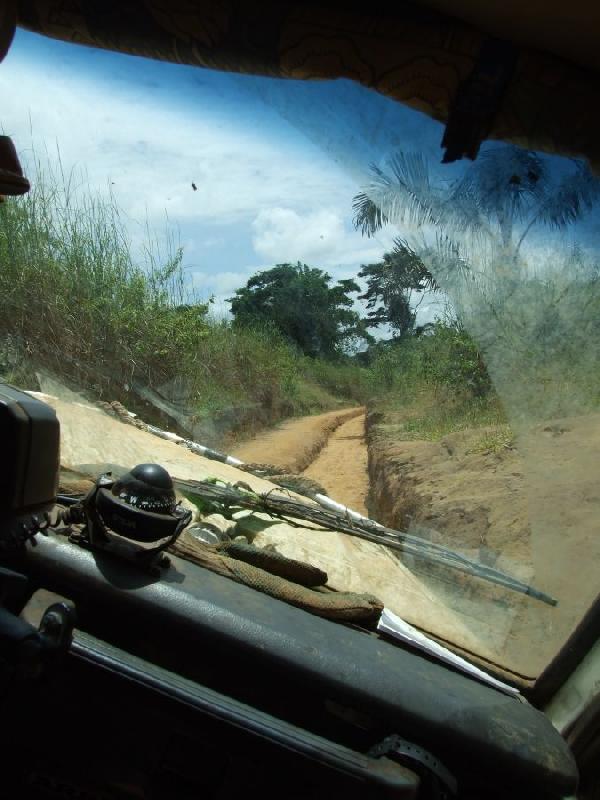
It was nothing spectacular (sorry ) but nevertheless, we were in a situation were our wheels were 20 cm
off the ground. We do not have locking differentials by the way.
) but nevertheless, we were in a situation were our wheels were 20 cm
off the ground. We do not have locking differentials by the way.
We got our shovel out again :roll: and starting to add ground underneath our wheels to make them grip again and made the next few meters a bit more level hoping that we would righten ourselves again. It worked like a charm but it was a great amount of work. Damage was limited to a few extra dents.
Still exhausted we continued, still in bizarre angles.
Then we tipped over again..
We had two wheels in the air and we were resting on our side. Luckily the eroded sidewall made sure we did not fall too deep. We knew it would happen sooner or later but the sound of bending sheetmetal still scared us a bit.

It was nothing spectacular (sorry
We got our shovel out again :roll: and starting to add ground underneath our wheels to make them grip again and made the next few meters a bit more level hoping that we would righten ourselves again. It worked like a charm but it was a great amount of work. Damage was limited to a few extra dents.
Still exhausted we continued, still in bizarre angles.
Then we tipped over again..
"Annoyed"
would be a correct word to describe our mood. We could still see were we
tipped over last time and we knew how much digging it takes to get the
car righted again.
No choice... out came the shovel... and eventually we got out again... and it did not take another kilometer before we... tipped over again... and again..
And again.
At this rate it would take years to get us to Ilebo, we had to find a way to keep moving. Now, most of the road was ok to drive on. The little indicator on our dashoard learned us that we could keep driving until about 35 degrees tilt angle. It were only occasional patches were the angle would become too big and we'de be on our sides.
We figured that if we would keep enough momentum, that we would slide forward on our side and "bounce back" on our wheels. So, that is what we did. We kept the speed up and if the road dipped too much we would tip over. Because of the higher speed the impact on the side was much bigger. But that, combined with the forward movement created a "jo-jo" effect (do you guys know what a jo-jo is? Not sure if it is called the same in English).
Move forward. Tip over. Slide forward a bit on the side of the car. Bounce back. Wheels touch the ground. Move forward. And repeat.
Some of the longer steep section were maybe 100meter long. We would "bounce" numerous times to get trough this. When we got trough we had a fixed procedure:
- Depending on what side we tipped over, the person sitting on the opposite side would get out of the car first.
- Armed with a hamer and spanner "20" go to the other side of the car
- Bang and bend the door back into shape so it would open again
- Both of us would walk back the part we just "bounced" trough, picking up all the parts of the car that fell of. Usually the mirrors, various bits and pieces of the filling cap, the sandladders, indicator lights and the odd bits of our roofrack.
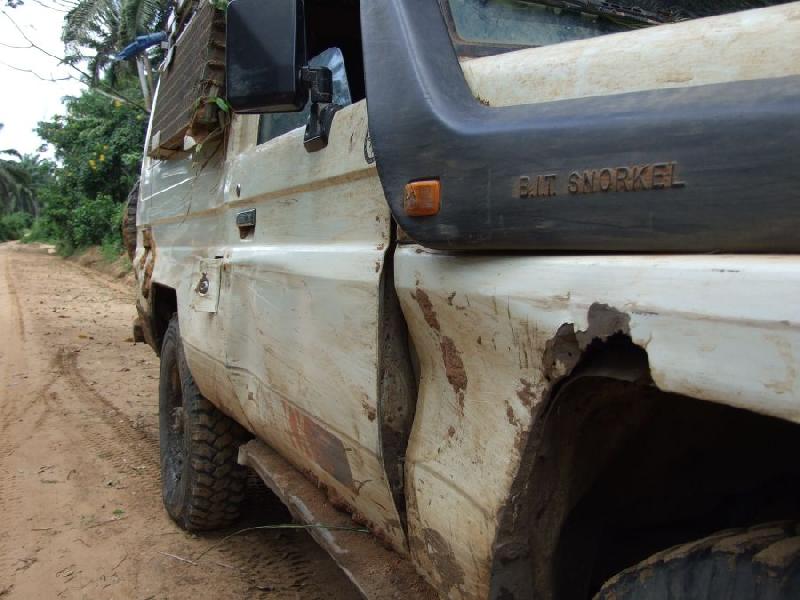
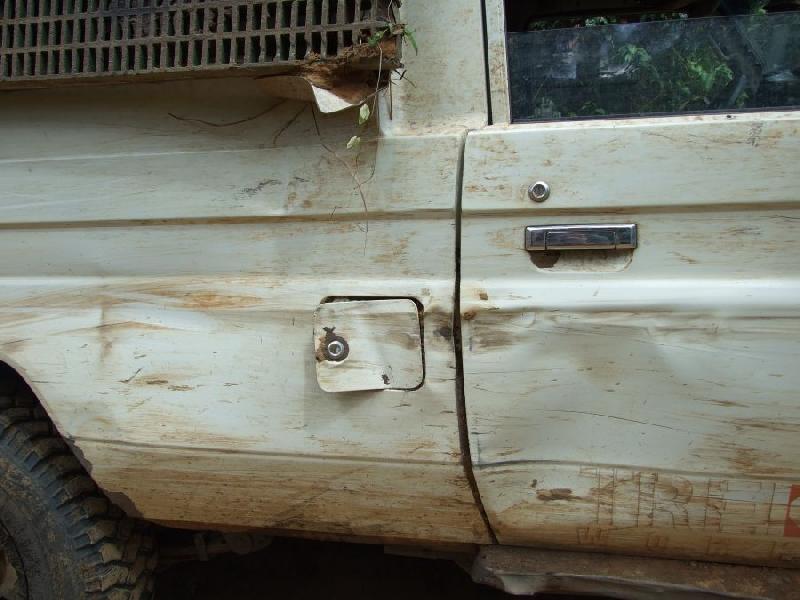
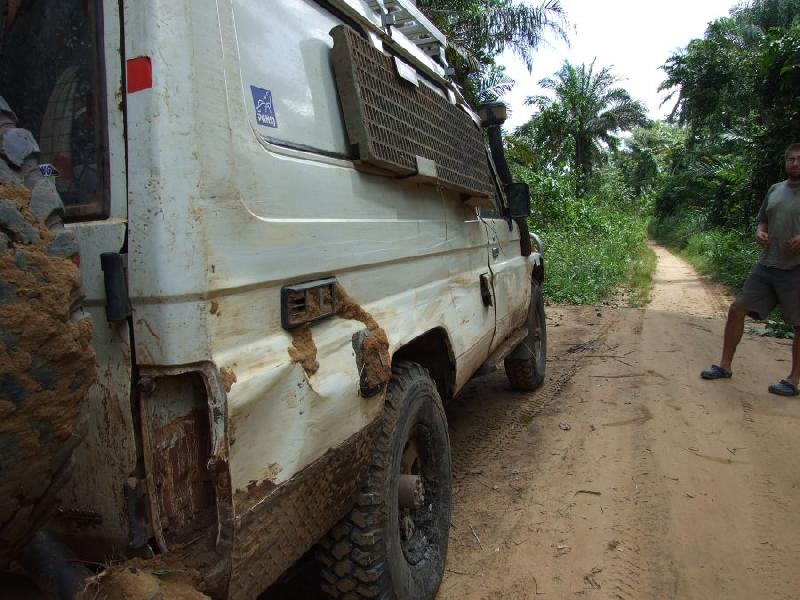
Strong car!
This technique is probably not described in any "4x4 driving techniques" handbook. :wink:
No choice... out came the shovel... and eventually we got out again... and it did not take another kilometer before we... tipped over again... and again..
And again.
At this rate it would take years to get us to Ilebo, we had to find a way to keep moving. Now, most of the road was ok to drive on. The little indicator on our dashoard learned us that we could keep driving until about 35 degrees tilt angle. It were only occasional patches were the angle would become too big and we'de be on our sides.
We figured that if we would keep enough momentum, that we would slide forward on our side and "bounce back" on our wheels. So, that is what we did. We kept the speed up and if the road dipped too much we would tip over. Because of the higher speed the impact on the side was much bigger. But that, combined with the forward movement created a "jo-jo" effect (do you guys know what a jo-jo is? Not sure if it is called the same in English).
Move forward. Tip over. Slide forward a bit on the side of the car. Bounce back. Wheels touch the ground. Move forward. And repeat.
Some of the longer steep section were maybe 100meter long. We would "bounce" numerous times to get trough this. When we got trough we had a fixed procedure:
- Depending on what side we tipped over, the person sitting on the opposite side would get out of the car first.
- Armed with a hamer and spanner "20" go to the other side of the car
- Bang and bend the door back into shape so it would open again
- Both of us would walk back the part we just "bounced" trough, picking up all the parts of the car that fell of. Usually the mirrors, various bits and pieces of the filling cap, the sandladders, indicator lights and the odd bits of our roofrack.



Strong car!
This technique is probably not described in any "4x4 driving techniques" handbook. :wink:
That
day we did the "tip over thing" at least 20 times. After a while you
stop worrying about the dents, but I can still hear the sound of the
impacts.
Then, out of the blue, there was a road! This was completely absurd, as this road led to nowhere, but here it was, a recently build road about 10 meters wide. The forest was cut and cleared, the ground was made level and smooth as silk 8O
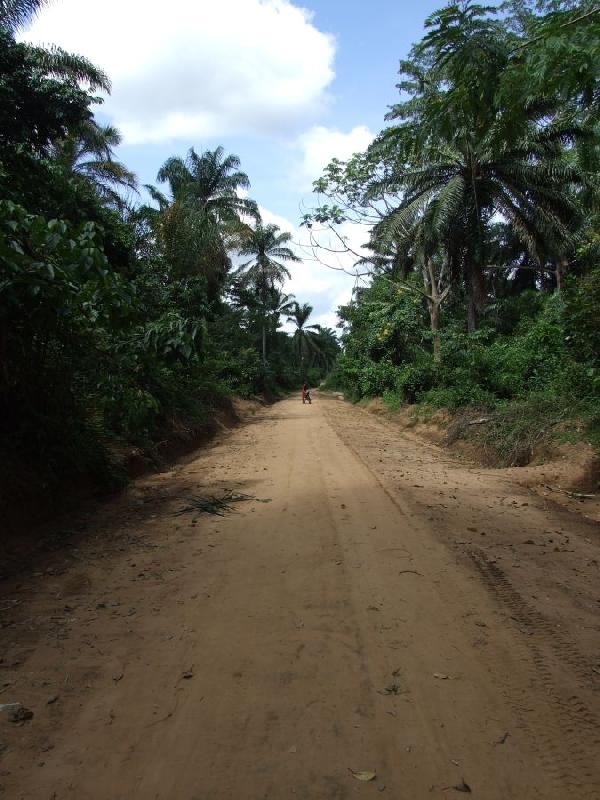
Where did this come from?
We drove onto the road and immediately started sinking in. I floored it to keep momentum and we crept forward, leaving deep ruts behind us.
We felt really bad when that happened. Somebody put a huge amount of effort in building a road here. And then comes along this stupid tourist and he just pulls two big ruts spot in the middle of this road.
We did not stay around to take a picture of our ruts, we were a bit embarrased.
The road dissapeared as suddenyl as it appeared before.
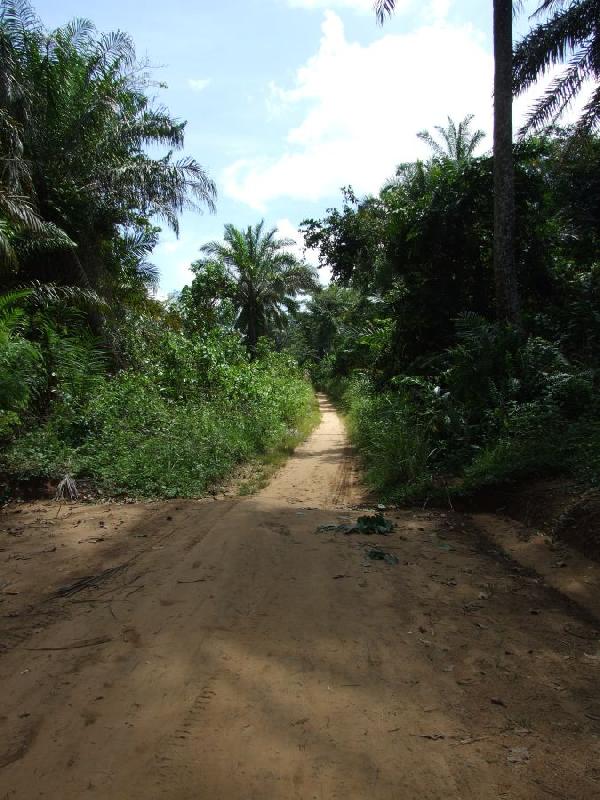
What the ... ?
Then, out of the blue, there was a road! This was completely absurd, as this road led to nowhere, but here it was, a recently build road about 10 meters wide. The forest was cut and cleared, the ground was made level and smooth as silk 8O

Where did this come from?
We drove onto the road and immediately started sinking in. I floored it to keep momentum and we crept forward, leaving deep ruts behind us.
We felt really bad when that happened. Somebody put a huge amount of effort in building a road here. And then comes along this stupid tourist and he just pulls two big ruts spot in the middle of this road.
We did not stay around to take a picture of our ruts, we were a bit embarrased.
The road dissapeared as suddenyl as it appeared before.

What the ... ?
If we stayed at a campsite and had running water, we did the wash there. When you travel for a long time, you regularly stay somewhere for a few days to get organized again. Sometimes we were "on the go" for a longer period of time, then we washed up in rivers or whatever was available. We did this immediately after stopping at night. If it wasn't dry in the morning, we hung some bungees in the back of the car. We probably had a permanent grubby look though.
In DRC it was a lost case. The humidity, the mud, the digging. We looked -and smelled - like we got stuck in the jungle for two months! ;-)
Started out with a Coleman two pit gasoline burner. Great piece of kit, but after 9 months of dirty African fuel it was really finished. Everything was black black black, bad burning, etc.. Barely useable. In Japan we bought the same stove again. Seconhand. That one was shot after 6 months of dirty Russian fuel. We then ordered a Primus Omnifuel and had it shipped to Cairo. A bit more work to set up, and only one pit. But it worked. After 6 months we had to rebuild the entire stove, but it is still functional now.
Some pictures from during the buildup can be found here: http://radiobaobab.be/index.php?id=178 . We could sit inside in emergencies or if it was really cold. It was ok, but on the long cold evenings it was a bit cramped. In the warm countries we lived outside ofcourse.
Everything homemade on the interior.
Phew, difficult question. I once formulated a better and more detailed answer for this, but I can't really remember. You can soon read it in Chris Scott's new book (Overland Handbook) which is due for publication
In short: we used everything we took and didn't miss anything we didn't take. Which does not mean we really 'needed' everything we took.
When we were busy digging we thought of only one thing: getting out of the obstacle, using whatever was available. Thinking about the things that we did not have but could have helped us at the time would have been a sure recipe to get a depression.
But yes, it did cross our mind. And yes, it would have helped tremendously and reduced the damage the our car (the value of all the things we broke exceeds - by far - the price of a winch). But did we need it? Nope, we have always gotten out this far without a winch
But given the option, I would choose the month extra any time.
That said, I am building a new and improved version and a winch is on my shopping list.. but only if we have some spare cash..
Then again, there is something magical about getting trough impossible obstacles. The improvisation, the stress, the hard labour.. Great stuff! A winch would kinda spoil the fun ;-)
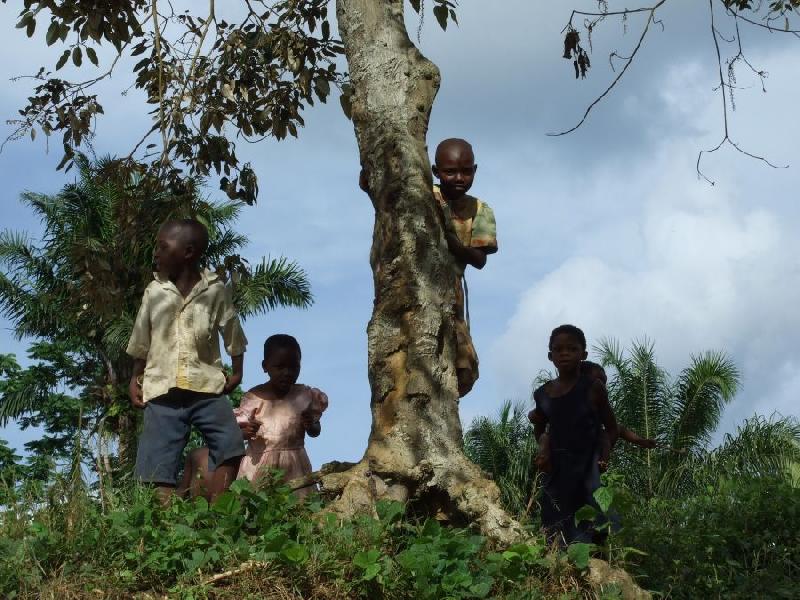
The road was pretty varied. Jungle track. 'Bouncing track', weird patches of newly constructed road, etc.. I am not sure which kind of road we liked more... or disliked more.. . Often we had to wait to let the bicycles pass, sometimes they had to wait to let us pass.
Not surprisingly we would not make it to Pembeyangu today either. They gave us too much hope in Kananga that we could make it in one day. It was obvious that nobody there had recently travelled on this stretch. Or maybe they had travelled it on foot or on a bicycle, and they do not have a clue how difficult this road is with 4 wheels instead of 2.
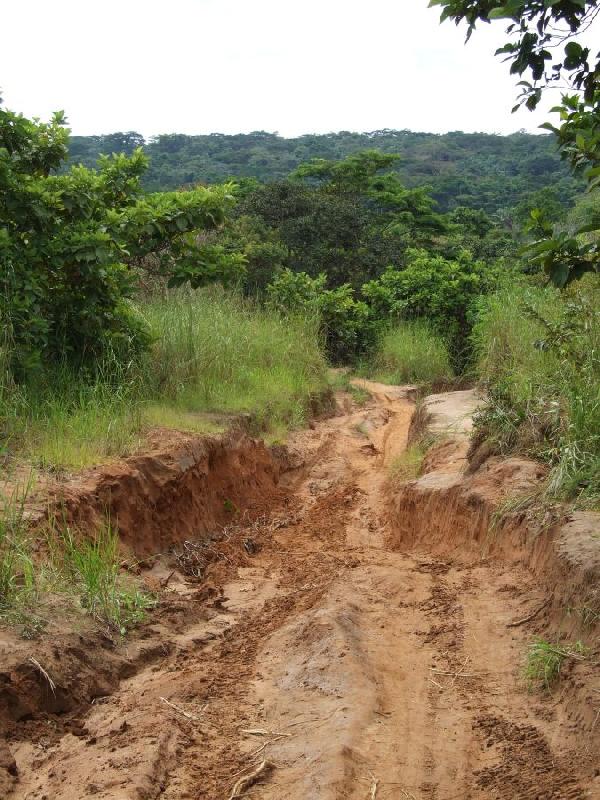
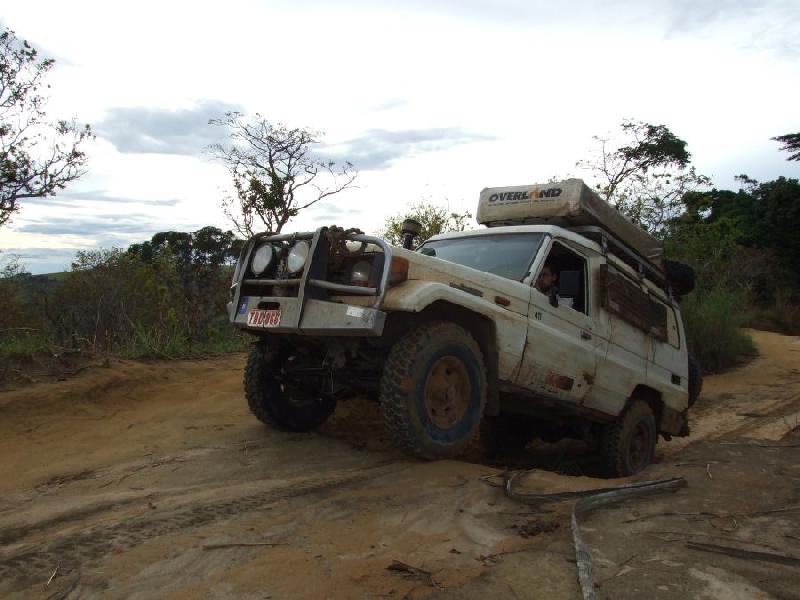
We stopped in the biggest 'town' in the area, Domiongo. It took a bit of searching to find a cathalic mission, it was on the outskirts of the villlage. Once again we were greeted friendly and had permission to camp in their grounds. We sat together with the fathers and talked for many hours.
They told us about the mysterious roads. Apparently some NGO (they did not know the details... or they told the details and we forgot) has funded the construction. Several teams started working at several locations. The different bits were supposed to connect at one point. As of recent, work had nearly stopped... no more budget. It was unclear if more budget would become available or not. In any case the idea of the construction was to invest all the money in labour instead of buying an expensive CAT. Great idea ofcourse, that way all the money stayed in DRC, instead of filling the pocket of some bigwig at CAT. If you look at the road it was quite a feat. They thought about drainage and everything. Unfortunately they could not compress the earth enough with the tools they had. We already started a few ruts, it would only take 1 heavy truck to completely destroy these roads again. These roads would not last a rainy season.
The major complaint of the fathers was the upcome of all sorts of other religious movements (we talked about 7th day adventists before, but other movements were active in the area too). They claimed that they grew in popularity because of the animated ceremonies. But these movements did not have the social network and organisation behind them as the catholic missions. People would no longer work at the farm of the mission, would drop out of school, etc... Apparantly 'alternative' religions were also gaining in poularity, like fetishism, ..
Anyway, we talked about many other things too, it was a pleasant evening with interesting people.
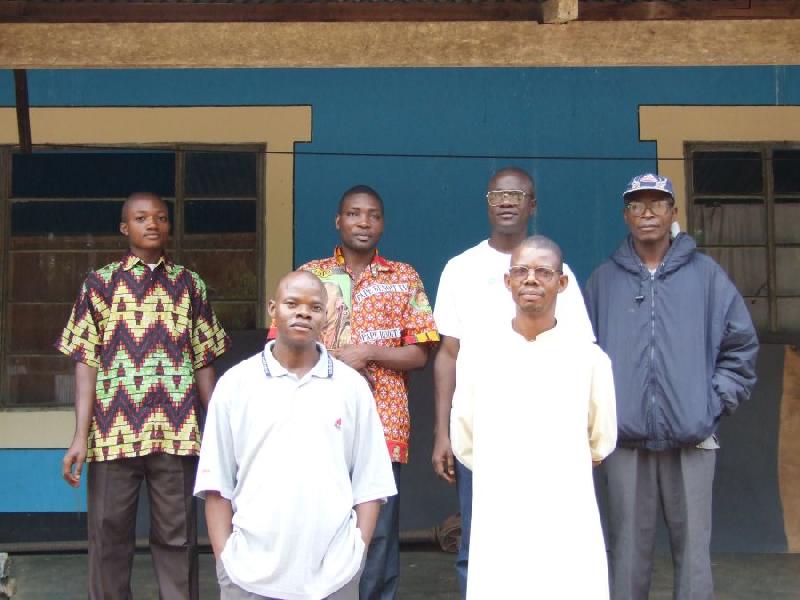
In the evening the fathers would run their generator for a few hours. It was in a little hut very close to our tent. The hut was half submersed from the rain water. All of a sudden the generator shorted. Smoke and blue lightning came out of the hut. One of the fathers ran in the hut, barefoot (!), with a stick and hit the offending cable until it got disconnected. Brave father!
Progress after day 15. Domiongo.
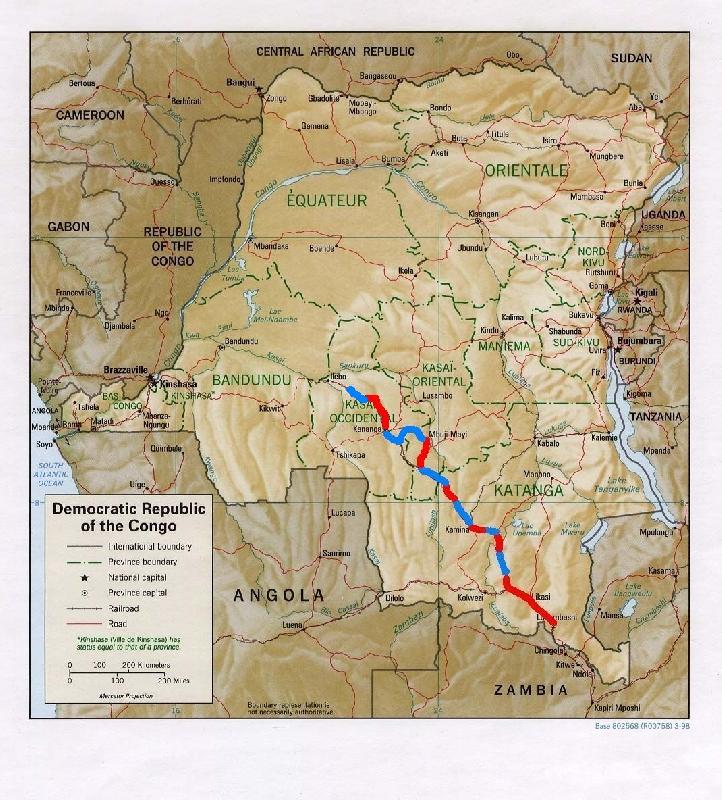

We came across a small
motorcycle. You'd see them from time to time, it is the most luxurious
transportation people have here. They are litte chinese 50cc (or 125cc)
bikes. We stopped to let him pass and he stopped to greet and ask us if
we had some oil for his engine.
All over the world there is an unwritten rule that in remote or difficult to travel areas people help eachother. That is why in the sahara everybody says hi to eachother. That is why in the Mongolian steppe people drive for kilometers just to check up on you. People help when needed as they know they will be helped when they are in need. We very much honour this unwritten rule and will always assist when we can.
So when this guy asks for oil, I do not hesitate and take out a my spare can of oil. I warn him that this is oil for diesel engines, but that does not matter to him. It is probably the best oil he would ever find to put in his little bike. As I am pouring oil from my can in his can the passenger of the bike starts begging with Josephine. I am not impressed when Josephine tells me. And when the bike owner too start to ask for money, it really pisses me off. We are helping this guy and still he begs for more? So I pour the oil out of his can back into mine and tell them to sod off. In our car and off we go.
For almost a month now we were in a serious fight with Congo. We were fighting against corruption. We were fighting against the roads. A constant battle. Congo was giving us a serious beating, but we stood strong and did not give in. Slowly but steadily we were winning this battle against the Congo.
But while we were so busy battling the roads and the corruption, Congo sneaked in from behind. It had transformed us into loud and angry people. With no remorse, no compassion, and a total lack of rules.
What happened to the unwritte rule of the road less travelled? The rule we nohour so much? All out of the door..
Congo had beaten us a long time ago already. Just like it had beaten most of its own citizens.. And we didn't have a clue
All over the world there is an unwritten rule that in remote or difficult to travel areas people help eachother. That is why in the sahara everybody says hi to eachother. That is why in the Mongolian steppe people drive for kilometers just to check up on you. People help when needed as they know they will be helped when they are in need. We very much honour this unwritten rule and will always assist when we can.
So when this guy asks for oil, I do not hesitate and take out a my spare can of oil. I warn him that this is oil for diesel engines, but that does not matter to him. It is probably the best oil he would ever find to put in his little bike. As I am pouring oil from my can in his can the passenger of the bike starts begging with Josephine. I am not impressed when Josephine tells me. And when the bike owner too start to ask for money, it really pisses me off. We are helping this guy and still he begs for more? So I pour the oil out of his can back into mine and tell them to sod off. In our car and off we go.
For almost a month now we were in a serious fight with Congo. We were fighting against corruption. We were fighting against the roads. A constant battle. Congo was giving us a serious beating, but we stood strong and did not give in. Slowly but steadily we were winning this battle against the Congo.
But while we were so busy battling the roads and the corruption, Congo sneaked in from behind. It had transformed us into loud and angry people. With no remorse, no compassion, and a total lack of rules.
What happened to the unwritte rule of the road less travelled? The rule we nohour so much? All out of the door..
Congo had beaten us a long time ago already. Just like it had beaten most of its own citizens.. And we didn't have a clue
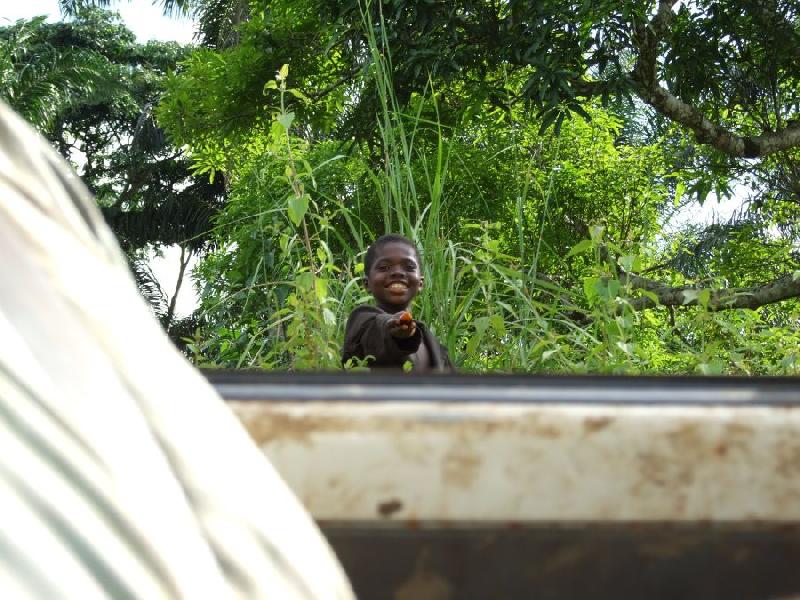
The road from Kananga to Ilebo goes mostly trough forest, but Pembeyange is situated on top of a hill in a beautiful plain. Really pictoresque.
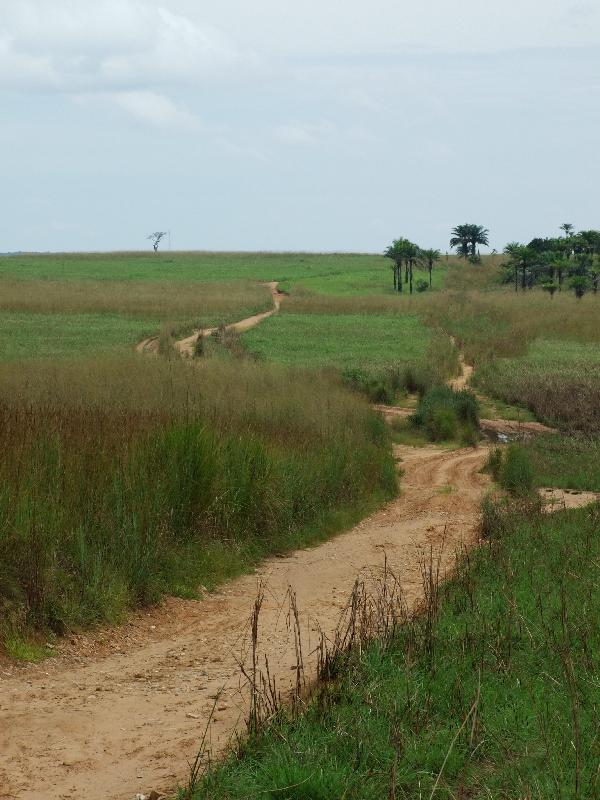
Upon our arrival in the (small) village everybody went completely nuts. Children cheered and ran after us, we had our usual crowd again. As they guided us trough the village towards the mission it showed that people here do not have notions about cars. They led us between huts, trough gardens, ... This was the way they always took to walk to the mission, but they failed to see that this was impossible with a car. As we did not want drive over peoples houses we backtracked and had to find ourselves another route to the mission. In the meantime the children had great fun climbing on our wheelcarriers. The wheelcarriers are not made for this kind of weight and one of them broke off... great! This was so much fun that the now targetted the other wheelcarrier. Josephine had to walk behind the car to keep the kids off.
Unfortunately the father of this mission was not there, but his apprentice was. A very young guy, fresh out of school. He was not happy to be here, that much was clear. He did nothing else but complain and he would whine on endlessly. He was not a bad guy, but was wan't very good company either.. oh well.
The mission had a small toilet hut. A hole in the ground affair with a roof on top, the roof was very low, which made it difficult to 'do your thing'. When Josephine made use of the facilities she could hear something rustling in the roof. When she look up she was face-to-face with a thin green/brown snake. I had never seen Josephine run so fast! From her description it could have been a green mamba? When told to the 'maman' who took care of the mission she too was scared and with great care she chased the snake a way. "Très dangereux" apparantely.
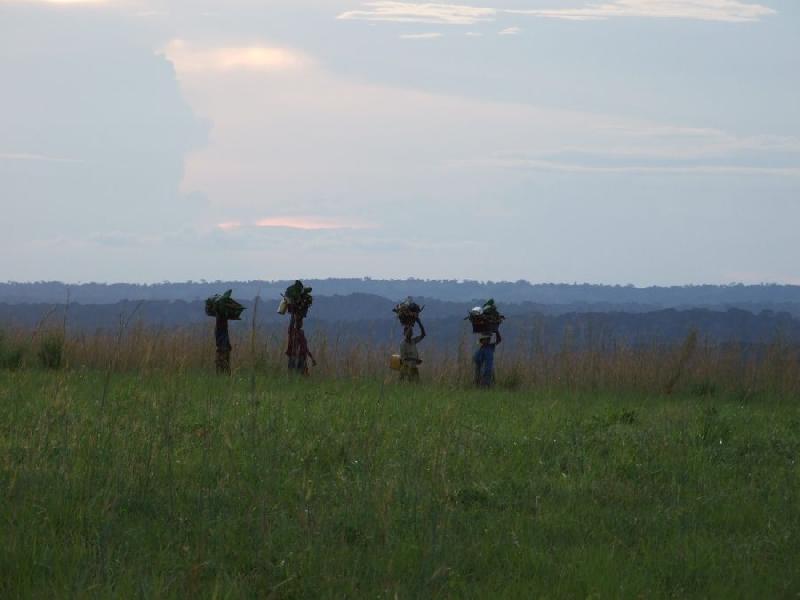
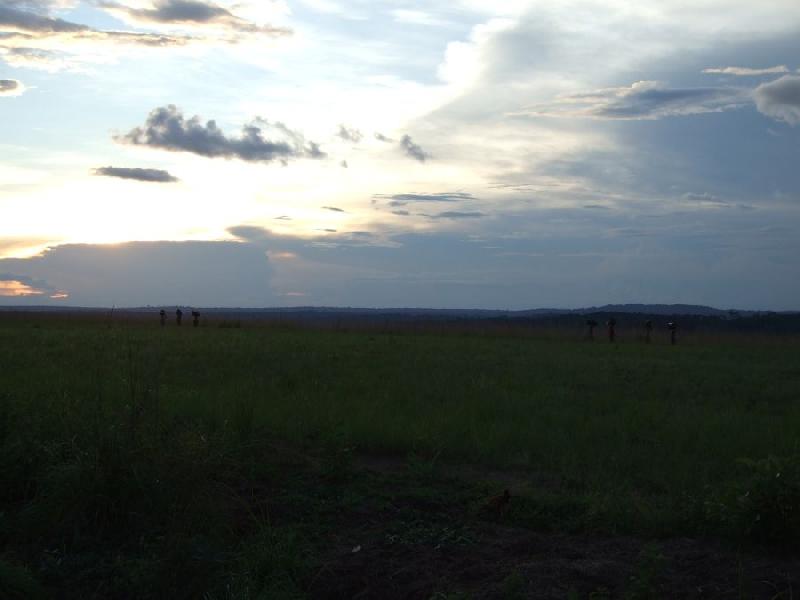
Progress after day 16. Pembeyangu
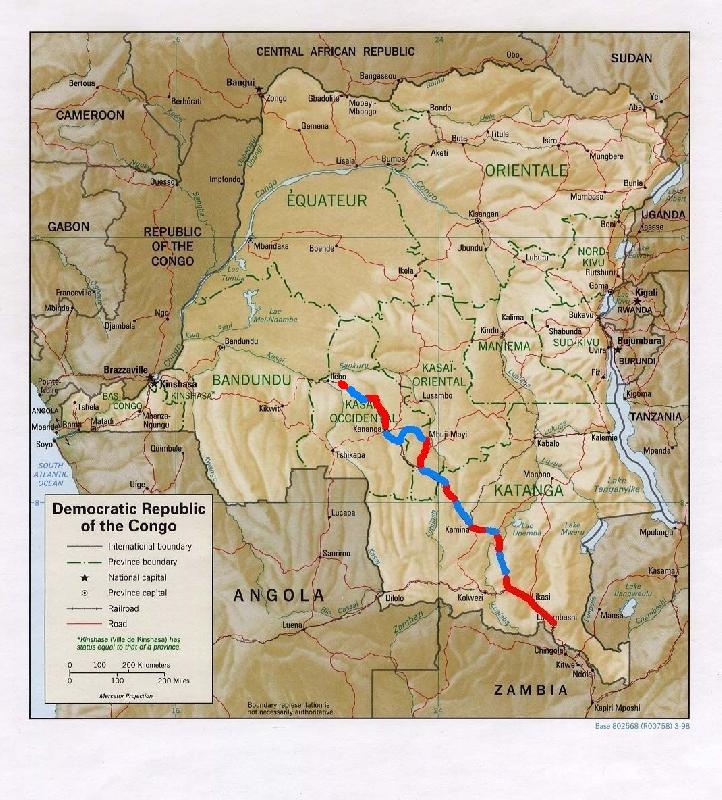

Day 17
It is only 50 kilometers to Ilebo from here.
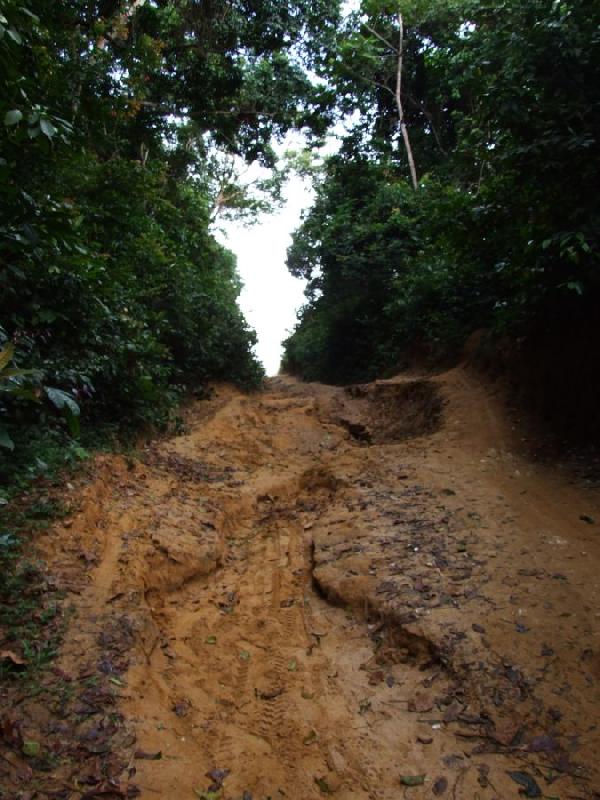
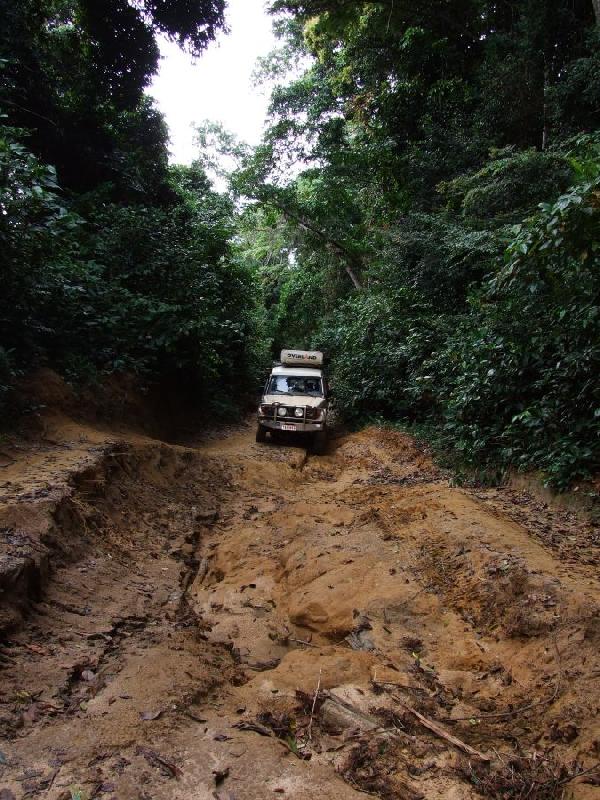
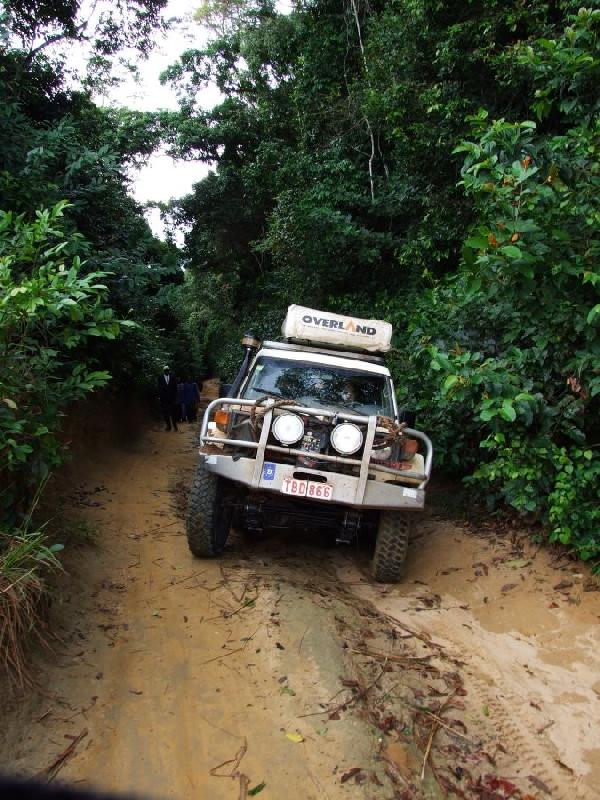
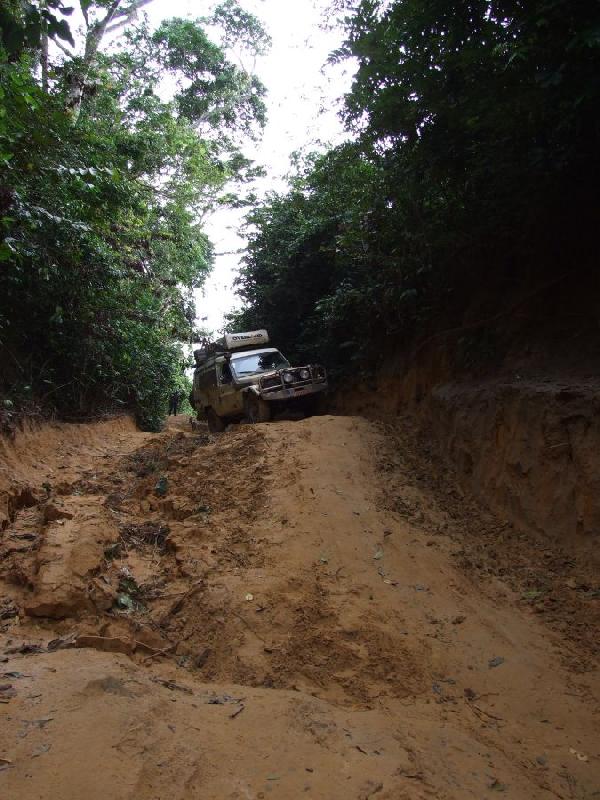
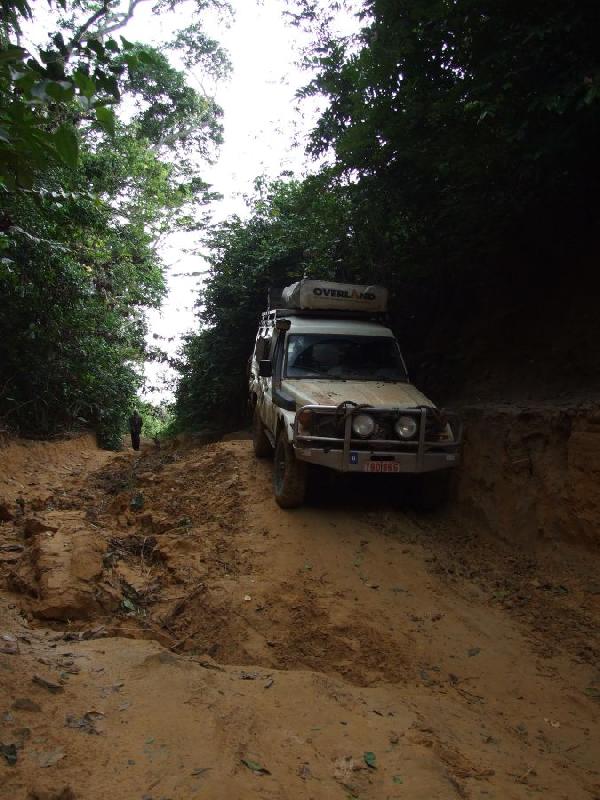
It is only 50 kilometers to Ilebo from here.





We came across a truck that was
parked in the middle of the track. Luckily the surrounding area was
pretty open, so we could pass it.
Us: "Bonjour, ca va?" - "Hi, how are you?"
- Them: "Ca va un peu bien " - "I am doing a little bit ok" -> typical Congelese answer this!
Us: "Votre vehicle est en panne?" - "Did you truck broke down?"
- Them: "Oui, mais ils vient avec des nouveaux pièces" - "Yes, but they are coming with spare parts"
So we chat a bit and we ask what their problem exactly was. They left Ilebo for Kananga with a load of building materials for a rich guy in Kananga. Their engine had completely seized. Their cargo was transferred onto another truck and they had taken the engine out and transported the engine to Kinshasa to get it rebuild. In the meantime the truck 'crew' stayed onsite to safeguard the truck. But they were very happy as they just received news that the necessary parts for the engine were now ordered in Germany, so the parts would come arrive in Kinshasa in a few weeks time!
A fascinating story, and they told it as if the was the most normal thing in the world. Fair enough. We said our goodbyes and asked them one more final question. How long had they been here?
"Un peu plus qu'un an maintenant" - "Just over a year"
Us: "Bonjour, ca va?" - "Hi, how are you?"
- Them: "Ca va un peu bien " - "I am doing a little bit ok" -> typical Congelese answer this!
Us: "Votre vehicle est en panne?" - "Did you truck broke down?"
- Them: "Oui, mais ils vient avec des nouveaux pièces" - "Yes, but they are coming with spare parts"
So we chat a bit and we ask what their problem exactly was. They left Ilebo for Kananga with a load of building materials for a rich guy in Kananga. Their engine had completely seized. Their cargo was transferred onto another truck and they had taken the engine out and transported the engine to Kinshasa to get it rebuild. In the meantime the truck 'crew' stayed onsite to safeguard the truck. But they were very happy as they just received news that the necessary parts for the engine were now ordered in Germany, so the parts would come arrive in Kinshasa in a few weeks time!
A fascinating story, and they told it as if the was the most normal thing in the world. Fair enough. We said our goodbyes and asked them one more final question. How long had they been here?
"Un peu plus qu'un an maintenant" - "Just over a year"
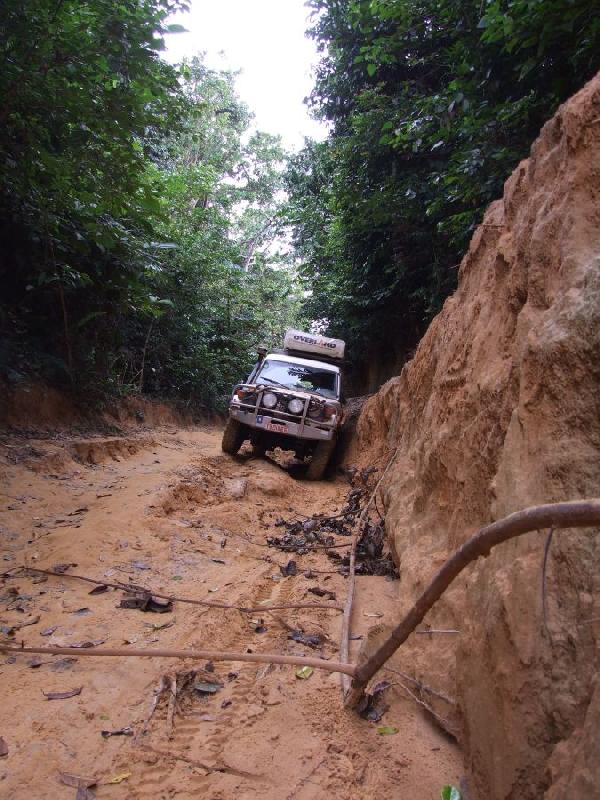
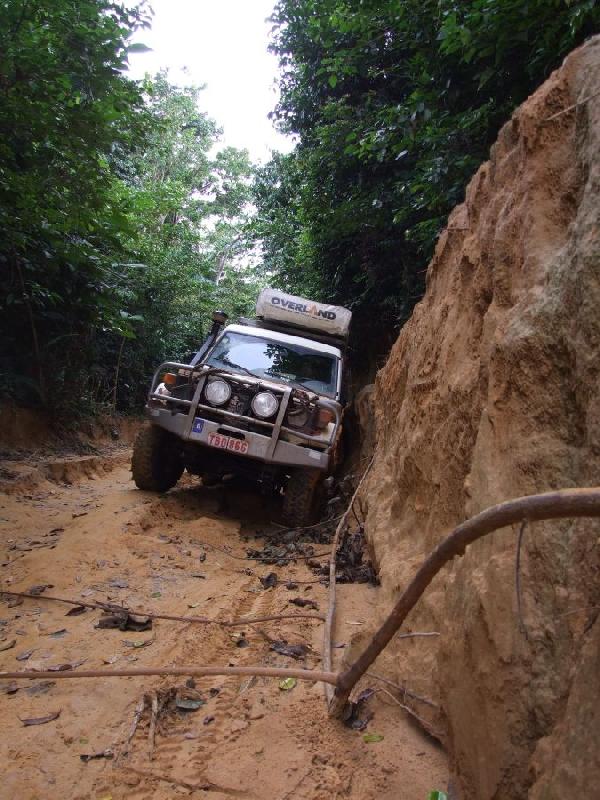
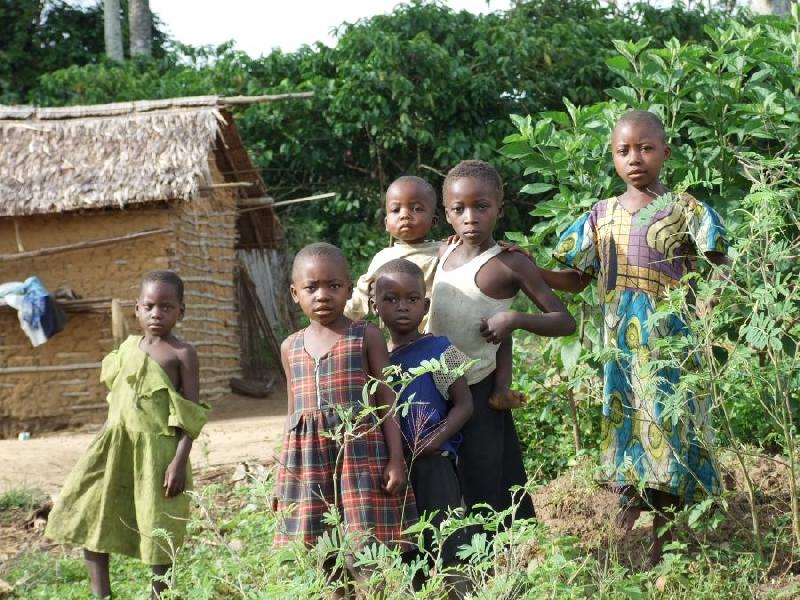
The following pictures were from within the car when we just tipped over. As it happened again we were just sitting still for a minute before getting into action again. The kids would curiously came and see why this car was on its side, and why the passengers wouldn't come out.
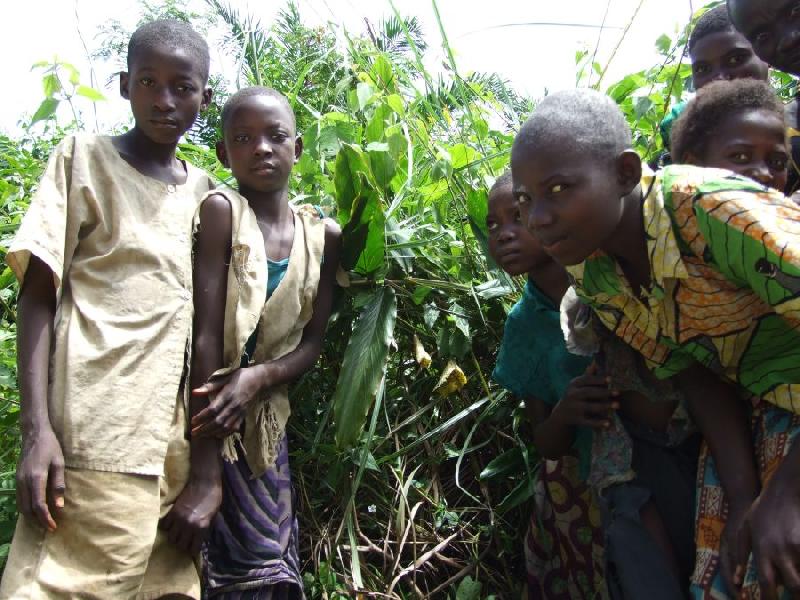
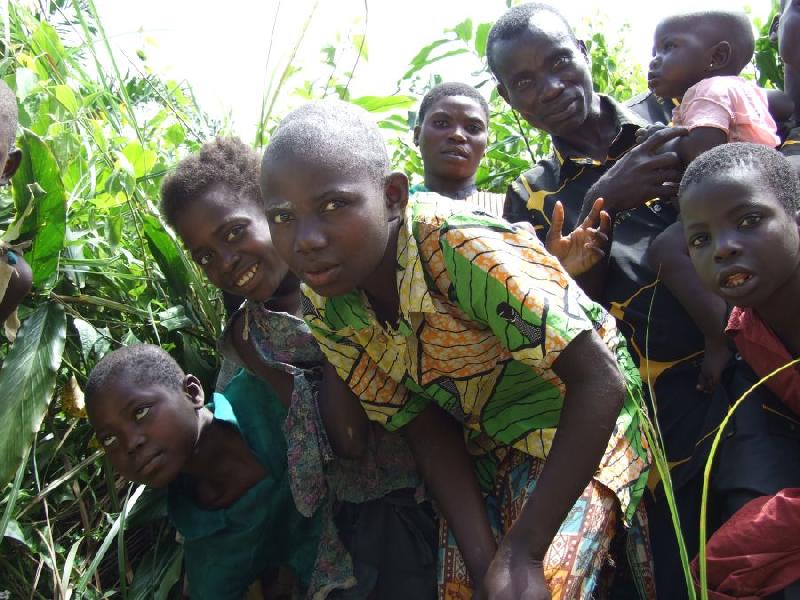
And then they would ask for money.
The
rest of the day we spent mostly underground... and quite a lot of time
was spent on our sides. Got stuck a few times and our spade saw some
hours of work today.
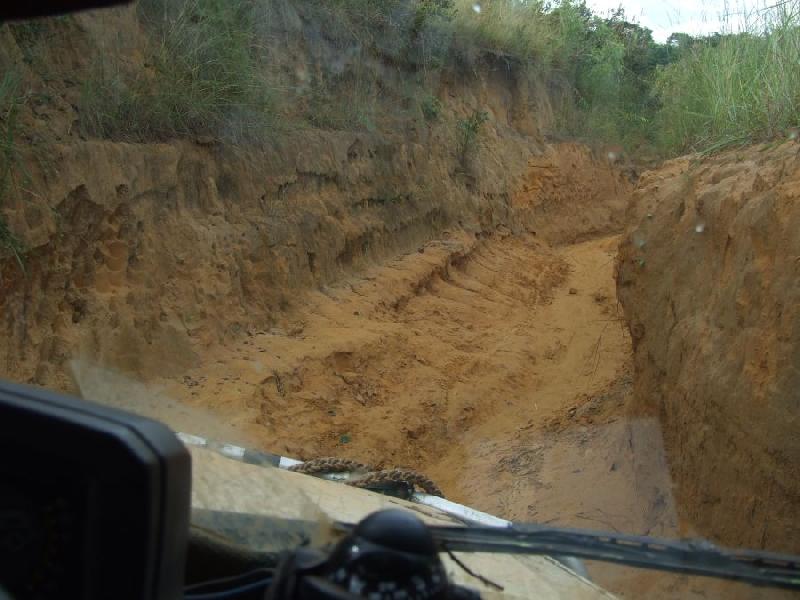
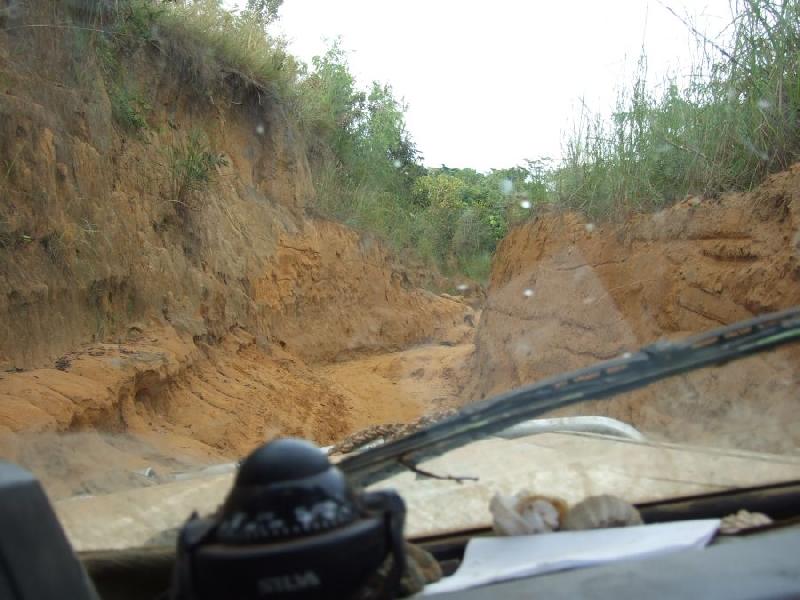
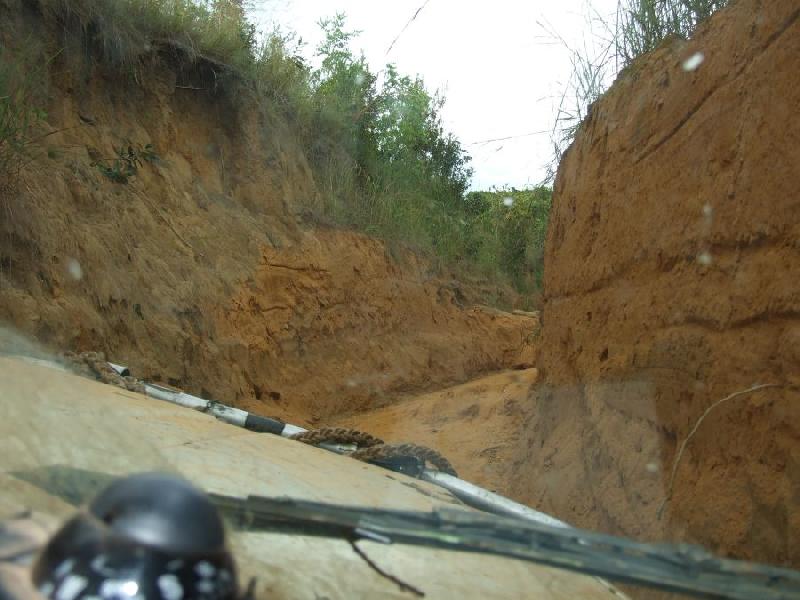
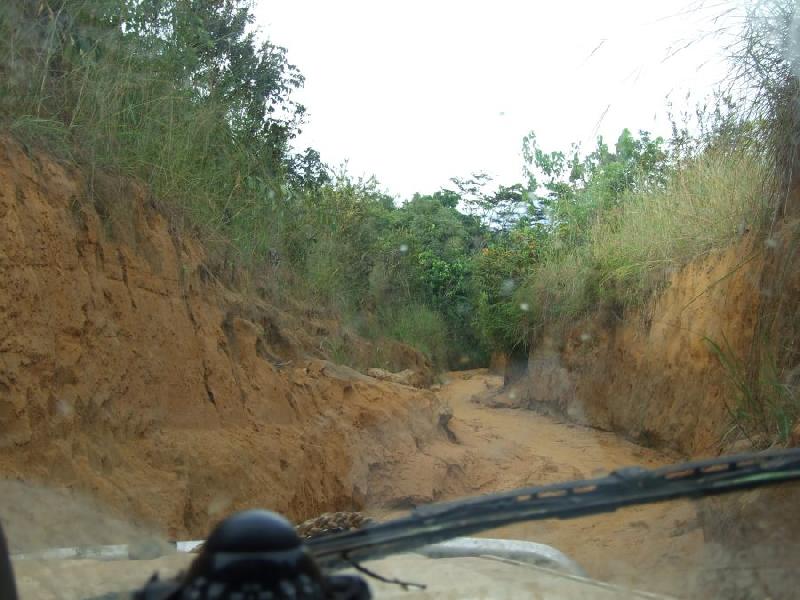
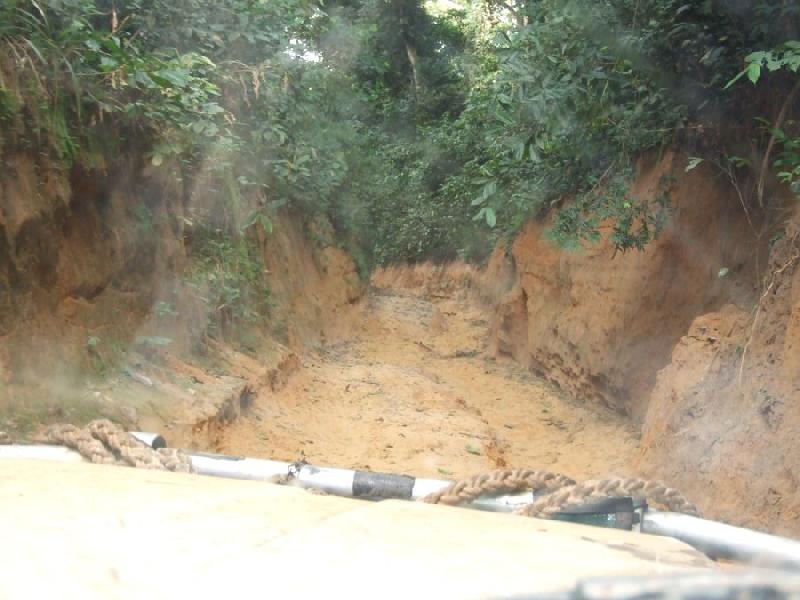
We were too exhausted to be happy that we could finally see Ilebo in the distance. We knew nothing about the city. We would have to arrange a ferry here to get across the Kasai river. Or worst case, arrange a barge to Kinshasa.





We were too exhausted to be happy that we could finally see Ilebo in the distance. We knew nothing about the city. We would have to arrange a ferry here to get across the Kasai river. Or worst case, arrange a barge to Kinshasa.
Hi uk4x4, if you don't
mind, I am going to wait with my answer to that question until later in
the report. You'll understand when we get there ;-)
Our
exhaust broke of just at the exhaust manifold. Probably due to to all
the flexing on these roads. All hopes of arriving somewhere without
getting noticed were out of the door with that.
Quite to our surprise there was no checkpoint at the entrance of Ilebo. But actually that is not too strange, as nobody ever takes that road. Ilebo has a bustling harbour city feel about it. Lots of activity on the streets. We got a lot of stares, but people seemed friendly.
We headed straight for the catholic mission and were greeted by Abbé Omer. The mission was the former headquarters of Belgian sisters (Josephites?). They had fled a the country a few times, and after the last war they did not return. The building was given to the Catholic mission. It looked like a nice building, but the decay had started.
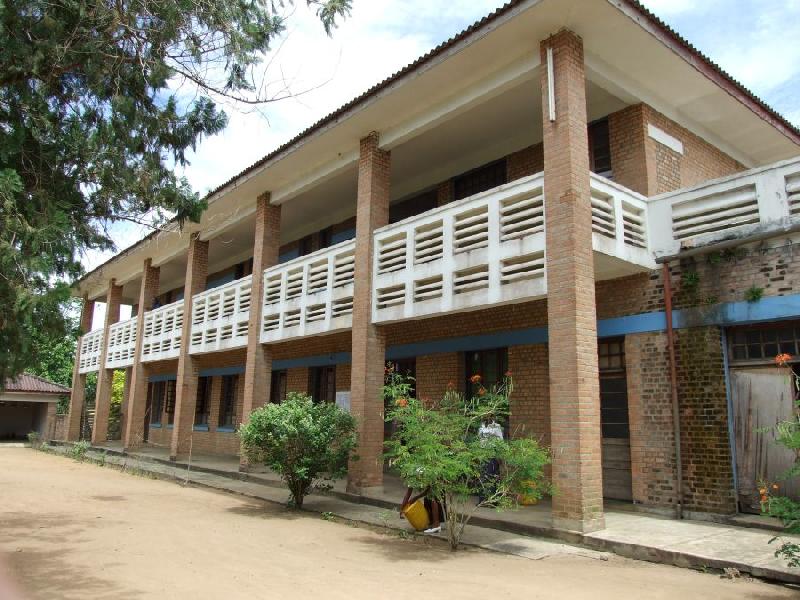
We discussed our plans with Abbé Omer in the garden of the mission (it must have been a wonderfull garden back in the days.. now it looked a bit rundown). The good news was that there was good ferry here that could take us across the mighty Kasai river. The bad news was that nobody every uses that ferry and it does not see any regular action.
Omer knew the guy who was responsible for the Ferry, a chap called Barthélémy. He even has his phone number, but he does not have credit on his phone. No problem, he can use ours. A conversation in Lingala starts, it takes about ten minutes until we run out of credit on our phone. I actually think they talked 1 minute about the ferry and the other 9 minutes about other things, but anyway. Here was the deal:
- Price for a two-way trip is 50$US
But,
- we have to supply our own diesel the engine of the boat. 150 liters is required (!). that's about 200$US (Diesel here is cheaper because they have a regular supply via boats from Kinshasa).
- we have to supply two batteries to start the engines of the boat
- the ferry is on the other side of the river and they would only be able to get it across somewhere next week
That's just great!
We immediatelly uttered to Omer that that was a ridiculously high price, one we would never pay. And that we wanted to cross as soon as possible. preferably tomorrow.
What followed was a very difficult negotiation. Abbé Omer insisted that he acted as an intermediate person. According to him to protect us from getting ripped off (because we were white). I was actually convinced that he was playing a game with his mate Barthélémy to make some money out of us. It took us many hours on the phone to finally convince this Barthélémy to come to see us to discuss the price. He would come at 8 the next morning.
Later that evening Omer suggested that we he would have to inform the police of our presence (c'est normal!), it took us a lot of persuading for him not to 'give us in'.
So there we were, staying in a courtyard of the mission.. with a gate that was so badly bend that it would no longer close. Hosted by an Abbé whom I did not trust (Josephine had a better feeling about him... she is usually right about those things). Waiting for a guy who wanted 250$US to ferry us across a river.
Did you know that, by law, all state operated ferries in the Congo are free? Yeah right
Quite to our surprise there was no checkpoint at the entrance of Ilebo. But actually that is not too strange, as nobody ever takes that road. Ilebo has a bustling harbour city feel about it. Lots of activity on the streets. We got a lot of stares, but people seemed friendly.
We headed straight for the catholic mission and were greeted by Abbé Omer. The mission was the former headquarters of Belgian sisters (Josephites?). They had fled a the country a few times, and after the last war they did not return. The building was given to the Catholic mission. It looked like a nice building, but the decay had started.

We discussed our plans with Abbé Omer in the garden of the mission (it must have been a wonderfull garden back in the days.. now it looked a bit rundown). The good news was that there was good ferry here that could take us across the mighty Kasai river. The bad news was that nobody every uses that ferry and it does not see any regular action.
Omer knew the guy who was responsible for the Ferry, a chap called Barthélémy. He even has his phone number, but he does not have credit on his phone. No problem, he can use ours. A conversation in Lingala starts, it takes about ten minutes until we run out of credit on our phone. I actually think they talked 1 minute about the ferry and the other 9 minutes about other things, but anyway. Here was the deal:
- Price for a two-way trip is 50$US
But,
- we have to supply our own diesel the engine of the boat. 150 liters is required (!). that's about 200$US (Diesel here is cheaper because they have a regular supply via boats from Kinshasa).
- we have to supply two batteries to start the engines of the boat
- the ferry is on the other side of the river and they would only be able to get it across somewhere next week
That's just great!
We immediatelly uttered to Omer that that was a ridiculously high price, one we would never pay. And that we wanted to cross as soon as possible. preferably tomorrow.
What followed was a very difficult negotiation. Abbé Omer insisted that he acted as an intermediate person. According to him to protect us from getting ripped off (because we were white). I was actually convinced that he was playing a game with his mate Barthélémy to make some money out of us. It took us many hours on the phone to finally convince this Barthélémy to come to see us to discuss the price. He would come at 8 the next morning.
Later that evening Omer suggested that we he would have to inform the police of our presence (c'est normal!), it took us a lot of persuading for him not to 'give us in'.
So there we were, staying in a courtyard of the mission.. with a gate that was so badly bend that it would no longer close. Hosted by an Abbé whom I did not trust (Josephine had a better feeling about him... she is usually right about those things). Waiting for a guy who wanted 250$US to ferry us across a river.
Did you know that, by law, all state operated ferries in the Congo are free? Yeah right
Progress after day 17. Ilebo
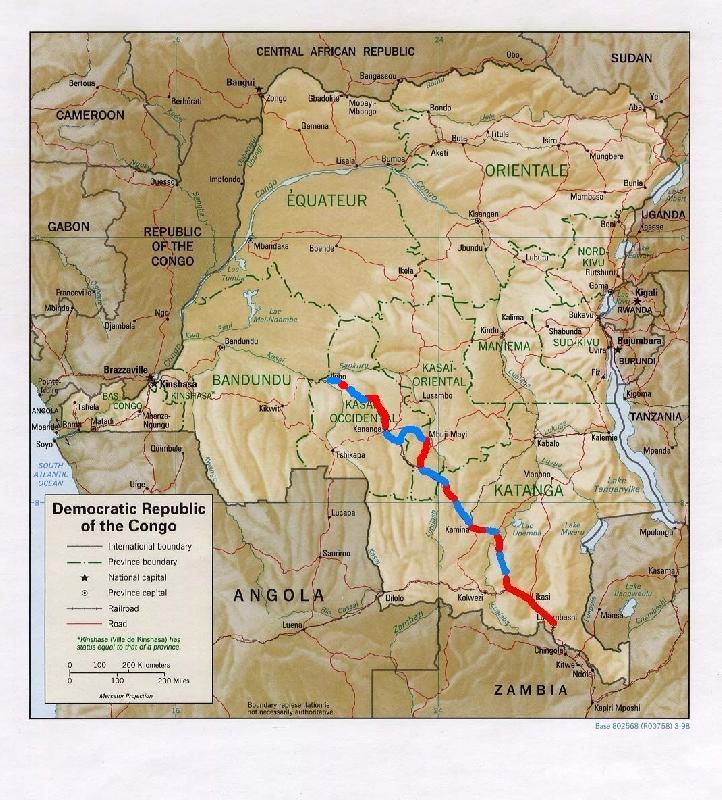

Day 18
We got up at 7 - sleeping late! - so we would be ready to meet Barthélémy at 8. We felt so stupid, we should have known better. How lang had we been travelling trough Africa now?
He showed up at 11:30.
He had a bunch of official documents with him. Documents that actually looked legit. It described the running costs of the ferry (dated recently 2004 I think). And indeed, 75liters was stated as the amount of fuel required for a one-way trip. They would have to charge us a two-way trip as the boat was currently on the other side of the river, and they had to get it across first. Ofcourse there are no other passengers. There was not a lot of room for discussion there. The 50$US fee on the other hand was not legitimate at all, he knew it, we knew it. But as these guys rarely get paid by the goverment it is generally accepted that they ask for a fee. We got it down to a reasonable 25$US(still too much). This would pay for the entire boat crew and they would 'rent' 2 batteries for us.
We would buy a barrel of diesel (cheaper then per liter) and have it delivered to the port directly.
We had a very long discussion about the payment, he wanted everything in advance as he had to pay for the diesel. We did not want to give a total stranger in Congo 225$US, without a contract (not that it would be worth anything), without having seen the boat, ... . He eventually agreed with a 100$US downpayment. We hoped we could trust this guy!
He would cross the Kasai river tomorrow in a dug-out canoe with the boat crew to go and get the ferry. 'Somewhere in the afternoon' we would then be able to cross.
I did not trust Abbé Omer. I did not trust this Barthélémy. I did not trust our deal. But we did not have a choice..
We got up at 7 - sleeping late! - so we would be ready to meet Barthélémy at 8. We felt so stupid, we should have known better. How lang had we been travelling trough Africa now?
He showed up at 11:30.
He had a bunch of official documents with him. Documents that actually looked legit. It described the running costs of the ferry (dated recently 2004 I think). And indeed, 75liters was stated as the amount of fuel required for a one-way trip. They would have to charge us a two-way trip as the boat was currently on the other side of the river, and they had to get it across first. Ofcourse there are no other passengers. There was not a lot of room for discussion there. The 50$US fee on the other hand was not legitimate at all, he knew it, we knew it. But as these guys rarely get paid by the goverment it is generally accepted that they ask for a fee. We got it down to a reasonable 25$US(still too much). This would pay for the entire boat crew and they would 'rent' 2 batteries for us.
We would buy a barrel of diesel (cheaper then per liter) and have it delivered to the port directly.
We had a very long discussion about the payment, he wanted everything in advance as he had to pay for the diesel. We did not want to give a total stranger in Congo 225$US, without a contract (not that it would be worth anything), without having seen the boat, ... . He eventually agreed with a 100$US downpayment. We hoped we could trust this guy!
He would cross the Kasai river tomorrow in a dug-out canoe with the boat crew to go and get the ferry. 'Somewhere in the afternoon' we would then be able to cross.
I did not trust Abbé Omer. I did not trust this Barthélémy. I did not trust our deal. But we did not have a choice..
The
mission had very nice rooms on the top floor. Every room used to belong
to a sister. With a living area, a seperate bedroom and a private
bathroom. With bathtub and everything. The bathtub looked a bit green
and the toilet no longer had a seat (who is this guy who keeps stealing
all the toilet seats in Africa?). We could use one of the rooms to wash
ourselves, but we would camp in our tent.
For a minute we thought they had running water, but they hadn't. There is a running water system in Ilebo, but there are no meters. Instead, people are charged depending on how large their building is. The usual corruption is probably included too. The mission had a staff of 3 but lived in a huge house, so apparantely their water bill was huge. They had thus cancelled the service. According to Omer almost nobody makes use of the water network any longer.
Instead people operate 'commercial' taps on the street. You can go there with a jerry can, they fill it up and you pay per liter. In a way it is rewarding as you first have to work a sweat before one can take a shower.
There was another guest in the mission. A father who was asked/sponsered by the UN to travel around and educate people about corruption and long-term planning. He held a talk in the small chapel in the mission, we sat just outside the chapel so we could overhear everything he said. It was very interesting. He talked about corruption, and how it would make it impossible for a society to have progress. He also covered the subject of the roads, he would encourage people to keep the roads in a good state in their villages instead of intentionally creating bogholes. He explained that in the short term they would loose 'income', but it would benefit them in the longer term if traffic increased (more and thus cheaper supplies, an actual functional economy).
It was very refreshing to hear this and we really hoped his talk would make an impression. When his talk was finished we saw the people leaving the mission. 4 man had attended.
That evening Omer had invited us to join them for dinner. We reluctantly accepted. Eating with 'the locals' is always in interesting experience, but very often it is just very bad food. As to not offend people and also as a precaution for us not to get sick, we tried to avoid these offerings in Congo as much a possible. We could see most people were happy when we declined as they have so little food already.
We were pleasantly surprised, maniok leaves, something that resembled a stew and fufu (= pap for the South Africans, but made out of maniok).
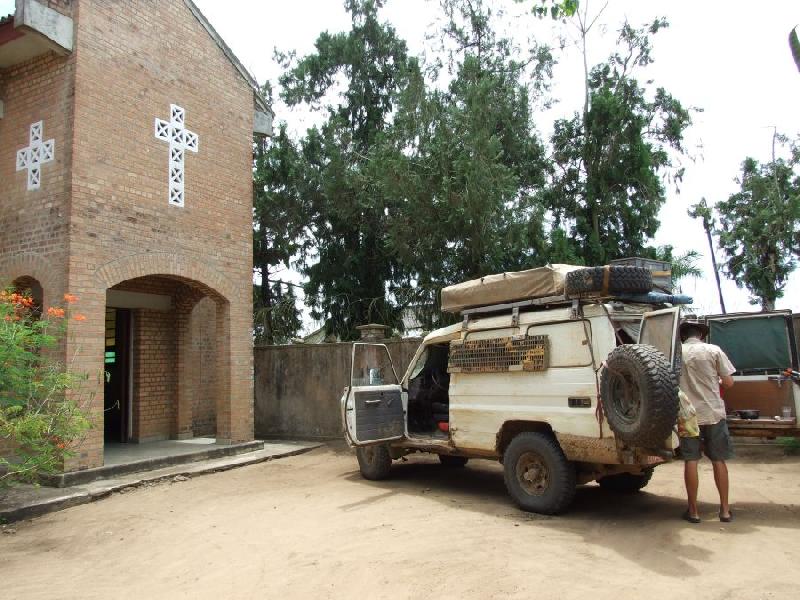
For a minute we thought they had running water, but they hadn't. There is a running water system in Ilebo, but there are no meters. Instead, people are charged depending on how large their building is. The usual corruption is probably included too. The mission had a staff of 3 but lived in a huge house, so apparantely their water bill was huge. They had thus cancelled the service. According to Omer almost nobody makes use of the water network any longer.
Instead people operate 'commercial' taps on the street. You can go there with a jerry can, they fill it up and you pay per liter. In a way it is rewarding as you first have to work a sweat before one can take a shower.
There was another guest in the mission. A father who was asked/sponsered by the UN to travel around and educate people about corruption and long-term planning. He held a talk in the small chapel in the mission, we sat just outside the chapel so we could overhear everything he said. It was very interesting. He talked about corruption, and how it would make it impossible for a society to have progress. He also covered the subject of the roads, he would encourage people to keep the roads in a good state in their villages instead of intentionally creating bogholes. He explained that in the short term they would loose 'income', but it would benefit them in the longer term if traffic increased (more and thus cheaper supplies, an actual functional economy).
It was very refreshing to hear this and we really hoped his talk would make an impression. When his talk was finished we saw the people leaving the mission. 4 man had attended.
That evening Omer had invited us to join them for dinner. We reluctantly accepted. Eating with 'the locals' is always in interesting experience, but very often it is just very bad food. As to not offend people and also as a precaution for us not to get sick, we tried to avoid these offerings in Congo as much a possible. We could see most people were happy when we declined as they have so little food already.
We were pleasantly surprised, maniok leaves, something that resembled a stew and fufu (= pap for the South Africans, but made out of maniok).

This is Josephine's diary. It is
not overly detailed but is great to recollect some 'lost' memories. It
is the base of this trip report.
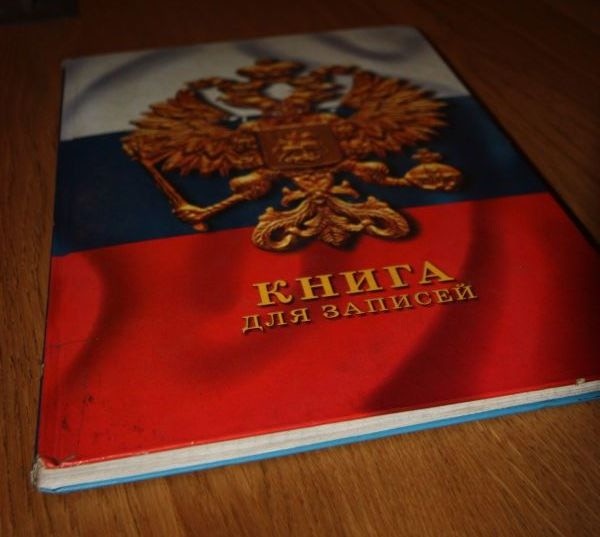
She made this illustration from the road to Ilebo
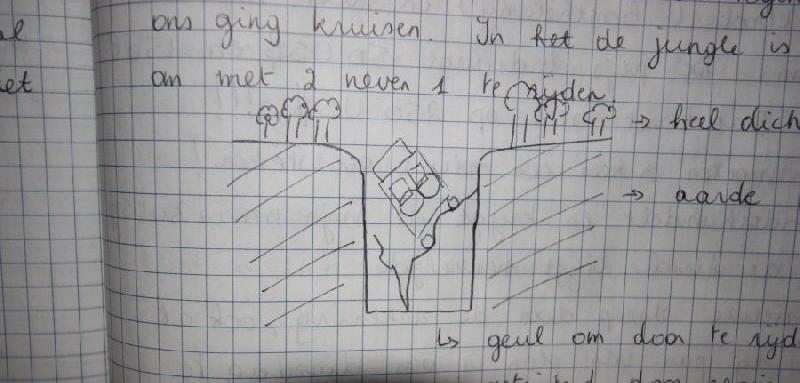

She made this illustration from the road to Ilebo

Day 19
Our car was packed and ready to go... we were waiting for a phone call from Barthélémy. When it finally arrived around noon, Abbé Omer told us he had notified the police that we would be leaving from the port today. We have no idea why he did that, as he knew how much trouble we've had with the police thus far.
Anyway, on his little motorbike he guided us towards the port. Not surprisingly we were stopped by the police who were waiting for us. As our boat was waiting for us, we were not in the mood for a lengthy negotiation. So as soon as they had checked all our papers (our self issued 'permit' was still doing wonders) we played bluff and immediately asked for their names and ranks and claimed we knew their superior officer. This was a risky move and probably a stupid risk to take at the time, but it worked. Somehow we sensed by now how confident the police was and we could play the game along quite well.
We couldn't believe our eyes when we finally saw the ferry.
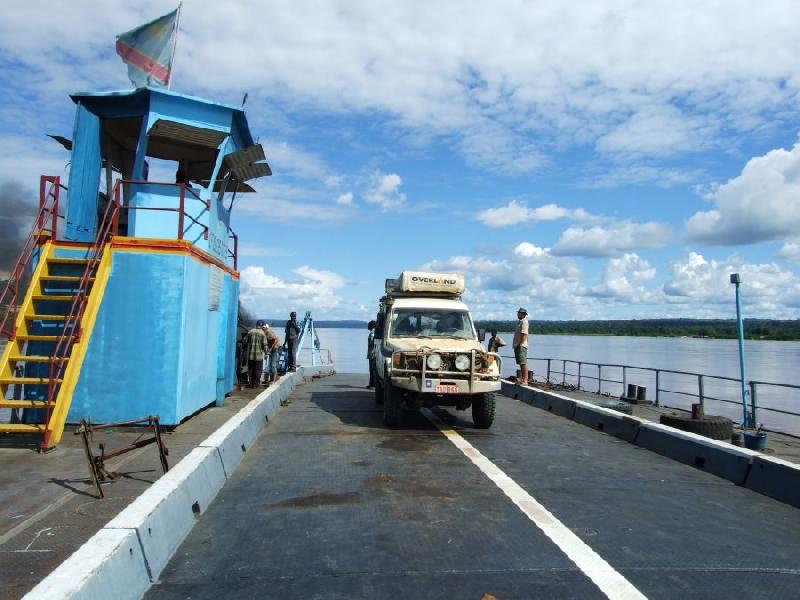
It looked brand new!
It wasn't..
A German (?) NGO had funded the restoration of the ferry recently. It had received a nice fresh coat of paint, but the money to rebuild the engines had gone missing.
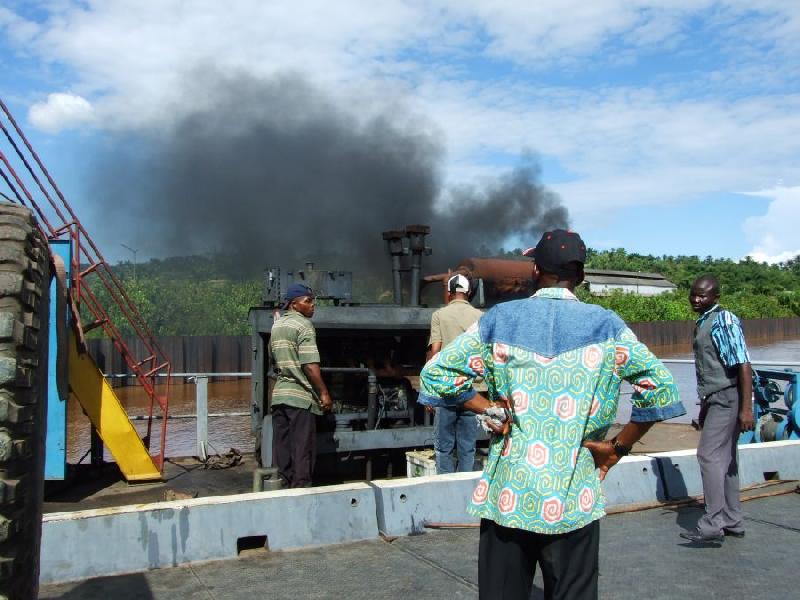
Our car was packed and ready to go... we were waiting for a phone call from Barthélémy. When it finally arrived around noon, Abbé Omer told us he had notified the police that we would be leaving from the port today. We have no idea why he did that, as he knew how much trouble we've had with the police thus far.
Anyway, on his little motorbike he guided us towards the port. Not surprisingly we were stopped by the police who were waiting for us. As our boat was waiting for us, we were not in the mood for a lengthy negotiation. So as soon as they had checked all our papers (our self issued 'permit' was still doing wonders) we played bluff and immediately asked for their names and ranks and claimed we knew their superior officer. This was a risky move and probably a stupid risk to take at the time, but it worked. Somehow we sensed by now how confident the police was and we could play the game along quite well.
We couldn't believe our eyes when we finally saw the ferry.

It looked brand new!
It wasn't..
A German (?) NGO had funded the restoration of the ferry recently. It had received a nice fresh coat of paint, but the money to rebuild the engines had gone missing.

The departure in the port of
Ilebo was hectic (dodgy place!) so we could not really say goodbye to
Abbé Omer. He waved us goodbye from the shore. I did not get along well
with Omer. I cannot explain why. But in retrospect he did help us and my
lack of trust in him was probably a mistake. Shame..
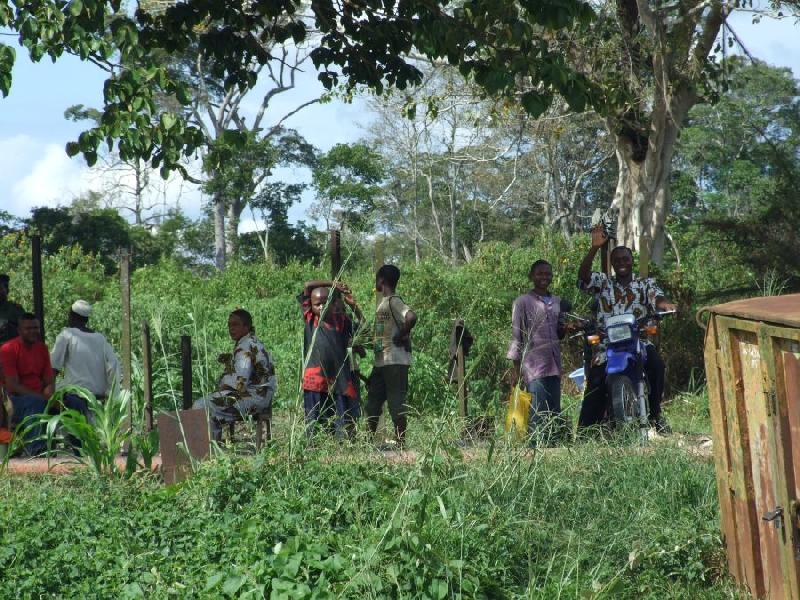
Abbé Omer on the right.
The trip across would take an hour as it was upstream. We felt very much at ease during that hour. We were disconnected from the shore, on a safe distance from everybody that wanted money from us, we did not have to drive. We just had to sit back and enjoy the ride. It was also one of the rare occasions were we got out of the dense forest and could have a look around.
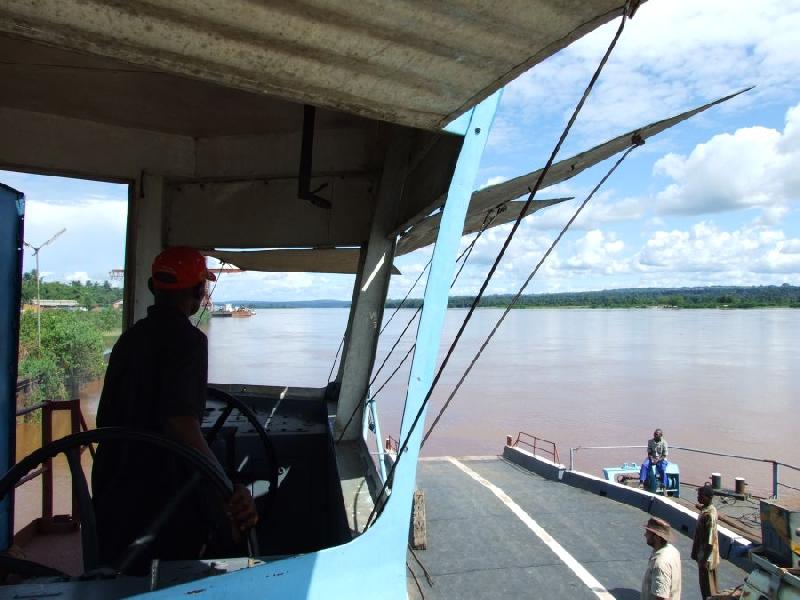
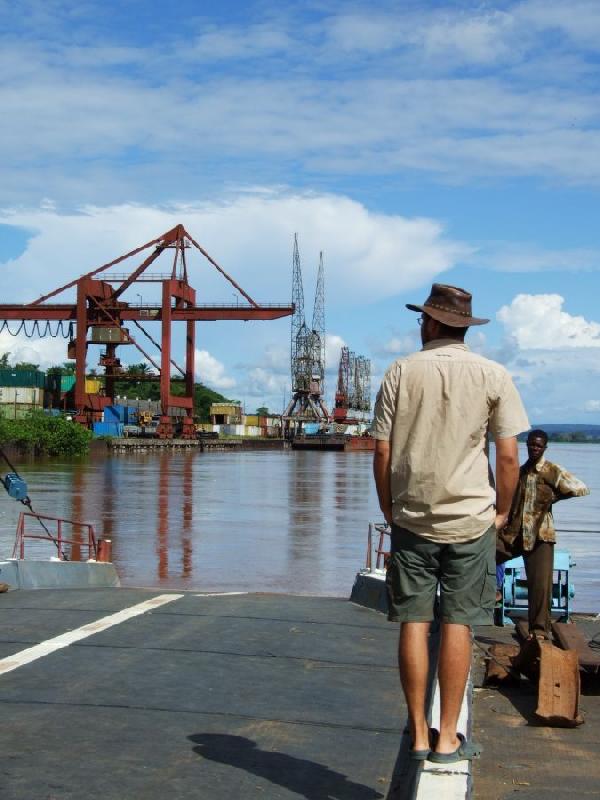
The port of Ilebo
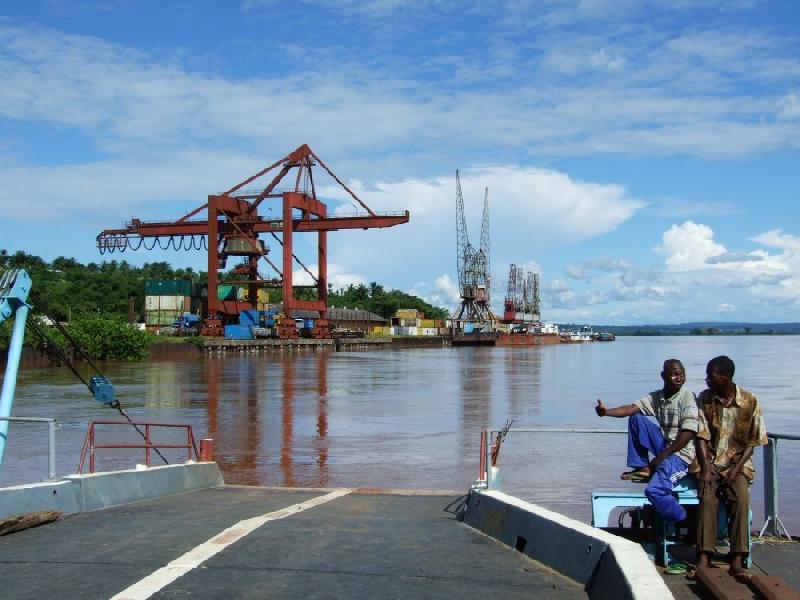
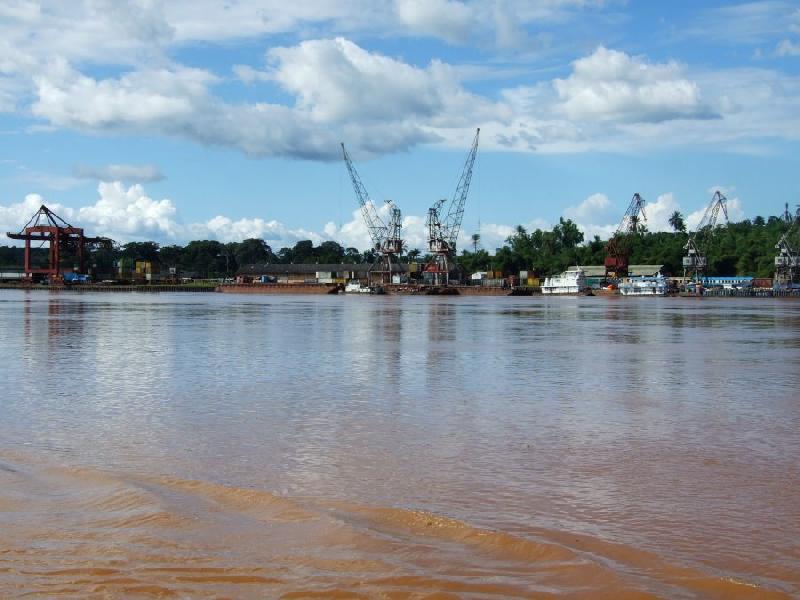
A floating fishing village on the shores of the Kasai:
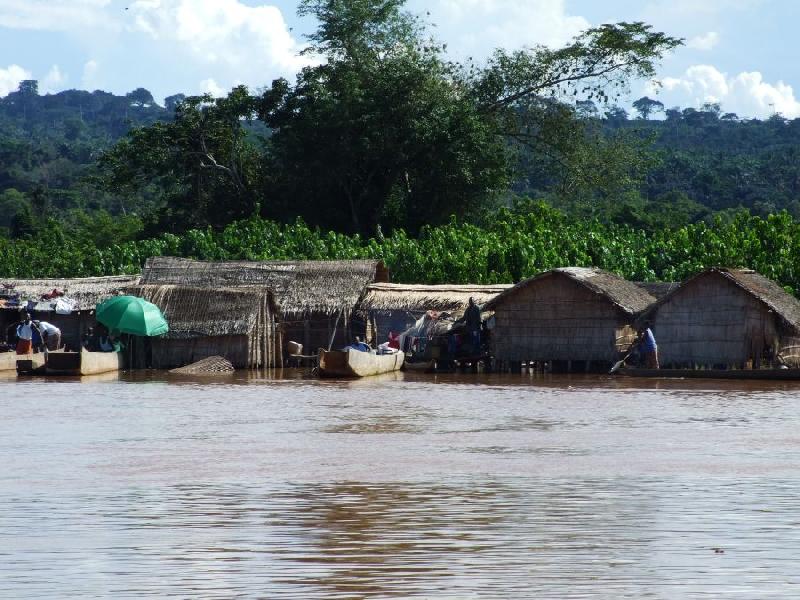

Abbé Omer on the right.
The trip across would take an hour as it was upstream. We felt very much at ease during that hour. We were disconnected from the shore, on a safe distance from everybody that wanted money from us, we did not have to drive. We just had to sit back and enjoy the ride. It was also one of the rare occasions were we got out of the dense forest and could have a look around.


The port of Ilebo


A floating fishing village on the shores of the Kasai:

The boat crew:
Barthélémy
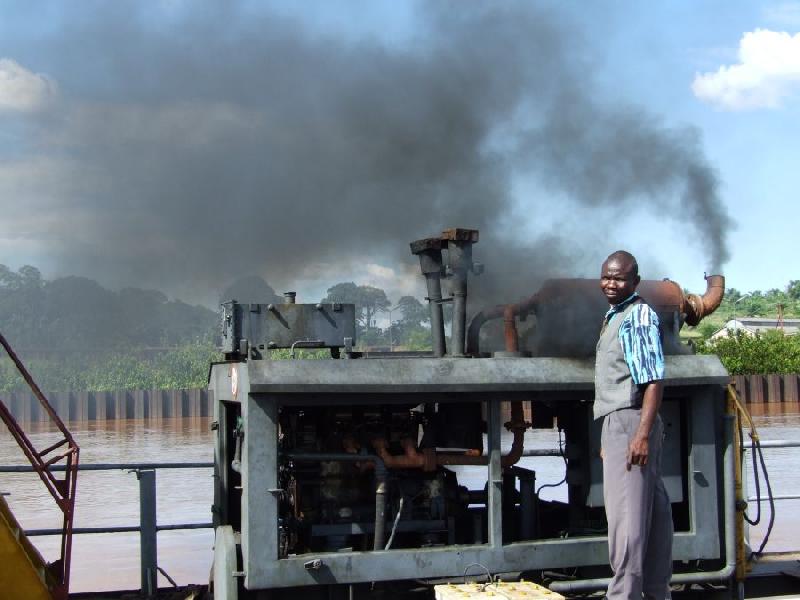
The captain
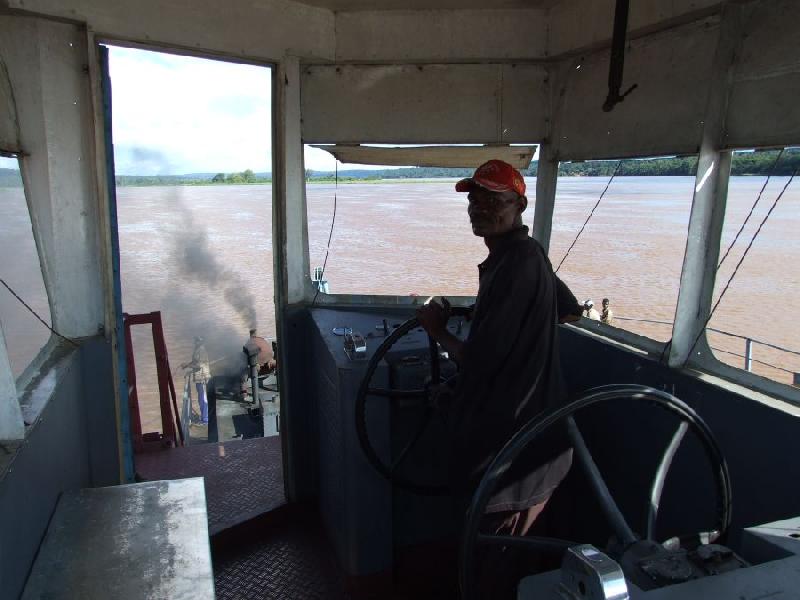
Once out of the port these two guys would use long sticks to feel how the deep the river was.
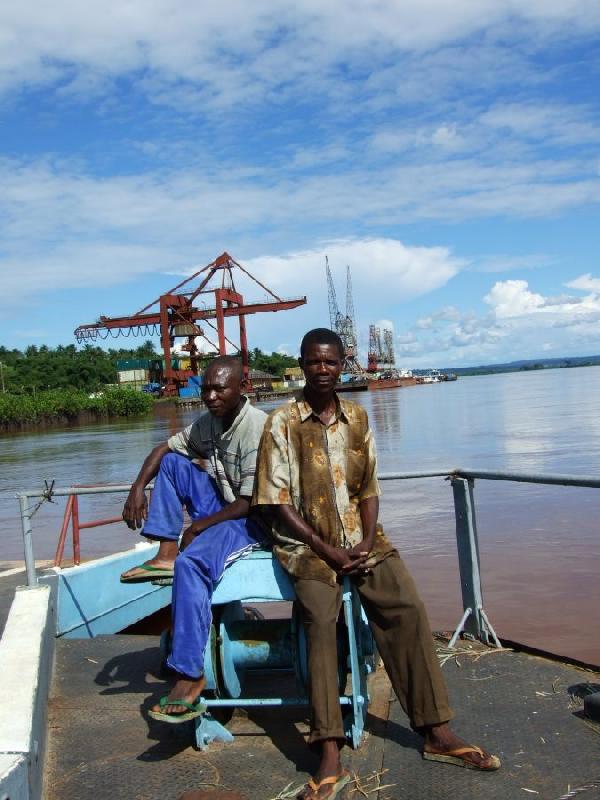
The mechanics
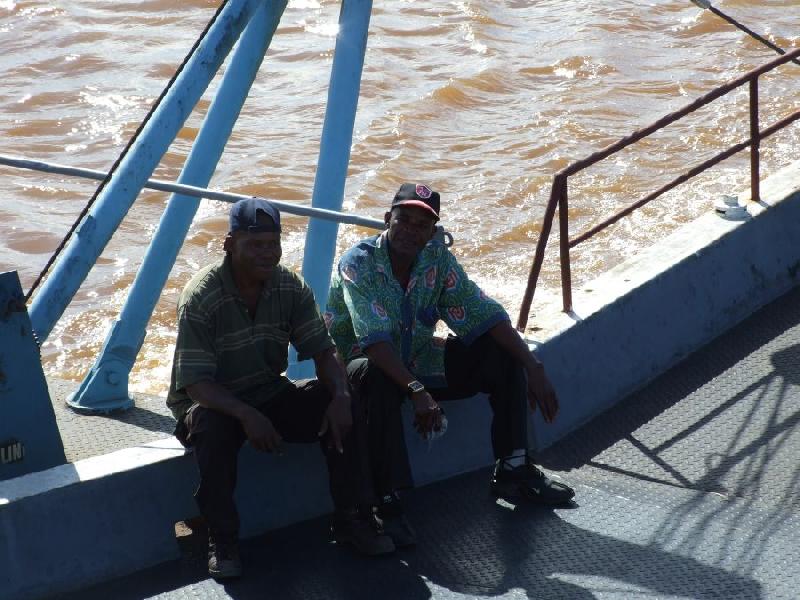
This dugout canoe hitched a ride with us. For a moment I thought of charging them a fee... according to local Congolese tradition. I didn't ;-)
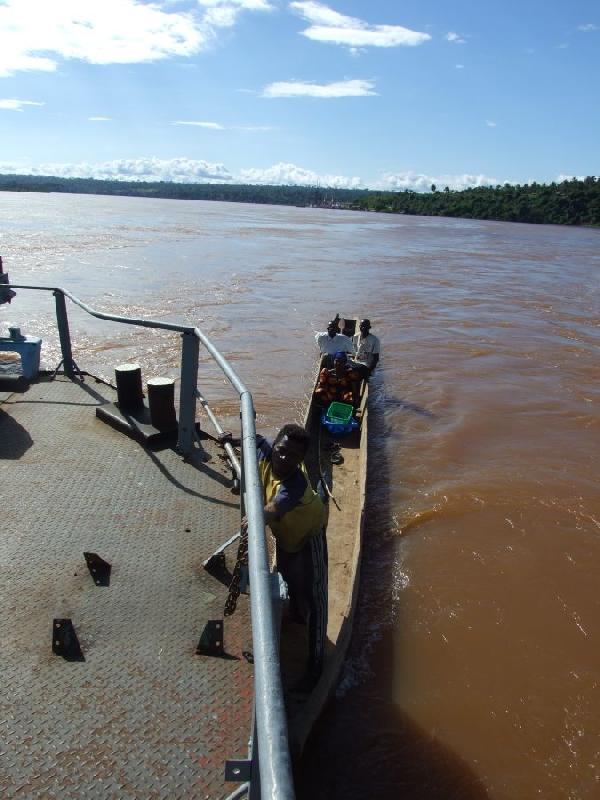
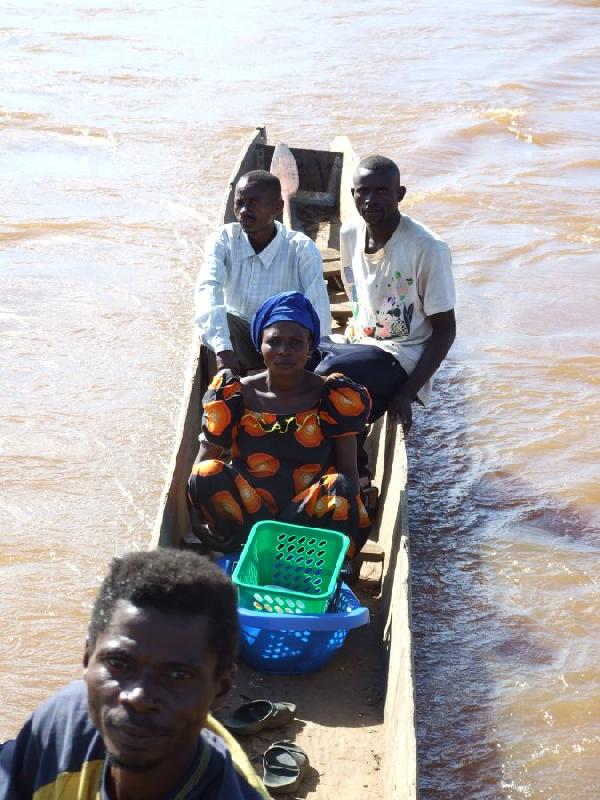
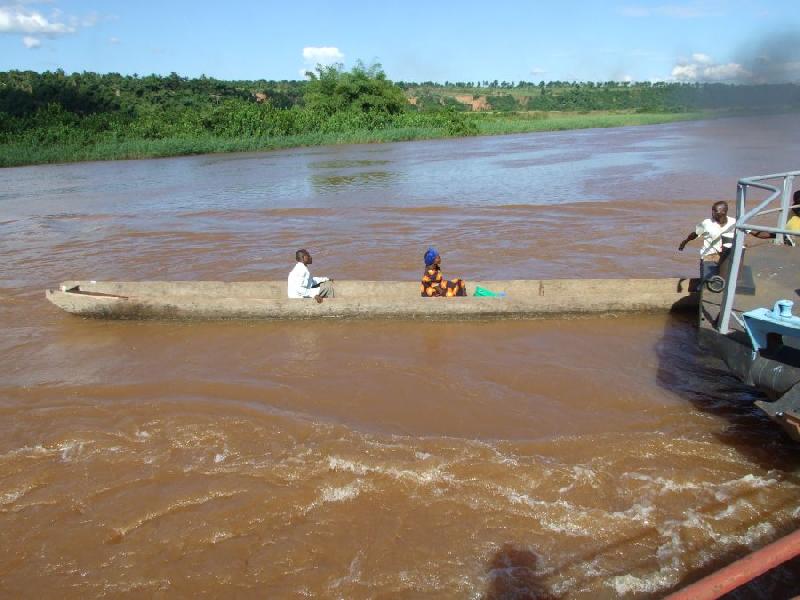
The beautiful, mighty, muddy Kasai river
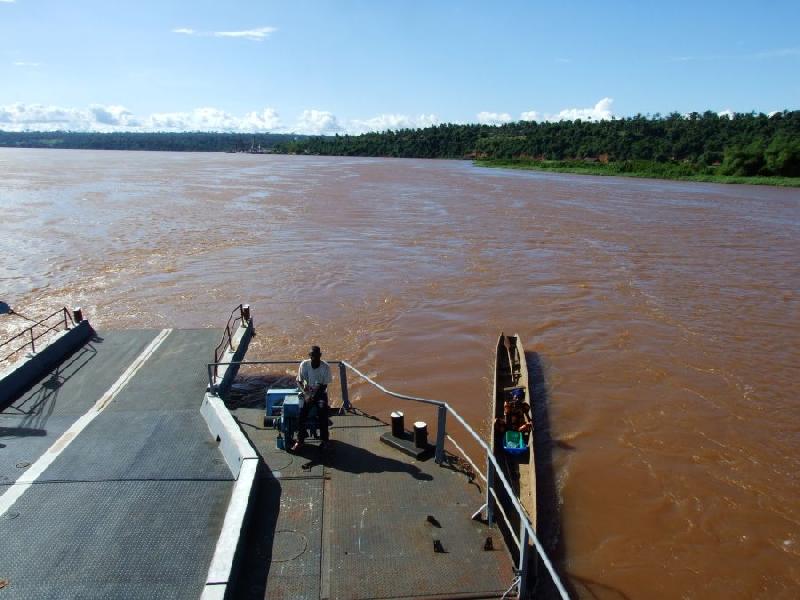
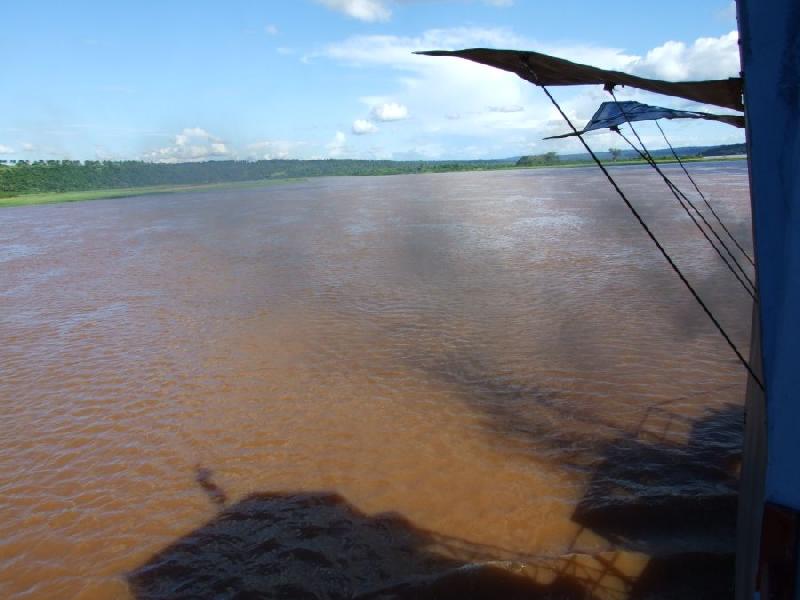
-
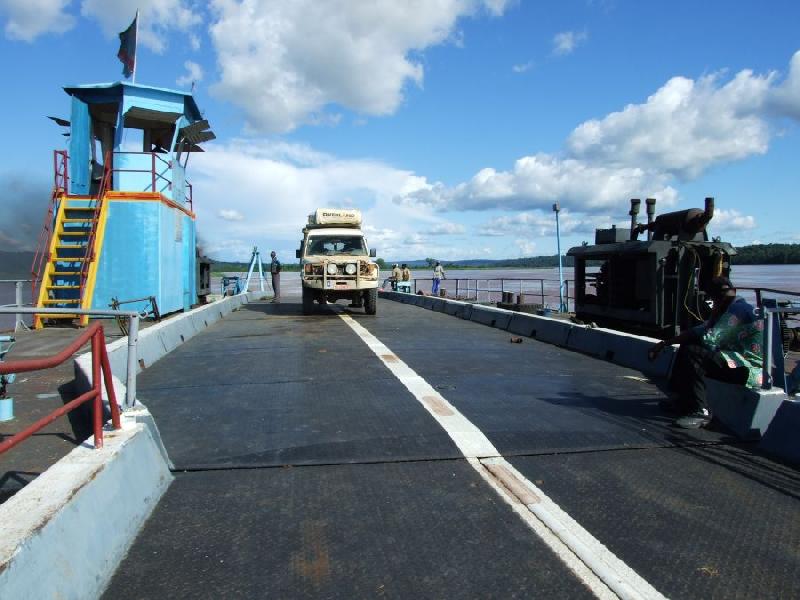
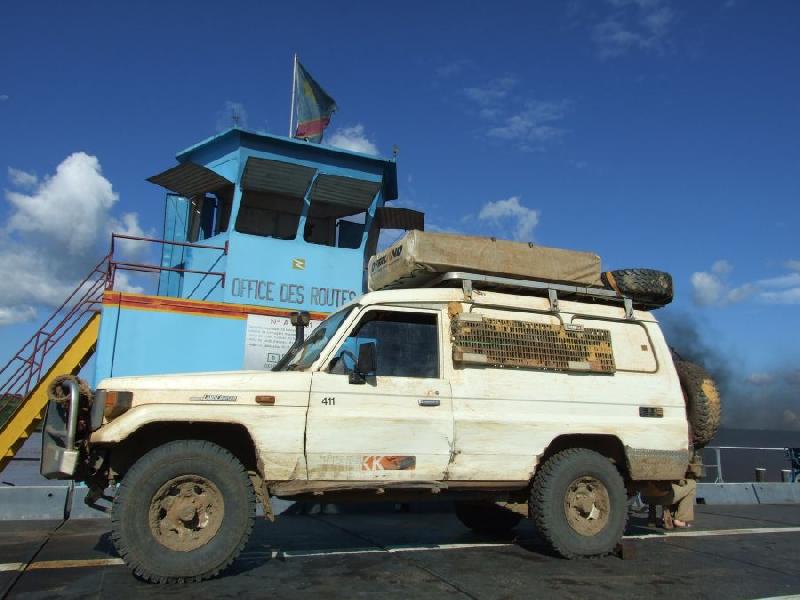
In Ilebo we had asked for the road conditions on the other side of the river. Nobody knew. People here travel by boat, not by road. We were silently hoping that the roads would be perfect on the other side. We couldn't have been more wrong...
Barthélémy gave us a letter for his friend, the captain of the next ferry. It was written in Lingala, but we could make out a few words. The letter was about us but we did not know what it said. Would it be some good words for us? Or would it be some tips on how to extort the maximum amount of money out of us? We did not ask about the condition of the next ferry... It was probably better that we didn't know at the time..
Barthélémy

The captain

Once out of the port these two guys would use long sticks to feel how the deep the river was.

The mechanics

This dugout canoe hitched a ride with us. For a moment I thought of charging them a fee... according to local Congolese tradition. I didn't ;-)



The beautiful, mighty, muddy Kasai river


-


In Ilebo we had asked for the road conditions on the other side of the river. Nobody knew. People here travel by boat, not by road. We were silently hoping that the roads would be perfect on the other side. We couldn't have been more wrong...
Barthélémy gave us a letter for his friend, the captain of the next ferry. It was written in Lingala, but we could make out a few words. The letter was about us but we did not know what it said. Would it be some good words for us? Or would it be some tips on how to extort the maximum amount of money out of us? We did not ask about the condition of the next ferry... It was probably better that we didn't know at the time..
Thanks
for all the great feedback guys. Keep it coming! It's amazing to see
how many people are following us on this little trip!
Stay tuned.. we are not there yet ;-)
Stay tuned.. we are not there yet ;-)
The
'jetty' on the opposite side of the Kasai river used to have a nice
concrete ramp, but it had long disintegrated. To get of the boat we were
litterally dropped on the muddy shore. Scary!
There was a little village here, and our hopes for better roads vanished as soon we left the village.
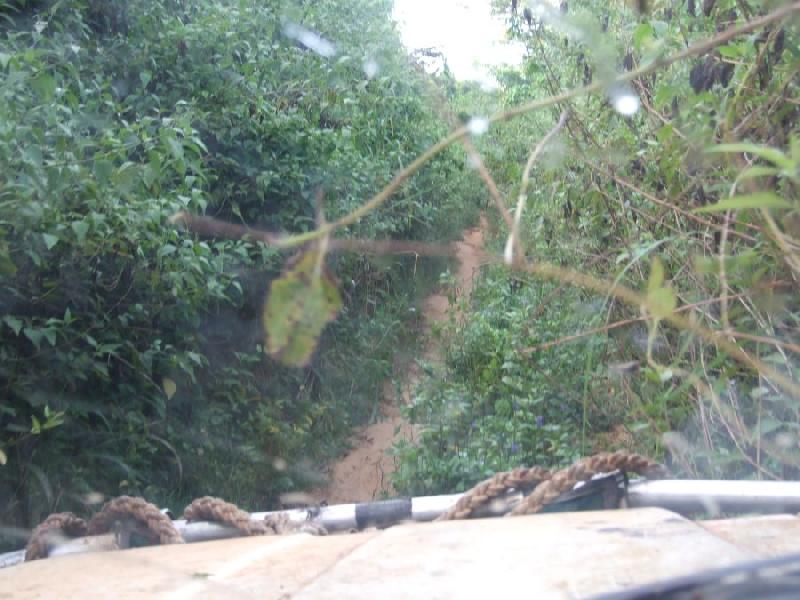
The road was no more then a tight single track. It is barely possible to pass trough here with a bicycle. After having verified that this is indeed the only track leading out of here we had no choice but to drive trough it. Half of the car was cuting trough the bushes. The amount of spiders and other critters that we took along for a ride was staggering. It was impossible to keep the windows open because of the debri that was coming in. It was also impossible to keep the windows closed because it was so hot.
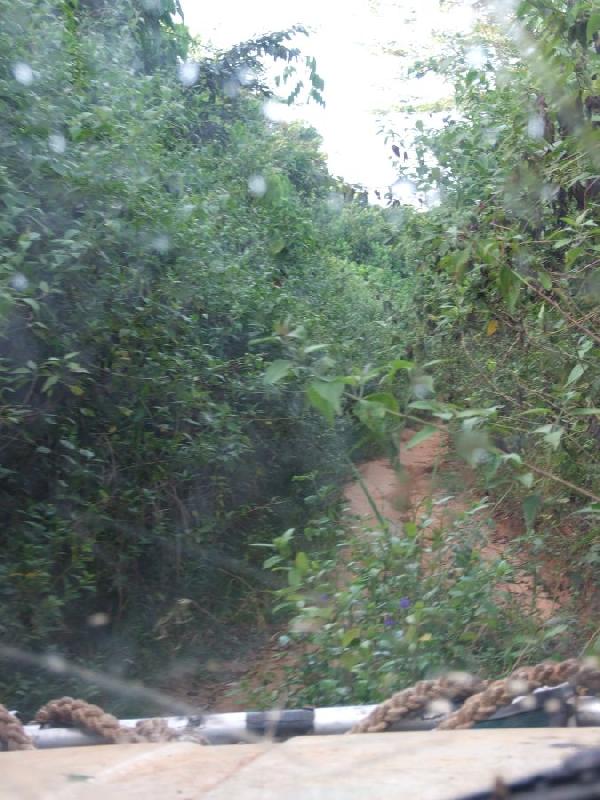
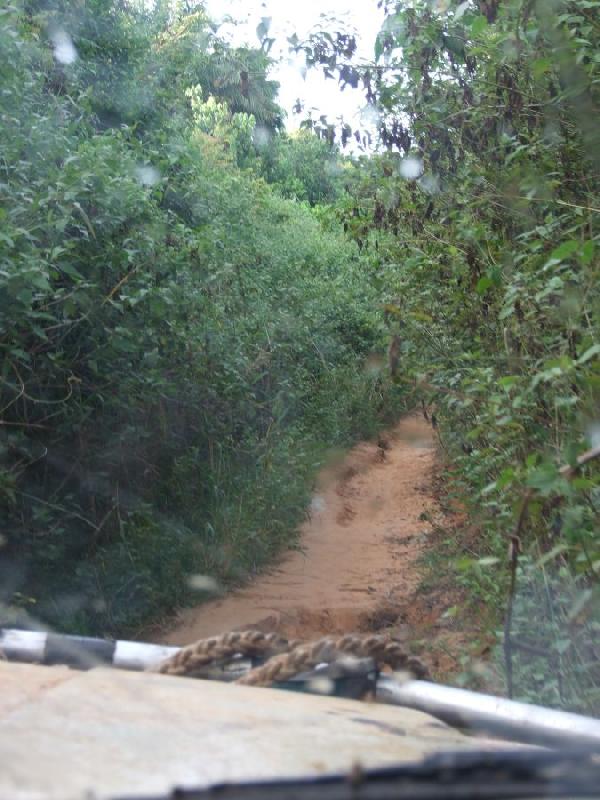
This went on for kilometers on end. Spiders were atually building a web on the inside of our windscreen.
And then we tipped over again.
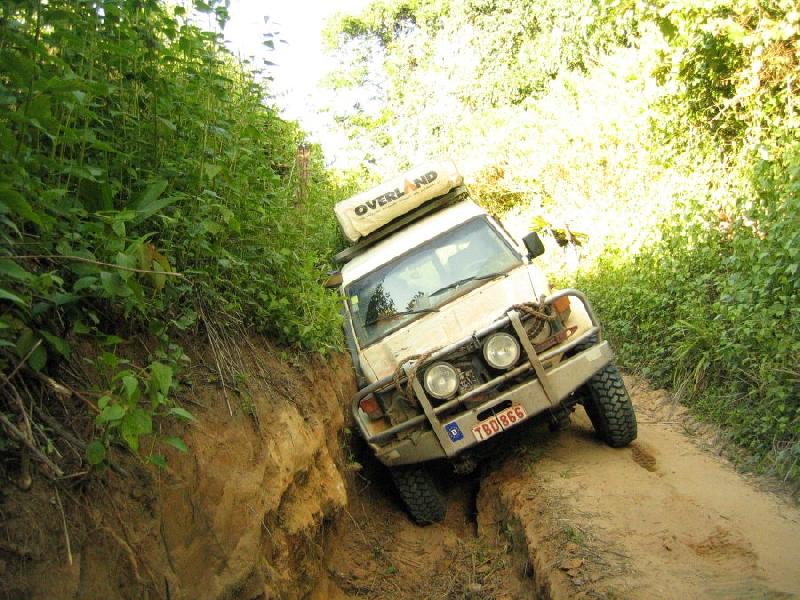
There was a little village here, and our hopes for better roads vanished as soon we left the village.

The road was no more then a tight single track. It is barely possible to pass trough here with a bicycle. After having verified that this is indeed the only track leading out of here we had no choice but to drive trough it. Half of the car was cuting trough the bushes. The amount of spiders and other critters that we took along for a ride was staggering. It was impossible to keep the windows open because of the debri that was coming in. It was also impossible to keep the windows closed because it was so hot.


This went on for kilometers on end. Spiders were atually building a web on the inside of our windscreen.
And then we tipped over again.

I can see your point... but... ;-)
How many situations can one foresee? You could apply the same logic to almost anything. What about medical supplies? We carried quite an extensive kit, but if Josephine got bitten by that snake, what do we do? What about spare parts? What if the gearbox dies? (it did actually, in South Africa). In both case: seek help locally is the answer.
What if your house collapses when you are sitting at your desk? ;-)
That does not mean one should be reckless. And I dare say we are actually pretty prudent. It might not tell from this report, but we avoid unnecessary risks if at all possible. But that risk assessment is a personal thing ofcourse.
Oh, and we do carry a hi-lift, we have used it extensively for our recoveries in Congo (sorry for not making that clear
Oh, and we did crash trough a bridge once. We got out of that one with our hi-lift, sand ladders and a lot of patience and creativity.
And then there is the danger of the human mind. We do not have a winch, so we drive with caution, making sure that werever we get ourselves stuck in, we can get out again.
If I'd have a winch, I know I'd be much quicker in just risking it, knowing that I can winch myself out if it doesn't work. And then the winch stops working...
The fewer of these tools you have, the more you are obliged to think about your next step. And that is not a bad thing! ;-)
That said, a winch is on my shopping list, but it is not a priority.
The
single track trough the forest went on forever. We had 'lost' a lot of
time by taking the ferry and before we knew it got dark. We were still
driving with one wheel on the track and the other in the forest. The
darkness made it quite spooky. In the eroded bits the darkness made it
very difficult to manouver our way trough. The mosquitoes were feasting
on our blood.
We passed a few villages in the forest, but they looked very primitive and wild. Not the most welcoming environment. We decided to push on until the village of Basongo, which looked big on our map.
It wasn't.
There was no mission here, they also did not have a priest, or a father, or .. . But they did have a "Maison de passage". A little hut where people who'd pass trough could sleep. We could camp next to this house.
The crowd was huge and the kids went completely berzerk as soon as we stopped in the village. When driving to the maison de passage a dozen or so kids (and a few adults) jumped on our wheelcarrier at the back. Josephine had to walk behind the car to keep them off.
This would be a zero-privacy night again. It didn't matter much as it was half past 10 already and we just wanted to sleep.
With the crowd around, it seemed as if going for a pee before going to bed was the biggest challenge of the day.
We passed a few villages in the forest, but they looked very primitive and wild. Not the most welcoming environment. We decided to push on until the village of Basongo, which looked big on our map.
It wasn't.
There was no mission here, they also did not have a priest, or a father, or .. . But they did have a "Maison de passage". A little hut where people who'd pass trough could sleep. We could camp next to this house.
The crowd was huge and the kids went completely berzerk as soon as we stopped in the village. When driving to the maison de passage a dozen or so kids (and a few adults) jumped on our wheelcarrier at the back. Josephine had to walk behind the car to keep them off.
This would be a zero-privacy night again. It didn't matter much as it was half past 10 already and we just wanted to sleep.
With the crowd around, it seemed as if going for a pee before going to bed was the biggest challenge of the day.
Progress on day 19. Basongo
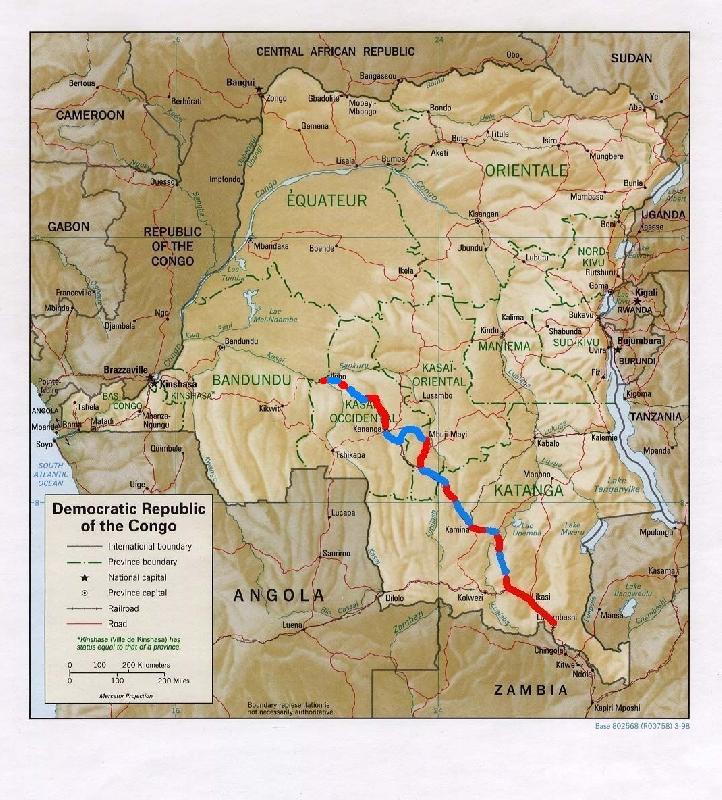

Day 20
Busy villages are not a good place to sleep late. We left Basongo at 5.30.
Eventually the road opened up.
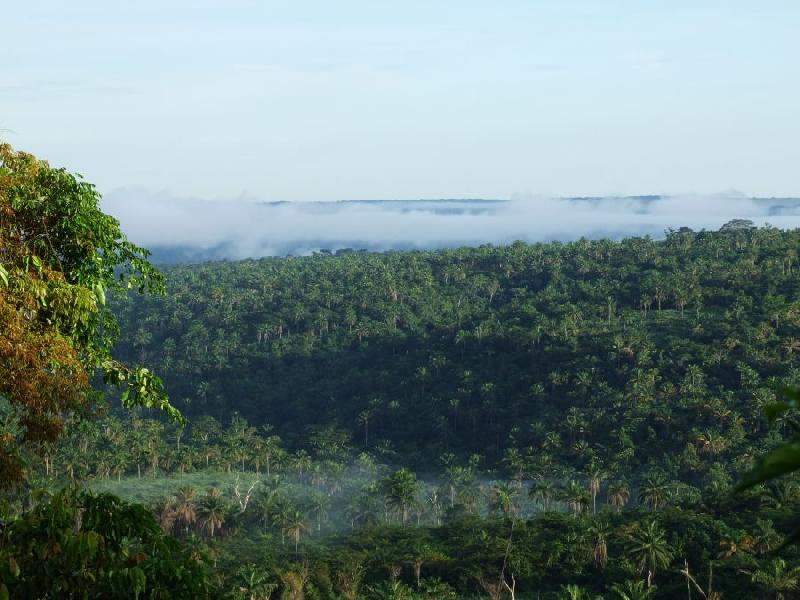
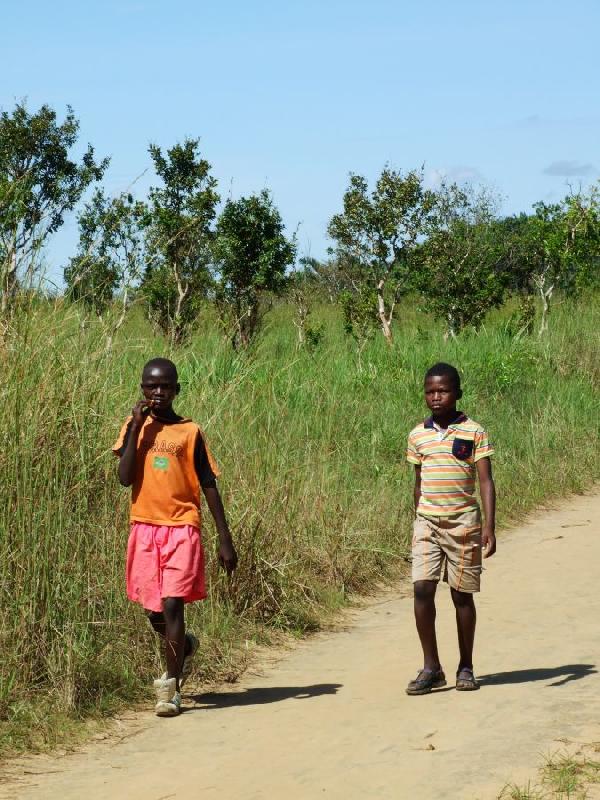
We were on top of a hill, and we had to find ourselves a way trough the valley to the next hill. The deeper we descended into the valley, the worse the erosion got. Troughout the years about 10 parallel roads - a few kilometers apart - had been made down the hill. If the road got too bad, they just created a new tracks. The soil was sandy. We had to drive 10 km's to find the latest track
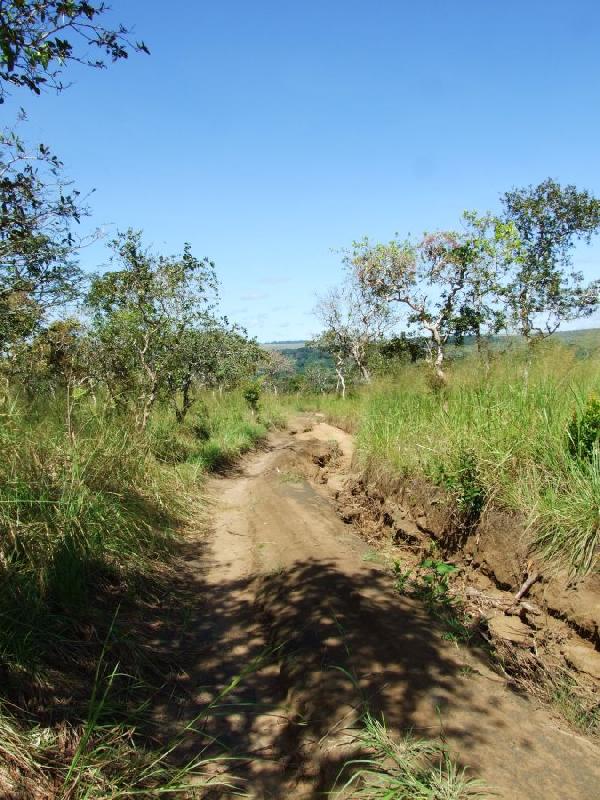
But that track too soon became impossible. We had to create our own track trough the high grass. Josephine would walk in front and I tried not to loose her out of sight.
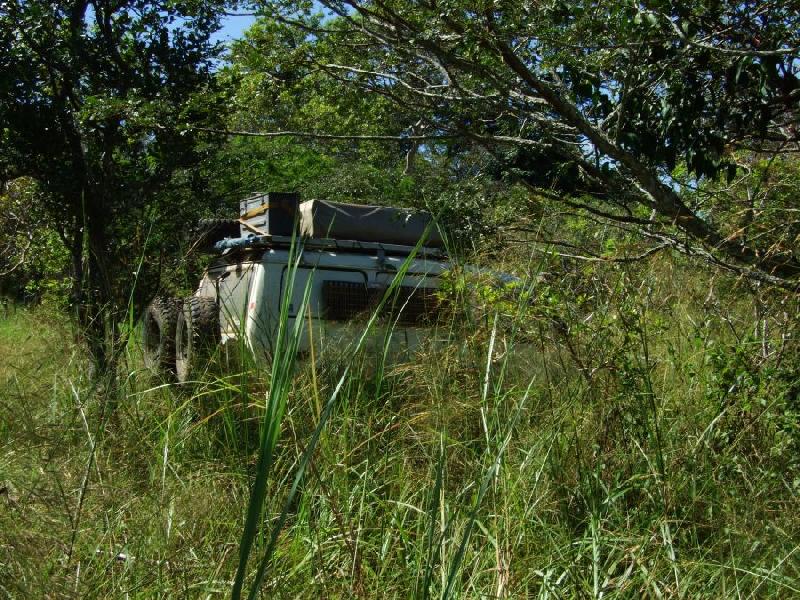
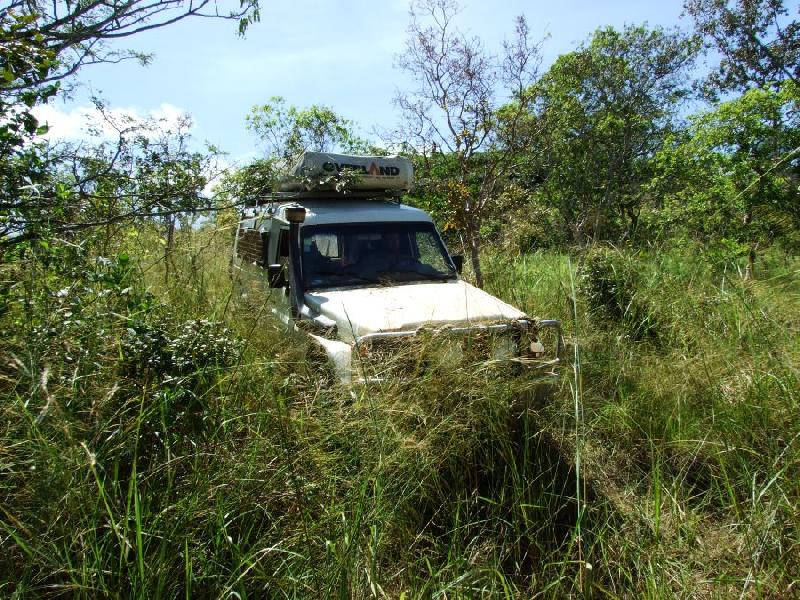
In the valley was a shallow stream. We drove trough the water instead of using this bridge in case you were wondering.
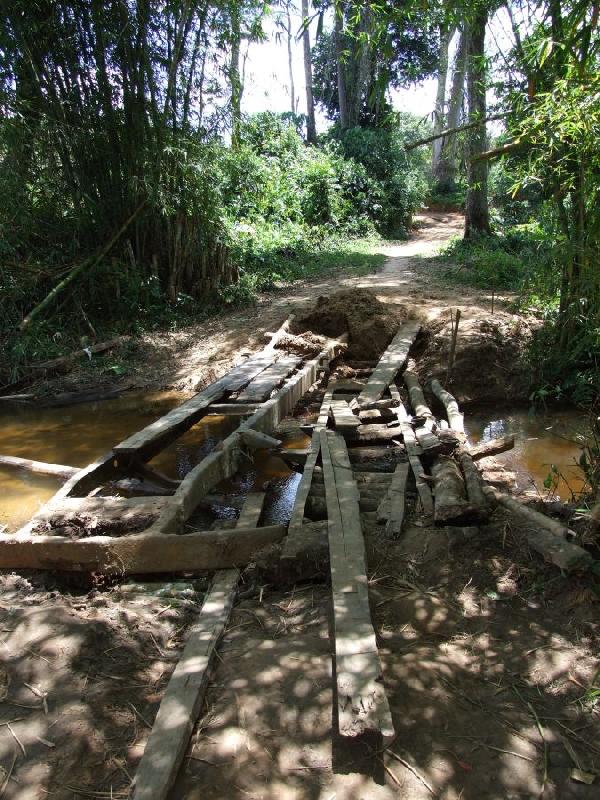
The soil on the other side of the river was more firm and for a short while we could advance quickly in a beautiful scenery!
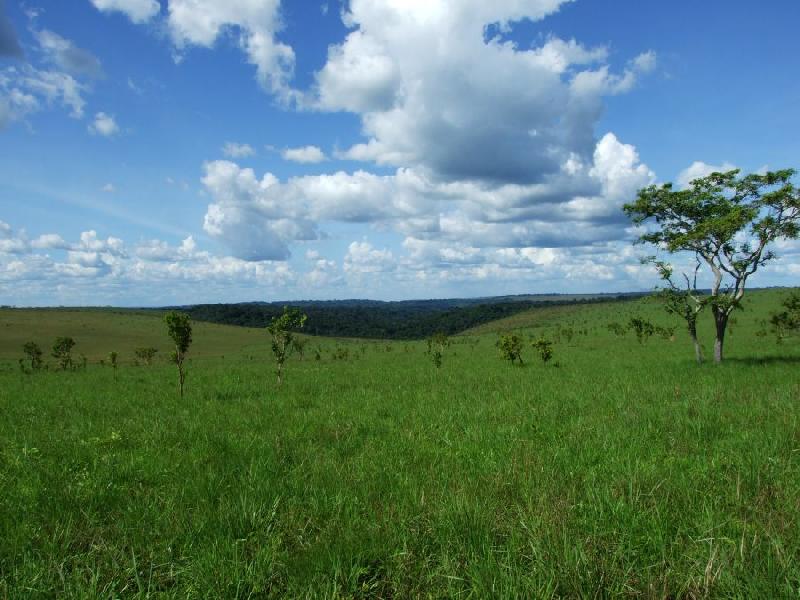
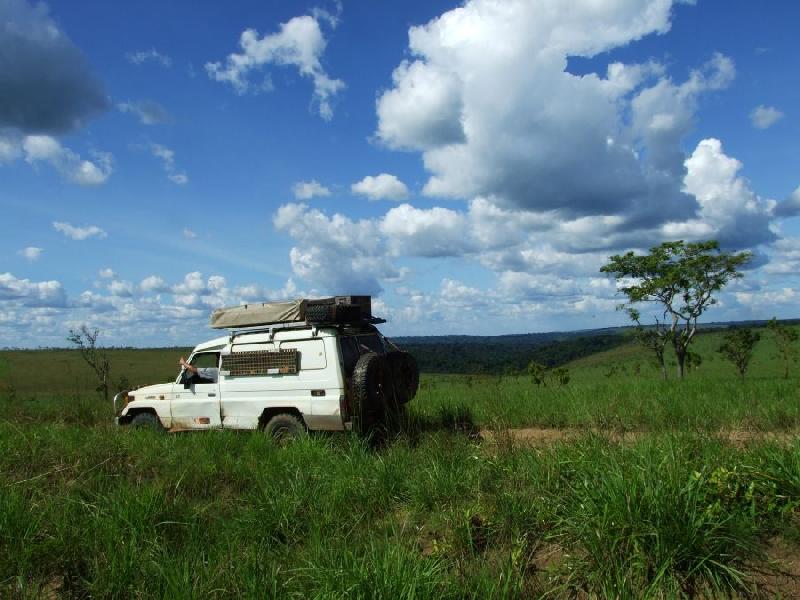
This short stretch was some of the more pleasant parts of the trip thus far. And open savannah where we could actually see something. Reasonable sandy tracks. We did get stuck a few times in the deeper ruts, but nothng dramatic.
And most important: the people seemed to be more friendly this side of the Kasai river. We hadn't met any police yet either.
Busy villages are not a good place to sleep late. We left Basongo at 5.30.
Eventually the road opened up.


We were on top of a hill, and we had to find ourselves a way trough the valley to the next hill. The deeper we descended into the valley, the worse the erosion got. Troughout the years about 10 parallel roads - a few kilometers apart - had been made down the hill. If the road got too bad, they just created a new tracks. The soil was sandy. We had to drive 10 km's to find the latest track

But that track too soon became impossible. We had to create our own track trough the high grass. Josephine would walk in front and I tried not to loose her out of sight.


In the valley was a shallow stream. We drove trough the water instead of using this bridge in case you were wondering.

The soil on the other side of the river was more firm and for a short while we could advance quickly in a beautiful scenery!


This short stretch was some of the more pleasant parts of the trip thus far. And open savannah where we could actually see something. Reasonable sandy tracks. We did get stuck a few times in the deeper ruts, but nothng dramatic.
And most important: the people seemed to be more friendly this side of the Kasai river. We hadn't met any police yet either.
With a bit of luck we'd be able to cross the Loange river today!
The loange river was the second and last ferry we would have to take. Barthélémy in Ilebo said the ferry was functional, so that is good news as it was the last possible showstopper for us. On top of that, The Loange river is the border of the Kasai province and the Bandundu province. For us that was a major milestone, as Bandundu is the last province we would have to cross. Kinshasa is in Bandundu! It was still a very long way, but a milestone nonetheless..
With a bit of luck...
Could it be that luck just doesn't work in Congo? The people here never really had any luck with the people that ruled them. They didn't have much luck with the foreign relations. Some of the worlds biggest and most dangerous diseases (HIV, Ebola, ..) originated here... that's not really what I'd call luck either. You could say that they are lucky to have all those diamonds, gold and whatnot burried under their very fertile ground... But that is exactly the reason that the country has been in a constant state of war for the last decades. Tough luck!
We would not make it to the ferry today.
Where the road descended down to the river, the Savannah abruptly stopped and turned into dense forest. The water had eroded a deep and very rough track here, we were very happy to have to do this downhill so gravity could help us down. At the last village people had warned us not to start the descent as a truck was coming up in the other direction. It is ofcourse impossible to pass eachother there.
So we stopped on top of the hill and walked down. Sure enough, a big 4x4 truck was stuck in the tracks. They were carrying a GSM tower that was to be constructed on the savannah behind us. They had hired a team of about 20 man to assist the truck on this stretch. Armed with shovels and pickaxes they more-or-less levelled the road. We watched them for an hour and they had moved about 10 meter in that time. It was another kilometer to the top. This would take some time!
So we walked back to our car and waited... It was 10 in the morning.
The loange river was the second and last ferry we would have to take. Barthélémy in Ilebo said the ferry was functional, so that is good news as it was the last possible showstopper for us. On top of that, The Loange river is the border of the Kasai province and the Bandundu province. For us that was a major milestone, as Bandundu is the last province we would have to cross. Kinshasa is in Bandundu! It was still a very long way, but a milestone nonetheless..
With a bit of luck...
Could it be that luck just doesn't work in Congo? The people here never really had any luck with the people that ruled them. They didn't have much luck with the foreign relations. Some of the worlds biggest and most dangerous diseases (HIV, Ebola, ..) originated here... that's not really what I'd call luck either. You could say that they are lucky to have all those diamonds, gold and whatnot burried under their very fertile ground... But that is exactly the reason that the country has been in a constant state of war for the last decades. Tough luck!
We would not make it to the ferry today.
Where the road descended down to the river, the Savannah abruptly stopped and turned into dense forest. The water had eroded a deep and very rough track here, we were very happy to have to do this downhill so gravity could help us down. At the last village people had warned us not to start the descent as a truck was coming up in the other direction. It is ofcourse impossible to pass eachother there.
So we stopped on top of the hill and walked down. Sure enough, a big 4x4 truck was stuck in the tracks. They were carrying a GSM tower that was to be constructed on the savannah behind us. They had hired a team of about 20 man to assist the truck on this stretch. Armed with shovels and pickaxes they more-or-less levelled the road. We watched them for an hour and they had moved about 10 meter in that time. It was another kilometer to the top. This would take some time!
So we walked back to our car and waited... It was 10 in the morning.
It got dark around 6 in the evening. We were still at exactly the same place. The truck had moved up a bit, but not much.
We decided that we would go back to the last village and spend the night there. We asked the 'Chef du village' and he directed us to Germain, the principal of the school. We could camp next to the house of Germain, on the school grounds.
Germain, the principal, was a great guy. Very friendly and concerned about everybody. He involved his wife in all the conversations, and she too was very friendly to us. Two of their sons were at university, one in Kinsasa, the other in Lubumbashi. He was not complaining, but he longed back to the olden (colonial) days when roads were functional. Apparently until 30 years ago there was a lot of wildlife here. Girafes, elephants and lions. His kids had never seen any of these though. All of the wildlife had been poached during the different wars.
Germain's youngest son:
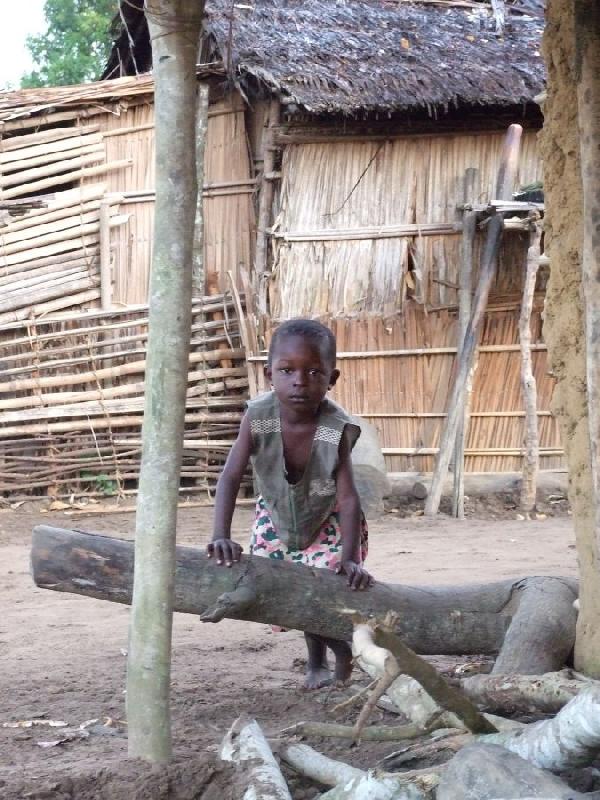
Germain's house:
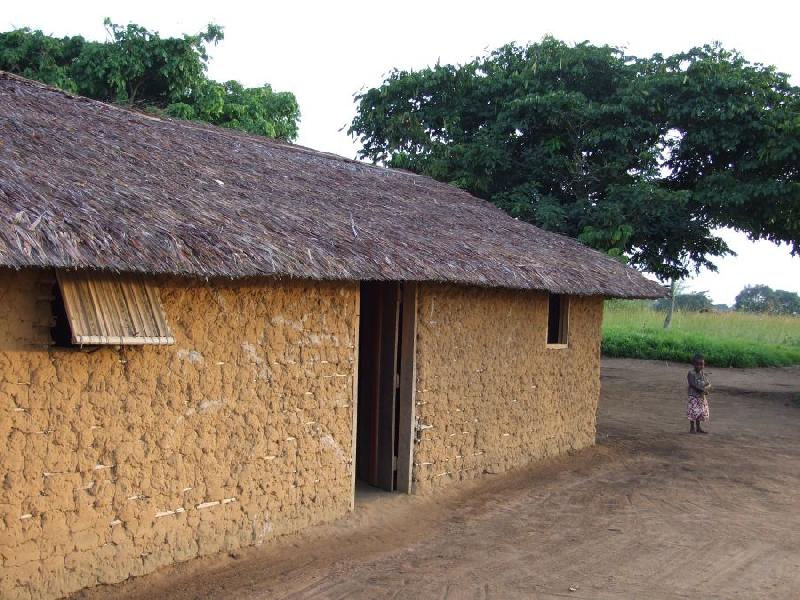
Our house:
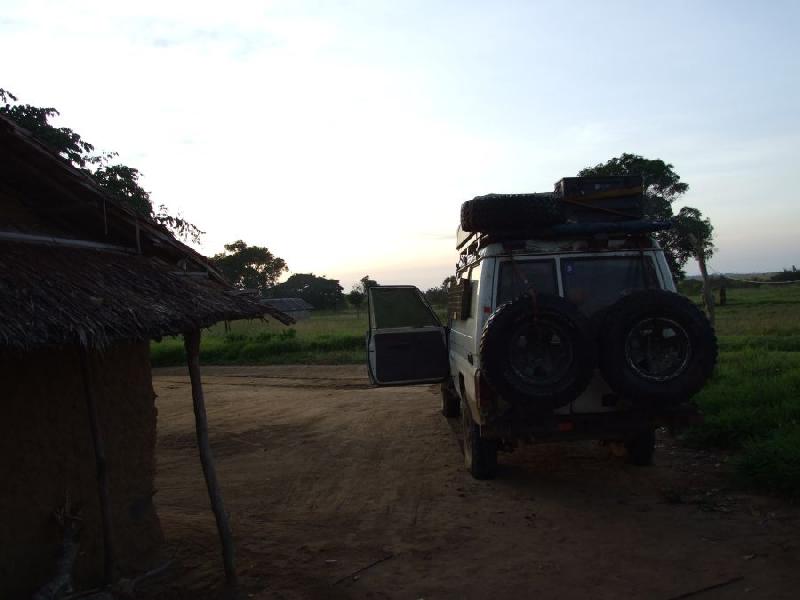
We decided that we would go back to the last village and spend the night there. We asked the 'Chef du village' and he directed us to Germain, the principal of the school. We could camp next to the house of Germain, on the school grounds.
Germain, the principal, was a great guy. Very friendly and concerned about everybody. He involved his wife in all the conversations, and she too was very friendly to us. Two of their sons were at university, one in Kinsasa, the other in Lubumbashi. He was not complaining, but he longed back to the olden (colonial) days when roads were functional. Apparently until 30 years ago there was a lot of wildlife here. Girafes, elephants and lions. His kids had never seen any of these though. All of the wildlife had been poached during the different wars.
Germain's youngest son:

Germain's house:

Our house:

Progress on day 20. Last village before Loange river (don't know the name)
It's been 25 days since we entered DRC (I started counting the day we left Lubumbashi)
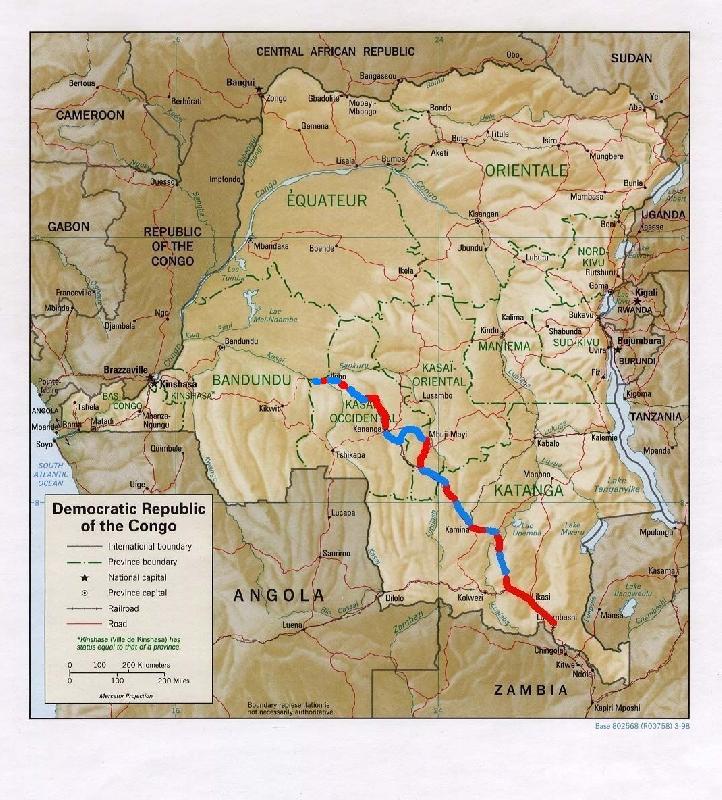
It's been 25 days since we entered DRC (I started counting the day we left Lubumbashi)

Day 21
When we got up in the morning we were immediately informed that the big truck had still not made it up, so we were not in a hurry.
We had some more nice talks with Germain and his wife. We wanted to give him something as he had been so kind to us. We carry a small photo printer, so we decided to take a picture of them and print it off. When we told him we wanted to take a picture from him and his familiy he ran off quickly..
Half an hour later he came back, in a costume and shiny shoes. His wife was dressed up nicely and even the kids had their Sunday's clothes on. They looked fantastic!
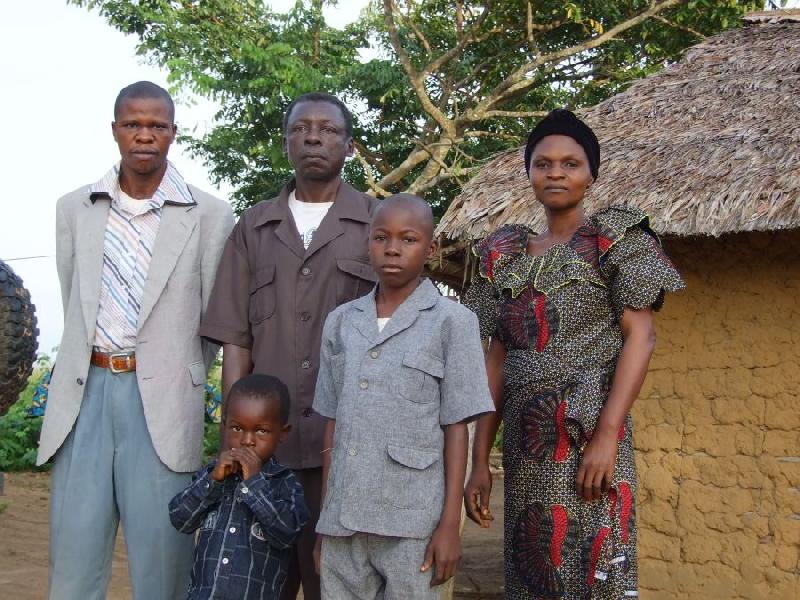
The (tatty and tired looking) mundele on the right looks fantastic too! :wink:
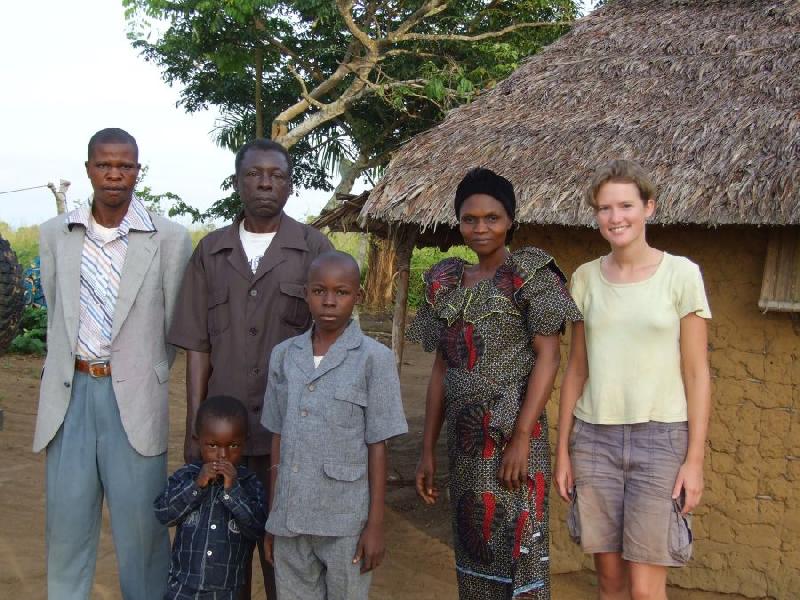
When we got up in the morning we were immediately informed that the big truck had still not made it up, so we were not in a hurry.
We had some more nice talks with Germain and his wife. We wanted to give him something as he had been so kind to us. We carry a small photo printer, so we decided to take a picture of them and print it off. When we told him we wanted to take a picture from him and his familiy he ran off quickly..
Half an hour later he came back, in a costume and shiny shoes. His wife was dressed up nicely and even the kids had their Sunday's clothes on. They looked fantastic!

The (tatty and tired looking) mundele on the right looks fantastic too! :wink:

School grounds usually have a
lot of kids around. We counted them and stopped at 400. That's more then
800 prying eyes. Not just kids though, quite a few adults too.
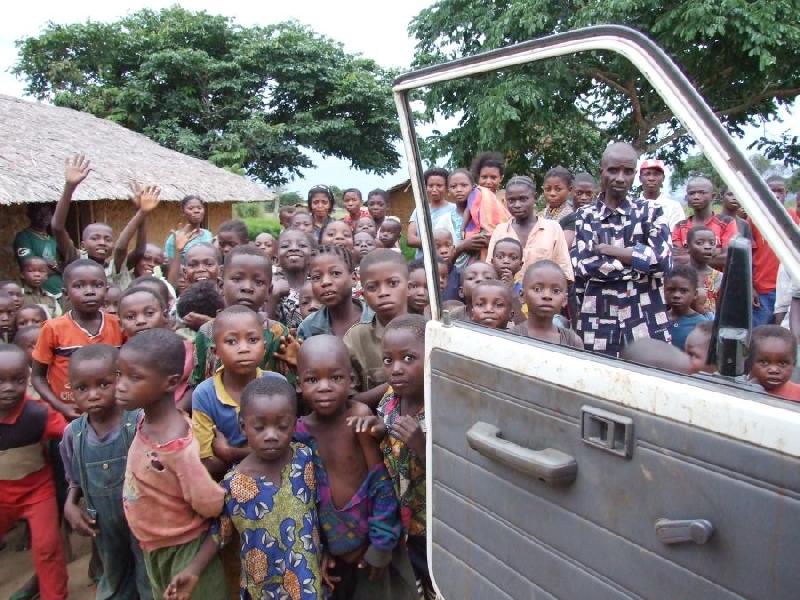
If I had to choose one picture to describe our Congo trip, that would be the one!
We decided to drive back to the begining of the descending road, a few kilometers out of this village, in the hope to find some peace and quiet. That way we would also not loose too much time when the truck finally reaches the top.
When the truck finally reaches the top.
If the truck finally reaches the top.
With a bit of luck.
...
...
At 6.30 that night we were parked next to Germain's house again. The truck did not make it up today..
Germain's wife was so pleased to see us again as she could thank us again for the picture we had given her. She had shown it to all her friends and was very proud of it.
Later that night somebody came to tell us that they were going to work trough the night to get the truck up.. So maybe we'd be able to move again tomorrow?
With a bit of luck...

If I had to choose one picture to describe our Congo trip, that would be the one!
We decided to drive back to the begining of the descending road, a few kilometers out of this village, in the hope to find some peace and quiet. That way we would also not loose too much time when the truck finally reaches the top.
When the truck finally reaches the top.
If the truck finally reaches the top.
With a bit of luck.
...
...
At 6.30 that night we were parked next to Germain's house again. The truck did not make it up today..
Germain's wife was so pleased to see us again as she could thank us again for the picture we had given her. She had shown it to all her friends and was very proud of it.
Later that night somebody came to tell us that they were going to work trough the night to get the truck up.. So maybe we'd be able to move again tomorrow?
With a bit of luck...
Day 22
At 4 that night we were awoken by the sound of a truck engine nearby. Finally, the truck had gotten up the hill (it took them 4 days). It was still pitch dark, so we tried to sleep a few more hours. But the anticipation kept us awake.
We said our goodbyes to Germain and had a quick talk to the truck driver. He was not amused. He started from Kikwit two weeks ago. He said if he'd knew about the state of the roads, that he would have never taken this job. The GSM operator is paying him well for the transport, but he has to pay the local 'helpers' to get him trough here, he will have to be lucky to make a profit out of this ride..
We plummeted down the hill and were grateful that the truck has just passed. They had broadened the road and levelled out the deepest ruts. We still had a struggle as the trucks massive wheels and ground clearance were no match for our little Landcruiser.
Three hours and 5 kilometers later we arrived at the ferry...
Oh boy...
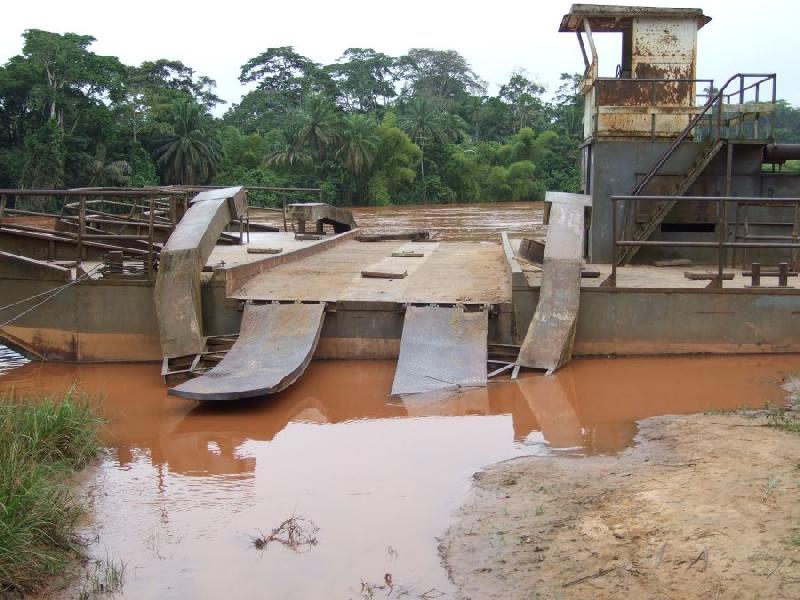
At 4 that night we were awoken by the sound of a truck engine nearby. Finally, the truck had gotten up the hill (it took them 4 days). It was still pitch dark, so we tried to sleep a few more hours. But the anticipation kept us awake.
We said our goodbyes to Germain and had a quick talk to the truck driver. He was not amused. He started from Kikwit two weeks ago. He said if he'd knew about the state of the roads, that he would have never taken this job. The GSM operator is paying him well for the transport, but he has to pay the local 'helpers' to get him trough here, he will have to be lucky to make a profit out of this ride..
We plummeted down the hill and were grateful that the truck has just passed. They had broadened the road and levelled out the deepest ruts. We still had a struggle as the trucks massive wheels and ground clearance were no match for our little Landcruiser.
Three hours and 5 kilometers later we arrived at the ferry...
Oh boy...

There was a police officer at
the ferry, and one or two onlookers. But apart from that it was
surprisingly quiet. The police officer ordered one of the onlookers to
go and get the captain. We sat down and waited in police guy's little
hut. He was nervous and young. We joked around a bit with the people who
were asking for money and cadeaux. Annoying, but not as pushy and
aggresive as we were used to by now.
The policy guy then told us we had to register. We did not feel much like it, but hey, if he wants to copy over all of our details in his little book, why not. When he was done he asked for money as he had registered us. We politely told him that registration is not a paying service in Congo. It never had been.
That's not true he said, it is an integral part of his job to ask for money from people who pass trough here. We had a chuckle but stayed polite and told him that if that is the case, then why is it not in writing anywhere.
He then caught us by surprise by claiming it is written in the official police handbook! He got up, and got out this little black book. It was titled something along the line of "Official guidelines for Police officers in the RDC" (not sure about exact title).
The first chapter were the 'ten commandments' of the police officers, the third item read:
"Créer une base de données de tous les voyageurs dans votre regio"
He read it for us and said:
"Créer une base de donnes de tous les voyageurs dans votre regio"
"Create a base of donations from all travellers in your region"
We couldn't believe what we heard. Had they really constitutionalized corruption? If this was true we would have little choice but to pay.
In disbelief we took the book out of his hands and read the phrase again. Yes, it was really written here...
It took us a minute before we realised that it was not "donne" (pronounced "don", like in Don Quichote) but "donnée" (pronounced don-E).
What was actually written was:
"Create a database of all travellers in your region"
We had to try very hard to keep our laughter down. At first we tought he just tricked us into it. But that was not the case, he genuinely believed it was written that he had to collect money from travellers. He had no idea what a database was.
The policy guy then told us we had to register. We did not feel much like it, but hey, if he wants to copy over all of our details in his little book, why not. When he was done he asked for money as he had registered us. We politely told him that registration is not a paying service in Congo. It never had been.
That's not true he said, it is an integral part of his job to ask for money from people who pass trough here. We had a chuckle but stayed polite and told him that if that is the case, then why is it not in writing anywhere.
He then caught us by surprise by claiming it is written in the official police handbook! He got up, and got out this little black book. It was titled something along the line of "Official guidelines for Police officers in the RDC" (not sure about exact title).
The first chapter were the 'ten commandments' of the police officers, the third item read:
"Créer une base de données de tous les voyageurs dans votre regio"
He read it for us and said:
"Créer une base de donnes de tous les voyageurs dans votre regio"
"Create a base of donations from all travellers in your region"
We couldn't believe what we heard. Had they really constitutionalized corruption? If this was true we would have little choice but to pay.
In disbelief we took the book out of his hands and read the phrase again. Yes, it was really written here...
It took us a minute before we realised that it was not "donne" (pronounced "don", like in Don Quichote) but "donnée" (pronounced don-E).
What was actually written was:
"Create a database of all travellers in your region"
We had to try very hard to keep our laughter down. At first we tought he just tricked us into it. But that was not the case, he genuinely believed it was written that he had to collect money from travellers. He had no idea what a database was.
An
hour later the captain of the ferry arrived. Barthélémy in Ilebo had
given us a letter for the captain, but as we could not read the letter,
we did not trust it. We decided to bargain first, and then give the
letter.
The captain said he could bring us across for 75$US and 30 liters of diesel.
%20 And we had to supply two batteries to get the engine started.
And some oil because the engine was low on oil.
And if possible a diesel filter because his was clogged
Hmm...
The diesel we agreed on, 30 liters is a bargain compared to the 150liters from the last ferry. The price we ridculized and said it was waaaay too much. We discussed for half an hour or so, he was friendly but stuck to his price. Eventually we 'remembered' the letter. He looked happy with what he was reading. Eventually the price got down to 35$US. That is still an inflated price, but we agreed. Don't forget that the average annual income per capita in 2009 in DRC was estimated at 171$US. That's 15$US/month!
Driving onto the ferry required 4x4 and we banged our gearbox (bashplate protected) hard while doing so. We almost cried when we saw the engine of this ferry. The 'machine room' was under water. Not really under water, it was a mucky oily substance. The engine was leaking badly.
This ferry had been used to traverse Kabila's army when they marched in from the Rwanda border to Kinshasa a few years earlier. The captain told us how he was forced to work non-stop for 3 days to get everybody and everything across. Every little piece that Kabila's army could use they had taken. They left little more then a wreck.
We had sent out somebody to buy diesel for us, he had to go two villages down the road to find some (on his bicycle). In the meantime we tried to jumpstart the boat. Our jumpleads were too short to get to it, so we took our batteries out (our Landcruiser is 24volt - 2 batteries).
With our batteries connected the starter motor started turning. Turn after turn after turn after turn. Fast at first, but then slower and slower. Everybody was dead silent, hoping the engine would start.
It wouldn't.
They got to work, and took injectors out and doublechecked various parts. Another attempt was made The battery was getting really low and just when we thought it was not going to work the big diesel engine sprung to life. Hesitant at first, but after a minute or so most of its 10 cylinders were working. No mufflers ofcourse, this was a LOUD engine!
The captain's smile was priceless, he was proud of his machine! He gave it some trotthle and then the engine sputtered and died. He came down and said they had forgotten to purge the fuel system. Air in the system and the engine had died. Our batteries were flat now, not enough juice left to turn that big starter motor. We tried to start our own engine, but even that did not work. Bugger!
But, no problem, apparantly they had 2 batteries in the village on the other side of the river. We could 'rent' them for a small fee. Having no other choice we agreed. With a dugout canoe some guys got across in search for the batteries.
An hour later the captain had purged the fuel lines and we had two 'new' batteries. They were worthless. They measured 10 volt at most, they were not charged! Another solution came up: somebody in the village had a solar panel, and we could rent it. They thought it would take 2, maybe 3 days to get it charged fully.
Rather not..
The captain said he could bring us across for 75$US and 30 liters of diesel.
%20 And we had to supply two batteries to get the engine started.
And some oil because the engine was low on oil.
And if possible a diesel filter because his was clogged
Hmm...
The diesel we agreed on, 30 liters is a bargain compared to the 150liters from the last ferry. The price we ridculized and said it was waaaay too much. We discussed for half an hour or so, he was friendly but stuck to his price. Eventually we 'remembered' the letter. He looked happy with what he was reading. Eventually the price got down to 35$US. That is still an inflated price, but we agreed. Don't forget that the average annual income per capita in 2009 in DRC was estimated at 171$US. That's 15$US/month!
Driving onto the ferry required 4x4 and we banged our gearbox (bashplate protected) hard while doing so. We almost cried when we saw the engine of this ferry. The 'machine room' was under water. Not really under water, it was a mucky oily substance. The engine was leaking badly.
This ferry had been used to traverse Kabila's army when they marched in from the Rwanda border to Kinshasa a few years earlier. The captain told us how he was forced to work non-stop for 3 days to get everybody and everything across. Every little piece that Kabila's army could use they had taken. They left little more then a wreck.
We had sent out somebody to buy diesel for us, he had to go two villages down the road to find some (on his bicycle). In the meantime we tried to jumpstart the boat. Our jumpleads were too short to get to it, so we took our batteries out (our Landcruiser is 24volt - 2 batteries).
With our batteries connected the starter motor started turning. Turn after turn after turn after turn. Fast at first, but then slower and slower. Everybody was dead silent, hoping the engine would start.
It wouldn't.
They got to work, and took injectors out and doublechecked various parts. Another attempt was made The battery was getting really low and just when we thought it was not going to work the big diesel engine sprung to life. Hesitant at first, but after a minute or so most of its 10 cylinders were working. No mufflers ofcourse, this was a LOUD engine!
The captain's smile was priceless, he was proud of his machine! He gave it some trotthle and then the engine sputtered and died. He came down and said they had forgotten to purge the fuel system. Air in the system and the engine had died. Our batteries were flat now, not enough juice left to turn that big starter motor. We tried to start our own engine, but even that did not work. Bugger!
But, no problem, apparantly they had 2 batteries in the village on the other side of the river. We could 'rent' them for a small fee. Having no other choice we agreed. With a dugout canoe some guys got across in search for the batteries.
An hour later the captain had purged the fuel lines and we had two 'new' batteries. They were worthless. They measured 10 volt at most, they were not charged! Another solution came up: somebody in the village had a solar panel, and we could rent it. They thought it would take 2, maybe 3 days to get it charged fully.
Rather not..
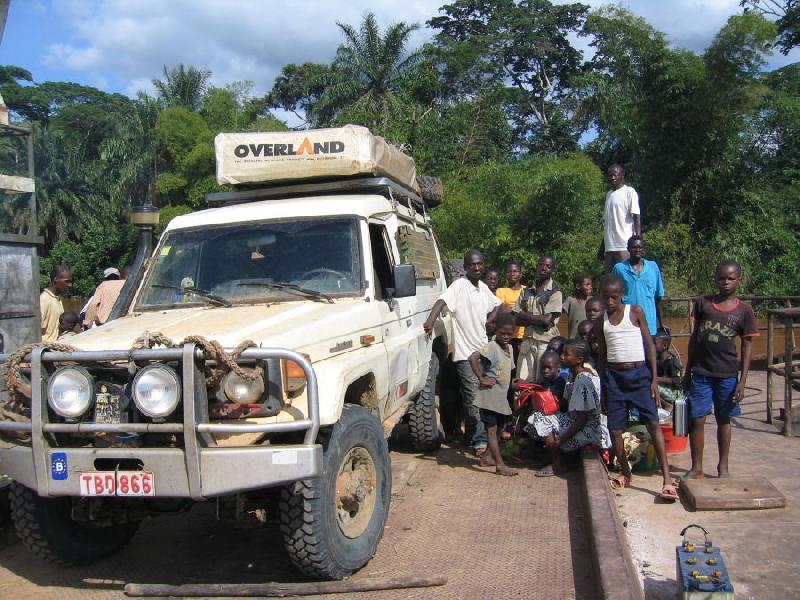
Sitwrap:
-Our car was sitting on ferry - a ferry we hoped would not sink now
-The ferry was not running
-The ferry did not have batteries
-By attempting to start the ferry, our batteries were now flat
-Our car was not running
-We could not push our car off the ferry as the ramps were damaged.
If we wanted to charge our batteries, we needed a running engine and a functional alternator.
We had to push start our Landcruiser, and we had to do it on the few meters of space we had on the ferry.
Now seems like an appropriate time to talk about our brakes. As we had been doing extreme 4x4 work the last 3 weeks in mostly sandy and muddy areas, it does not come to a surprise that our brakes took a bit of a beating. As a matter of fact, we barely had any functional brakes when we left Kananga. And we have no brakes whatsoever since we left Ilebo. It's just metal to metal... and that does not brake very well. It hadn't bothered me too much until now, the big Landcruiser engine allows for great engine breaking and we are not driving any faster then 20km/h anyway.
This made the situation a bit more complicated now.. :roll:
As you can see on the first picture of this ferry, there is nothing at the end of the ferry to stop us from rolling into the fast flowing Loange river.
5 meters. That was the distance we had. The ferry crowd would push us as fast as they could, I had to build up enough speed to make the engine turn, once started I had to engage reverse gear, let the clutch go - gently without stalling the engine or slipping the wheels - and come to a halt before rolling into the river.
5 meters!
Dutch, French and English, that makes 3. Dutch is my mother tongue.
Josephine knows the same languages but German in addition too, and she plans on learning Spanish soon.
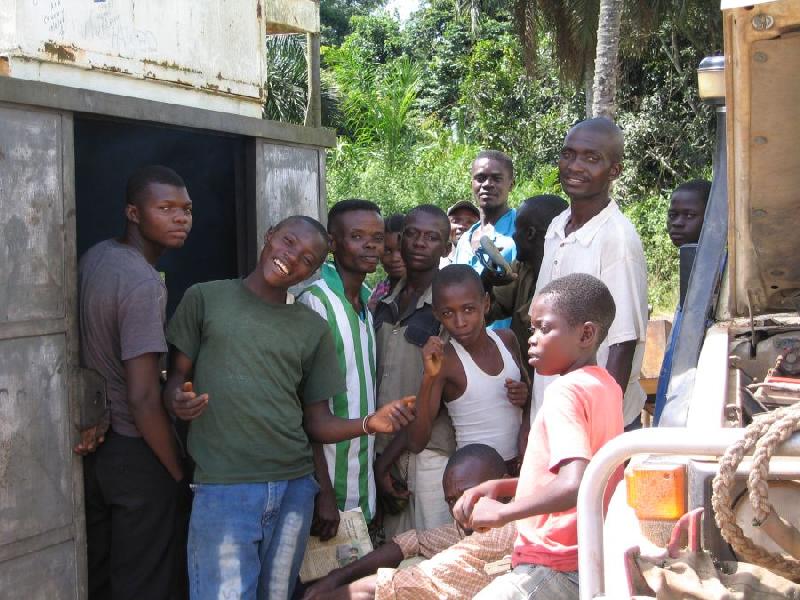
I was a tad bit nervous when the countdown started. I closed the door but left the window open and did not wear my seatbelt. Just in case...
3-2-1 and off we went. I dumped the clutch almost immediately. Way too early ofcourse and we came to halt. The engine was not running. On the second try I waited 'much' longer, but we did not have enough speed to turn the crank. I had about a meter of extra play.
Third try was a good one. I dumped the clutch and immediately declutched again to throw it in reverse and with screeching tyres I reversed again just in time. I like a bit of tension, but this was pushing it a bit!
The next hour we left the engine running with an increased idle to charge the batteries.
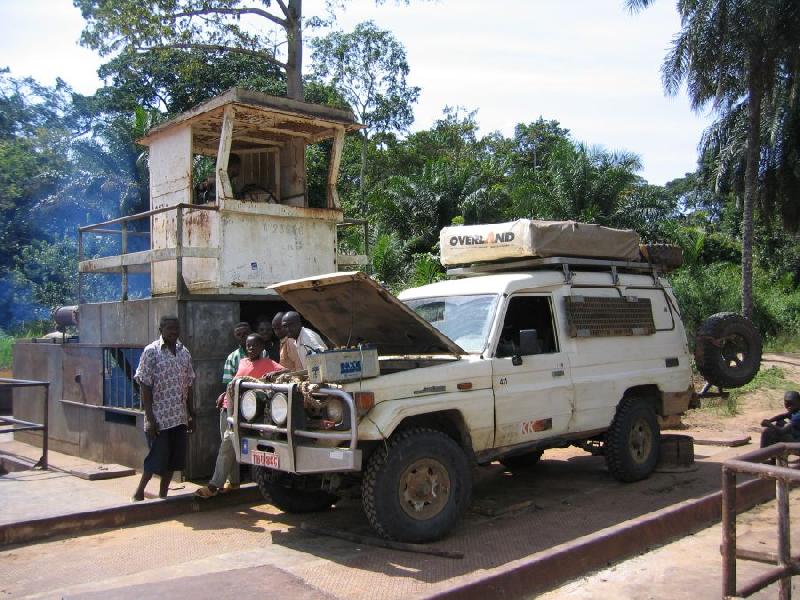
While waiting we had a nice view over the river. At one point we could hear drums in the distance, approaching quickly. It was a 'cargo' canoe. 4 or 5 huge dugout canoes tied together with a huge load on it and rowers on bot sides. Somebody was setting the pace with a drum. They were travelling downstream and were going really fast. That was one of the rare occasion where I saw the Congo I had dreamt about when I was a kid.
We figured that after an hour of charing, the batteries should be loaded enough to start the boat engine. So we shut down the engine, took out the batteries and hooked it up to the ferry.
KLIK - KLIK
Nothing happened...
We had this made up for us in Congo :sombrero: It's on our wall in our living room at the moment.
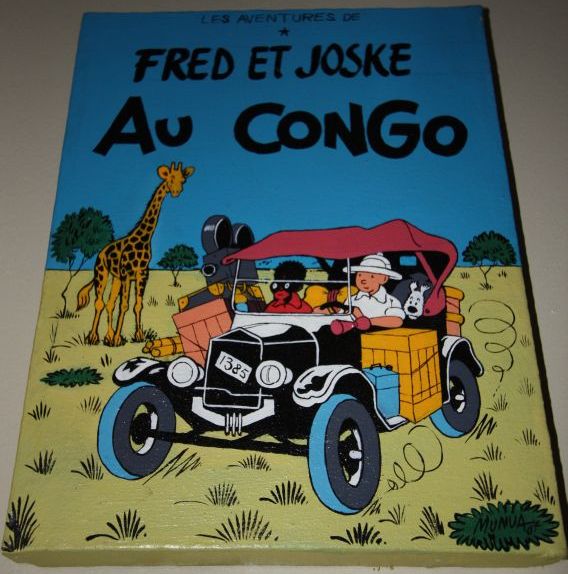
I take out the multimeter and it gives funny readings on our batteries. I am starting to fear that they are shot. :?
We have been on this ferry for over 4 hours now, and we have not really made any progress. Luckily we still have an ace up our sleeves. Our Landcruiser is a 24volt version. That means we have 2 batteries for the engine. (imagine you arrive here with only one battery?). But we also have two auxiliary batteries in the back, to run our fridge. There are a couple of reasons we had not used them up until now. Firstly these batteries are deep-cycle batteries, they are not made for cranking an engine, that could lead to damage. Secondly, to save space in the back I put the batteries in a location where they are very difficult to take out of. We would have to unload half of the car to get to it, It takes at least an hour to take them out. Not a fun thing to do in a car that has been standing all day in tropical heat. The idea of exposing all our belongings in this crowd is not really a good prospect either.
But we had no choice now, so we started unloading our car on the ferry. Josephine on guard, me sweating inside.
An hour later the ferry came to live again. It once again took a lot of turns of the startermotor before the engine would go.. these batteries too were now completely flat.
I did not really see anything of our crossing (shame, it was a beautiful river) as I was trying to bolt the batteries back into the back of our truck.
At 4 in the afternoon we reached the opposite side. With as much run-up as possible they pushed us of the ferry and I managed to get the Landcruiser started on my, rough, way down. We were greeted by a committee of officials. This was a province border (Kasai/Bandundu).
We have been on this ferry for over 4 hours now, and we have not really made any progress. Luckily we still have an ace up our sleeves. Our Landcruiser is a 24volt version. That means we have 2 batteries for the engine. (imagine you arrive here with only one battery?). But we also have two auxiliary batteries in the back, to run our fridge. There are a couple of reasons we had not used them up until now. Firstly these batteries are deep-cycle batteries, they are not made for cranking an engine, that could lead to damage. Secondly, to save space in the back I put the batteries in a location where they are very difficult to take out of. We would have to unload half of the car to get to it, It takes at least an hour to take them out. Not a fun thing to do in a car that has been standing all day in tropical heat. The idea of exposing all our belongings in this crowd is not really a good prospect either.
But we had no choice now, so we started unloading our car on the ferry. Josephine on guard, me sweating inside.
An hour later the ferry came to live again. It once again took a lot of turns of the startermotor before the engine would go.. these batteries too were now completely flat.
I did not really see anything of our crossing (shame, it was a beautiful river) as I was trying to bolt the batteries back into the back of our truck.
At 4 in the afternoon we reached the opposite side. With as much run-up as possible they pushed us of the ferry and I managed to get the Landcruiser started on my, rough, way down. We were greeted by a committee of officials. This was a province border (Kasai/Bandundu).
We
were invited in the customs hut. It had a little table and a wooden
bench. And a big book. They registered us, asked for our permit (was ok
for them), our insurance, etc.. When they were done they asked if we
"had something for them"
Time for the usual routine, this gets tiring after a while. So I silently count to 3, smile and with a very sweet voice reply that I give them my friendship and appreciation and give them a blessing from God.. And that I am so delighted that such a professional and efficient custom service is provided (for free!) by the Congolese government to us, humble tourists.
They ofcourse reply that they want something else. After which I put on a very sad face and ask why they do not want my friendship?
This confuses them. That is the right time to get up, thank and greet them with a lot of words (not allowing them to talk back) and walk out of the door.
But we were immediately redirected to another hut, the police hut. Same story there, same tricks.
When we were finally ready to go, the first customs officer comes to me. He brings me my hat. I had forgotten it in his hut. These guys aren't bad, they do what they have always seen and done (ref. corruption). We are glad we remained friendly with them. We felt very much out of place again.
Slowly we drove off, back into the bush. Our mood changed when we realized that we had just left Kasai behind. That was the hardest part of our trip. Once we reach Kikwit, we know there is a frequently used road to Kinshasa. And from the people on the ferry we learned that there is good track - maintained by Belgians - from Dibaya-Lubwe to Kikwit. A quick check on the map learned us that we would reach that 'real' road soon. Not today, but probably tomorrow, depending on the state of the roads.
The road was pretty bad and the going was slow. But it was not as bad as the roads from the last days. Most of the time we were still driving off-camber, driving in and out of huge pits, around or over obstacles. Slow, first gear movement. But we did not get stuck. It was pretty surreal that Josephine and I were having a very animated discussion while negotiating these serious obstacles.
We looked back to everything we have been trough in the last 4 weeks. pretty crazy stuff! We have litterally gotten ourselves stuck hundreds of times, but we always managed to get us out. We laughed at all the nonsense we talked when trying to avoid bribes. We felt really happy now, relieved. A great sense of satisfaction came over us. We congratulated eachother for helping eachother out when the going got tough. We congratulated our Landcruiser for being so tough.
Then a horrible, dreadful sound.
*BANG* tak-tak-tak
Time for the usual routine, this gets tiring after a while. So I silently count to 3, smile and with a very sweet voice reply that I give them my friendship and appreciation and give them a blessing from God.. And that I am so delighted that such a professional and efficient custom service is provided (for free!) by the Congolese government to us, humble tourists.
They ofcourse reply that they want something else. After which I put on a very sad face and ask why they do not want my friendship?
This confuses them. That is the right time to get up, thank and greet them with a lot of words (not allowing them to talk back) and walk out of the door.
But we were immediately redirected to another hut, the police hut. Same story there, same tricks.
When we were finally ready to go, the first customs officer comes to me. He brings me my hat. I had forgotten it in his hut. These guys aren't bad, they do what they have always seen and done (ref. corruption). We are glad we remained friendly with them. We felt very much out of place again.
Slowly we drove off, back into the bush. Our mood changed when we realized that we had just left Kasai behind. That was the hardest part of our trip. Once we reach Kikwit, we know there is a frequently used road to Kinshasa. And from the people on the ferry we learned that there is good track - maintained by Belgians - from Dibaya-Lubwe to Kikwit. A quick check on the map learned us that we would reach that 'real' road soon. Not today, but probably tomorrow, depending on the state of the roads.
The road was pretty bad and the going was slow. But it was not as bad as the roads from the last days. Most of the time we were still driving off-camber, driving in and out of huge pits, around or over obstacles. Slow, first gear movement. But we did not get stuck. It was pretty surreal that Josephine and I were having a very animated discussion while negotiating these serious obstacles.
We looked back to everything we have been trough in the last 4 weeks. pretty crazy stuff! We have litterally gotten ourselves stuck hundreds of times, but we always managed to get us out. We laughed at all the nonsense we talked when trying to avoid bribes. We felt really happy now, relieved. A great sense of satisfaction came over us. We congratulated eachother for helping eachother out when the going got tough. We congratulated our Landcruiser for being so tough.
Then a horrible, dreadful sound.
*BANG* tak-tak-tak
I stopped
immediately. I was pretty sure I knew what that sound meant. I turned my
head towards Josephine and saw a confused, questioning look on her
face. "What was that?" she asked. I did not say a word and got out of
the car, looked at the wheels and saw nothing special.I walked to the
other side of the car and saw this
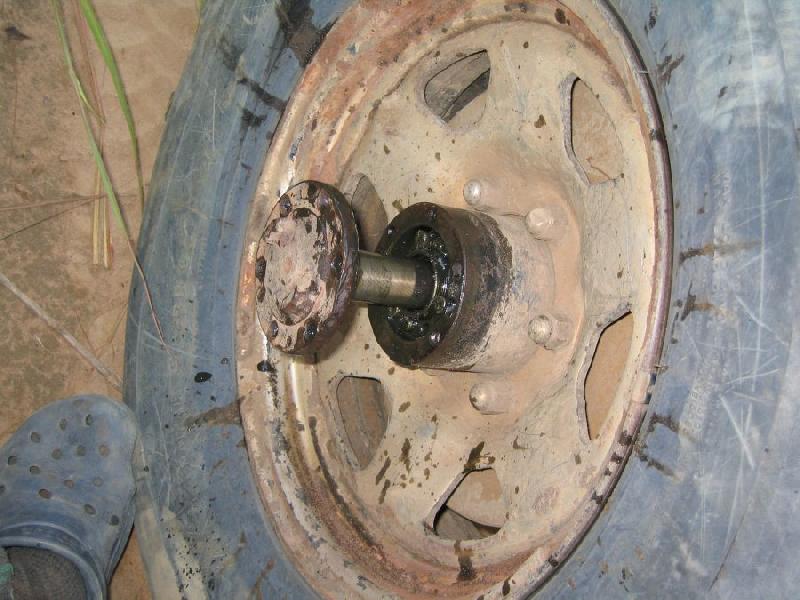
Everything seemed to pause for a minute. It was late afternoon and the worst heat had worn off, the sounds of the bush were omnipresent. We were alone. We were sweating.
"Josephine, I think we have problem"

Everything seemed to pause for a minute. It was late afternoon and the worst heat had worn off, the sounds of the bush were omnipresent. We were alone. We were sweating.
"Josephine, I think we have problem"
All 6 flange bolts had sheared off and the axle had worked its way out. Diff oil was seeping out (and dust in).
This was not good.
This was not good at all!
We both sat down for a few minutes and stared at our rear axle. It was a sad sight. We are not superstitious at all, but maybe we shouldn't have been that positive? This was a scene out of a comic book. It is Donald Duck jumping on a bridge, shouting "look how strong this is". And in the next scene Donald Duck is seen falling in the water under the collapsing bridge.
A guy on a bicycle stops and looks at the axle. He utters a long "ai ai ai ai ai ai" (think "The Gods must be crazy"). This makes us laugh and we repeat his "ai ai ai ai ai". He couldn't have expressed our feelings better.
The bicycle guy says there is a village 500 meter further down the road. Tongue firmly in cheek I ask if there is a Toyota garage in that village. He gave me a crazy look. "Il n'y a pas de voiture ici!" - "There are no cars here!".
We have got to do something, so I get out my limited toolbox and start removing the rear propshaft and try to close the diff a bit.
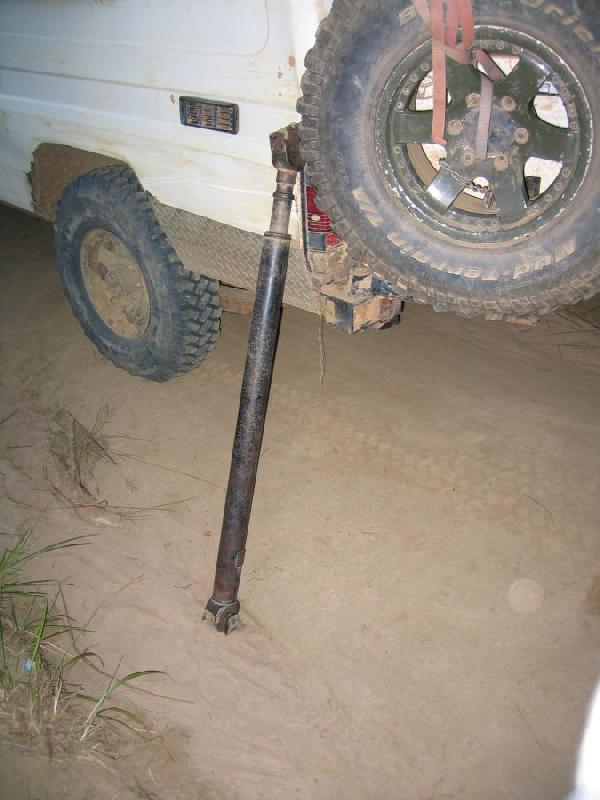
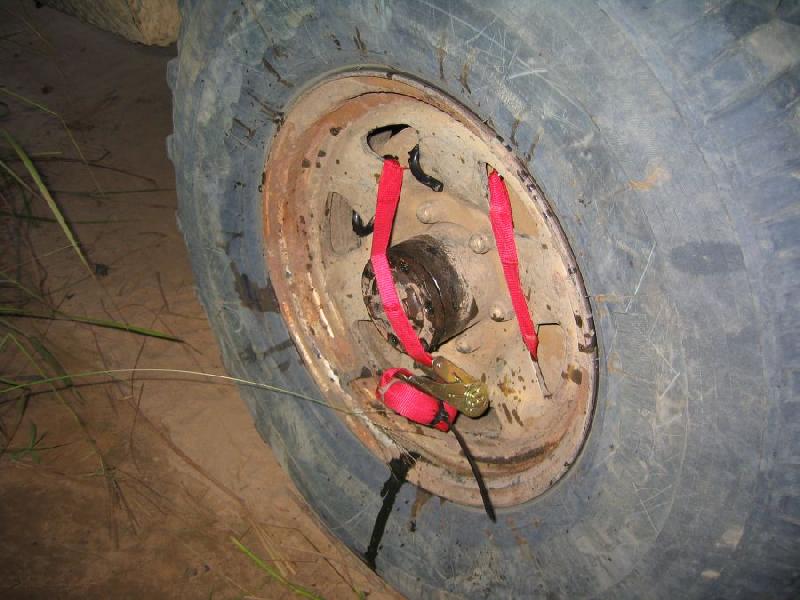
With 4x4 engaged we still have a front wheel drive Landcruiser.
This was not good.
This was not good at all!
We both sat down for a few minutes and stared at our rear axle. It was a sad sight. We are not superstitious at all, but maybe we shouldn't have been that positive? This was a scene out of a comic book. It is Donald Duck jumping on a bridge, shouting "look how strong this is". And in the next scene Donald Duck is seen falling in the water under the collapsing bridge.
A guy on a bicycle stops and looks at the axle. He utters a long "ai ai ai ai ai ai" (think "The Gods must be crazy"). This makes us laugh and we repeat his "ai ai ai ai ai". He couldn't have expressed our feelings better.
The bicycle guy says there is a village 500 meter further down the road. Tongue firmly in cheek I ask if there is a Toyota garage in that village. He gave me a crazy look. "Il n'y a pas de voiture ici!" - "There are no cars here!".
We have got to do something, so I get out my limited toolbox and start removing the rear propshaft and try to close the diff a bit.


With 4x4 engaged we still have a front wheel drive Landcruiser.
We
manage to drive to the village, sun is low on the horizon by now so we
wisely decide to stop here. We need to think about our situation. The
usual 100 man crowd quickly forms. People here are still annoyingly
curious, but they do not seem to be as angry as we experienced so much
in the first part of our trip. Maybe we just get used to it more. Or
know better how to deal with the situation.
The chef du village assigns us a spot under a tree and we set up camp. Our morale is low, very low! It's been quite the day! First the hairy decent down to the Loange river, then the whole debacle to get the ferry across, and now with our broken rear axle.
We are exhausted.
We are dirty.
We are running low on water
We have barely enough water to cook some pasta, but not enough to freshen us up. When asked if they have some water for us, a guy called Patty responds cheerfully that their village is blessed as they have a fresh water source nearby. That sounds great, I ask if I can fill up one of our jerrycans. This is no problem, but he asks if it can wait until tomorrow. I push him a bit as we would really like to wash the mud from our faces and have enough to drink. He agrees to show me the source.
So of we go, armed with an empty jerrycan I follow Patty. Out of the village. Down a hill. Into a forest. This is a steep track! And muddy! I wish I put on my hiking boots for this, I was slipping around on my worn crocs. After a 10 minute walk downhill I start questioning Patty about this source, I thought it was nearby?!? "Ce n'est pas loin, presque là!" - "It's not far, we are almost there".
It is a very narrow track trough the bush. I walk trough spiderwebs a few time and mosquitoes are having a ball! Eventually we arrive at a murky source down in the valley. I am knackered! 30 minutes down. And now we have to go up again. With a full 20 liter jerrycan! I have to stop every 10 steps to catch my breath and eventually Patty asks me if he should carry the jerrycan. I swallow my pride and my politeness and quickly say "Yes! Please!". Patty is fit and strong and jogs up the hill. I have problems just keeping up with him.
We have a nice talk on the way up. A monologue really as I am out of breath all the time. He was a nurse and used to work in the first aid post of the village. He had been working for free for years as there was no budget to pay him. But now they ran out of budget for supplies too. The first aid post in the village had been closed last year. If people got ill here, they had to travel to Dibaya-Lubwe for even the most basic of things.
An hour and half after we left we returned to the car. I was broken. This 5km rough hike was too much for me know. I did not have the strength to do these kind of things. The women in the village do this twice a day!
Despite all the worries, I slept well that night!
Josephine on the other hand.. she did not sleep well. If at all! A combination of the poor food and the stress resulted in stumach problems... withthe side-effects that we are all familiar with. There was a toilet in the village. A hole in the ground with a hut on top of it. But it was all the way at the other end of the village. And as a bonus there was a huge hairy spider, right next to hole that refused to bodge.
Poor Josephine!
The chef du village assigns us a spot under a tree and we set up camp. Our morale is low, very low! It's been quite the day! First the hairy decent down to the Loange river, then the whole debacle to get the ferry across, and now with our broken rear axle.
We are exhausted.
We are dirty.
We are running low on water
We have barely enough water to cook some pasta, but not enough to freshen us up. When asked if they have some water for us, a guy called Patty responds cheerfully that their village is blessed as they have a fresh water source nearby. That sounds great, I ask if I can fill up one of our jerrycans. This is no problem, but he asks if it can wait until tomorrow. I push him a bit as we would really like to wash the mud from our faces and have enough to drink. He agrees to show me the source.
So of we go, armed with an empty jerrycan I follow Patty. Out of the village. Down a hill. Into a forest. This is a steep track! And muddy! I wish I put on my hiking boots for this, I was slipping around on my worn crocs. After a 10 minute walk downhill I start questioning Patty about this source, I thought it was nearby?!? "Ce n'est pas loin, presque là!" - "It's not far, we are almost there".
It is a very narrow track trough the bush. I walk trough spiderwebs a few time and mosquitoes are having a ball! Eventually we arrive at a murky source down in the valley. I am knackered! 30 minutes down. And now we have to go up again. With a full 20 liter jerrycan! I have to stop every 10 steps to catch my breath and eventually Patty asks me if he should carry the jerrycan. I swallow my pride and my politeness and quickly say "Yes! Please!". Patty is fit and strong and jogs up the hill. I have problems just keeping up with him.
We have a nice talk on the way up. A monologue really as I am out of breath all the time. He was a nurse and used to work in the first aid post of the village. He had been working for free for years as there was no budget to pay him. But now they ran out of budget for supplies too. The first aid post in the village had been closed last year. If people got ill here, they had to travel to Dibaya-Lubwe for even the most basic of things.
An hour and half after we left we returned to the car. I was broken. This 5km rough hike was too much for me know. I did not have the strength to do these kind of things. The women in the village do this twice a day!
Despite all the worries, I slept well that night!
Josephine on the other hand.. she did not sleep well. If at all! A combination of the poor food and the stress resulted in stumach problems... withthe side-effects that we are all familiar with. There was a toilet in the village. A hole in the ground with a hut on top of it. But it was all the way at the other end of the village. And as a bonus there was a huge hairy spider, right next to hole that refused to bodge.
Poor Josephine!
Progress afer our 22nd day on the road. 27th day since we entered DRC.
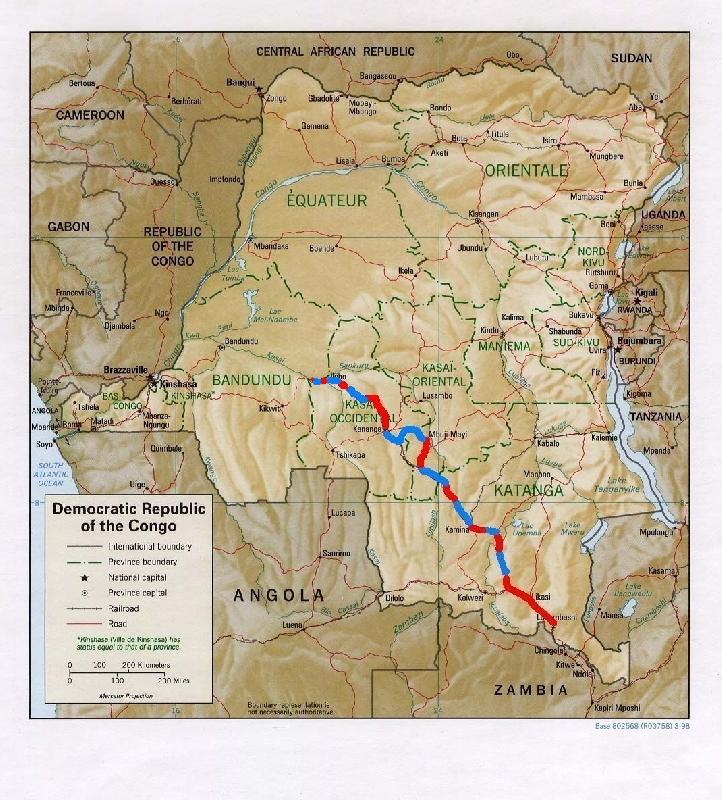

Last night we had tried sending a
few SMS messages to our favourite mechanic at home (Hi Pascal! :wink:
). The GSM reception was an on-and-off affair and after a few hours of
trying we managed to get a reply with a few suggestions we could try.
That would be the first job of the day!
We had our spectators, but only 40 or 50, which is not all that much. Life in the village seemed to continue pretty much as normal. Women were grinding the manioc, kids were playing, men were talking in little groups.
Upon closer inspection we saw that the bolts on the flange were broken off, leaving all 6 holes filled with the remains of the bolts. We had hoped that we could replace some of the bolts with bolts from the front axle (a tip from Pascal). But there was no way that was going to work. We could weld the axle in place, but there was no welder in this village. That would also destroy the axle and the hub, something I did not fancy. After all, if we arrive in Kinshasa, we are still 15.000km from home!
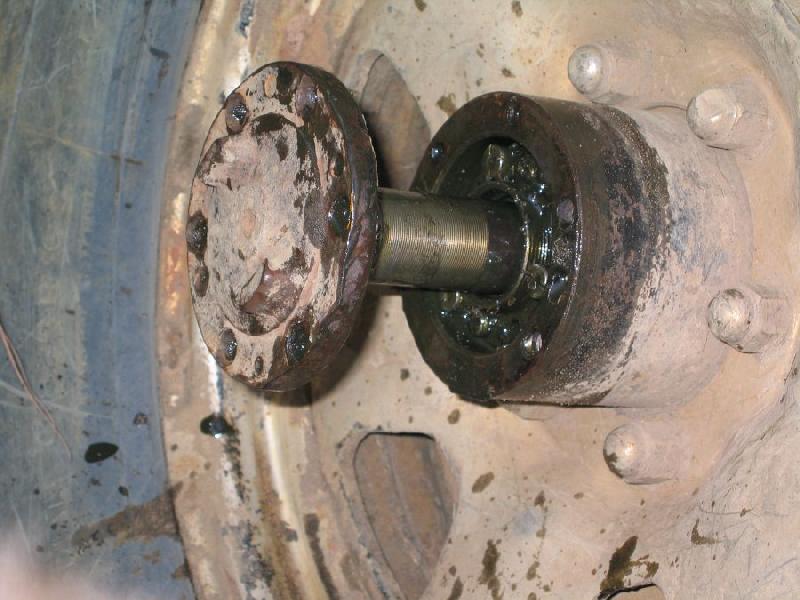
The locals suggest we take our entire rear axle out and transport it (by bicycle) to Dibaya-lubwe. Fix it there and then transport it back and mount it again. That's how the Congolese would handle the situation. We had instant flash-backs to the truck that had been waiting for a year for its repaired engine. Rather not!
We could not fix this here. We had to go to Dibaya-Lubwe, the closest city. It's not that far, so we decided we would try to get there with front wheel drive only. We would take it slowly and carefully!
We tried sending an SMS home to let them know we broke down. But we had no reception at all. Most of the GSM towers here are generator powered and only run for a few hours a day (to hard/expensive to get supplies in.. and too few paying customers too I presume).
Our engine did not start. The batteries had not survived the ferry ordeal. We had to get a push to get the engine started. We scared the people with our insanely loud exhaust (broken off). Children followed our badly beaten truck. We were a miserable sight.
Even before we got back onto the track we got stuck. There was no obstacle. Just a bit of soft sand. We needed another push to get going again.
The road is nearly perfect. Nice and flat, a bit sandy. Yet still, we get stuck on a 10cm incline. That is ridiculous! With all the weight on our rear axle it acts as an anchor. The front wheels on the other hand are not that much loaded and battle to grip. A little bit too much throttle and they spin.
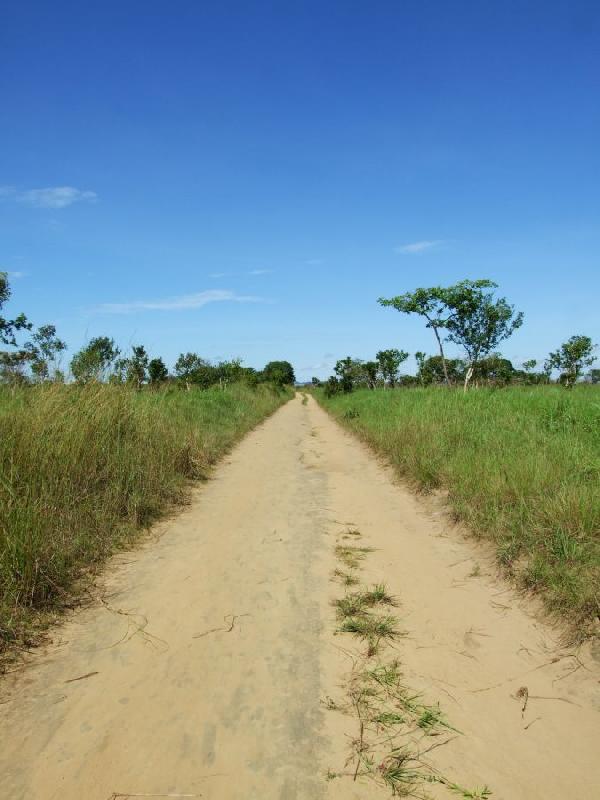
Out come the shovels again. For a 10cm hill! This is going to be a long, long day!
We had our spectators, but only 40 or 50, which is not all that much. Life in the village seemed to continue pretty much as normal. Women were grinding the manioc, kids were playing, men were talking in little groups.
Upon closer inspection we saw that the bolts on the flange were broken off, leaving all 6 holes filled with the remains of the bolts. We had hoped that we could replace some of the bolts with bolts from the front axle (a tip from Pascal). But there was no way that was going to work. We could weld the axle in place, but there was no welder in this village. That would also destroy the axle and the hub, something I did not fancy. After all, if we arrive in Kinshasa, we are still 15.000km from home!

The locals suggest we take our entire rear axle out and transport it (by bicycle) to Dibaya-lubwe. Fix it there and then transport it back and mount it again. That's how the Congolese would handle the situation. We had instant flash-backs to the truck that had been waiting for a year for its repaired engine. Rather not!
We could not fix this here. We had to go to Dibaya-Lubwe, the closest city. It's not that far, so we decided we would try to get there with front wheel drive only. We would take it slowly and carefully!
We tried sending an SMS home to let them know we broke down. But we had no reception at all. Most of the GSM towers here are generator powered and only run for a few hours a day (to hard/expensive to get supplies in.. and too few paying customers too I presume).
Our engine did not start. The batteries had not survived the ferry ordeal. We had to get a push to get the engine started. We scared the people with our insanely loud exhaust (broken off). Children followed our badly beaten truck. We were a miserable sight.
Even before we got back onto the track we got stuck. There was no obstacle. Just a bit of soft sand. We needed another push to get going again.
The road is nearly perfect. Nice and flat, a bit sandy. Yet still, we get stuck on a 10cm incline. That is ridiculous! With all the weight on our rear axle it acts as an anchor. The front wheels on the other hand are not that much loaded and battle to grip. A little bit too much throttle and they spin.

Out come the shovels again. For a 10cm hill! This is going to be a long, long day!
This
went on for hour, after hour, after hour. We would get stuck at the
most stupid of places. The front axle alone just could not handle the
weight and bulk of our Landcruiser on these soft sandy roads. We had
deflated the front tyres and inflated the rear tyres. It helped... but
not much.
This was a particularely hot and humid day. We were feeling weak. Josephine hadn't slept all night. And my little hike from the last night took away a lot of what was left of my strength. I had skipped too many meals now, the adrenaline was barely enough to keep me going. To make matters worse we entered a forest again and the dreadful ruts reappeared.
This went well for only a very short time. We came to this enormous rut. It was uphill so we had to keep our momentum or our front wheels would start spinning.
Drive next to ruts, offcamber on the hill next to it?
Or drive straight into the rut, which would be very bumpy?
Normally I would have driven next to it. No big deal, it would be scary for a minute, but doable. Now with only one opertional axle I wasn't too sure. I hesitated too long. At the last moment I chose to drive next to the rut but it was too late. We slid sideways and our rear wheel fell into the rut. Our car leaned heavily. Our chassis was grounded. Both left wheels were in the air, the rear right wheel was hanging in the void of the rut. We only had one wheel on the ground now. The back of the car was balancing on the reare axle. We were on the verge of tipping over. There would be no sidewall to keep us upright here. If we go down, we will end up on our roof.
We get out and I got really angry! This is not the kind of obstacle were we would normally get stuck! I was angry at myself for not taking the safer route trough the rut. I was angry at Josephine for... I don't know why exactly. I was angry at everybody and everything! I was so frustrated!
Josephine is a hero in these situations and she managed to calm me down. We had no other choice but to keep going. This would be one hell of an operation to get the car level again.
We started digging to get some ground under the wheels and make a path to drive out of this.
By now we were dirty. We hadn't had a decent wash in weeks. The dirt was everywhere. It was noon and the sun had no remorse with us. We were sweating like pigs. All the dirt that had accumulated on our body now turned into mud from our own sweat. With every movement the dirt would grind a layer from our skin.
I stopped digging and got up. I was seeing stars in my eyes. I could feel the heat trough my hat. I looked at my muddy arms. I sank trough my legs onto my knees. I stayed like that for a few seconds. I wanted to get up. *poof* down I went on my back.
This was a particularely hot and humid day. We were feeling weak. Josephine hadn't slept all night. And my little hike from the last night took away a lot of what was left of my strength. I had skipped too many meals now, the adrenaline was barely enough to keep me going. To make matters worse we entered a forest again and the dreadful ruts reappeared.
This went well for only a very short time. We came to this enormous rut. It was uphill so we had to keep our momentum or our front wheels would start spinning.
Drive next to ruts, offcamber on the hill next to it?
Or drive straight into the rut, which would be very bumpy?
Normally I would have driven next to it. No big deal, it would be scary for a minute, but doable. Now with only one opertional axle I wasn't too sure. I hesitated too long. At the last moment I chose to drive next to the rut but it was too late. We slid sideways and our rear wheel fell into the rut. Our car leaned heavily. Our chassis was grounded. Both left wheels were in the air, the rear right wheel was hanging in the void of the rut. We only had one wheel on the ground now. The back of the car was balancing on the reare axle. We were on the verge of tipping over. There would be no sidewall to keep us upright here. If we go down, we will end up on our roof.
We get out and I got really angry! This is not the kind of obstacle were we would normally get stuck! I was angry at myself for not taking the safer route trough the rut. I was angry at Josephine for... I don't know why exactly. I was angry at everybody and everything! I was so frustrated!
Josephine is a hero in these situations and she managed to calm me down. We had no other choice but to keep going. This would be one hell of an operation to get the car level again.
We started digging to get some ground under the wheels and make a path to drive out of this.
By now we were dirty. We hadn't had a decent wash in weeks. The dirt was everywhere. It was noon and the sun had no remorse with us. We were sweating like pigs. All the dirt that had accumulated on our body now turned into mud from our own sweat. With every movement the dirt would grind a layer from our skin.
I stopped digging and got up. I was seeing stars in my eyes. I could feel the heat trough my hat. I looked at my muddy arms. I sank trough my legs onto my knees. I stayed like that for a few seconds. I wanted to get up. *poof* down I went on my back.
Good question. I don't think we were pushing it too hard. We did have a few things in the back of our minds though.
- We only had a two month visa that started on the day we applied for it in Lusaka, Zambia. That meant we had less then three weeks left on that visa. That is a long time, but considering the progress we had made thus far, it did not give us all that much play. DRC is not the kind of country were you want to run into visa issues.
- We carried food for 30 days. This was our 22nd day so we were starting to run low on food. Most of the tasty stuff we had eaten by now. There was food around here. Foufou (manioc based dough balls) and if we payed to slaughter an animal, we would have meat too. But eating that food would increase the risk to get more stomach problems.
- As you could have seen in the report, we regularly stayed in the same place for a day (even after the first day already) just for the reason you mention. But a day with 100 people around with no privacy at all does not allow for much relaxation. Staying out in the bush we did not do for security reasons. The 'gangs' would get us, no matter what. But the opportunist would be controlled by the social control in a village.
- The more breaks you take, the longer 'the misery' takes. I prefer the short pain.
- At this very moment in the report we made a succesion of mistakes. We did not take a break before starting to dig. We got into this mess because of a driving error. It just happened...
Yes and no. When we decided to do the Congo trip we knew it wouldn't all be sunshine and happiness. That is part of the travel experience.
It's a bit like people running marathons. Running 42km can be a painful experience, yet so many people do it for 'fun'.
But I will be the first to admit that we had gotten a bit more then we had bargained for in Congo!
The sun/ring gears in the rear axle are the 'weak' part in the driveline as far as my knowledge goes. You are quite right in your second statement there, that is why I have a winch on my shopping list now ;-) But I'll get back to that later in the report
I
had hit a limit. This is exactly the kind of situation where I am at my
best. Where I am able to keep my cool. Where I am able to remain
optimistic. I have been able to keep my cool for over 3 weeks now. But I
lost it here.
I had a heatstroke too.
This is where Josephine shines. This time she kept her cool. She put me in the shade and prepared me a dehyrdration drink (we have those instant solutions in our first aid kit). She found our very last piece of chocolate for me. She said the right words to me. Peptalk. Thanks to her I quickly came back to reality.
I wasn't very optimistic though. If somebody popped up here and offered to buy our car I wouldn't have hesitated. If we had the possibility to take a helicopter and fly out of here, I would have taken the opportunity. Both cases were very unlikely to happen!
While I recovered under a tree Josephine organised our recovery. She asked help from somebody that passed by. He wanted money ofcourse, we agreed to pay him.. but only afterwards. These guys are strong! It took him an hour of digging at an insane rate to make a more-or-less level path so we could drive the Landcruiser out of this situation. Driving us out of this one was one of the more hair-raising situations, we were playing with the laws of physics. The god of gravity had mercy and we made it out. This 4x4 work with a front wheel drive car is not easy!
We paid our helper, we paid him much more then we should have. He was angry and demanded more. We drove off.
We discussed our situation. Physically I was a wreck. Josephine was not feeling too fit either. We knew the 'road' was not that far from here, but we would not make it the way we were going now. We agreed we shouldn't get ourselves in a situation like the one we just had.
Take it easy. If we need help, we must organize it. We accepted the fact that this was going to cost us money. So be it.
The track went downhill from here. As soon as we hit the valley we could not get up a stupid little hill. The front wheels were spinning wildly.
Right!
We talked to the guys who were looking at our ridiculous attempts of climbing this ridiculous koppie. They gave us a friendly impression. We explained our situation, our broken diff, etc... We stressed the fact that we were not working for some corporation or NGO. We did not have the budgets these corporations have. We mentioned that we were willing to pay for help, but not much. It's not because we are mundeles that we would pay them insance amounts of money.
Our reasoning was that if they started a discussion at this point in time already, that they would cause us a lot of trouble later on. But they agreed. They wanted to help us and work at a 'normal' rate. We 'hired' three guys. Vita, Mufuta and 'papa' Bazil. They were overly optimistic and said we would reach Kapia that same evening!
Kapia is the village where this track joins the 'Belgian' road.
I had a heatstroke too.
This is where Josephine shines. This time she kept her cool. She put me in the shade and prepared me a dehyrdration drink (we have those instant solutions in our first aid kit). She found our very last piece of chocolate for me. She said the right words to me. Peptalk. Thanks to her I quickly came back to reality.
I wasn't very optimistic though. If somebody popped up here and offered to buy our car I wouldn't have hesitated. If we had the possibility to take a helicopter and fly out of here, I would have taken the opportunity. Both cases were very unlikely to happen!
While I recovered under a tree Josephine organised our recovery. She asked help from somebody that passed by. He wanted money ofcourse, we agreed to pay him.. but only afterwards. These guys are strong! It took him an hour of digging at an insane rate to make a more-or-less level path so we could drive the Landcruiser out of this situation. Driving us out of this one was one of the more hair-raising situations, we were playing with the laws of physics. The god of gravity had mercy and we made it out. This 4x4 work with a front wheel drive car is not easy!
We paid our helper, we paid him much more then we should have. He was angry and demanded more. We drove off.
We discussed our situation. Physically I was a wreck. Josephine was not feeling too fit either. We knew the 'road' was not that far from here, but we would not make it the way we were going now. We agreed we shouldn't get ourselves in a situation like the one we just had.
Take it easy. If we need help, we must organize it. We accepted the fact that this was going to cost us money. So be it.
The track went downhill from here. As soon as we hit the valley we could not get up a stupid little hill. The front wheels were spinning wildly.
Right!
We talked to the guys who were looking at our ridiculous attempts of climbing this ridiculous koppie. They gave us a friendly impression. We explained our situation, our broken diff, etc... We stressed the fact that we were not working for some corporation or NGO. We did not have the budgets these corporations have. We mentioned that we were willing to pay for help, but not much. It's not because we are mundeles that we would pay them insance amounts of money.
Our reasoning was that if they started a discussion at this point in time already, that they would cause us a lot of trouble later on. But they agreed. They wanted to help us and work at a 'normal' rate. We 'hired' three guys. Vita, Mufuta and 'papa' Bazil. They were overly optimistic and said we would reach Kapia that same evening!
Kapia is the village where this track joins the 'Belgian' road.
The
main job of our 'crew' was to flatten the road as much as possible. And
give us a push if we couldn't get over things. They would level the
road, 50 meters at a time and then we would drive as far as we could,
etc.. etc..
This was actually working rather well! My depression from earlier that day was already forgotten!
Imagine you are walking on the street, minding your own business. And some chap comes up and explains he has a problem. He asks you for help. You agree and travel with him to his destination. You have no idea who this guy is. You have no idea when you will go home again. You did not inform your family that you would probably not come home that night.
That is how we recruited Mufuta, Basil and Vita.
They were an energetic bunch and did their work with a lot of enthousiasm. Cheering and singing when we had gotten trough another 'obstacle'. They were proud of their task too, and explained it to all the people we passed. We often had a few extra helping hands.
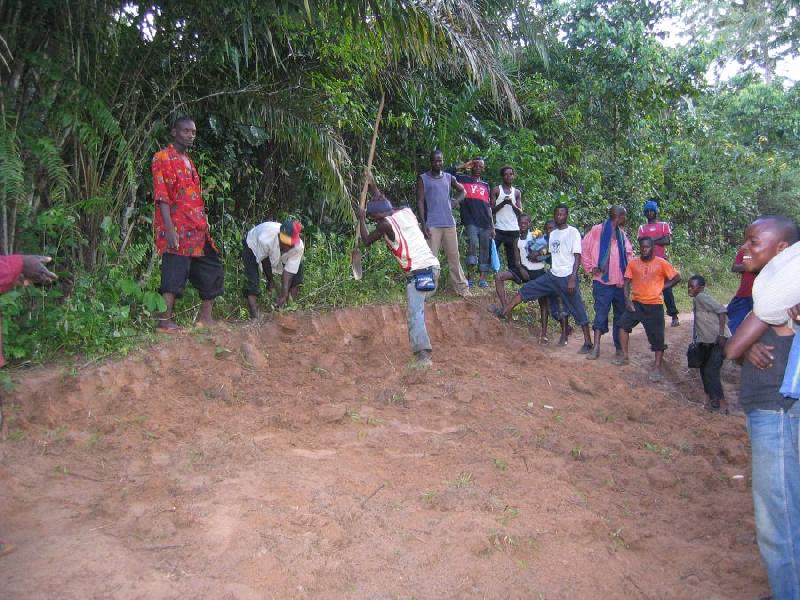
L'office des routes from Congo actually owes us a lot of money as we were reconstructing the roads!
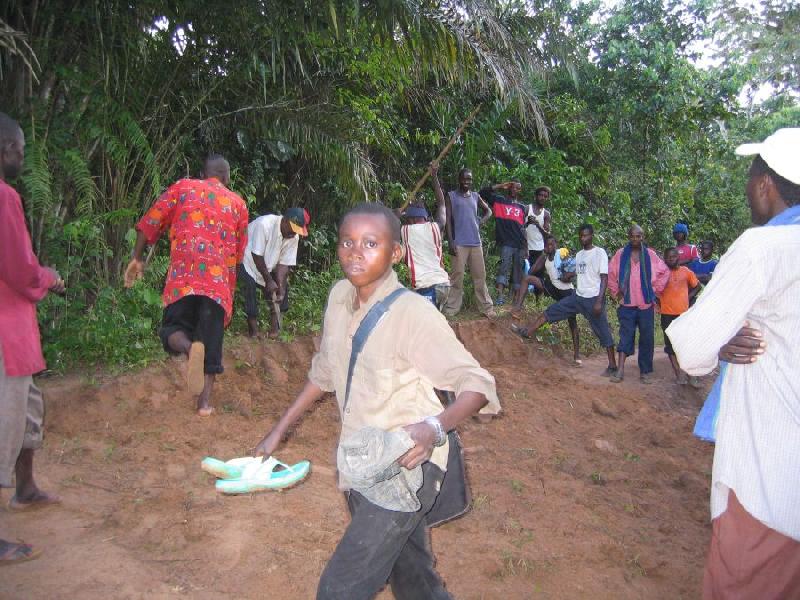
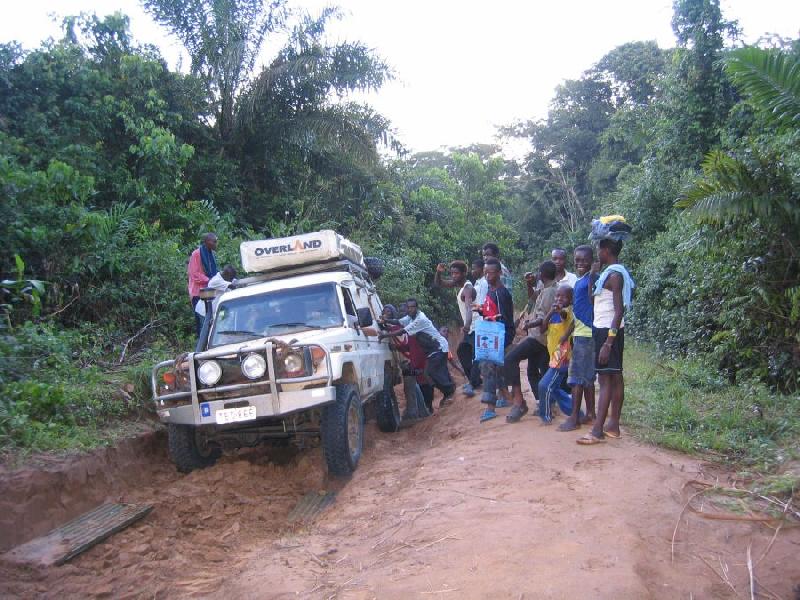
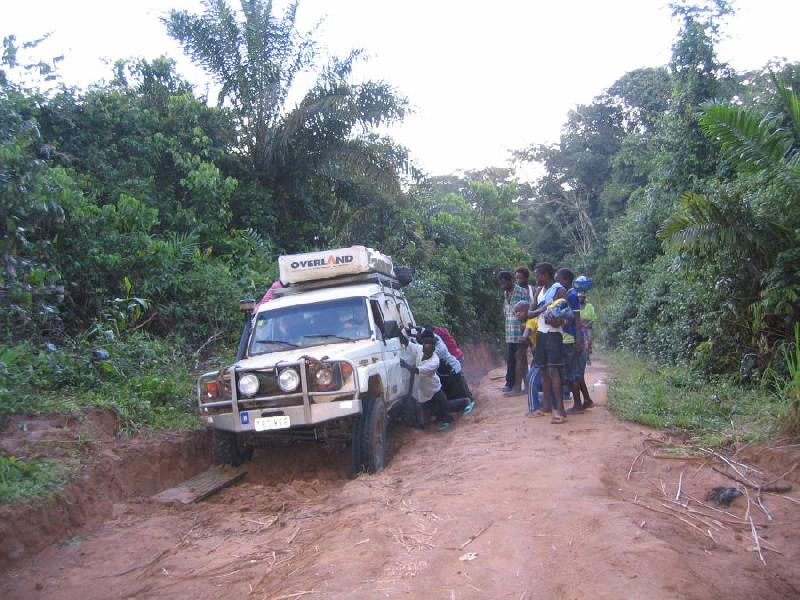
This was actually working rather well! My depression from earlier that day was already forgotten!
Imagine you are walking on the street, minding your own business. And some chap comes up and explains he has a problem. He asks you for help. You agree and travel with him to his destination. You have no idea who this guy is. You have no idea when you will go home again. You did not inform your family that you would probably not come home that night.
That is how we recruited Mufuta, Basil and Vita.
They were an energetic bunch and did their work with a lot of enthousiasm. Cheering and singing when we had gotten trough another 'obstacle'. They were proud of their task too, and explained it to all the people we passed. We often had a few extra helping hands.

L'office des routes from Congo actually owes us a lot of money as we were reconstructing the roads!



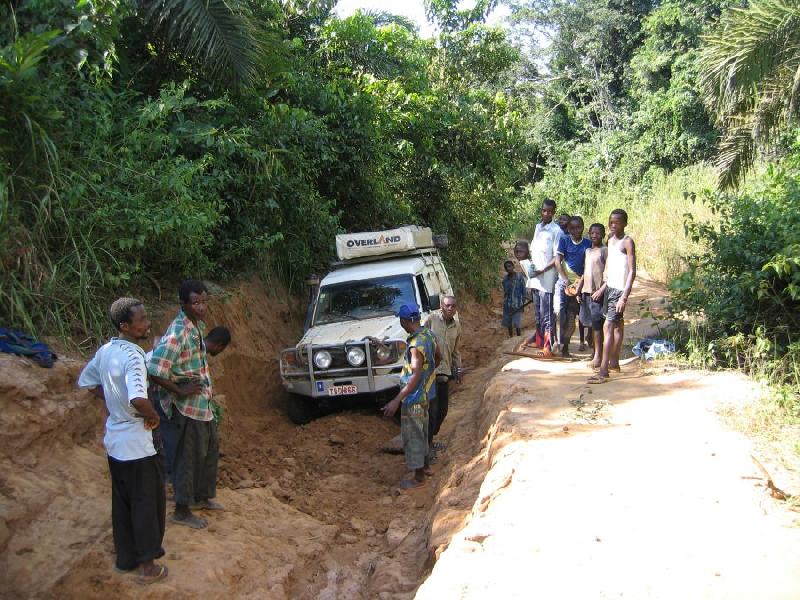
After a few hours, the enthousiasm wore off from our crew. They too started to realize that this was very though and slow going. The road hadn't improved either. Especially Basil, who was already a bit older, was getting tired. By the time we reached a looong hill we were barely moving again.
The group of people that was following us grew larger and larger. But they were not helping with the digging. They occasionally helped with the pushing. This was partly because of Mufuta, Basil and Vita had told them they alone were allowed to help. This to secure their fee. At least, that is what we guessed... they talked Lingala to eachother. We had also told them upfront that we would pay for 3 guys, not an entire village! We are not quite sure how, but after a while other people started helping. Did our 'crew' tell them they would share their fee? Or did they just help because they wanted to?
I don't know... but we could really need the help. We were running in the last hours of daylight again.
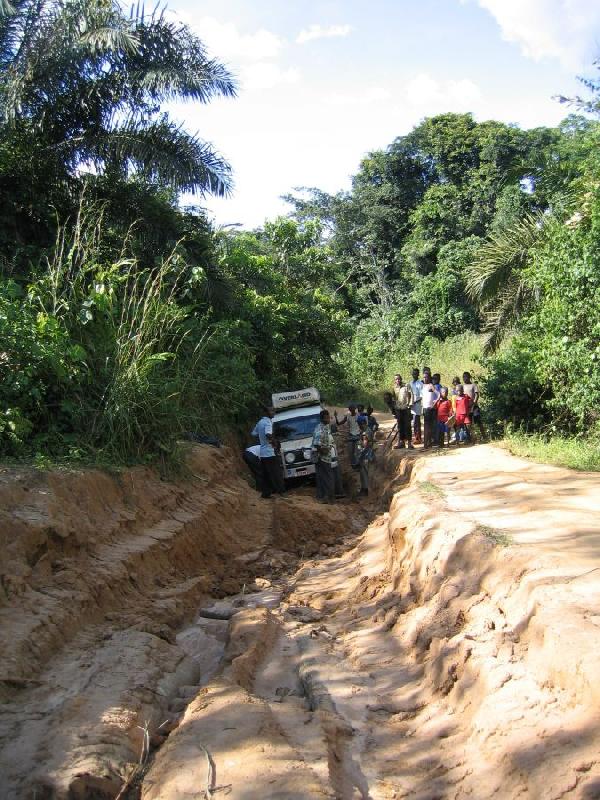
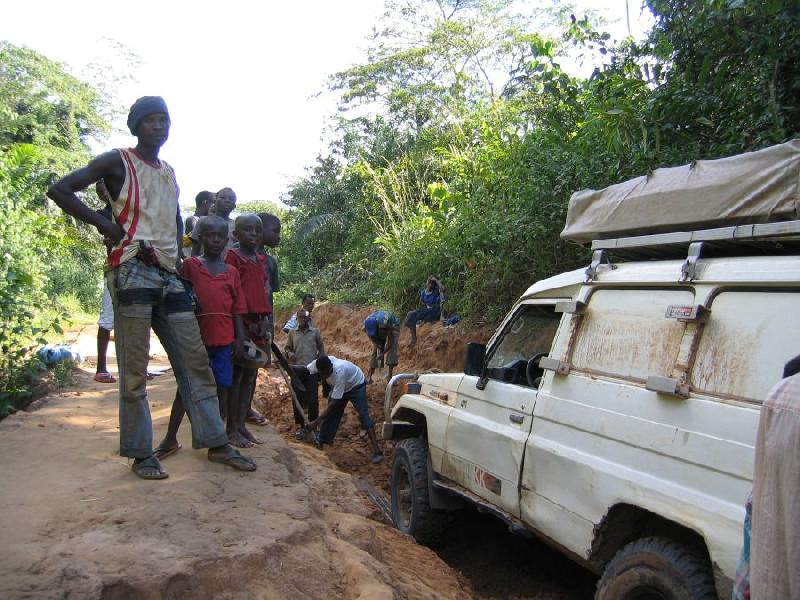
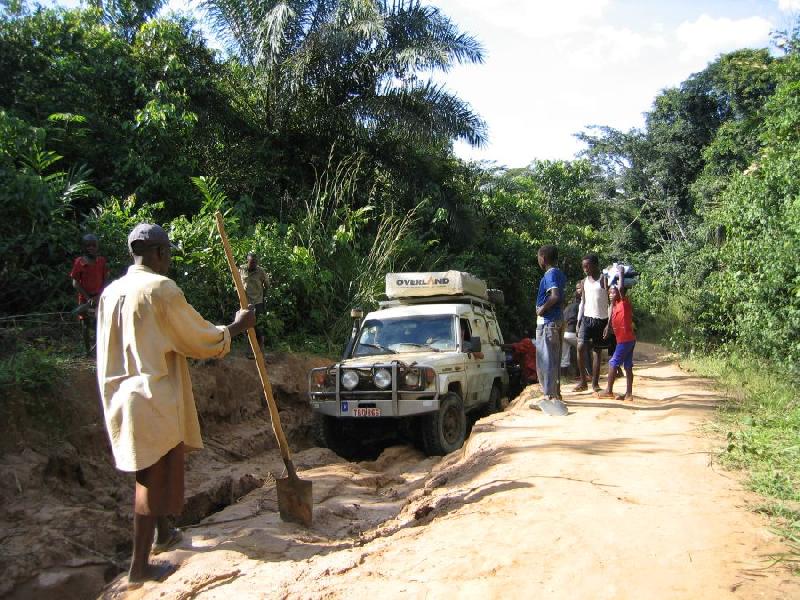
We had removed our spare wheels. This allowed more people to push.
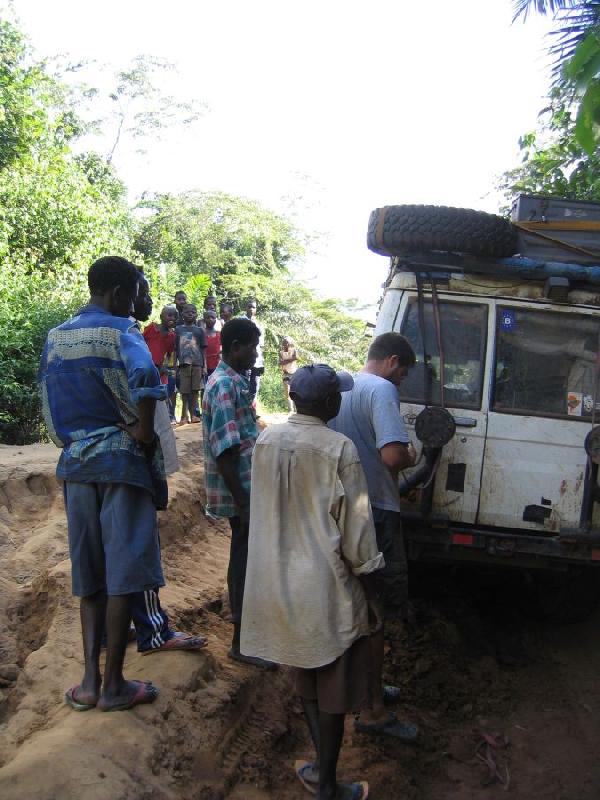
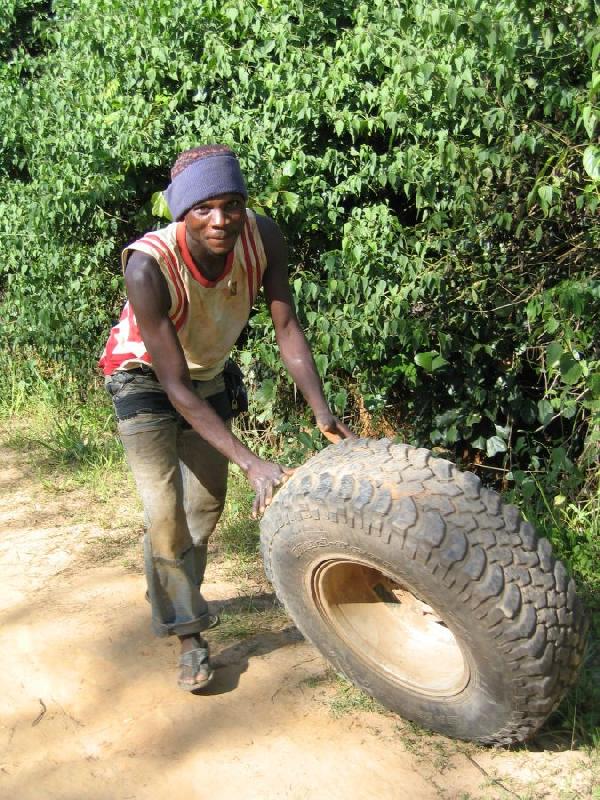
The later it got, the more people arrived. And the louder everybody got. Our 'crew' had by now grown to 20 something strong guys. they only had 3 shovels, but they worked in teams. And as soon a piece of road was 'ready' they all gathered behind our Landcruiser and pushed. They sang working songs to give the pace. People were clapping in their hands. Every 5 meter we progressed was a reason to celebrate. People cheered and dansed.
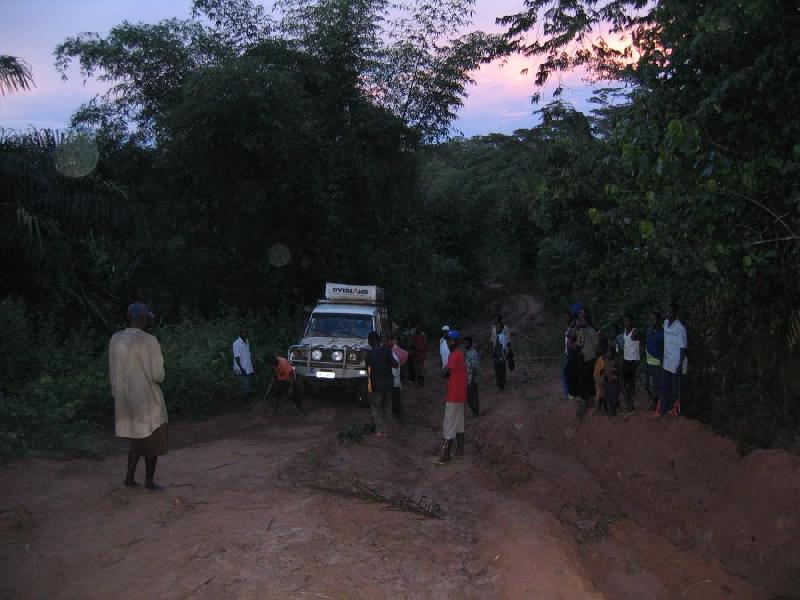
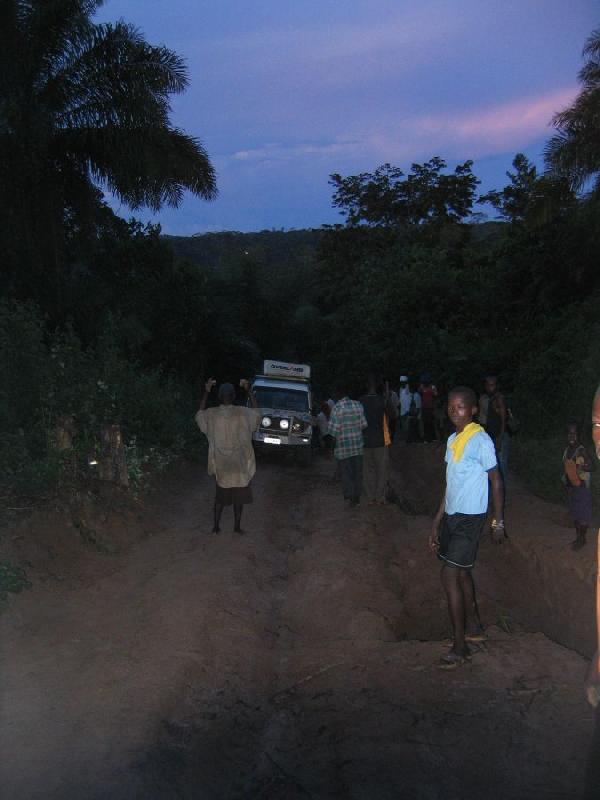
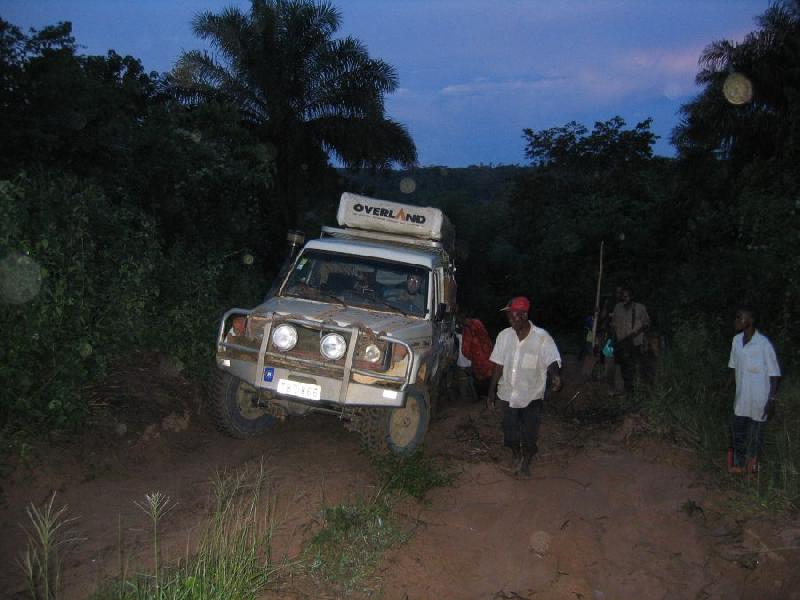
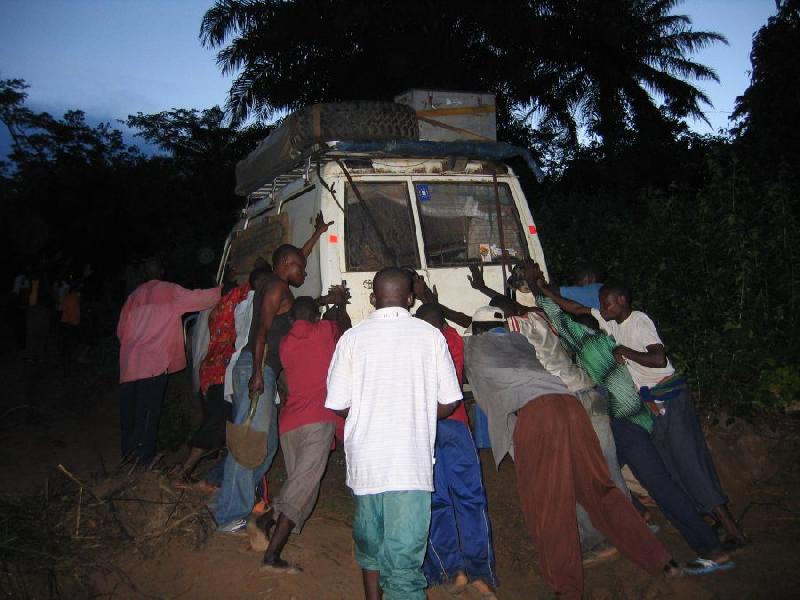


The later it got, the more people arrived. And the louder everybody got. Our 'crew' had by now grown to 20 something strong guys. they only had 3 shovels, but they worked in teams. And as soon a piece of road was 'ready' they all gathered behind our Landcruiser and pushed. They sang working songs to give the pace. People were clapping in their hands. Every 5 meter we progressed was a reason to celebrate. People cheered and dansed.




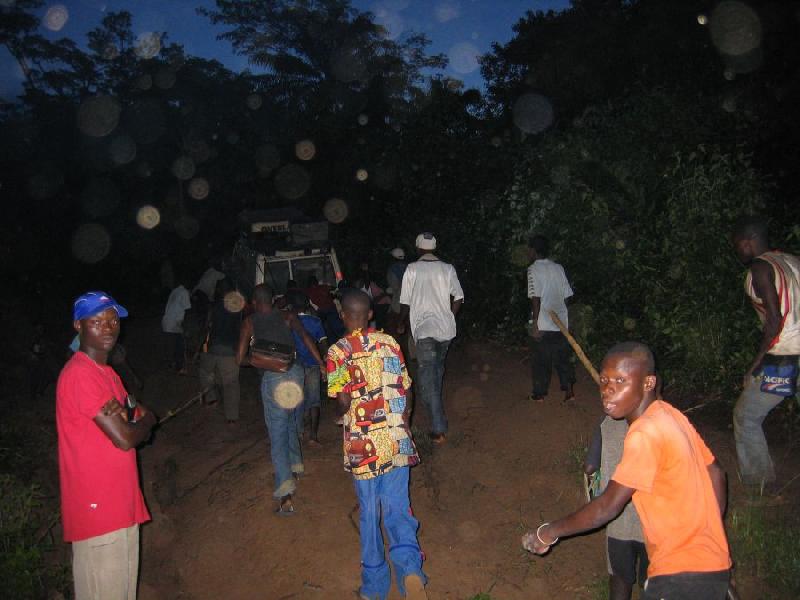
I cannot help myself from moving rythmically behind my keyboard whilst typing this when I think about the ambiance. You could see people going completely wild of excitement everytime we kicked up mud with our spinning tyres while slowly creeping forward. I could feel the trusts at the back of the car from the pushing people. This hill was steep and the ruts were bad. Most people helping us now were from the next village. They had a vision, they wanted to get us in their village for the night!
It was sometimes though, but they kept their - and our - spirits up.
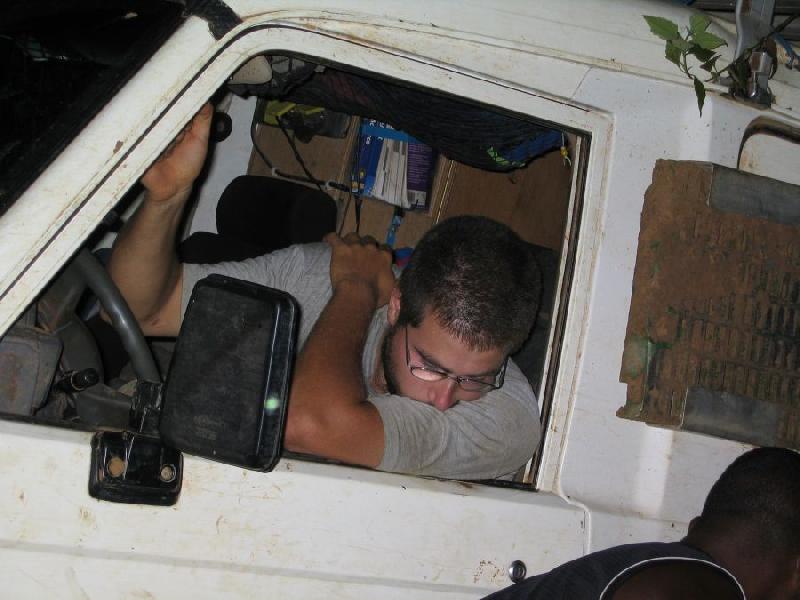
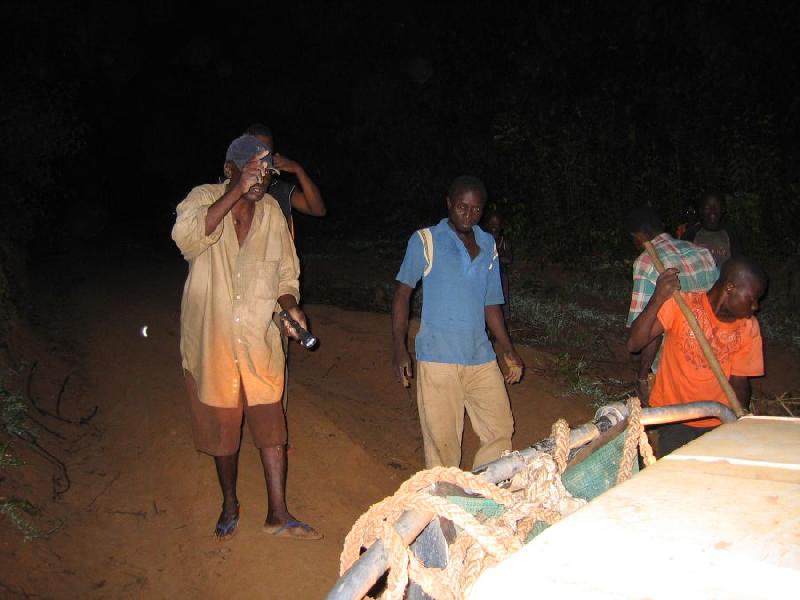
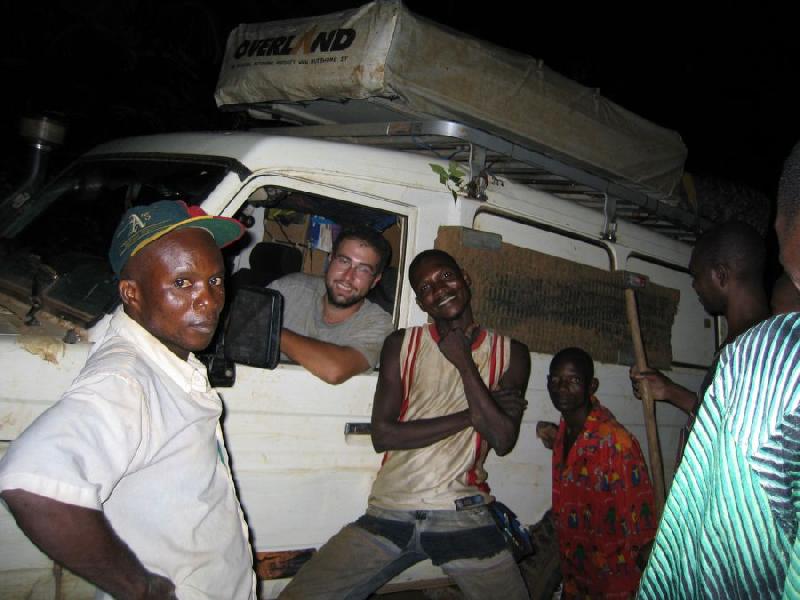
When we reached the top of the
hill everybody was going nuts. So were we! We couldn't believe we had
actually gotten up here with a broken rear axle. That was some seriosuly
difficult terrain!
It was a now few hundred meters downhill and people climbed on our roofrack and hung on our doors for the ride. We were too enthousiastic to say anything about it now.
We could stay next to Papa Likas's house. He was the guy who took the lead in the last climb. A somewhat older guy, and clearly one of the 'richer' people in the village. He might have lacked the degrees and the education, but we could tell he was a clever and wise man. We were offered two chairs (funny how this form of politeness exists everywhere in congo). They were very funny affairs, huge thrones made out of heavy wood. We felt like the king and the queen.
We were offered food - foufou and some fish - but we politely refused. It looked ok, but we did not want to risk getting ill now. We were too weak already (Josephine still had serious stomach problems). As usual we could see the people were actually happy that we did not eat, they didn't have too much.
Our supply of water was low again. The 20 liters that had cost me so much energy yesterday was almost gone. Very, very carefully we inquired if they had a water supply. There was indeed a source, but "c'est très loin" - "it is very far". When he says it is far, I believe him! They bring us a small supply of rainwater to freshen us up. We will have to ration our remaing water.
It struck me how difficult it is to get water here. People would have to walk hours and hours to reach a source. While at the same time the forest is so humid and sticky.
I checked the GPS. We had moved no more then 5km today. I had reached my limit today. Although I felt ok now, I could feel that I did not have any more reserves. Josephine was the hero of the day, without a doubt. But she was suffering from her stomach problems.
The village had become quiet again. Darkness had hidden the little huts in the forest. People could be seen, gathered around little fires. We saw a larger group of people gathered around hut. A strange kind of singing could be heard.. a very sad and mysterious sound. Papa Likas explained that a child was very ill and did not have long to live. People were praying. When asked what illness the child had, Papa Likas replied "On ne sait pas" - "We don't know". There are no doctors here. Another child from the same family died last month.
We had a great evening with dancing and singing and all looked good and fine. And then Congo slaps us in the face again with its hard reality.
It was a now few hundred meters downhill and people climbed on our roofrack and hung on our doors for the ride. We were too enthousiastic to say anything about it now.
We could stay next to Papa Likas's house. He was the guy who took the lead in the last climb. A somewhat older guy, and clearly one of the 'richer' people in the village. He might have lacked the degrees and the education, but we could tell he was a clever and wise man. We were offered two chairs (funny how this form of politeness exists everywhere in congo). They were very funny affairs, huge thrones made out of heavy wood. We felt like the king and the queen.
We were offered food - foufou and some fish - but we politely refused. It looked ok, but we did not want to risk getting ill now. We were too weak already (Josephine still had serious stomach problems). As usual we could see the people were actually happy that we did not eat, they didn't have too much.
Our supply of water was low again. The 20 liters that had cost me so much energy yesterday was almost gone. Very, very carefully we inquired if they had a water supply. There was indeed a source, but "c'est très loin" - "it is very far". When he says it is far, I believe him! They bring us a small supply of rainwater to freshen us up. We will have to ration our remaing water.
It struck me how difficult it is to get water here. People would have to walk hours and hours to reach a source. While at the same time the forest is so humid and sticky.
I checked the GPS. We had moved no more then 5km today. I had reached my limit today. Although I felt ok now, I could feel that I did not have any more reserves. Josephine was the hero of the day, without a doubt. But she was suffering from her stomach problems.
The village had become quiet again. Darkness had hidden the little huts in the forest. People could be seen, gathered around little fires. We saw a larger group of people gathered around hut. A strange kind of singing could be heard.. a very sad and mysterious sound. Papa Likas explained that a child was very ill and did not have long to live. People were praying. When asked what illness the child had, Papa Likas replied "On ne sait pas" - "We don't know". There are no doctors here. Another child from the same family died last month.
We had a great evening with dancing and singing and all looked good and fine. And then Congo slaps us in the face again with its hard reality.
Progress
after day 23 on the road. Day 28 since we entered DRC. I did not bother
trying to add our progress on the map. The scale of the map does not
allow for such small markings :roll:


No, it was a minor heatstroke combined with fatigue. I felt really bad for a few hours, but quickly recovered. Adrenaline is a good medicine ;-) Until then I had a seemingly neverending strength and endurance. I lost it then, I got tired very quickly from physical work from that moment on. But nothing permanent.
Having it whilst riding a bike must be a very scary experience!
Day 24
I really had to force myself out of our tent that morning, despite the noise off the village. My muscles hurt and my eyes preferred to stay closed.
Mufuta, Vita and papa Basil had returned to their own village for the night, but they would come back. We sat down with papa Likas. He offered his help and we gave him the same explenation we gave earlier to the first members of our crew. He agreed with the conditions. He suggested we 'hire' 5 extra guys, including him, from his village. We knew we needed that kind of manpower to push 4 ton of Toyota trough the jungle. They would join us until we reach Kapia. Apparantely the road there is much better and we would be able to drive on our own to Dibaya-Lubwe from there.
Papa likas made a drawing of how the road went all the way to Kapia. The first few kilometer would be slightly downhill until we reached a river. From there the road was uphill all the way to Kapia. The first part of the hill would be the hardest as this was in a forest with the usual ruts. Halfway to the top the road leaves the forest and we would be in much easier savannah.
"Nous allons y arriver avant midi!" - "we will get there (Kapia) before noon"
As soon as Mufuta, Basil and Vita arrived we were on the road again. Our batteries were now officially dead so we needed a push to get started. It was key not to turn of the engine now! Our crew loved the raw sound of our broken exhaust!
We advanced quickly. Our crew was hanging on the sides of the car while two guys were walking in front, making quick improvements along the way. The way we progressed our first few hundred meters made mea actually believe we would make it to Kapie before noon! We must be the two most naive people in the world!
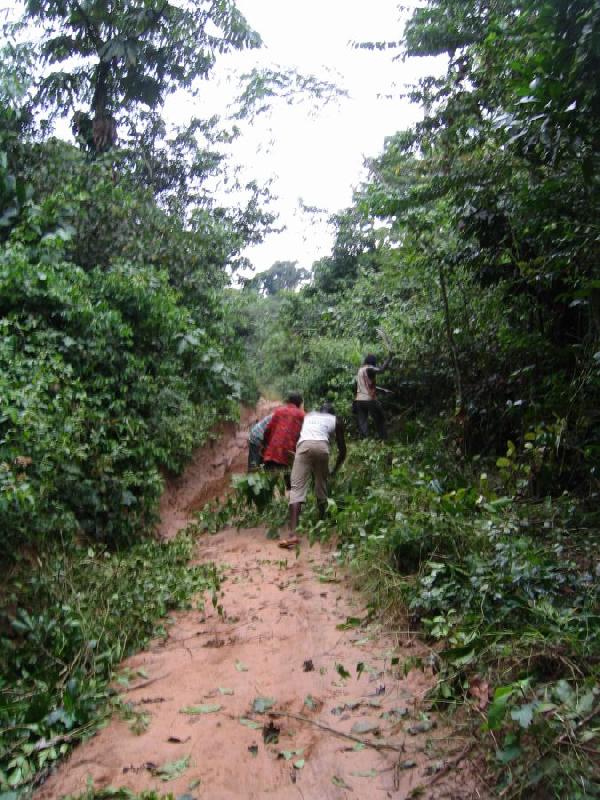
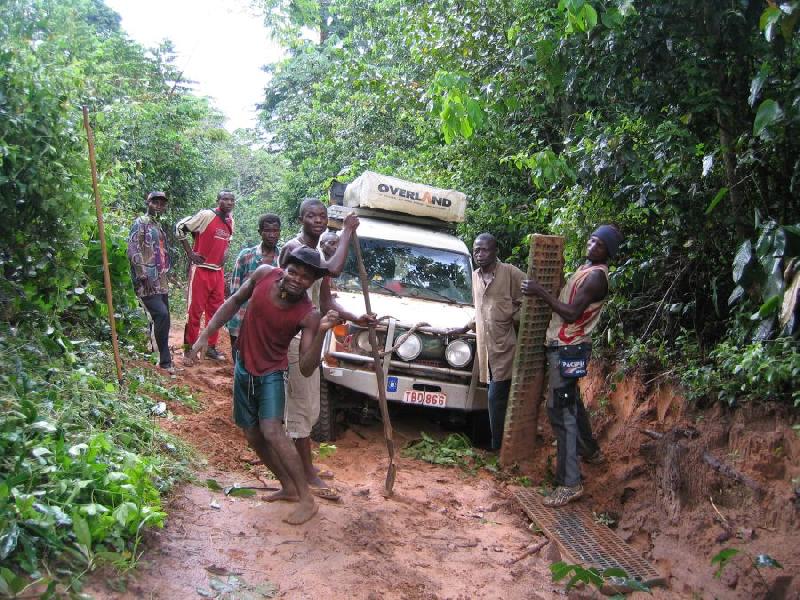
It had been a while since we saw serious rain. Frequent showers yes, but not cloud bursts. Until now. Just when we arrived at the river in the bottom of the valley fat raindrops were falling from the sky. This usually means trouble. Our crew searched for cover in the forest while we sat in our car whilst a could emptied itself violently right on top of us. We could see the mostly dry road transform in a muddy stream. The hard compressed mud was gleaming.
I really had to force myself out of our tent that morning, despite the noise off the village. My muscles hurt and my eyes preferred to stay closed.
Mufuta, Vita and papa Basil had returned to their own village for the night, but they would come back. We sat down with papa Likas. He offered his help and we gave him the same explenation we gave earlier to the first members of our crew. He agreed with the conditions. He suggested we 'hire' 5 extra guys, including him, from his village. We knew we needed that kind of manpower to push 4 ton of Toyota trough the jungle. They would join us until we reach Kapia. Apparantely the road there is much better and we would be able to drive on our own to Dibaya-Lubwe from there.
Papa likas made a drawing of how the road went all the way to Kapia. The first few kilometer would be slightly downhill until we reached a river. From there the road was uphill all the way to Kapia. The first part of the hill would be the hardest as this was in a forest with the usual ruts. Halfway to the top the road leaves the forest and we would be in much easier savannah.
"Nous allons y arriver avant midi!" - "we will get there (Kapia) before noon"
As soon as Mufuta, Basil and Vita arrived we were on the road again. Our batteries were now officially dead so we needed a push to get started. It was key not to turn of the engine now! Our crew loved the raw sound of our broken exhaust!
We advanced quickly. Our crew was hanging on the sides of the car while two guys were walking in front, making quick improvements along the way. The way we progressed our first few hundred meters made mea actually believe we would make it to Kapie before noon! We must be the two most naive people in the world!


It had been a while since we saw serious rain. Frequent showers yes, but not cloud bursts. Until now. Just when we arrived at the river in the bottom of the valley fat raindrops were falling from the sky. This usually means trouble. Our crew searched for cover in the forest while we sat in our car whilst a could emptied itself violently right on top of us. We could see the mostly dry road transform in a muddy stream. The hard compressed mud was gleaming.
(This post is not part of the report)
I just read the latest UN report on human development (http://hdr.undp.org/en/). It's interesting:
Source: http://www.bbc.co.uk/news/world-11694599
I just read the latest UN report on human development (http://hdr.undp.org/en/). It's interesting:
UN - Human Development Report 2010 said:
And it is not like it was going that well with DRC in 1970 :-(UN - Human Development Report 2010 said:
Source: http://www.bbc.co.uk/news/world-11694599
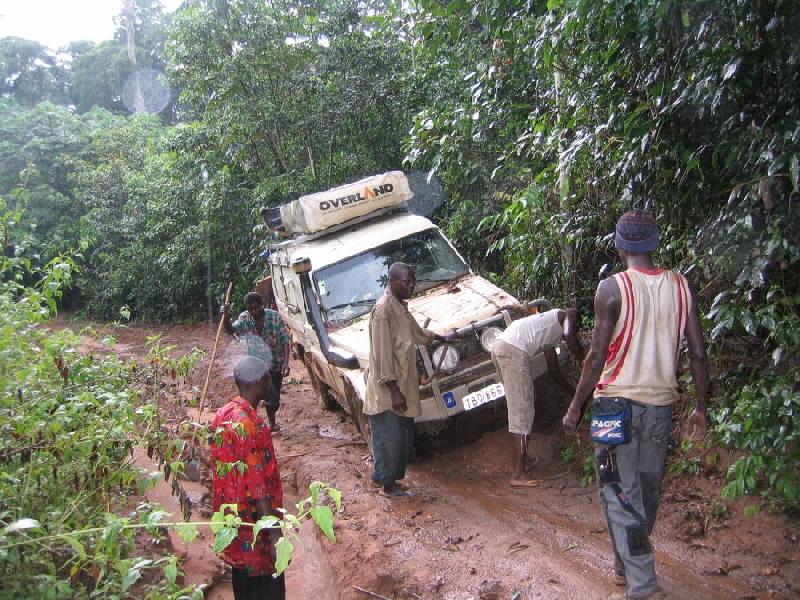
This rain couldn't have come in a worse time. The road was now extra slippery and we already struggled so much with grip - or the lack thereof. Our crew worked hard to construct a road that would provide us an as level as possible path with as much grip as possible. It took a huge amount of energy for every meter we worked ourselves forward.
We could see our crew was losing its motivation and we feared that they would just give up or demand more money. It was Josephine that discovered the magic of our camera. These guys loved the camera! Everytime the camera came out they posed and they work like crazy to look cool on the pictures.
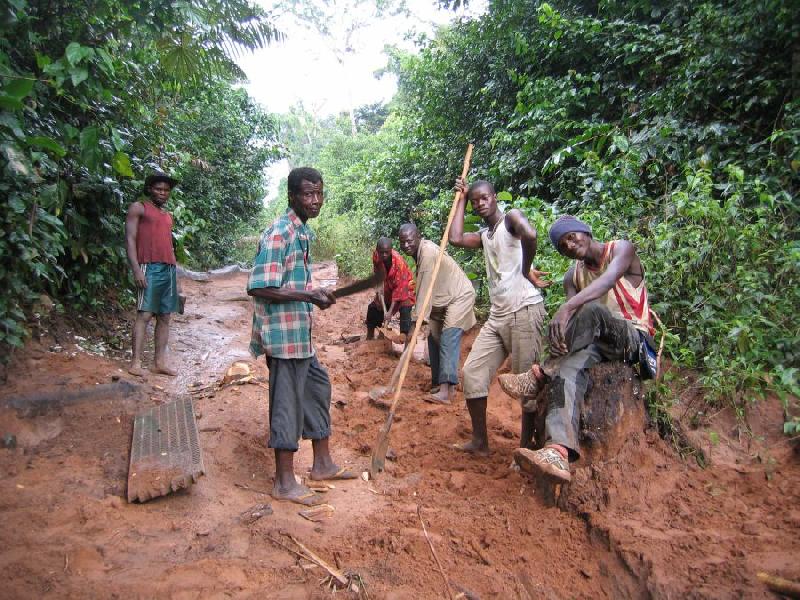
I stalled the engine. I felt really bad about it as they could not pushstart us uphill. Only downhill. I let the Landcruiser roll backwards for a few meters and it still wouldn't start. The lost few meters would cost us hours to get up again. I did not want to go backwards any longer. So while our crew continued clearing the road, I started to get our auxiliary batteries out again.
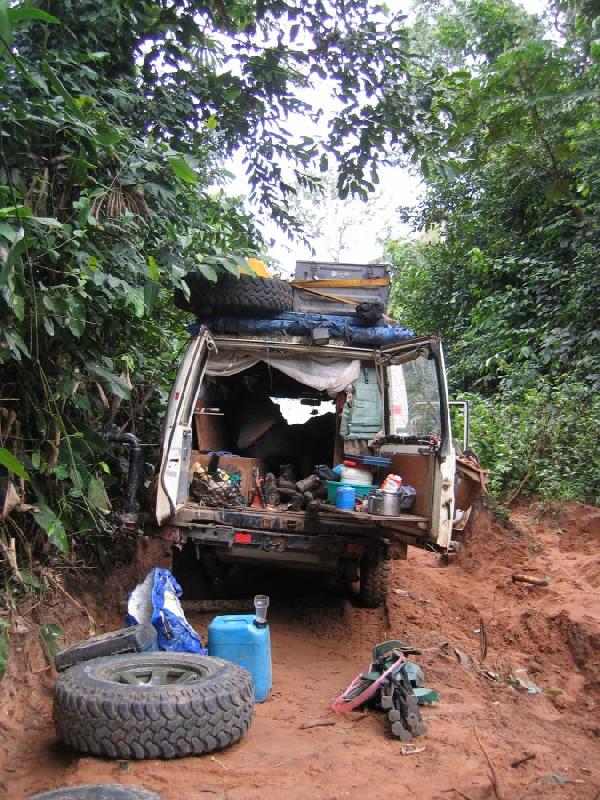
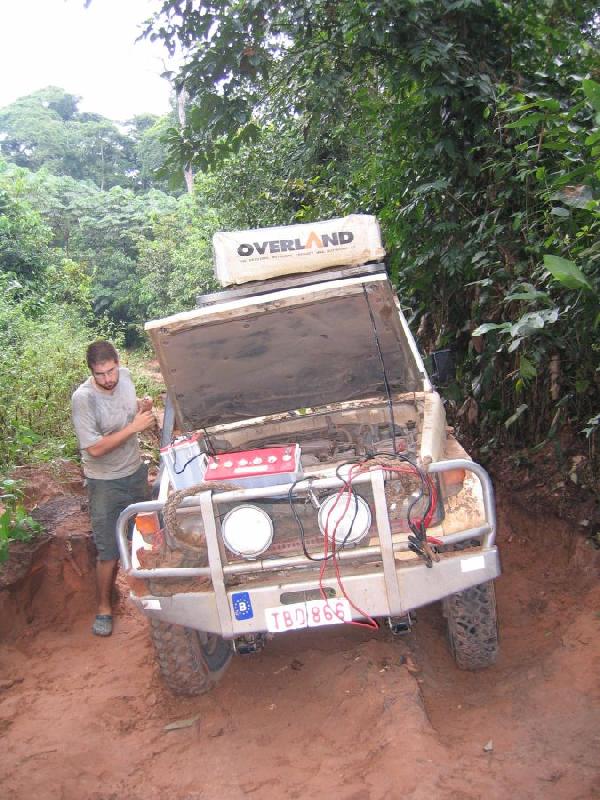
Everything was just so hard now. Getting the engine started again had cost us an hour. The original enthousiasm was completely gone, we were moving forward at a rate of a meter per hour. The hill was about 700meters long.
We stopped progressing at all when we had to go trough a small detour around a tree. It was small but steep incline.
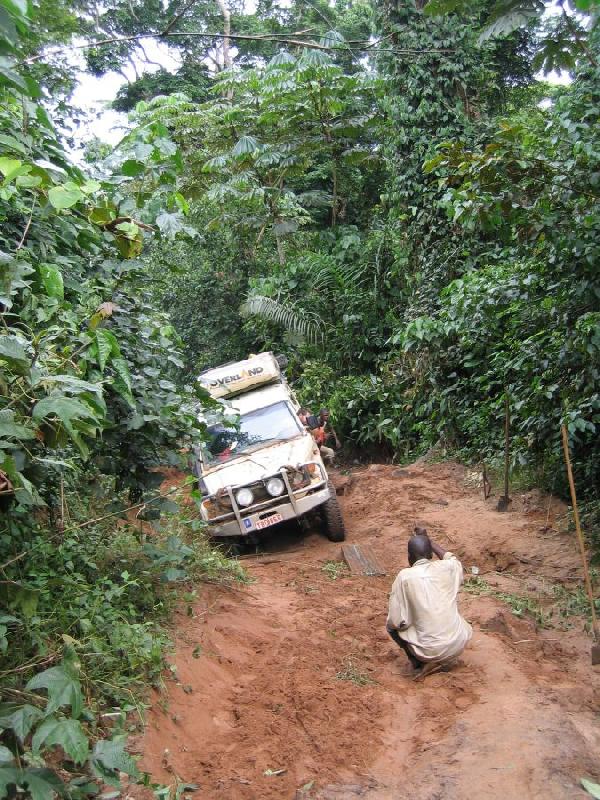
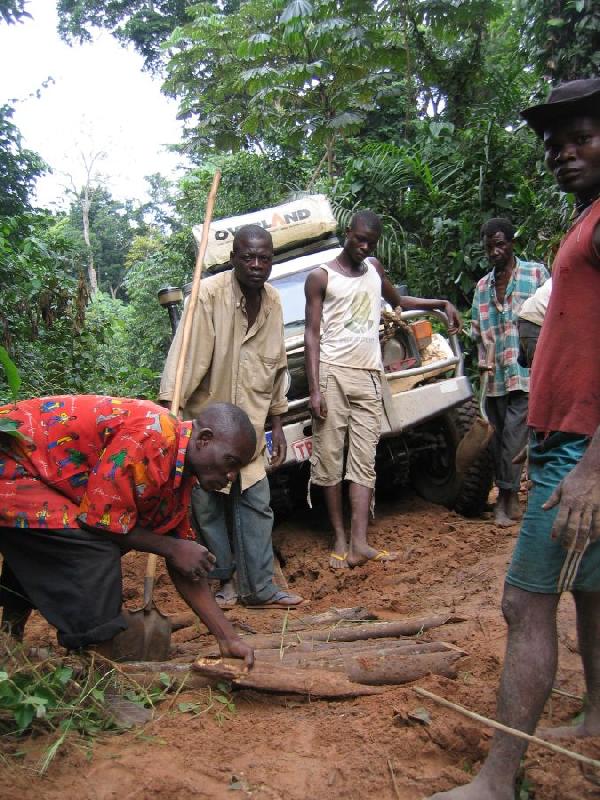
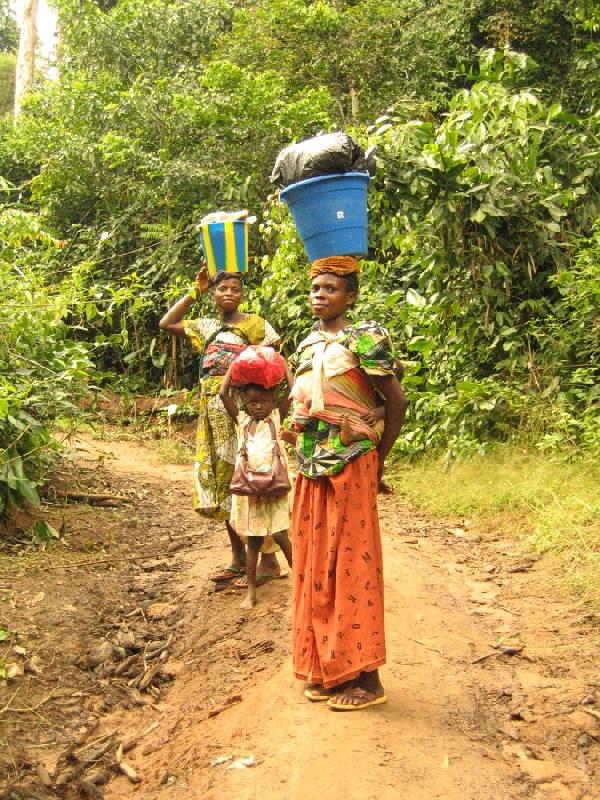
With the rain also came the little moisture flies. Millions of them. tiny little flies. They favoured our eyes and ears and loved our nose. Annoying little thingies!
We tried everything to make the road better in order toget us up this little hill. We had at least 10 attempts to climb it, but it just didn't work.
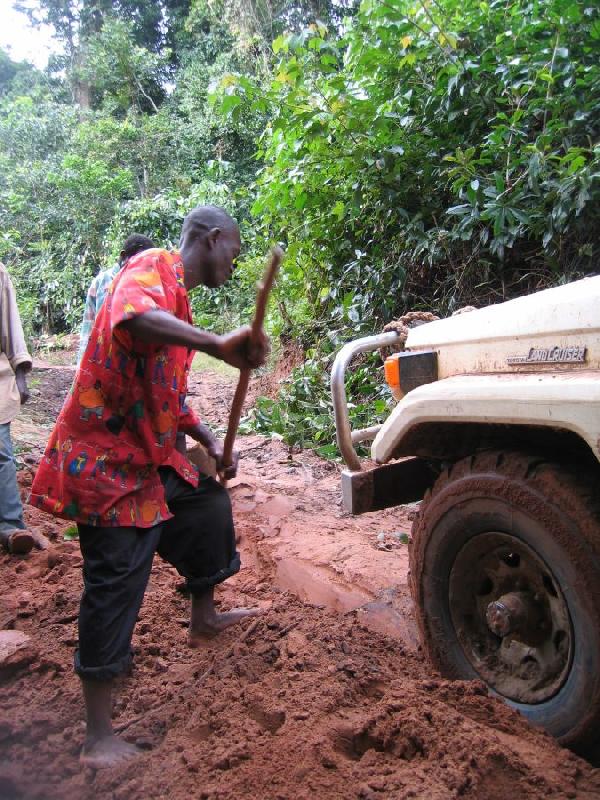
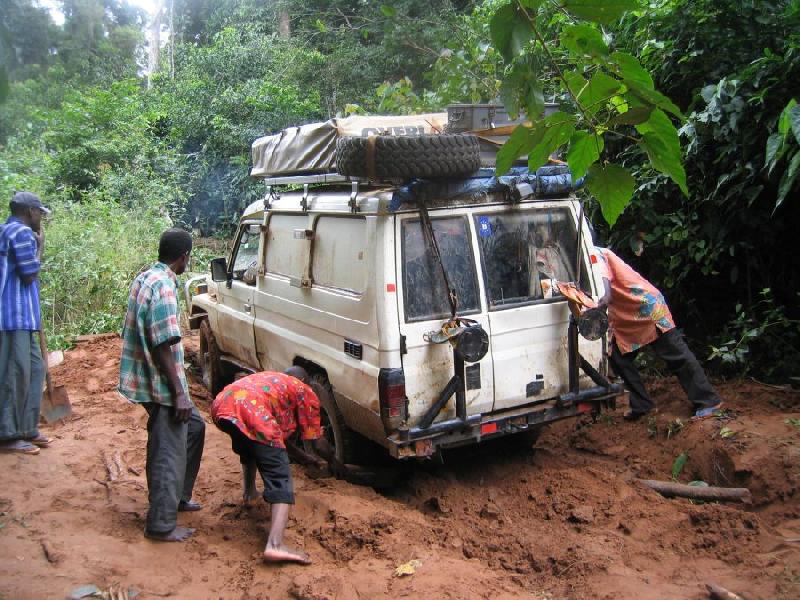
Since we left the village early this morning we had covered 4 kilometer. Of which the first 3,8km were done in the first two hours. The rest of the day we spent on this hill. The last 3 hours we hadn't moved at all.
Darkness was setting in again, we weren't going anywhere today..
The crew wanted to return to their village for the night. We would be camping here. Just when our guys wanted to leave the news came that the sick child in the last village had died. A messenger was sent to the surrounding villages. This meant a lot of people would want to visit the family of the kid, so there will be a lot of traffic on the roads that night. A creepy thought to be camping spot in the middle of this situation, all alone on the Congolese jungle.
Kapia became a mythic place for us. Our own Atlantis. The hidden city that nobody knew where it was. We started having our doubts if we would ever get our car out of this jungle again. Tomorrow is another day..
We opened our tent in the place where we were stuck. All the batteries from our flashlights were empty (from last nights rythmic struggle) so we helped ourselves with a candle. The rainforest was insanely loud and peaceful at the same time. I would have loved this place otherwise, but it was hard to forget in what kind of trouble we were.
Progress after day 24... Day 29 since we entered Congo.
None at all really... Camping in the jungle

None at all really... Camping in the jungle

Day 25
Our 30th day since we entered Congo. That needs to be celebrated! But not with any drinking. We are out of drinking water. It had rained a lot that night and our tent was still leaking.
We had given an emtpy water jerrycan with papa Likas last night and he said he'd return with a full one today. But what we were mostly looking out for was that tirfor he was talking about. They knew, that a guy in their village used to have a tirfor, but they had not seen it in the last years. Likas would try to trace it down.
We were delighted to see our crew again, not only with a full jerrycan of water, but also with a tirfor! But it didn't come for free.. :roll: The owner wanted 50$US to 'rent' the tirfor. This was an odd situation as we did not agree with that price, but the owners was not here to discuss it with him. We decided we would be wanting to spend 15$US - which is a lot of money! - and papa Likas thought that the owner would agree with that.
I had already taken the auxiliary batteries out again early in the morning, so we could immediately start the engine and try to finally get out of this pit!
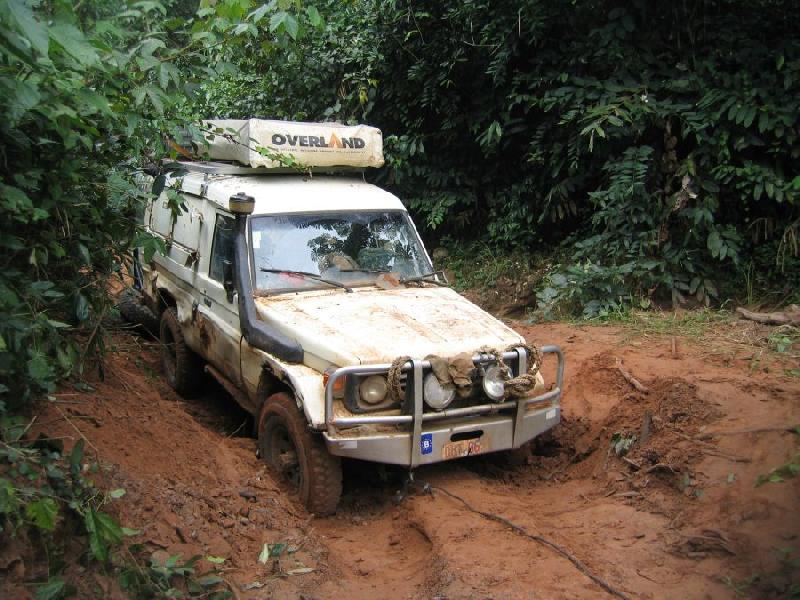
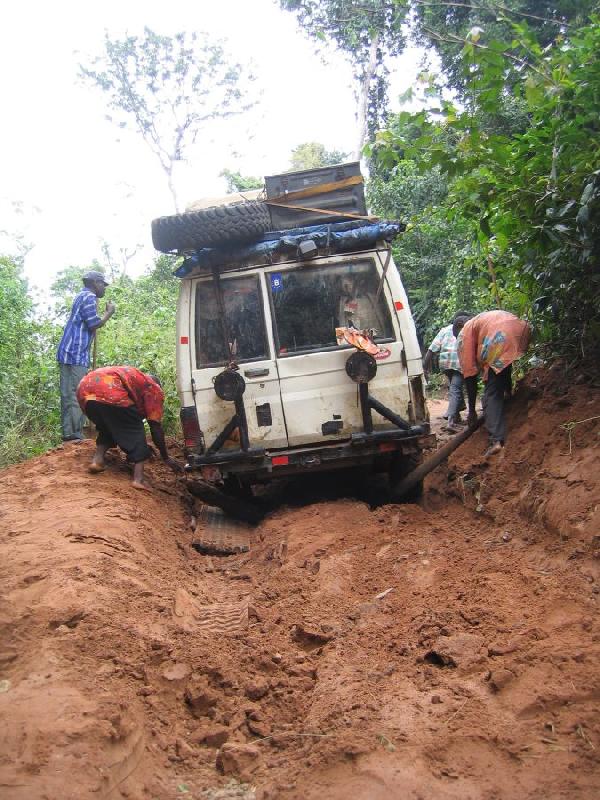
It worked!! This was a big morale booster. A booster we desperately needed!
Likas and Mufuta were delighted too
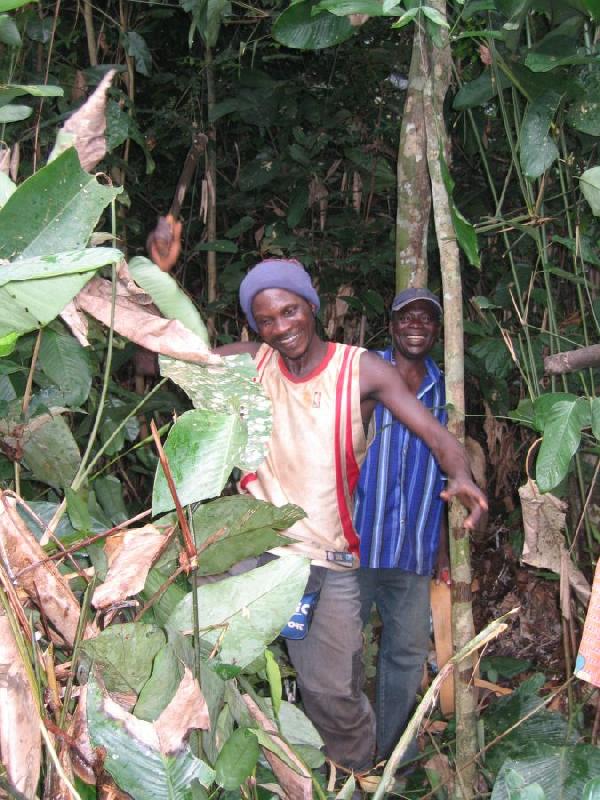
Our 30th day since we entered Congo. That needs to be celebrated! But not with any drinking. We are out of drinking water. It had rained a lot that night and our tent was still leaking.
We had given an emtpy water jerrycan with papa Likas last night and he said he'd return with a full one today. But what we were mostly looking out for was that tirfor he was talking about. They knew, that a guy in their village used to have a tirfor, but they had not seen it in the last years. Likas would try to trace it down.
We were delighted to see our crew again, not only with a full jerrycan of water, but also with a tirfor! But it didn't come for free.. :roll: The owner wanted 50$US to 'rent' the tirfor. This was an odd situation as we did not agree with that price, but the owners was not here to discuss it with him. We decided we would be wanting to spend 15$US - which is a lot of money! - and papa Likas thought that the owner would agree with that.
I had already taken the auxiliary batteries out again early in the morning, so we could immediately start the engine and try to finally get out of this pit!


It worked!! This was a big morale booster. A booster we desperately needed!
Likas and Mufuta were delighted too

Centimeter after centimer we
creeped forward. This was faster moving then what we managed yesterday!
Even if it was going so slowly, the psychological effect cannot be
underestimated. The previous days we would be be digging for hours after
which we blasted forward for 50 meters and then had to start digging
again. That is pretty depressing.
But now we were constantly moving, incredibly slow, but every 5 minutes you could see progress was being made.
It was hard work though. Our crew did a great job!
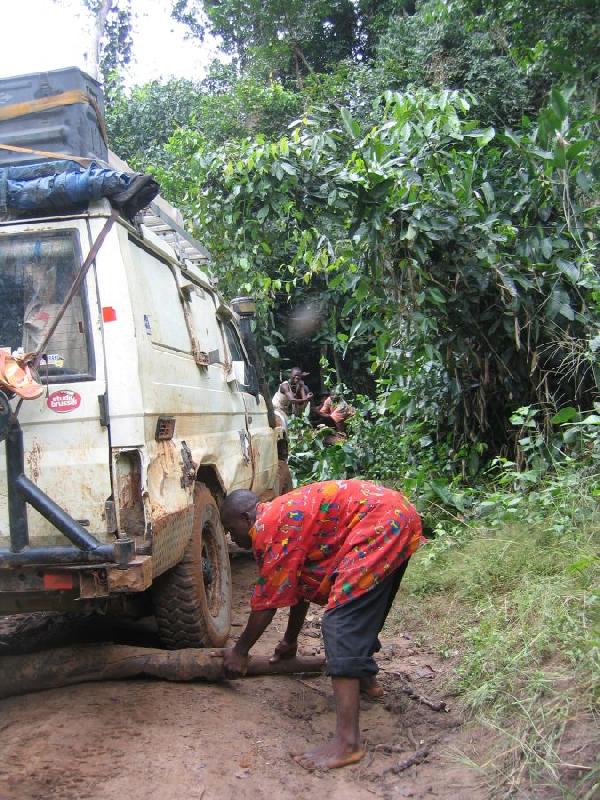
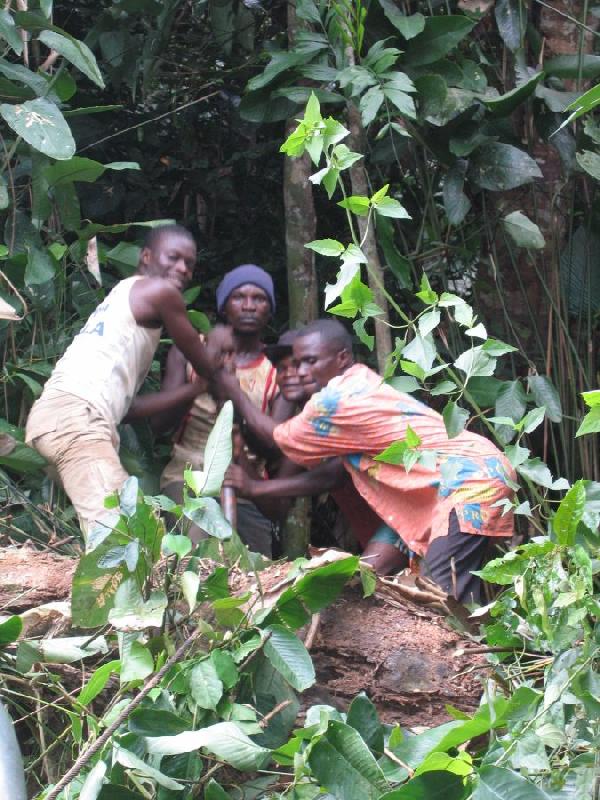
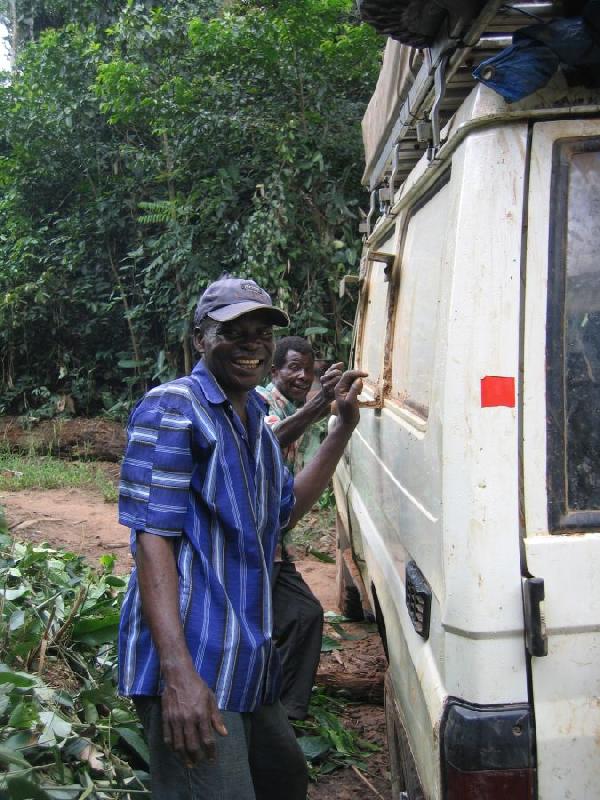
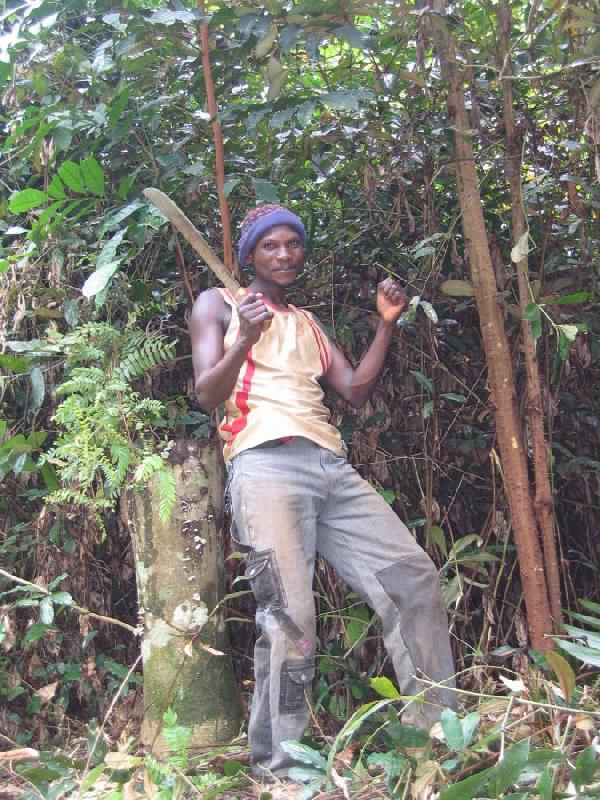
But now we were constantly moving, incredibly slow, but every 5 minutes you could see progress was being made.
It was hard work though. Our crew did a great job!




Because of our involvement with
our 'crew' we did not have too much trouble with the begging here. Apart
from that I believe we had been very lucky to break down here.
:scratch:
Let's rephrase that last sentence: "We could have broken down in a much worse region then this, people were generally nice around here."
By now we had become part of the road. Early in the morning we had the kids that passed trough. They were very curious but they could not stay long as they had to go to school. You could see the dilemma on their faces, every fibre of their body wanted to stay around and check out these white guys, but they would get into serious trouble if they did not show up in school!
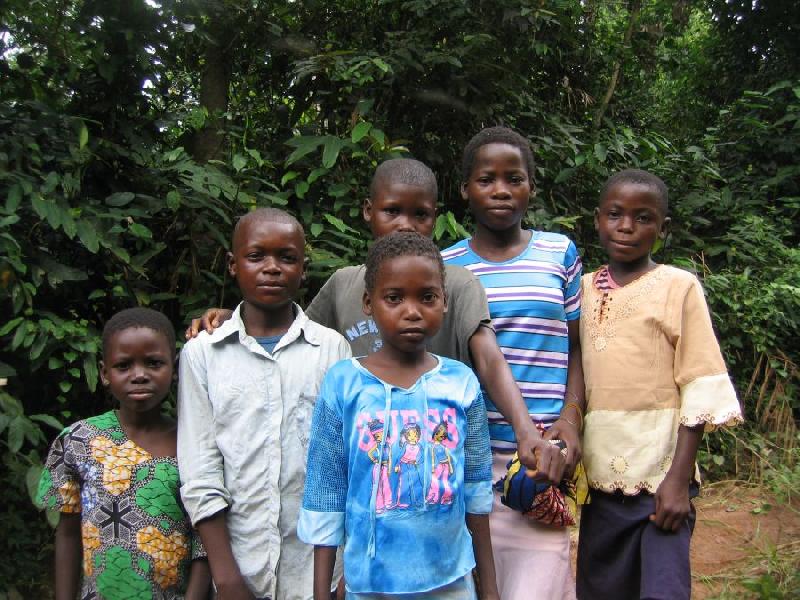
We felt sorry for the bike transporters that had to pass trough here. They had such a hard task at hands already, and then we created an extra obstacle by blocking the road with out truck.
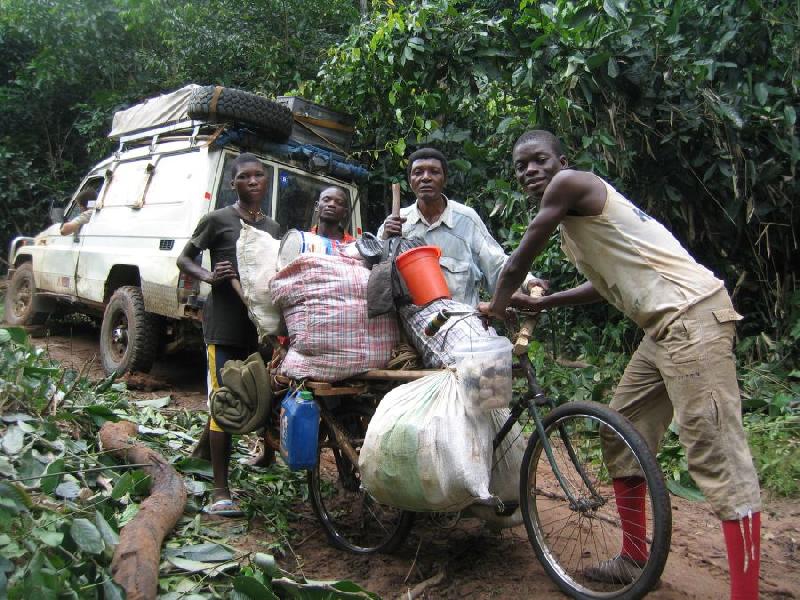
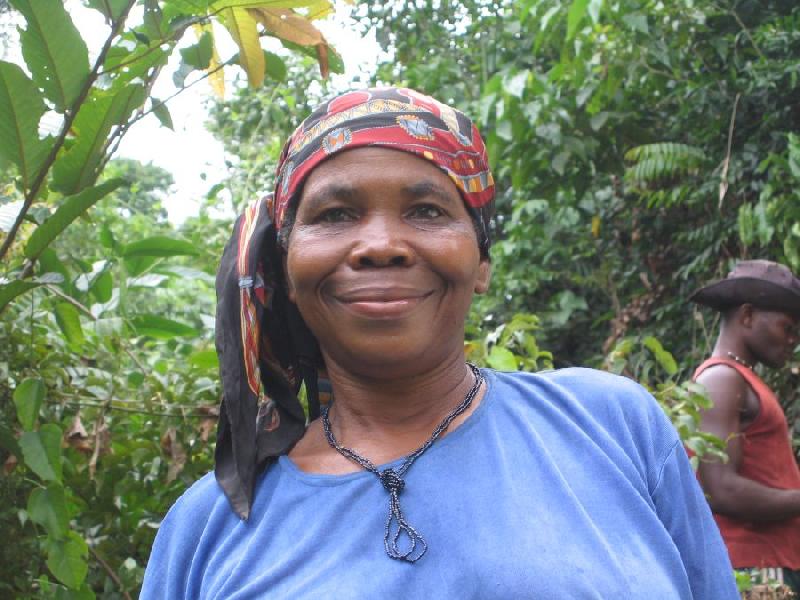
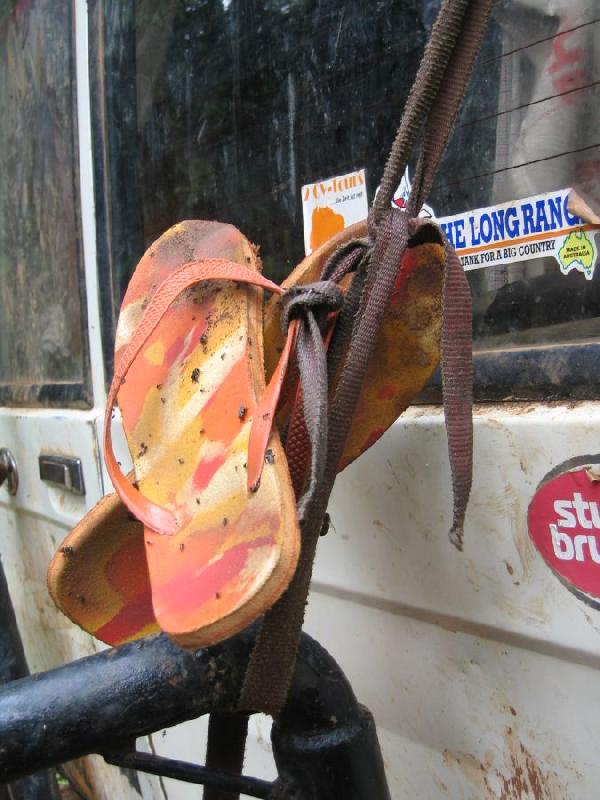
:scratch:
Let's rephrase that last sentence: "We could have broken down in a much worse region then this, people were generally nice around here."
By now we had become part of the road. Early in the morning we had the kids that passed trough. They were very curious but they could not stay long as they had to go to school. You could see the dilemma on their faces, every fibre of their body wanted to stay around and check out these white guys, but they would get into serious trouble if they did not show up in school!

We felt sorry for the bike transporters that had to pass trough here. They had such a hard task at hands already, and then we created an extra obstacle by blocking the road with out truck.



After the little detour there
was a short level piece of track before going steep uphil again. I took
as much run-up as possible and launched myself up the hill. This won us
20 meters or so.
Josephine: "What was that noise?"
Me: "What noise?"
Josephine: "That tak-tak noise?"
Me: "Don't know"
I had heard the noise too but I did not want to think or worry about it. Not now.
The road was too steep to even attempt driving up with our front axle alone. We would use the tirfor for the remaining 500m. The length of the cable gave us about 10meter of progress with each go. Then the tirfor had to be released and a new tree had to be found to continue. 500 meters. 10 meter at a time. Everybody knew this was going to be a big job. But once we would make it open we would be out of the forest and onto the savannah, were it would be possible to drive on our own steam again. That was a big motivation.
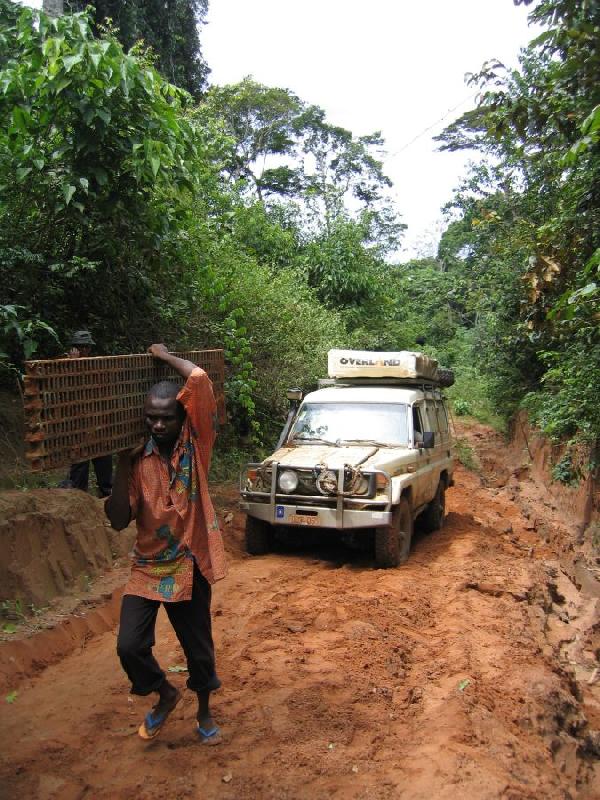
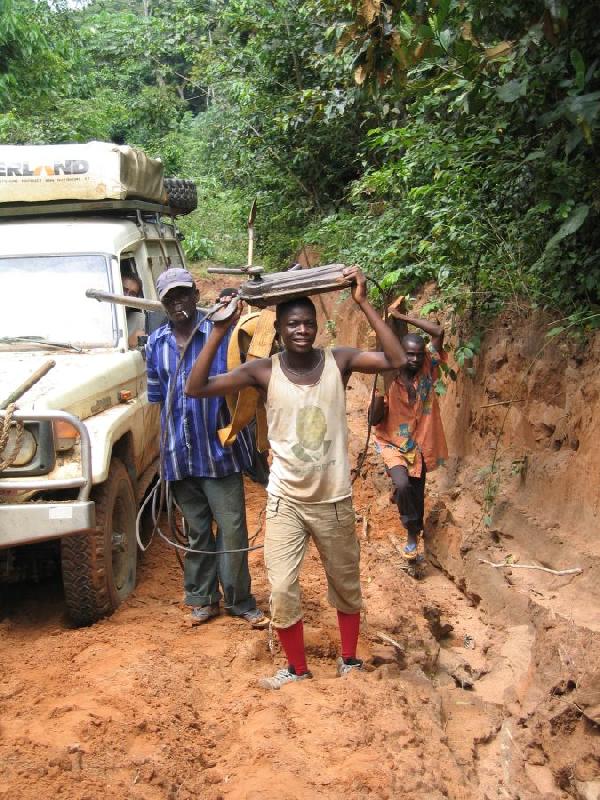
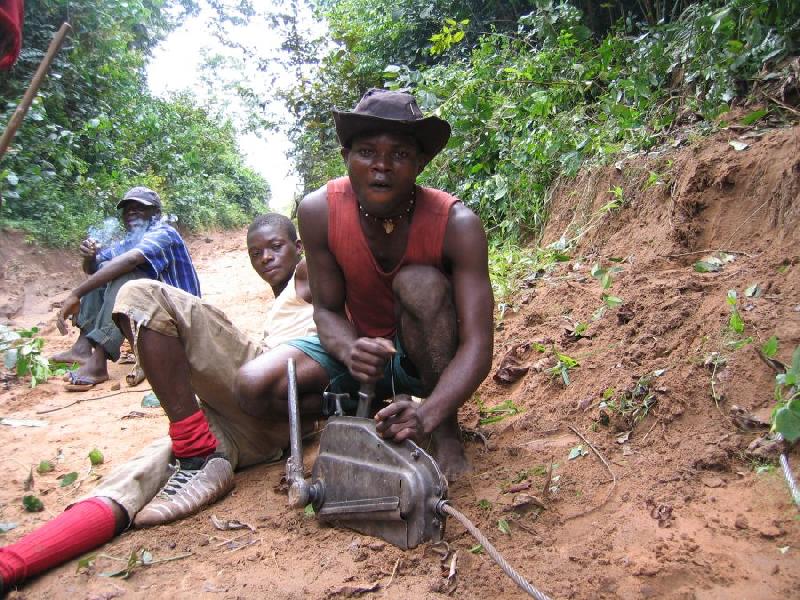
My respect for these guys is endless. It is incredible how they could manage such hard labour for hours on end. If the motivation got low, the camera always cheered them up again. They barely eat or drink. At this rate I would have died already... twice.
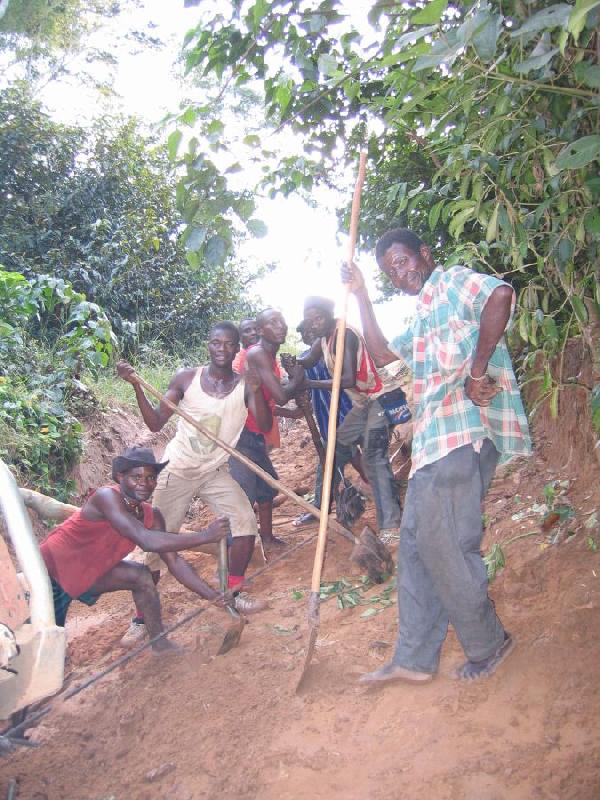
This last pictures gives and idea of the angle we were working at.
"Tonight we would surely reach Kapia!"
Josephine: "What was that noise?"
Me: "What noise?"
Josephine: "That tak-tak noise?"
Me: "Don't know"
I had heard the noise too but I did not want to think or worry about it. Not now.
The road was too steep to even attempt driving up with our front axle alone. We would use the tirfor for the remaining 500m. The length of the cable gave us about 10meter of progress with each go. Then the tirfor had to be released and a new tree had to be found to continue. 500 meters. 10 meter at a time. Everybody knew this was going to be a big job. But once we would make it open we would be out of the forest and onto the savannah, were it would be possible to drive on our own steam again. That was a big motivation.



My respect for these guys is endless. It is incredible how they could manage such hard labour for hours on end. If the motivation got low, the camera always cheered them up again. They barely eat or drink. At this rate I would have died already... twice.

This last pictures gives and idea of the angle we were working at.
"Tonight we would surely reach Kapia!"
The
guys were getting hungry. We could not blame them. They did not have
food, and the nearest village was 5km behind us. Our food stock was low
too, but we still had porridge. We bought a lot of porridge as it is
very nutritious and takes little space in the car. I don't like porridge
very much but we had eaten it every day since we were on the road.
We cooked up a big pot for them. They loved it. To make it a bit tastier we gave them our pot of sugar, so they could add a bit to their porridge. We were still cleaning up our cooking gear and by the time we returned the sugar was all gone. They just ate a full kilogram of pure sugar!
About halfway up the hill we ran out of trees. The trees had made way for thick bush. But nothing strong enough to hook up the tirfor... :scratch:
Nothing is easy in Congo.. We cut down a tree.
The procedure for the last 250meters changed a bit:
Dig a deep hole in the middle of the road. Put the tree in the hole. Close the hole. Attach the tirfor and winch the Landcruiser 10meters forward. Dig out the tree. Close the hole. 10meters further, dig a deep hole in the middle of the road... And repeat.
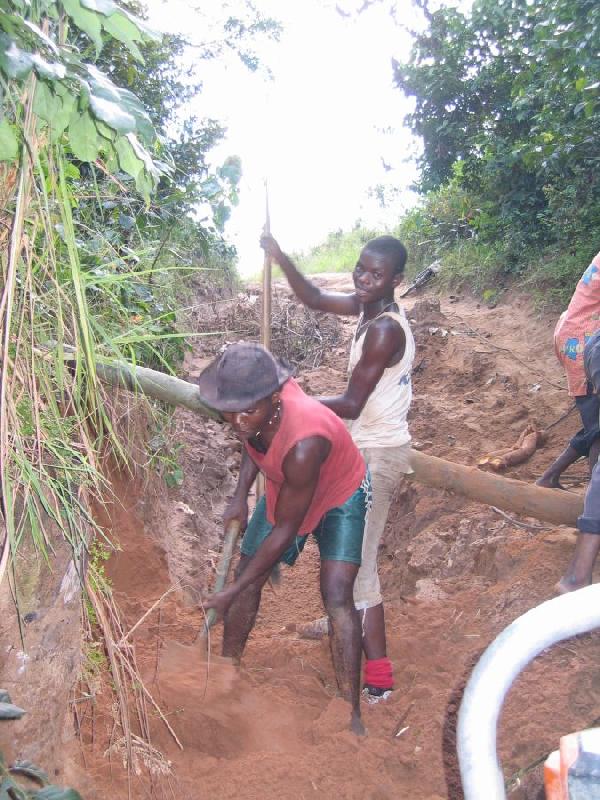
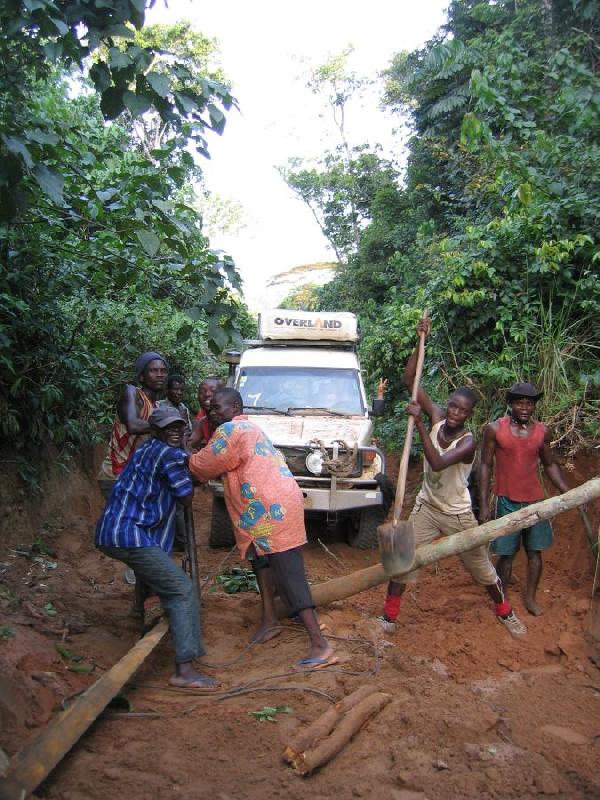
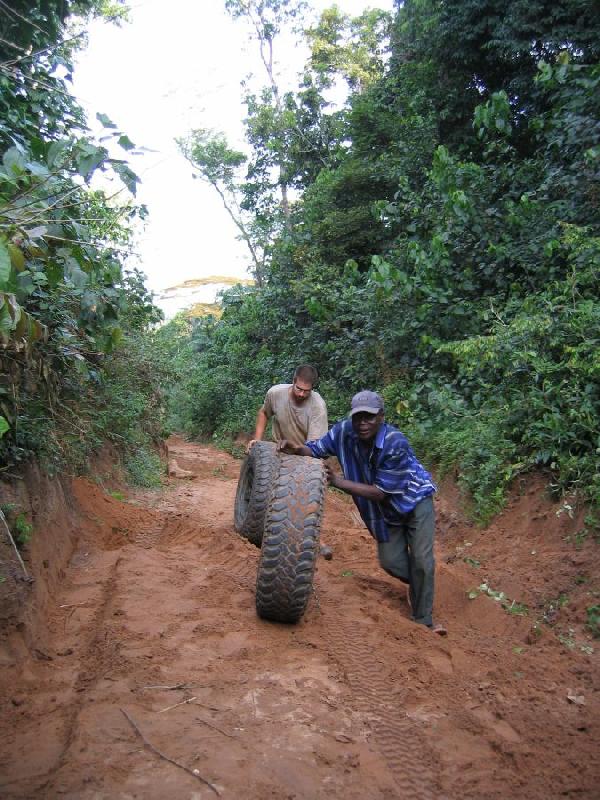
We cooked up a big pot for them. They loved it. To make it a bit tastier we gave them our pot of sugar, so they could add a bit to their porridge. We were still cleaning up our cooking gear and by the time we returned the sugar was all gone. They just ate a full kilogram of pure sugar!
About halfway up the hill we ran out of trees. The trees had made way for thick bush. But nothing strong enough to hook up the tirfor... :scratch:
Nothing is easy in Congo.. We cut down a tree.
The procedure for the last 250meters changed a bit:
Dig a deep hole in the middle of the road. Put the tree in the hole. Close the hole. Attach the tirfor and winch the Landcruiser 10meters forward. Dig out the tree. Close the hole. 10meters further, dig a deep hole in the middle of the road... And repeat.



When we just started with the
tirfor that morning everybody was optimistic. Kapia seemed so close by.
Everybody worked extremely hard for 10 hours non-stop and we had only
progressed 500meters. So mouch trouble for so little result. We still
hadn't mae it up the hill and out of the forest, although we were close
now.
It got dark again.
Nobody wanted to stop now, you could tell from everybody's face how tired they were. Papa Bazil started a song and the work continued. Everybody sang. No more joking, no more pausing. Just working at a steady pace to get this damn Landcruiser on top of the hill.
Papa Likas told me it was his greatest wish to hop on to the back of our car when we made it to top and ride together with us to Kapia. There his task would end and would finally be able to go home to his family. We shared his wish!
Late in the evening we made to the top, I still had the engine running since this morning. We were nervous.
I put it in 1st and let the clutch go. We moved!
*TAK*TAK*TAK*
It got dark again.
Nobody wanted to stop now, you could tell from everybody's face how tired they were. Papa Bazil started a song and the work continued. Everybody sang. No more joking, no more pausing. Just working at a steady pace to get this damn Landcruiser on top of the hill.
Papa Likas told me it was his greatest wish to hop on to the back of our car when we made it to top and ride together with us to Kapia. There his task would end and would finally be able to go home to his family. We shared his wish!
Late in the evening we made to the top, I still had the engine running since this morning. We were nervous.
I put it in 1st and let the clutch go. We moved!
*TAK*TAK*TAK*
Everybody was shaking. Our helpers because of all the sugar they ate. We from anxiety.
Who were we kidding anyway. We had heard the tak-tak sound before and we knew what it meant. I guess we were just hoping it would have been a dry birfield or something. Whishfull thinking.
A quick run trough the the front driveline components showed the the noise came from inside the front differential. Trying to drive now only resulted in noise, no more movement.
Our front diff had completely packed up.
We switched the engine off and it became silent. Very silent. You could see the dissapointment on the faces of our crew. We had a deal with them, they would bring us to Kapia, no matter what, and we would pay them for the service. They were afraid now that they would not get paid (or paid less) as we would obviously not reach Kapia.
We had to decide very quickly how and how much we would pay. This is so difficult! We had no idea what a reasonable amount would be. We did not want to pay them too little. Because they deserved an honest wage and we certainly did not want to make enemies here. On the other hand we did not want to pay them to much as that would only open the doors for corruption and create the impression that 'white people' always pay too much.
We decided on 150$US for all of them. 150$US divided by 8 = 19$US per person. For three very long had working days. Josephine asked me if I would be happy with that amount? I wouldn't. I'd feel insulted and angry probably. But in Congo that is a lot of money. This was so difficult!
We gave the money to papa Likas and thanked them for all their work. We also gave them our axe, for which they were very grateful. We barely used it anyway.
Our crew then dissapeared in the darkness, leaving us all alone on the savannah.
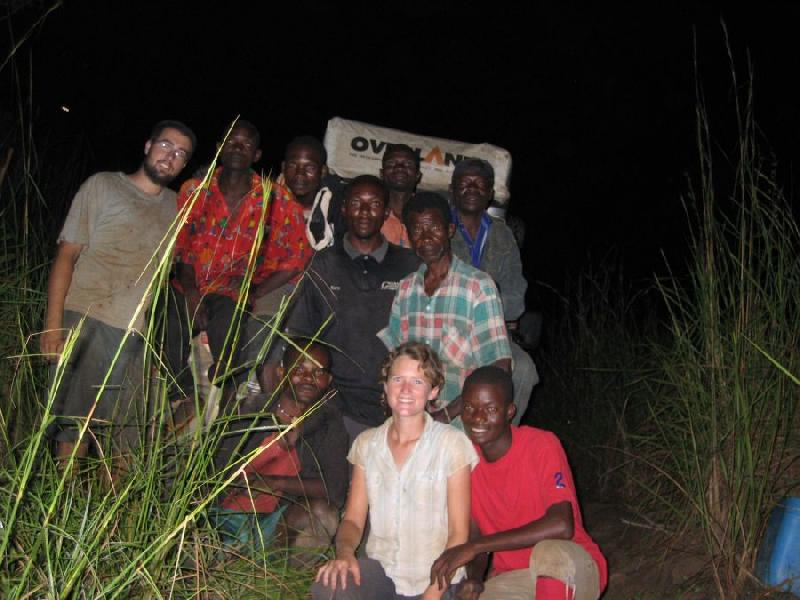
Papa Bazil, Mufuta, Vita, Papa Likas, Masambe, Bony
We knew we had a bit of problem here, but we did not discuss it too much. We were tired and hungry. There is nothing we could do now anyway so we opened up our tent and made ourselves a nice meal. We cooked some pasta, opened a can of tuna and used our last package of instant mushroom sauce. Whatever would happen tomorrow, we might as wel do it well fed.
20 minutes after our crew had left we heard some very loud "YAHOO's" emerging from the forest. We recognized the voices. Probably they had waited with counting the money until now, and the result seemed to make them very happy. We paid too much..
It was a beautiful night again, as we were in the savannah now we had a clear view of the sky. The African sky can be so magnificently beautiful. We only had a candle to provide us with some light. In different situations this would have been the perfect bushcamp.
A strange sense of rest came over us, in a way we felt relieved. We were happy that we would no longer have to struggle with only a functional front axle.
Who were we kidding anyway. We had heard the tak-tak sound before and we knew what it meant. I guess we were just hoping it would have been a dry birfield or something. Whishfull thinking.
A quick run trough the the front driveline components showed the the noise came from inside the front differential. Trying to drive now only resulted in noise, no more movement.
Our front diff had completely packed up.
We switched the engine off and it became silent. Very silent. You could see the dissapointment on the faces of our crew. We had a deal with them, they would bring us to Kapia, no matter what, and we would pay them for the service. They were afraid now that they would not get paid (or paid less) as we would obviously not reach Kapia.
We had to decide very quickly how and how much we would pay. This is so difficult! We had no idea what a reasonable amount would be. We did not want to pay them too little. Because they deserved an honest wage and we certainly did not want to make enemies here. On the other hand we did not want to pay them to much as that would only open the doors for corruption and create the impression that 'white people' always pay too much.
We decided on 150$US for all of them. 150$US divided by 8 = 19$US per person. For three very long had working days. Josephine asked me if I would be happy with that amount? I wouldn't. I'd feel insulted and angry probably. But in Congo that is a lot of money. This was so difficult!
We gave the money to papa Likas and thanked them for all their work. We also gave them our axe, for which they were very grateful. We barely used it anyway.
Our crew then dissapeared in the darkness, leaving us all alone on the savannah.

Papa Bazil, Mufuta, Vita, Papa Likas, Masambe, Bony
We knew we had a bit of problem here, but we did not discuss it too much. We were tired and hungry. There is nothing we could do now anyway so we opened up our tent and made ourselves a nice meal. We cooked some pasta, opened a can of tuna and used our last package of instant mushroom sauce. Whatever would happen tomorrow, we might as wel do it well fed.
20 minutes after our crew had left we heard some very loud "YAHOO's" emerging from the forest. We recognized the voices. Probably they had waited with counting the money until now, and the result seemed to make them very happy. We paid too much..
It was a beautiful night again, as we were in the savannah now we had a clear view of the sky. The African sky can be so magnificently beautiful. We only had a candle to provide us with some light. In different situations this would have been the perfect bushcamp.
A strange sense of rest came over us, in a way we felt relieved. We were happy that we would no longer have to struggle with only a functional front axle.
Progress after day 25 on the road. Our 30th day in DRC.
These progress report are becoming useless really, as we had not really progressed today (700meter)

These progress report are becoming useless really, as we had not really progressed today (700meter)

Day 26
We slept until the heat of the sun chased us out of our tent and cooked up a strong breakfast of my favourite porridge.
It was time for a sitwrap:
- Our car's bodywork was badly damaged
- Exhaust broken off
- Two broken batteries
- Rear drivetrain broken
- Front drivertrain broken
- Our gearbox was no longer connected in to our wheels = not possible to jumpstart. Not possible to move.
- Running low on food
- Running very low on water, less then 2 liters.
- Nobody knew where we were. The last time we were able to contact somebody was in Kananga. 2 weeks ago.
- No cell phone reception.
We hid all valuable things (camera, GPS, ..) in our car.
We left a note inside our car with a description of our intentions.
We blinded the windows as good as we could.
We put on our hiking boots and a hat.
We took our passports, our 2 mobile phones, some immodium and dafalgan and some sunscreen.
We filled a bottle with our last remaining bit of water.
We locked the doors of our car
We walked out...
We slept until the heat of the sun chased us out of our tent and cooked up a strong breakfast of my favourite porridge.
It was time for a sitwrap:
- Our car's bodywork was badly damaged
- Exhaust broken off
- Two broken batteries
- Rear drivetrain broken
- Front drivertrain broken
- Our gearbox was no longer connected in to our wheels = not possible to jumpstart. Not possible to move.
- Running low on food
- Running very low on water, less then 2 liters.
- Nobody knew where we were. The last time we were able to contact somebody was in Kananga. 2 weeks ago.
- No cell phone reception.
We hid all valuable things (camera, GPS, ..) in our car.
We left a note inside our car with a description of our intentions.
We blinded the windows as good as we could.
We put on our hiking boots and a hat.
We took our passports, our 2 mobile phones, some immodium and dafalgan and some sunscreen.
We filled a bottle with our last remaining bit of water.
We locked the doors of our car
We walked out...
For the record: this is not over yet 
We were on a 2 year trip, of which this Congo bit is just a very small part. We had sold everything we owned in order to be able to do this trip. The car and its content were (and you can take that very literally) the only things we owned. There was no house at home, no furniture, no clothes. As a matter of fact, there was no 'at home' other then our Landcruiser. And indeed, we had a carnet on this car. We were not just going to leave it there.
As for the dureability of the car: I will post my afterthoughts when the report is finished. Let's just not forget that we were already travelling 20 months non-stop. We had already completed 2 trans-africa's and a trans-asia. 95% offroad, some of it pretty extreme. A lot more gory technical details and insights will come in the next few installments.
Apologies for not providing this perspective any earlier.
We were on a 2 year trip, of which this Congo bit is just a very small part. We had sold everything we owned in order to be able to do this trip. The car and its content were (and you can take that very literally) the only things we owned. There was no house at home, no furniture, no clothes. As a matter of fact, there was no 'at home' other then our Landcruiser. And indeed, we had a carnet on this car. We were not just going to leave it there.
As for the dureability of the car: I will post my afterthoughts when the report is finished. Let's just not forget that we were already travelling 20 months non-stop. We had already completed 2 trans-africa's and a trans-asia. 95% offroad, some of it pretty extreme. A lot more gory technical details and insights will come in the next few installments.
Apologies for not providing this perspective any earlier.
I would love to go back. It would be much easier if we were equipped to travel in these regions and not lugging our house trough the jungle.
I often think of these people, wonder how they are doing. But I have no means of contacting them.
Leaving your car behind and 'walking out' is a very special feeling. I cannot describe it. We were in your country a few months ago, so beautiful I wish I could go back now!
Thanks for compliments. And that counts to everyone who is leaving comments here, it is really appreciated! We had tried a few times already to write down this story, but we always lost our motivation and it never got finished. Seeing that so many people are waiting for the next installment is just about the best motivation there is. Thank you Expedition Portal!
I try to avoid the usual Landrover/Landcruiser discussion as much as possible. I am a fan of both and believe they both have their strengths and weaknesses. Horses for courses! I will touch this subject(briefly) later in the report. You will see it when we get there.
I think you understand now why I was waiting so long to answer your question.
- We: "Bonjour Maman! Ca va?' - "Hello 'maman', how are you?"
Maman: "Bonjour, ca va un peu bien. D'ou venez-vous comme-ça?" - "Hi, We are a litle bit ok. Where are you coming from?"
- We: "Lubumbashi"
Maman: "aaaaaah ?!?!? C'est trop loin! Et vous allez où?" - "aaaaah ?!?!? That's too far! And where are you going?"
- We: "Kinshasa"
Maman: 'AAAAAAH !?!?!"
- We: "Au revoir et bonne continuation!' - "Bye, and a have a safe journey"
Maman: *silence* (eyes and mouth wide open)
They were the first people we met since we started walking. 2 ladies with a kid on their back. It must have been the weirdest sight to see two wite people walking here, coming from apparantly nowhere. With no luggage, no transport, no nothing. And then these white people claim they all the way from Lubumbashi - They did not ask how we got here, so we were not lying! ;-) This must have confused them! I am sure they would understand when they saw a broken down car a few kilometers down the road.
It was a 2 hour hike to Kapia. It had been a while since we made such fast progress.
Kapia was just a small village on a crossroad, we actually walked passed it at first, it was that small. We talked to a few people. The bad news was that nobody here would be able to help us. The good news was that in Dibaya Lubwe, there was a mission. And the father there had a Toyota Landcruiser. The chef du village gave us the phone number from the father. In kapia there is barely any cell phone reception. On top of a little hill in the middle of the village is the only place where - sometimes - there is some repection.
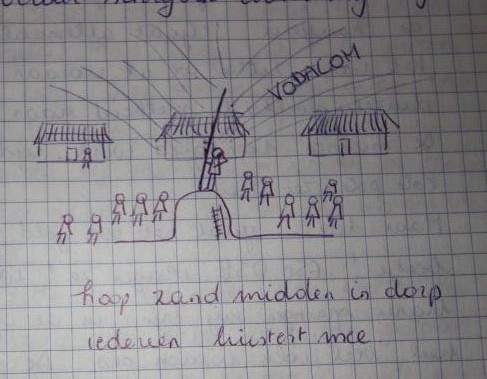
It took us a dozen of attempts to actually make a call (reception kept dropping) and get the father on the phone. It was a very bad connection. We could make out that his 4x4 was in Kinshasa to get it fixed. Then the connection dropped again.
We figured that going to Dibaya-Lubwe was the only way to find help.
30km would be a very long hike. There are a few bicycles in the village and we try to rent them. But they only want them rent them with a 'driver'
So we get chauffeured on the back of a bicycle. The luggage rack exists of nothing more then 2 iron bars. There are ofcourse no steps to put our feet on. I am not sure who suffered most, our drivers or we.
It got tricky on a long downhill when my driver said that we were going too fast because of all the weight. I shouted to him that he should brake. He then replied that he did not have brakes! Nice! They brake with their bare feet on the ground.
Maman: "Bonjour, ca va un peu bien. D'ou venez-vous comme-ça?" - "Hi, We are a litle bit ok. Where are you coming from?"
- We: "Lubumbashi"
Maman: "aaaaaah ?!?!? C'est trop loin! Et vous allez où?" - "aaaaah ?!?!? That's too far! And where are you going?"
- We: "Kinshasa"
Maman: 'AAAAAAH !?!?!"
- We: "Au revoir et bonne continuation!' - "Bye, and a have a safe journey"
Maman: *silence* (eyes and mouth wide open)
They were the first people we met since we started walking. 2 ladies with a kid on their back. It must have been the weirdest sight to see two wite people walking here, coming from apparantly nowhere. With no luggage, no transport, no nothing. And then these white people claim they all the way from Lubumbashi - They did not ask how we got here, so we were not lying! ;-) This must have confused them! I am sure they would understand when they saw a broken down car a few kilometers down the road.
It was a 2 hour hike to Kapia. It had been a while since we made such fast progress.
Kapia was just a small village on a crossroad, we actually walked passed it at first, it was that small. We talked to a few people. The bad news was that nobody here would be able to help us. The good news was that in Dibaya Lubwe, there was a mission. And the father there had a Toyota Landcruiser. The chef du village gave us the phone number from the father. In kapia there is barely any cell phone reception. On top of a little hill in the middle of the village is the only place where - sometimes - there is some repection.

It took us a dozen of attempts to actually make a call (reception kept dropping) and get the father on the phone. It was a very bad connection. We could make out that his 4x4 was in Kinshasa to get it fixed. Then the connection dropped again.
We figured that going to Dibaya-Lubwe was the only way to find help.
30km would be a very long hike. There are a few bicycles in the village and we try to rent them. But they only want them rent them with a 'driver'
So we get chauffeured on the back of a bicycle. The luggage rack exists of nothing more then 2 iron bars. There are ofcourse no steps to put our feet on. I am not sure who suffered most, our drivers or we.
It got tricky on a long downhill when my driver said that we were going too fast because of all the weight. I shouted to him that he should brake. He then replied that he did not have brakes! Nice! They brake with their bare feet on the ground.
GPS info and other practicalities will be posted when I get this report finnished.
Our
biketaxi's dropped us off at the Catholic mission of Dibaya-Lubwe were
we were greeted by the father (whose name we have forgotten). He did not
seemed to be very interested in us. He had received the SMS message we
sent from Kapia but he did not reply because he was not sure if we were
travelling on a bike or in a car. Strange reasoning.
His Landcruiser had its injectors replaced in Kinshasa at the time and he was about to leave to Kikwit himself for his annual 'holiday' by bushtaxi. He eventually hooked us up with some guys who own one of the few trucks in Dibaya-Lubwe. They wanted to drive to our car and tow us into the mission, but when asked about the price they were vague. "Pas beaucoup" - "Not much" they said. As they looked and acted very dodgy we insisted but this was a very difficult topic apparantely. The father eventually persuaded us that we should trust them. That would prove to be a mistake.
30 minutes later they come to pick us up. We then spend the next hour picking up people and goods. There are not a lot trucks running here and they never leave empty. Many people grabbed the opportunity to transport them or their good as far as Kapia. But this was a paying service ofcourse and the way the drivers handled it was not pretty I must say.
It was a rough ride and they ride these old truck hard. Very hard. It's hard work for the driver. The seat had long desintegrated and this gearbox required doubleclutching trough A LOT of gears. Cool truck though. I don't want to know how much this beast consumes. Actually I did want to know as we would be paying for the diesel!
When we arrived back to our truck papa Likas was waiting for us. He had brought us water and a branch of a banana tree full of little banana's. He also wanted to talk to me about what we thought was best. Whiskey, brandy or cognac. This flabergasted me. I could not produce an answer to that question at that time. At least we knew what he was planning to do with the money he earned from us..
Fortunately the truck too was 24volt, so they could jumpstart us with our leads. We would need a running engine to power the steering.
Ever since we arrived in Kapia everything went very quickly. We had been lucky to find a vehicle that could tow us so smoothly. We just hoped we could trust these guys as they were very dodgy. The fact that they owned a truck was obviously a status symbol. They showed of their power and wealth too. Smoking a lot of cigarettes, flashing their new mobile phones.
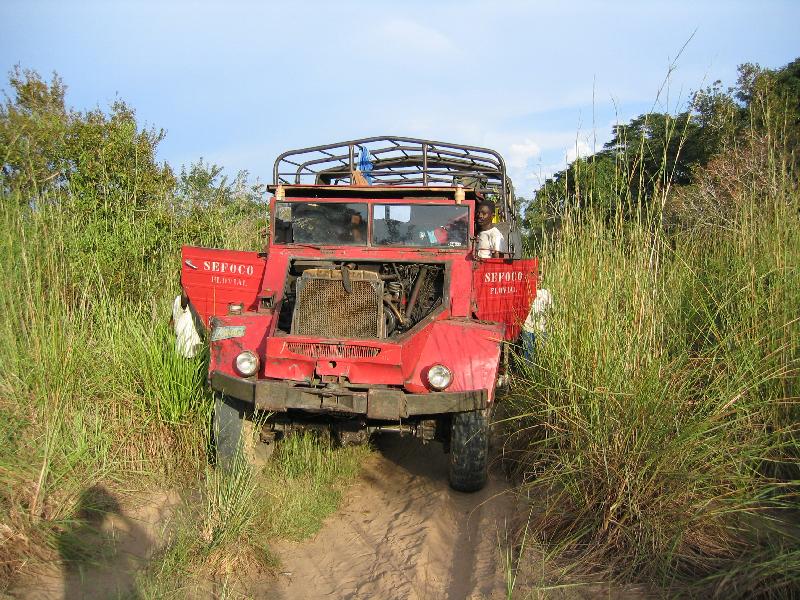
His Landcruiser had its injectors replaced in Kinshasa at the time and he was about to leave to Kikwit himself for his annual 'holiday' by bushtaxi. He eventually hooked us up with some guys who own one of the few trucks in Dibaya-Lubwe. They wanted to drive to our car and tow us into the mission, but when asked about the price they were vague. "Pas beaucoup" - "Not much" they said. As they looked and acted very dodgy we insisted but this was a very difficult topic apparantely. The father eventually persuaded us that we should trust them. That would prove to be a mistake.
30 minutes later they come to pick us up. We then spend the next hour picking up people and goods. There are not a lot trucks running here and they never leave empty. Many people grabbed the opportunity to transport them or their good as far as Kapia. But this was a paying service ofcourse and the way the drivers handled it was not pretty I must say.
It was a rough ride and they ride these old truck hard. Very hard. It's hard work for the driver. The seat had long desintegrated and this gearbox required doubleclutching trough A LOT of gears. Cool truck though. I don't want to know how much this beast consumes. Actually I did want to know as we would be paying for the diesel!
When we arrived back to our truck papa Likas was waiting for us. He had brought us water and a branch of a banana tree full of little banana's. He also wanted to talk to me about what we thought was best. Whiskey, brandy or cognac. This flabergasted me. I could not produce an answer to that question at that time. At least we knew what he was planning to do with the money he earned from us..
Fortunately the truck too was 24volt, so they could jumpstart us with our leads. We would need a running engine to power the steering.
Ever since we arrived in Kapia everything went very quickly. We had been lucky to find a vehicle that could tow us so smoothly. We just hoped we could trust these guys as they were very dodgy. The fact that they owned a truck was obviously a status symbol. They showed of their power and wealth too. Smoking a lot of cigarettes, flashing their new mobile phones.

Both suggestions above have some
possibilities in it. Although in both cases it would damage even more
parts and it might only work for a short period of time. I see these
kind of Macgyver tricks as last resort solutions.
In this case we knew a larger city was not too far away, walking out was an easier/safer thing to do then starting to work on the truck locally.
There is also a bit of long term thinking involved. If we had buggered up our hubs and half shafts by welding them, we would be in for a very costly repair and probably have difficulties sourcing these parts. If we reach Kinshasa, that is the end of the Congo episode, but not the end of our trip. We still have to drive back home all the way trough Africa.
In this case we knew a larger city was not too far away, walking out was an easier/safer thing to do then starting to work on the truck locally.
There is also a bit of long term thinking involved. If we had buggered up our hubs and half shafts by welding them, we would be in for a very costly repair and probably have difficulties sourcing these parts. If we reach Kinshasa, that is the end of the Congo episode, but not the end of our trip. We still have to drive back home all the way trough Africa.
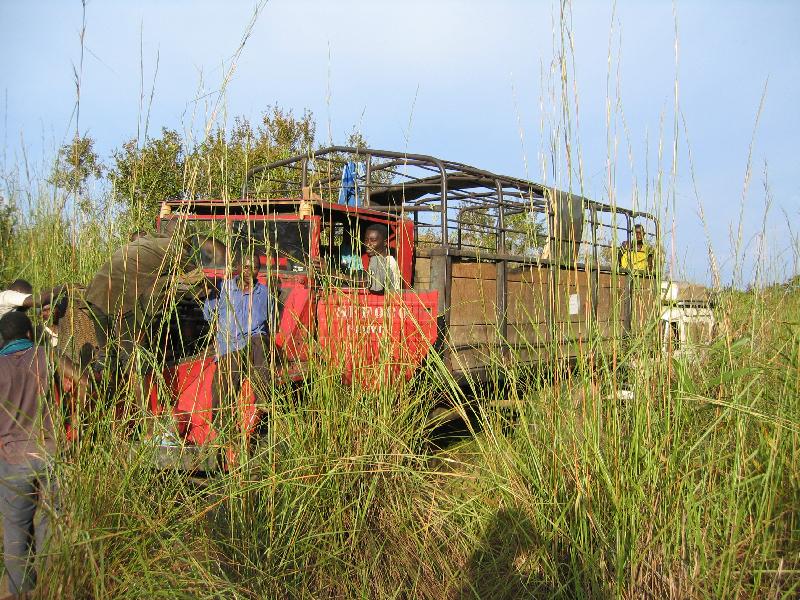
We told the truck driver not to drive too fast on the way back. "Polé-polé" (swahili for slowly-slowly).
He might not have been the most pleasant person, but he did know how to drive his truck. At a slow tempo he towed us all the way into Dibaya-Lubwe and dropped us off at the catholic mission. We used our kinetic strap for the tow, that reduces the jacking about when he takes off. It was a scary ride at moments. Driving a few meters behind a truck, with no brakes.
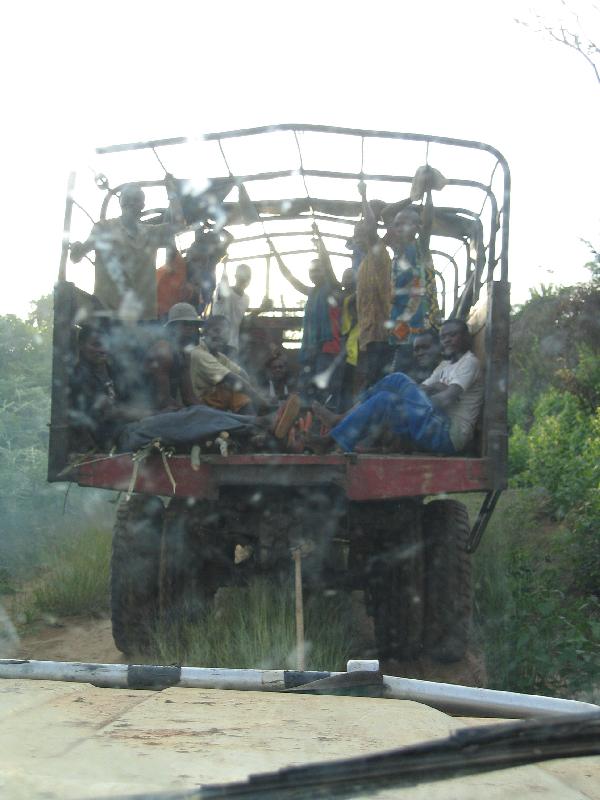
It was close to midnight when arrived at the mission, but there was still a lot of action going on. We obviously drew a crowd. But at the same time the weekly bushtaxi to Kikwit was about the leave. It's a regular Toyota Landcruiser, like ours, who does this run - loaded to the brim. The only person we 'knew' here - the father of the mission - was about to leave with this taxi.
Then the discussion about the money started. The drivers of the truck were still very vague about how much we owned them. They eventually told their price: 650$US !!
At first I thought I misunderstood them, after all their French was not that good and mine is far from perfect too. But no, they really meant 650$US. This made me angry, very angry.
We had to make a split second decision here. If we hestiated too long, they would think we were considering the amount and talking the price down would become very difficult. If we pissed them off too much we were making ourselves very vulnerable. We very well knew we had nowhere to go and we would be needing the help of the people here to get us going again.
0.1 seconds later I started shouting in a very African way. Gesticulating with my arms. Clearly indicated that their price was completely ridiculous (it was!) and we would never pay this.
A heated discussion started. This drew an even bigger crowd. It was pitch dark and we were in a city we did not know. Several hundred people were around us and some of them were getting quite upset. They saw an opportunity to earn a lot of cash. We could not give in to it now, it would make our situation impossible if we ever wanted to get our car repaired here. Josephine would later tell me that this was a very scary situation. I was too much in an adrenaline rush to even notice at the time.
The father - clearly very annoyed as he wanted to leave - eventually came to negotiate before things got out of hand. We had calculated that the the truck used 50$US in fuel. We offered to pay 75$US, still way too much. The driver was very dissapointed, he probably had visions of what he'd be able to buy with 650$! It took the father an hour to talk the price down to 100$. We agreed.
We saw the father off and thanked him for his help. He gave us permission to camp in the - unfenced - garden of the mission. There was a small workshop at the mission. The only one in town apparently. We could make use of that to get our car fixed.
Still with a big crowd around us we set up our tent and tried to go to sleep.
It was a miracle that we were able to get our car towed to the mission in one day. We were glad we could sleep in our own tent that night and that we did not had to leave our car in the jungle overnight. Getting our car going again would be another story. We might be stuck here for a while.
We did not make any friends in Dibaya-Lubwe today.
Progress after day 26 since Lubumbashi. 31st day in Congo. Visa expiring in less then 3 weeks. Dibaya-Lubwe
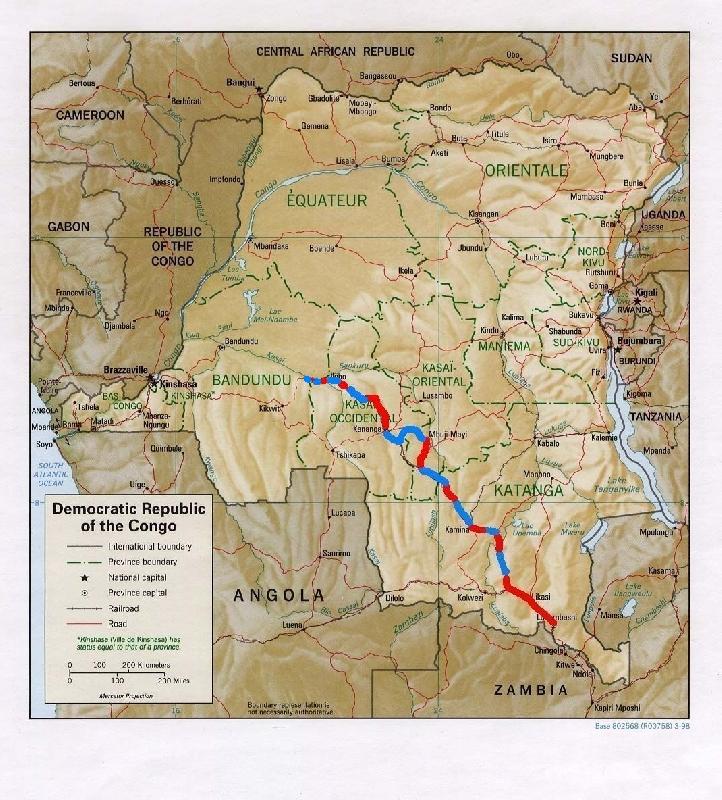

Day 27
We did not feel like getting out of our tent today. It was very unlikely that this would be a fun day. We had to arrange to get our car fixed here and I had no idea where to start. There was nobody we knew here that could help us.
When we opened our tent the crowd was there already. Approximately 100 man and children. They crawled in eachothers necks to get a better view inside our tent. That is not a pleasant way to start your day! Even before we are good and well out of our tent the truck driver we had a fight with last night approached us. He was shy now and friendly. He told us he was a very good mechanic and that he wanted us to hire him to fix our car. Sorry dude.. no way!
With all the onlookers still there we talked to the driver of the father of the mission (temporarily out of work due to lack of car). He was a mechanic too (everybody is a mechanic here) and wanted to help us. To us that looked like the best bet. In a city where there are no cars it is very hard to find a mechanic that has some experience with Landcruisers. At least we were sure this guy had seen one of these from closeby. with our experiences from last night fresh in our memory we first discussed about the price. It is quite common to pay 'per job' for these kind of things.
The idea is that we would try to get the rear axle fixed so we can drive to Kikwit, we would try to get the front axle fixed there or in Kinshasa. For this the mechanic asks 200$US. That is more then he would earn in a year. He explains that he would have to rent tools and it's not just for him, but for an entire team. Eventually we settle on 50$US for the labour. We are still grossly overpaying them, but we feel we have no choice.
After the negotiation I plainly ask them if they had asked so much money just because we are white. They felt uncomfortable with the question but confirmed.
I am not a mechanic. But neither were these guys. They had the skills to make everything work, but they did ugly things. They only knew two tools: a hamer and a screwdriver. And the screwdriver was mostly only used in combination with the hamer. The entire process I had to keep watching them to make sure they did not round any more bolts or hamer my axle to pieces. The moment I turned my back I could hear them banging away.
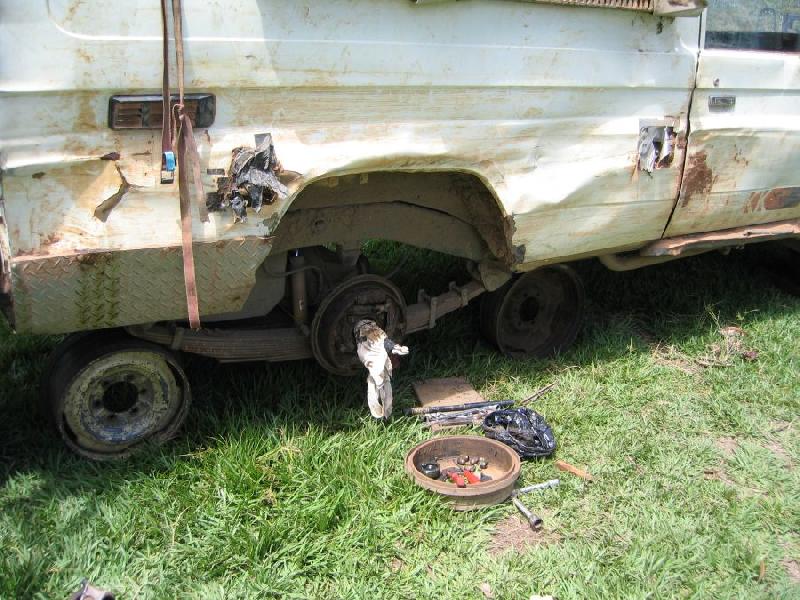
Once the hub on the rear axle was removed, they had to remove the broken bolts. There is no electricity in Dibaya-Lubwe. The generator of the mission was broken. They did not have an electrical drill anyway. But they did have a manual hand operated drill. It must have been quite the tool 100 years ago, but nowadays nobody would even consider to use this to drill into metal. Needless to say the the drill bits were not of the best quality either. They would drill out the holes and tap new wire into them (1 size bigger). Our hub was buggered anyway so I let them do it. It took them an entire day of turning that drill!
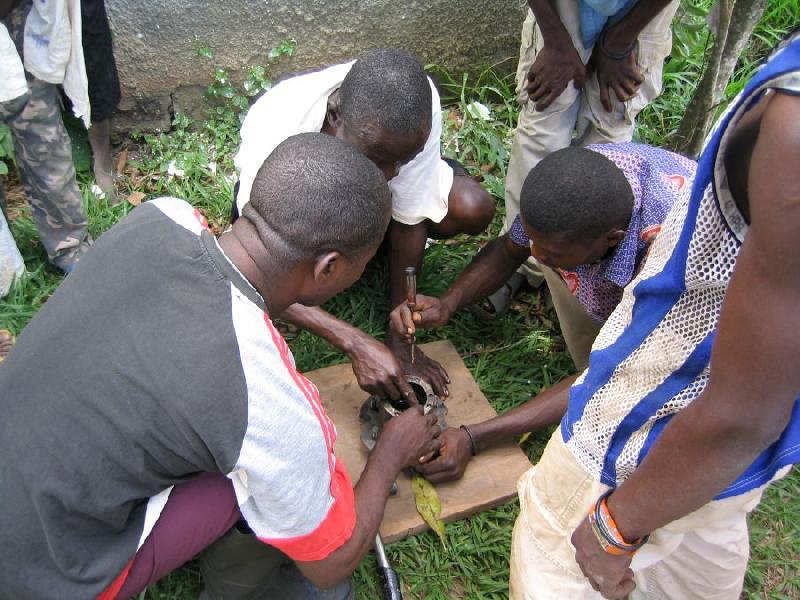
By the end of the day all bolts were cleared, new threads were tapped and fitting bolts (of horrible quality) were found. It had gotten too dark already to re-assemble everything. Tomorrow morning they would be able to fit them and by noon we would be ready to go again! Great!
We did not feel like getting out of our tent today. It was very unlikely that this would be a fun day. We had to arrange to get our car fixed here and I had no idea where to start. There was nobody we knew here that could help us.
When we opened our tent the crowd was there already. Approximately 100 man and children. They crawled in eachothers necks to get a better view inside our tent. That is not a pleasant way to start your day! Even before we are good and well out of our tent the truck driver we had a fight with last night approached us. He was shy now and friendly. He told us he was a very good mechanic and that he wanted us to hire him to fix our car. Sorry dude.. no way!
With all the onlookers still there we talked to the driver of the father of the mission (temporarily out of work due to lack of car). He was a mechanic too (everybody is a mechanic here) and wanted to help us. To us that looked like the best bet. In a city where there are no cars it is very hard to find a mechanic that has some experience with Landcruisers. At least we were sure this guy had seen one of these from closeby. with our experiences from last night fresh in our memory we first discussed about the price. It is quite common to pay 'per job' for these kind of things.
The idea is that we would try to get the rear axle fixed so we can drive to Kikwit, we would try to get the front axle fixed there or in Kinshasa. For this the mechanic asks 200$US. That is more then he would earn in a year. He explains that he would have to rent tools and it's not just for him, but for an entire team. Eventually we settle on 50$US for the labour. We are still grossly overpaying them, but we feel we have no choice.
After the negotiation I plainly ask them if they had asked so much money just because we are white. They felt uncomfortable with the question but confirmed.
I am not a mechanic. But neither were these guys. They had the skills to make everything work, but they did ugly things. They only knew two tools: a hamer and a screwdriver. And the screwdriver was mostly only used in combination with the hamer. The entire process I had to keep watching them to make sure they did not round any more bolts or hamer my axle to pieces. The moment I turned my back I could hear them banging away.

Once the hub on the rear axle was removed, they had to remove the broken bolts. There is no electricity in Dibaya-Lubwe. The generator of the mission was broken. They did not have an electrical drill anyway. But they did have a manual hand operated drill. It must have been quite the tool 100 years ago, but nowadays nobody would even consider to use this to drill into metal. Needless to say the the drill bits were not of the best quality either. They would drill out the holes and tap new wire into them (1 size bigger). Our hub was buggered anyway so I let them do it. It took them an entire day of turning that drill!

By the end of the day all bolts were cleared, new threads were tapped and fitting bolts (of horrible quality) were found. It had gotten too dark already to re-assemble everything. Tomorrow morning they would be able to fit them and by noon we would be ready to go again! Great!
Day 28
I wish I could say that we got used to looking into 100 faces first thing in the morning. But I can't. It annoyed us immensely to have this crowd looking at us. From the minute we opened our tent in the morning until we close it again in the evening. They 'work' in shifts so they do not miss any action.
We really looked forward to drive out of here again. It was just a few more hours of work to get everything assembled. The hub was fitted again and the oil on the diff changed (lucikily we had bought diff oil in Zambia!). At 11am sharp we asked our mechanics to give us a push and the engine promptly sprung to life. That is a good sign already!
Carefully I drive backwards a bit. Ok!
Forwards a bit. Ok!
I tell the guys I am going for a quick test drive around the mission. We drive out of the gate (the mission had a gate, but no fence) and...
*TAK*TAK*
I wish I could say that we got used to looking into 100 faces first thing in the morning. But I can't. It annoyed us immensely to have this crowd looking at us. From the minute we opened our tent in the morning until we close it again in the evening. They 'work' in shifts so they do not miss any action.
We really looked forward to drive out of here again. It was just a few more hours of work to get everything assembled. The hub was fitted again and the oil on the diff changed (lucikily we had bought diff oil in Zambia!). At 11am sharp we asked our mechanics to give us a push and the engine promptly sprung to life. That is a good sign already!
Carefully I drive backwards a bit. Ok!
Forwards a bit. Ok!
I tell the guys I am going for a quick test drive around the mission. We drive out of the gate (the mission had a gate, but no fence) and...
*TAK*TAK*
Josephine and I looked at eachother. We laughed. That would have been too easy, wouldn't it?
The mechanics pushed us back into the mission. The fixed hub was still ok, but our little mishap had probably damaged something inside the differential as well. That is bad news as this meant we had to replace parts. A manual drill would not provide a fix here!
So be it. The mechanics took out the differantial. The planetary gears (do you guys know what I talking about when I use those terms? not sure of the correct terms in English) were completely shot. The sun gears had some chipped teeth but could still be used (hopefully).
We needed two new gears. They did not have two new gears in Dibaya-Lubwe.
We called up the father of the mission, who was on holiday in Kikwit. In the mission in Kikwit they had a bigger workshop and had better access to supplies. I eventually talked to a mechanic in Kikwit. He promised me to call me back in an hour. Two hours later I called him back... he had forgotten. Another half hour later came the news: no such parts to be found in Kikwit, but they could be ordered from Kinshasa. It would take 2 to 3 days to get them to Kikwit(by air). And then we had to foresee transport from Kikwit to Dibaya-lubwe. The cost of the transport alone would be immense and it would probably take in excess of a week. Plus, how do we get the money to Kinshasa? You cannot buy things on credit here!
Time for plan B: we started inquiring if there wasn't another Landcruiser close by, from whom we could 'borrow' some parts. It appeared that a remote mission, some 40km from here had a Landcruiser that had engine problems. We might be able to source some parts from them. Unfortunately they could not be reached as they do not have cell phone reception there.
It was our best bet so we made a plan. We would rent a little motorbike for our mechanics, they would ride to the remote mission and hopefully they would be allowed to dismantle the axle of that landcruiser to 'borrow' the parts. If that would not be possible, they would ride on to Kikwit and try to find some secondhand parts there. In the best case they would be gone for 2 days. In the worst case it would take weeks.
Between the time we knew which part we needed until the time we had finalized our plan with the motorbike was 4 hours Time flies when you are improvising.
We had the great prospect of spending some leisurely days at the mission. Our crowd would be thrilled!
The mechanics pushed us back into the mission. The fixed hub was still ok, but our little mishap had probably damaged something inside the differential as well. That is bad news as this meant we had to replace parts. A manual drill would not provide a fix here!
So be it. The mechanics took out the differantial. The planetary gears (do you guys know what I talking about when I use those terms? not sure of the correct terms in English) were completely shot. The sun gears had some chipped teeth but could still be used (hopefully).
We needed two new gears. They did not have two new gears in Dibaya-Lubwe.
We called up the father of the mission, who was on holiday in Kikwit. In the mission in Kikwit they had a bigger workshop and had better access to supplies. I eventually talked to a mechanic in Kikwit. He promised me to call me back in an hour. Two hours later I called him back... he had forgotten. Another half hour later came the news: no such parts to be found in Kikwit, but they could be ordered from Kinshasa. It would take 2 to 3 days to get them to Kikwit(by air). And then we had to foresee transport from Kikwit to Dibaya-lubwe. The cost of the transport alone would be immense and it would probably take in excess of a week. Plus, how do we get the money to Kinshasa? You cannot buy things on credit here!
Time for plan B: we started inquiring if there wasn't another Landcruiser close by, from whom we could 'borrow' some parts. It appeared that a remote mission, some 40km from here had a Landcruiser that had engine problems. We might be able to source some parts from them. Unfortunately they could not be reached as they do not have cell phone reception there.
It was our best bet so we made a plan. We would rent a little motorbike for our mechanics, they would ride to the remote mission and hopefully they would be allowed to dismantle the axle of that landcruiser to 'borrow' the parts. If that would not be possible, they would ride on to Kikwit and try to find some secondhand parts there. In the best case they would be gone for 2 days. In the worst case it would take weeks.
Between the time we knew which part we needed until the time we had finalized our plan with the motorbike was 4 hours Time flies when you are improvising.
We had the great prospect of spending some leisurely days at the mission. Our crowd would be thrilled!
That
night we felt like we had deserved a beer. We found the beer in the
other catholic mission, the one from the sisters. Upon entering their
mission it was like entering another world. They had a nice vegetable
garden and flowers. Their house was clean. The sisters did a lot of work
here, mostly as nurses in their hospital and orphanage. They made some
extra money by selling beer. They were the only place in town that had a
regular supply and, most importantly, they had a fridge(on gas)!
It was heaven to be there. The sisters were really nice and smart ladies. Good mannered with a healthy dose of humour and interest. It felt so good to be able to have a normal conversation for once. A conversation that did not leave us guilty as would normally be the case. A conversation the not lead to begging. A conversation where we did not have to think about every word we said.
We crawled in our tent. A 100 people made sure that we would not feel too much at ease.
Day 29
We did not have anything to do today but to keep out of trouble and wait for our mechanics. We slept until the sun transformed our tent into a sauna. Upon opening our tent we were greeted again by the looks and laughter of our crowd. The first thing we heard today was somebody shouting from a distance "Eh Mundele -Donnez-moi de l'argent!" -"Eh mundele - give me money". A very good morning to you too!
We would move our chairs regularly around the car, trying to escape the onlookers. Minutes later the crowd would then move too so they could see us again. They always kept a distance of 20meters or so, but nobody talked to us. From time to time they would shout something (usually begging). We tried to be as uniteresting as possible...
After a while I got really fed up. I took my chair and put it close to them. I sat down, facing them. I looked straight into their eyes. They looked straight back. I just sat still for half an hour, hoping they would get bored of looking at me. Or possibly even embarrased. But I lost. They did not loose interest.
I tried talking to them, explaining that we would really appreciate if they stopped looking at us as we would like to get some rest. I avoided the word privacy as it an unknown concept here anyway. I only got blank stares in return. From the back of the crowd I could here somebody shout "Donnez-nous de l'argent!" -"Give us money". Shortly after followed by "Ce n'est pas vorte pays!" - "This is not your country"
This made me so angry. He was right ofcourse, this was not my country. I was nothing more then a visitor. I had no other intentions but to explore their country and meet the people. But they did not want me here. They wanted my money, but not me.
We did meet a few interesting people though. A teacher from the local school came to see us. It was a math teacher. He had heard that I am a computer engineer. He had a question for me. He had heard about Internet and how it was such an interesting tool. But what is Internet exactly? I asked if they had computer here. They did not. He knew there were computers and Internet in Kikwit, but that is several hundres of kilometers from here.
He kept me busy for many hours. I tried my best explaining him all the different components and concepts. Everything from a modem to a webpage. I drawed him diagrams and everything. But I am a bad teacher I guess.. I could see he had difficulties understanding it all. How do you explain Internet to somebody who has never seen a computer? He took my notes and said he would teach his students about 'Internet'.
It was heaven to be there. The sisters were really nice and smart ladies. Good mannered with a healthy dose of humour and interest. It felt so good to be able to have a normal conversation for once. A conversation that did not leave us guilty as would normally be the case. A conversation the not lead to begging. A conversation where we did not have to think about every word we said.
We crawled in our tent. A 100 people made sure that we would not feel too much at ease.
Day 29
We did not have anything to do today but to keep out of trouble and wait for our mechanics. We slept until the sun transformed our tent into a sauna. Upon opening our tent we were greeted again by the looks and laughter of our crowd. The first thing we heard today was somebody shouting from a distance "Eh Mundele -Donnez-moi de l'argent!" -"Eh mundele - give me money". A very good morning to you too!
We would move our chairs regularly around the car, trying to escape the onlookers. Minutes later the crowd would then move too so they could see us again. They always kept a distance of 20meters or so, but nobody talked to us. From time to time they would shout something (usually begging). We tried to be as uniteresting as possible...
After a while I got really fed up. I took my chair and put it close to them. I sat down, facing them. I looked straight into their eyes. They looked straight back. I just sat still for half an hour, hoping they would get bored of looking at me. Or possibly even embarrased. But I lost. They did not loose interest.
I tried talking to them, explaining that we would really appreciate if they stopped looking at us as we would like to get some rest. I avoided the word privacy as it an unknown concept here anyway. I only got blank stares in return. From the back of the crowd I could here somebody shout "Donnez-nous de l'argent!" -"Give us money". Shortly after followed by "Ce n'est pas vorte pays!" - "This is not your country"
This made me so angry. He was right ofcourse, this was not my country. I was nothing more then a visitor. I had no other intentions but to explore their country and meet the people. But they did not want me here. They wanted my money, but not me.
We did meet a few interesting people though. A teacher from the local school came to see us. It was a math teacher. He had heard that I am a computer engineer. He had a question for me. He had heard about Internet and how it was such an interesting tool. But what is Internet exactly? I asked if they had computer here. They did not. He knew there were computers and Internet in Kikwit, but that is several hundres of kilometers from here.
He kept me busy for many hours. I tried my best explaining him all the different components and concepts. Everything from a modem to a webpage. I drawed him diagrams and everything. But I am a bad teacher I guess.. I could see he had difficulties understanding it all. How do you explain Internet to somebody who has never seen a computer? He took my notes and said he would teach his students about 'Internet'.
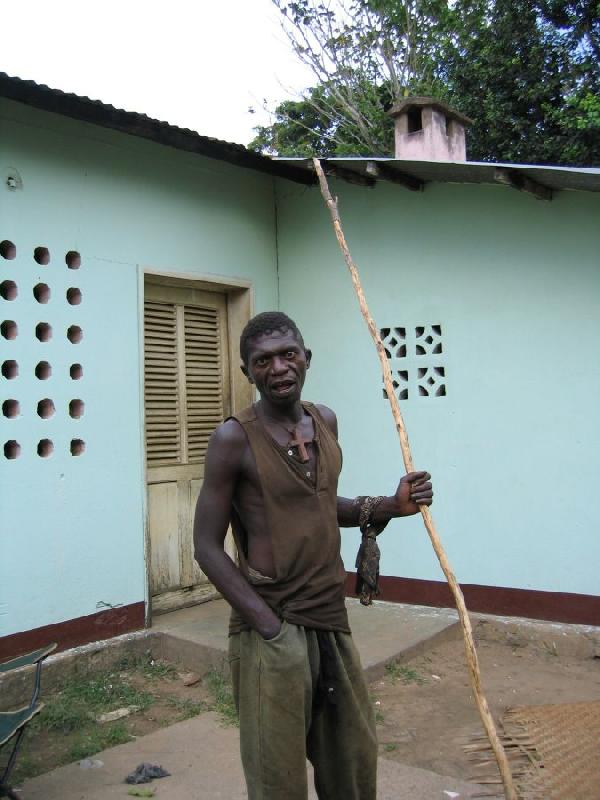
We constantly had the company of Anton. People called him "Le fou" - "The village fool". He was no fool though. Apparantely he was a very intelligent guy who had studied. It could be told from his vocabulary. But he kept talking and talking and talking. Always in a very dramatic way, swinging with his stick and jumping around. He would sometimes drop dead on the floor and stay put for 10 minutes and then he would jump up shouting loud. The kids loved him and were scared of him at the same. Children would sometimes throw rocks at him.
He was truly very annoying (and he had an incredibly smelly breath) but I took a liking to him anyway. At least he was honest. He dared to talk to us. We appreciated that. But he was still very annoying.
We will never forget his words: "Les blanc, les noirs, les rouges, les jaunes, nous avons tous le même sang" - "The whites, the black, the red, the yellow, we all have the same blood"
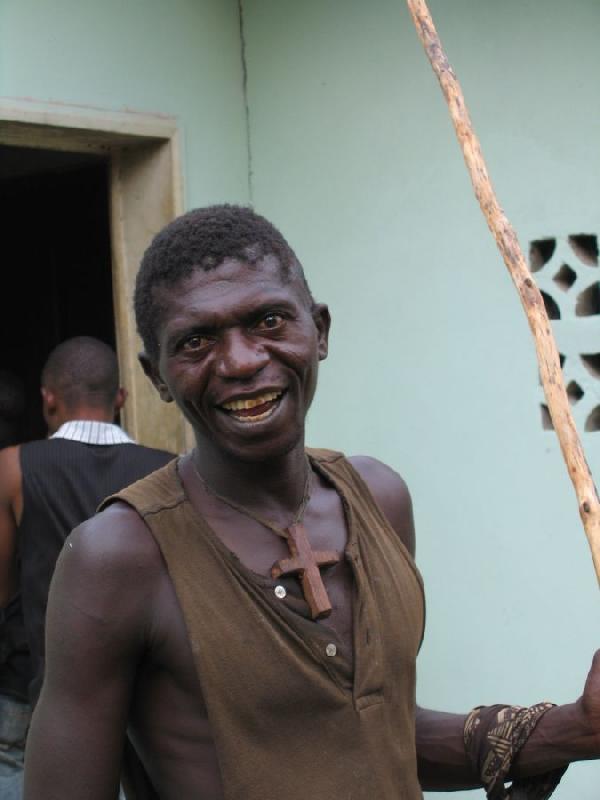
Another guy comes to visit us "Venez avec moi. Police!" - "Come with me. Police!"
Hi Riaan & Stephanie! Good to hear from you again. I still remember when you asked me about the feasability of the Lubumbashi-Kinshasa track when you had problems getting your Angola visa. I didn't really know how to put my answer at the time, but I am sure you understand why I wasn't really recommending it ;-)
Are you driving back down?
Always welcome in Aalst for a beer!
Thanks
everybody for the comments, we really appreciate all of them! Sorry if
we do not reply to each and every message. I do my best to answer all
your questions. Sometimes the answers are provided in one of the future
installments.
I am a bit slow with the updates but I am insanely busy with other things at the moment. I still spend every spare minute of my time writing this report
Cheers!
I am a bit slow with the updates but I am insanely busy with other things at the moment. I still spend every spare minute of my time writing this report
Cheers!
Another guy comes to visit us "Venez avec moi. Police!" - "Come with me. Police!"
It's a guy wearing slippers and tatty clothes. We are not impressed and ask who he is?
"Chef de la police de Dibaya-lubwe"
We know where this is going to lead to so we tell him that everybody can claim they are police, does he have anything to prove his function? He hasn't. We tell him "au revoir" and ignore him. This annoys him tremendously. The look on the faces of the people around us tell us he was probably right and they can't believe we just turned our back to the chief of police! He leaves again. He was furious.
We befriend Monsieur Shinandi. He is an older man in a lovely old-fashioned suit. He is the school prefect of the area. A very clever and friendly man. He actually apologizes for the attitude of the people towards us, he tells us he is embarassed about the situation. He also ask us to try to understand how hopeless life is for people here. That is the reason they act this way. We do understand, but we also explain that is not the same as accepting it.
Mr. Shinandi accompanies Josephine to the town's market to make sure we get honest prices. It's nice to have some fresh food for a change. Eggs and tomatoes. Meat is available but it did not look very tasty so we skip it. Mr. Shinandi tells us a lot about the poor condition of the schooling system in Congo. There are almost no funds and the little funds there are dissapear before they reach their destination. Education is supposed to be free, but parents need to pay the teachers as the teachers are not being paid by the goverment. Most families can only afford to send a few of their children to school, not all of them. He was genuinely worried about the future of his country. Without education the new generation is lost. These youngstes are the future rulers of Congo, and the only thing they learned is corruption.
He also tells us about the abusive nature of many teachers, mostly in rural areas. Young girls are regularly forced to have sex with the teacher in return for good results. There are massive amount of child pregnancies. These children barely have enough to survive, let alone to raise children. Their parents send them to school with the hope of having chances on a better future, but instead their lives are ruined. They don't stand a chance.
Mr.Shinandi also takes me to a bank to exchange some US$ into Congolese Franc. Most things can be bought with dollars, but eggs or bread and small consumables are paid in CF. In the bank they cannot help us... they have no
money. :roll: We eventually end up at the farmers organisation. They provide micro-loans to farmers. They wanted us to go trough a mountain of - self-produced - paperwork first but eventually give up and change the money. At a horrible rate for us. It is strange how people try to give the impression that everything is organized. They try to give that impression by using as much paperworks as possible.
Walking around town with Mr. Shinandi is a pleasant and interesting experience. He is well respected here and because of that we are left alone.
When we return to the mission a man in a police uniform is waiting for us. It's an impressive uniform with several stars on the shoulders.
It's a guy wearing slippers and tatty clothes. We are not impressed and ask who he is?
"Chef de la police de Dibaya-lubwe"
We know where this is going to lead to so we tell him that everybody can claim they are police, does he have anything to prove his function? He hasn't. We tell him "au revoir" and ignore him. This annoys him tremendously. The look on the faces of the people around us tell us he was probably right and they can't believe we just turned our back to the chief of police! He leaves again. He was furious.
We befriend Monsieur Shinandi. He is an older man in a lovely old-fashioned suit. He is the school prefect of the area. A very clever and friendly man. He actually apologizes for the attitude of the people towards us, he tells us he is embarassed about the situation. He also ask us to try to understand how hopeless life is for people here. That is the reason they act this way. We do understand, but we also explain that is not the same as accepting it.
Mr. Shinandi accompanies Josephine to the town's market to make sure we get honest prices. It's nice to have some fresh food for a change. Eggs and tomatoes. Meat is available but it did not look very tasty so we skip it. Mr. Shinandi tells us a lot about the poor condition of the schooling system in Congo. There are almost no funds and the little funds there are dissapear before they reach their destination. Education is supposed to be free, but parents need to pay the teachers as the teachers are not being paid by the goverment. Most families can only afford to send a few of their children to school, not all of them. He was genuinely worried about the future of his country. Without education the new generation is lost. These youngstes are the future rulers of Congo, and the only thing they learned is corruption.
He also tells us about the abusive nature of many teachers, mostly in rural areas. Young girls are regularly forced to have sex with the teacher in return for good results. There are massive amount of child pregnancies. These children barely have enough to survive, let alone to raise children. Their parents send them to school with the hope of having chances on a better future, but instead their lives are ruined. They don't stand a chance.
Mr.Shinandi also takes me to a bank to exchange some US$ into Congolese Franc. Most things can be bought with dollars, but eggs or bread and small consumables are paid in CF. In the bank they cannot help us... they have no
money. :roll: We eventually end up at the farmers organisation. They provide micro-loans to farmers. They wanted us to go trough a mountain of - self-produced - paperwork first but eventually give up and change the money. At a horrible rate for us. It is strange how people try to give the impression that everything is organized. They try to give that impression by using as much paperworks as possible.
Walking around town with Mr. Shinandi is a pleasant and interesting experience. He is well respected here and because of that we are left alone.
When we return to the mission a man in a police uniform is waiting for us. It's an impressive uniform with several stars on the shoulders.
In
front of us was the same guy that claimed he was "le chef de la
police". He had dusted off his uniform. Looks like we made a little
mistake there. We apologied for being so rude earlier and at the same
time explained that we had so much problems with corrupt police before.
He on his terms apologied for not being in uniform earlier and for his
corrupt colleagues. This was actually a nice guy, he registered us and
then chatted a bit. We probably shouldn't have been so rude earlier...
but who knows how he would have acted then?
Despite having had nothing to do today, we had a busy day. It was with great joy that we heard a little motorbike approaching. We had not expected our mechanics back so quickly. They had found us two gears! They looked worn, but at least they had teeth. They did not come cheap, but it was not like we had a choice here. It was too late to start fitting them now. Tomorrow...
That evening we paid our daily visit to the mission of the sisters and went to bed early. We wondered when 'our wrowd' would get bored of us when they saw of us in our tent.
Day 30
Our mechanics started working from early in the morning to get the diff mounted again. This gave me plenty of time to think about what went wrong. Why did we break down?
The short answer is: we pushed it too much! But it is no surprise. It is more of a surprise on why this did not happen earlier. We had driven over 80.000km since we left Belgium. Trough Africa and Asia. Fully loaded (almost 4 tons) on some of the roughest roads in the world. We had quite a few things overhauled in Cairo and one thing I had noticed but did not change was a small chip out of the planetary gear. The same gear that was now completely stripped.
The whole ordeal with tipping over and sliding on our sides was not really benificiary for our driveline either. We would be spinning our wheels fast and they would all of a sudden gain full traction again. Repeatedly. This kills drivelines. If we would have been able to drive slowly trough here, this would have made a major difference. Yes a winch and lockers could (!) have saved us a lot of damage. But that is an aftertought. It would be the only 2000km's on our 100.000km trip were they would have come in handy. There is not a single landcruiser who drives around the interior of Congo without a winch by the way. I'd say this is exceptional damage on an exceptional road.
The front diff we just forced by trying to pull ourselves over the big hill. The brakes, batteries, bodywork... collateral damage.
Would another vehicle have done a better job? Maybe... probably not I would think but I honestly do not know. But the Landcruiser 75 is certainly the right choice of car for travelling here. It is the only car the NGO's and missions use. It is the best bet for finding spare parts.
We must have walked about 10 kilometers from where our car was stranded to the 'improved' road. So close!
The seal of diffhouse was badly damaged and could not be used again. The only thing that could be found was silicone sealant for bathroom tiles. That would have to do... we hope!
As soon as the diff is fitted again they wanted to pour the oil back in. This was the same new zambian oil we had already used, but now with hundres of little pieces of metal and a fair amount of dust. I did not want that in my axle! No problem according to our mechanics and they set out to buy oil in town. They came back with Monograde SAE-90 oil. In the fineprint it specifically said "not for use in motorized vehicles!". This was the best we could find and it was more expensive per liter then fully synthetic in Europe. We would use it and change it as soon as we found better oil.
We did a test ride and it worked ok now. We still had no drive on the front axle, but the road from here was supposed to be good enough not to need it.
Tomorrow we would try to get to Kikwit!
Despite having had nothing to do today, we had a busy day. It was with great joy that we heard a little motorbike approaching. We had not expected our mechanics back so quickly. They had found us two gears! They looked worn, but at least they had teeth. They did not come cheap, but it was not like we had a choice here. It was too late to start fitting them now. Tomorrow...
That evening we paid our daily visit to the mission of the sisters and went to bed early. We wondered when 'our wrowd' would get bored of us when they saw of us in our tent.
Day 30
Our mechanics started working from early in the morning to get the diff mounted again. This gave me plenty of time to think about what went wrong. Why did we break down?
The short answer is: we pushed it too much! But it is no surprise. It is more of a surprise on why this did not happen earlier. We had driven over 80.000km since we left Belgium. Trough Africa and Asia. Fully loaded (almost 4 tons) on some of the roughest roads in the world. We had quite a few things overhauled in Cairo and one thing I had noticed but did not change was a small chip out of the planetary gear. The same gear that was now completely stripped.
The whole ordeal with tipping over and sliding on our sides was not really benificiary for our driveline either. We would be spinning our wheels fast and they would all of a sudden gain full traction again. Repeatedly. This kills drivelines. If we would have been able to drive slowly trough here, this would have made a major difference. Yes a winch and lockers could (!) have saved us a lot of damage. But that is an aftertought. It would be the only 2000km's on our 100.000km trip were they would have come in handy. There is not a single landcruiser who drives around the interior of Congo without a winch by the way. I'd say this is exceptional damage on an exceptional road.
The front diff we just forced by trying to pull ourselves over the big hill. The brakes, batteries, bodywork... collateral damage.
Would another vehicle have done a better job? Maybe... probably not I would think but I honestly do not know. But the Landcruiser 75 is certainly the right choice of car for travelling here. It is the only car the NGO's and missions use. It is the best bet for finding spare parts.
We must have walked about 10 kilometers from where our car was stranded to the 'improved' road. So close!
The seal of diffhouse was badly damaged and could not be used again. The only thing that could be found was silicone sealant for bathroom tiles. That would have to do... we hope!
As soon as the diff is fitted again they wanted to pour the oil back in. This was the same new zambian oil we had already used, but now with hundres of little pieces of metal and a fair amount of dust. I did not want that in my axle! No problem according to our mechanics and they set out to buy oil in town. They came back with Monograde SAE-90 oil. In the fineprint it specifically said "not for use in motorized vehicles!". This was the best we could find and it was more expensive per liter then fully synthetic in Europe. We would use it and change it as soon as we found better oil.
We did a test ride and it worked ok now. We still had no drive on the front axle, but the road from here was supposed to be good enough not to need it.
Tomorrow we would try to get to Kikwit!
Day 31
We looked at our crowd when we got out of our tent. We certainly wouldn't miss them! We paid our dues to the mechanics and the housekeeper of the mission and set out to find Mr Shindani to say goodbye.
The mechanics, they didn't lie when they said it would a team. They might not have been real car mechanics, but combined they had all the knowledge required.
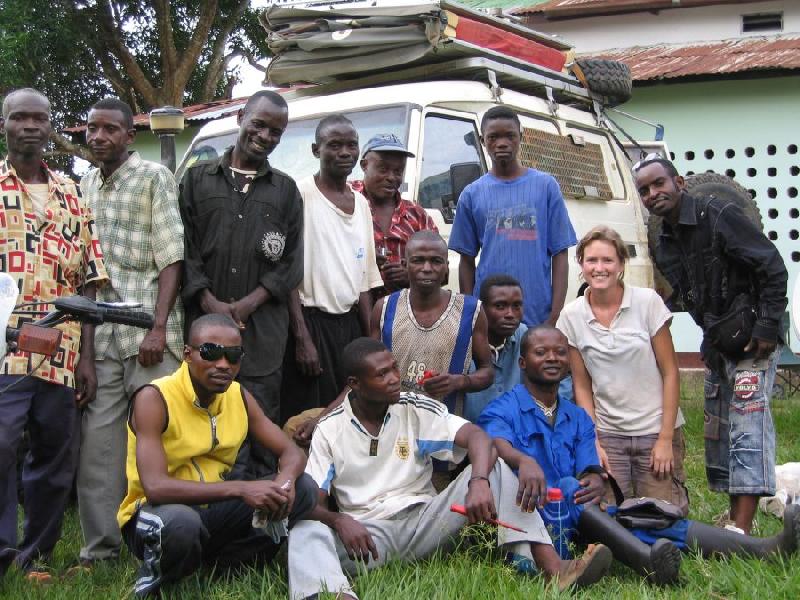
Very carefully we started our journey on the maintained dirt track to Kikwit, 270kilometer from here. We could not remember when we last covered such a distance in a day!
We passed trough Kapia, the village were had tried to make a phonecall. We stopped at the people we had met there earlier to thank them and give them an update on our situation. The sky was clear, so the phone reception was better now and everybody was making use of this to make their calls on the 'GSM hill'
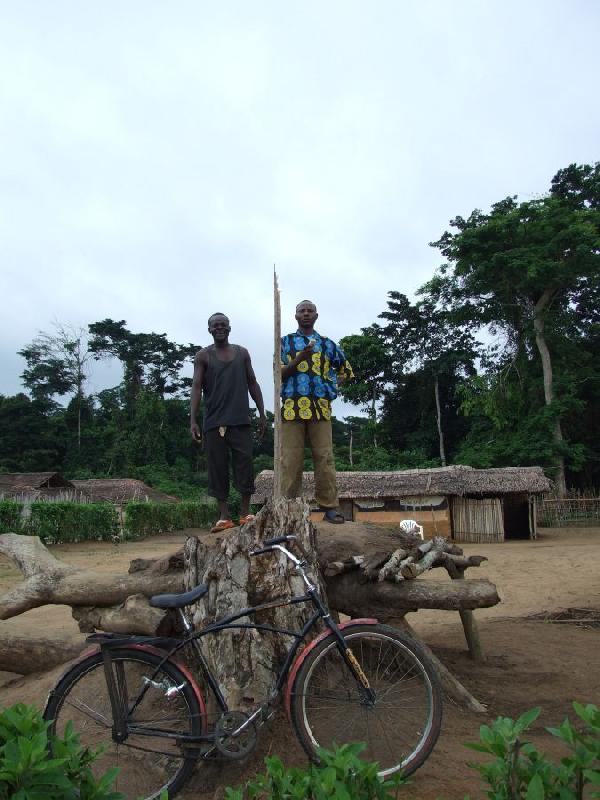
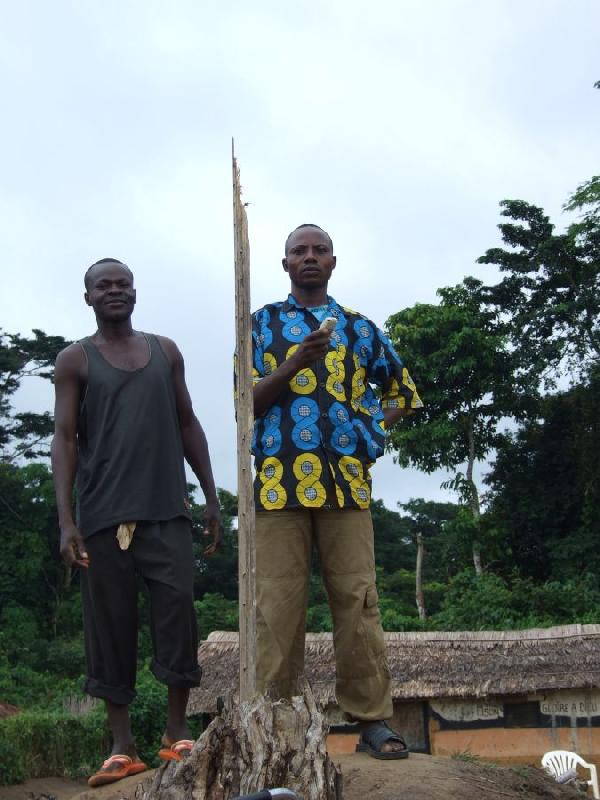
We looked at our crowd when we got out of our tent. We certainly wouldn't miss them! We paid our dues to the mechanics and the housekeeper of the mission and set out to find Mr Shindani to say goodbye.
The mechanics, they didn't lie when they said it would a team. They might not have been real car mechanics, but combined they had all the knowledge required.

Very carefully we started our journey on the maintained dirt track to Kikwit, 270kilometer from here. We could not remember when we last covered such a distance in a day!
We passed trough Kapia, the village were had tried to make a phonecall. We stopped at the people we had met there earlier to thank them and give them an update on our situation. The sky was clear, so the phone reception was better now and everybody was making use of this to make their calls on the 'GSM hill'


The road was maintained by CTB.
Belgian govermental aid. Like the 'mistery' roads we came across
earlier, these roads are mostly handmade. The reasoning is to give as
many people as possible an opportunity to have a job. But the CTB had
been clever enough to use a few machines to compress the earth so the
roads would not be destroyed instantly. At times it was still a bit
rough, but compared to what have been trough it was truly heaven.
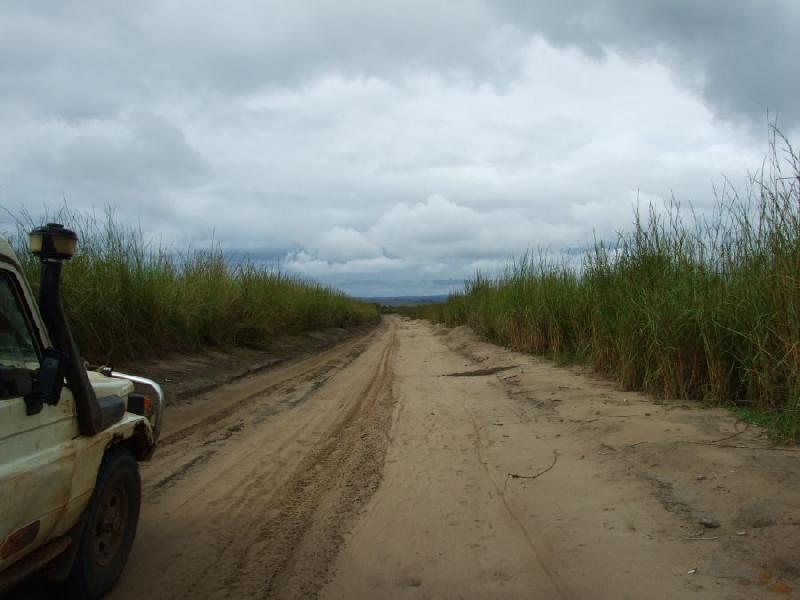
We stopped from time to time to check our rear axles. It was already leaking pretty badly. That kitchen silicone sealant does not really work. Our hearts skipped a beat when we got our front axle stuck on a middelmannetjie. This meant we had to 'force' ourselves out of there. I really did not want to break down here again. Stressfull moments!
We briefly stopped in Idiofa, a bustling town, to fill up on diesel. The fuel light had come on. The first time since we left Lubumbashi. The only diesel we found came out of a dirty bucket. We apologied to our Landcruiser and bought it anyway.
And then we saw something that we hadn't seen in weeks.

We stopped from time to time to check our rear axles. It was already leaking pretty badly. That kitchen silicone sealant does not really work. Our hearts skipped a beat when we got our front axle stuck on a middelmannetjie. This meant we had to 'force' ourselves out of there. I really did not want to break down here again. Stressfull moments!
We briefly stopped in Idiofa, a bustling town, to fill up on diesel. The fuel light had come on. The first time since we left Lubumbashi. The only diesel we found came out of a dirty bucket. We apologied to our Landcruiser and bought it anyway.
And then we saw something that we hadn't seen in weeks.
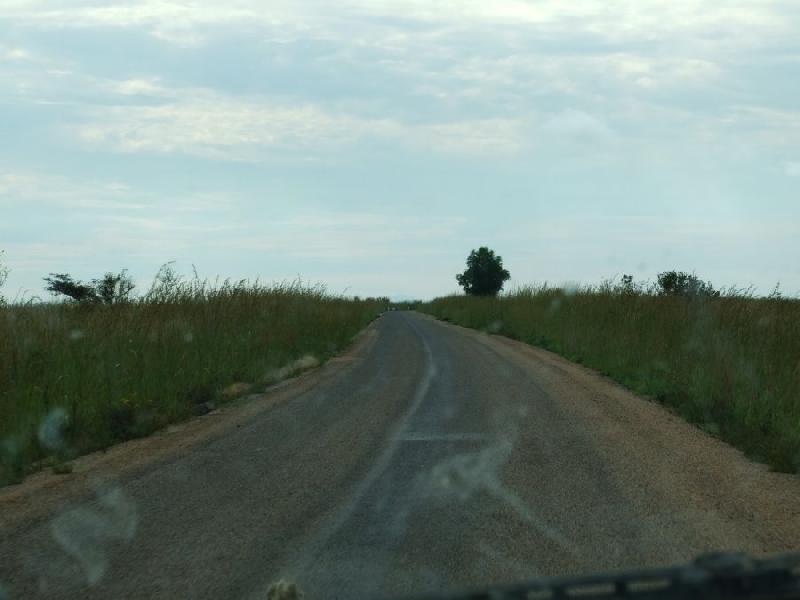
I must admit I don't like asphalt. I enjoy driving on dirt roads. Josephine does not always agree with me regarding that matter. But this time I was properply pleased to see this. It would take the stress out of our rear axle. And it was good to know that our 4th and 5th gear were still there! ;-)
The road is Chinese made. You can recognize the chinese from a distance by the big straw hats they wear. Everywhere in Congo people, especially kids, would shout "Chinois" (Chinese in French) to us. For many Congolese everybody who is not black is "Chinois". That is due to the large community of Chinese living in Congo.
The relationship between China and Congo is worrying to say the least. I will not bore you to death with the details, but if you are interested, do a google search on the deals regarding the mining concessions and you will find plenty to read.
In short: China has lend Congo many billions for rebuilding their infrastructure. Almost all infrastructure works are then outsourced to.. Chinese companies. The chinese companies bring their own - underpaid - workforce and provide little to no employment to the local population. In return for the loan China gets huge mining concessions. Astronomical 'signature fees' were appointed to the officials who signed the contracts ofcourse. The whole deal is immensly beneficial for the Chinese, but the question is what is in it for the Congolese?
And what happens when the 5 billion is spent? They'll have a few nice roads and bridges. But what about maintenance of this infrastructure?
After a few police checks (no more talks about the permit here... ) we arrive din Kikwit. So many people on the street! Such a big city! We got lost a few times but eventually arrived in the mission of the Frère Oblats (Oblates). A very energetic Congolese, Frère Jean-Marie welcomes us. We had also hoped to meet Frère Léon, a belgian missionary, but unfortunately he was in Kinshasa. The mission has Internet access (via satelite, only a few hours a day) and a guest house where we set up our camp.
When the darkness fell it was striking how little light we could see in this big city. Kikwit has an estimated population in excess of 300.000 people. But there is no electricity. The rich can afford to run a generator for a few hours a day, the rest has to make do with candles, oil lamps or nothing at all.
Progress after 31 days since we left Lubumbashi. 36 days since we entered Congo
Kikwit
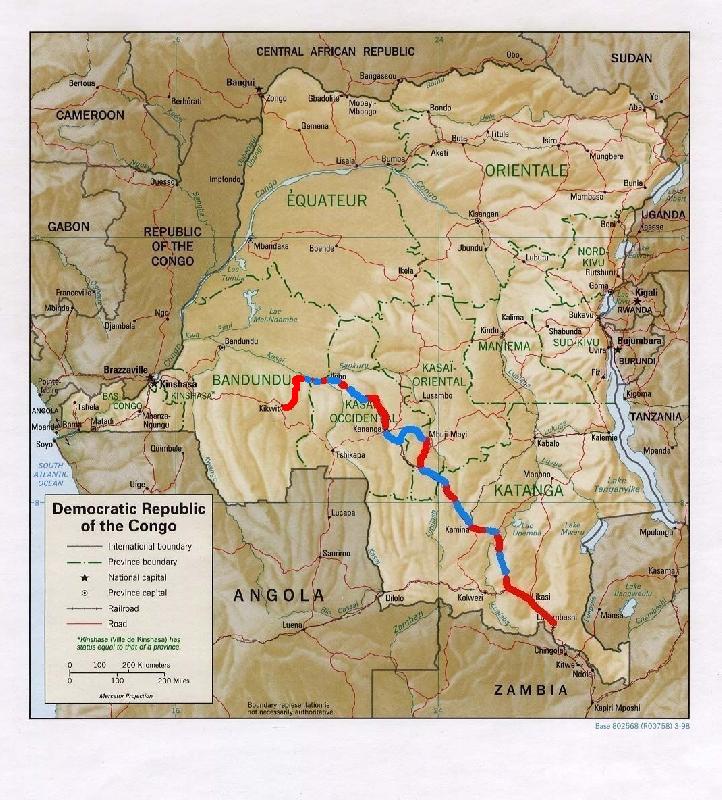
Kikwit

Hi Amtprod! I guess its the same everywhere in the world, even in the 'developed' world. But I have never seen in it such a large scale as in DRC.
Cambodia is a great country. The population there has been trough hell and yet they are so friendly and hopeful. Really lovely people! Last year we got a bit lost in the Cambodian jungle on our bikes... but that's another trip report :bike_rider:
I'm off for the weekend. :camping: :bike_rider: Story continues on Monday.
Sorry ;-)
Sorry ;-)
Day 32
We felt at ease here in Kikwit. We could feel the stress of the state of roads making place for the stress on how to get our car back in a proper condition again. Energetic Frère Jean-Marie came to us with a suggestion to use his mechanics. He had two guys who did all the maintenance stuff on the mission's vehicles. Fair enough. They made an inventory of all the required parts and set off to see if they were available and how much they would cost.
This left us waiting at the mission's guesthouse. They had simple rooms for 15$US a night but without mosquito nets. So we camped in the yard and used the rooms to have a toilet and a shower (what a luxury!).
Every morning we were in Kikwit we would get a visit from the same souvenir seller. It's the first time we met somebody who sells souvenirs in Congo. Not surprisingly as there aren't many people to sell souvenirs to. It was an older guy and he had this determination that souvenir sellers have. We are always very hesitant of showing interest as that means they will not stop trying until you buy something. But we gave in in the end as he had some cool looking stuff and he actually entertained us quite well. We showed interest in a chess game but could not agree on a price.
Later that day the mechanics came back with a list of parts. Most of the parts were not available in Kikwit and would have to be ordered in Kinshasa. And the others were just plain expensive. 200$ for a chinese-made battery, this reeked. We honestly asked Frère Jean Marie about this and he seemed to be a bit embarrased about the topic. He did not deny the prices were inflated but he shrugged at it and said we could afford it anyway. That was a bit dissapointing because we couldn't.
Then came a phone call. It was Paolo, an Italian working for CTB. We had received his contacts earlier and sent him a text message that we were in Kikwit. Paolo, being Italian, has this Italian way of talking and handling things. Flamboyant is the right word I think. He was the right man in the right place for sure!
Paolo is one of these guys that breath Africa. He had lived and worked for many years in Africa, seemingly only in the most horrific troubled areas. He lived in Kikwit now. He would help us to try to get a second opinion on the parts and at the same time invited us to stay at his place.
That night Paolo took us to a restaurant. The only 'restaurant' in Kikwit that served something else then fufu. The only restaurant per se. People here do not have a habit of eating out. The restaurant was a bit hidden away in a flooded backyard and consisted of little more then a few plastic chairs and tables and a makeshift braai. It was owned and run by an older Lebanese guy. He had this horrible cough and looked terrible as if he could drop dead any minute. A younger Lebanese was there too, he had recently arrived 'for business'. I did not ask about his business. I probably did not want to know. But he was a nice guy and even brought a Sheesha. These three were the only 'white people' in Kikwit. They would come together almost every night for a greasy meatskewer with french fries. It's the only thing there was. I loved it.
Why is that they only really hanged out with the three of them in a city of many hundred thousands? Paolo was married to a Congolese (she lived in Kinshasa) so he even spoke the language. The real reason is that once you befriend Congolese one gets caught up in the 'favour' mentality. You cannot deny a favour to a friend. Paolo, as the responsible for CTB had a 'business' to run. He would have hundreds of friends instantly and very soon the first 'favours' would be asked. Jobs, material, money. It would make it impossible for him to work here. He was friendly to his staff and treated them with respect. But he did not befriend them, because it would make his life impossible.
Day 33
The souvenir seller came back and we barthered and joked for another hour but we did not agree on a price.
Together with Paolo we went to the Technical School of Kikwit (not sure of the name, not the one of the Jesuïtes). This is where youngsters get their education as mechanics. The teachers had tons of experience and should know Landcruisers in-and-out. After some negotiation and thanks to Paolo we finally agreed on a price. It was less then half of what we were orignally asked for by the other mechanics. And they would start the work that same afternoon in the yard of CTB.
First job was to dismantle both the front and rear axles. The front to see what was broken. And the rear to fix the leaking seals and see if we could find some planetary gears that were in better condition then the ones we bought in Dibaya-Lubwe.
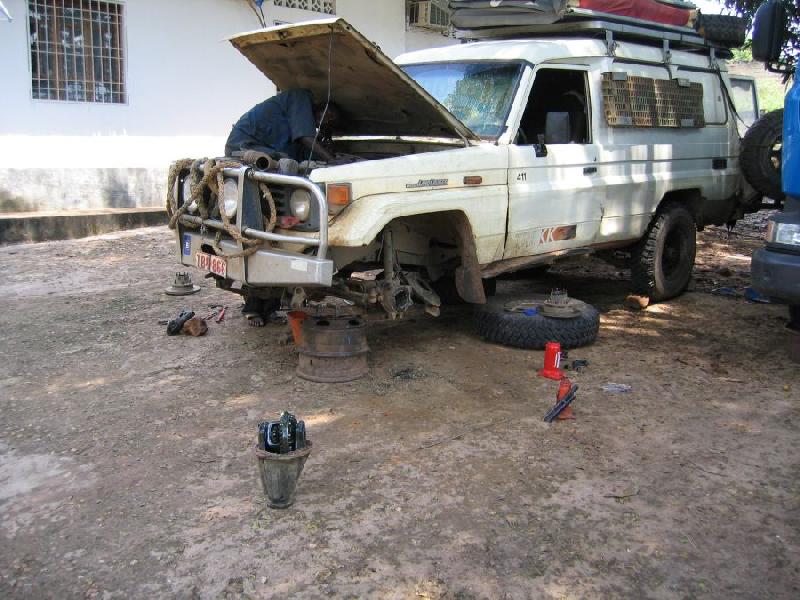
Front diff had the same problem as the rear one. Only here both the sun and the planetary gears would have to be replaced.
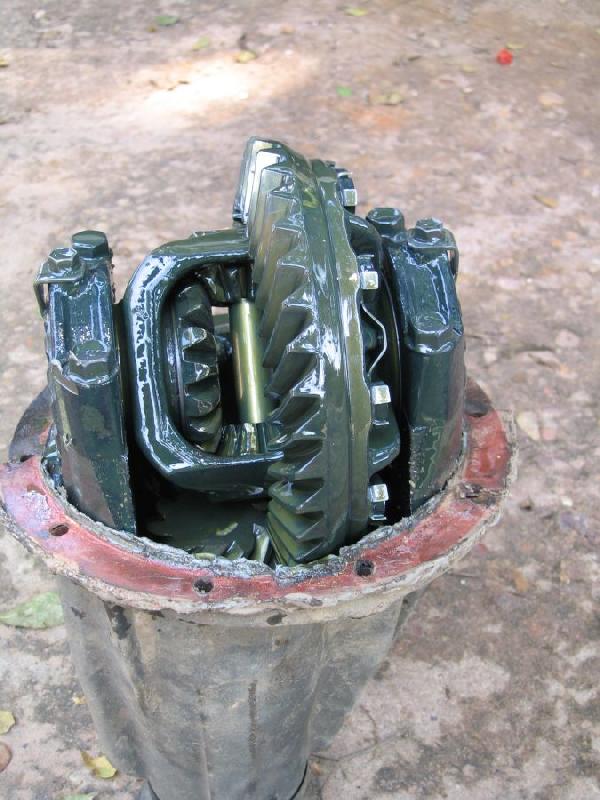
These would need to be ordered from Kinshasa and flown in. That's not easy task to get organized.
By now we also nearly ran out of cash.
We felt at ease here in Kikwit. We could feel the stress of the state of roads making place for the stress on how to get our car back in a proper condition again. Energetic Frère Jean-Marie came to us with a suggestion to use his mechanics. He had two guys who did all the maintenance stuff on the mission's vehicles. Fair enough. They made an inventory of all the required parts and set off to see if they were available and how much they would cost.
This left us waiting at the mission's guesthouse. They had simple rooms for 15$US a night but without mosquito nets. So we camped in the yard and used the rooms to have a toilet and a shower (what a luxury!).
Every morning we were in Kikwit we would get a visit from the same souvenir seller. It's the first time we met somebody who sells souvenirs in Congo. Not surprisingly as there aren't many people to sell souvenirs to. It was an older guy and he had this determination that souvenir sellers have. We are always very hesitant of showing interest as that means they will not stop trying until you buy something. But we gave in in the end as he had some cool looking stuff and he actually entertained us quite well. We showed interest in a chess game but could not agree on a price.
Later that day the mechanics came back with a list of parts. Most of the parts were not available in Kikwit and would have to be ordered in Kinshasa. And the others were just plain expensive. 200$ for a chinese-made battery, this reeked. We honestly asked Frère Jean Marie about this and he seemed to be a bit embarrased about the topic. He did not deny the prices were inflated but he shrugged at it and said we could afford it anyway. That was a bit dissapointing because we couldn't.
Then came a phone call. It was Paolo, an Italian working for CTB. We had received his contacts earlier and sent him a text message that we were in Kikwit. Paolo, being Italian, has this Italian way of talking and handling things. Flamboyant is the right word I think. He was the right man in the right place for sure!
Paolo is one of these guys that breath Africa. He had lived and worked for many years in Africa, seemingly only in the most horrific troubled areas. He lived in Kikwit now. He would help us to try to get a second opinion on the parts and at the same time invited us to stay at his place.
That night Paolo took us to a restaurant. The only 'restaurant' in Kikwit that served something else then fufu. The only restaurant per se. People here do not have a habit of eating out. The restaurant was a bit hidden away in a flooded backyard and consisted of little more then a few plastic chairs and tables and a makeshift braai. It was owned and run by an older Lebanese guy. He had this horrible cough and looked terrible as if he could drop dead any minute. A younger Lebanese was there too, he had recently arrived 'for business'. I did not ask about his business. I probably did not want to know. But he was a nice guy and even brought a Sheesha. These three were the only 'white people' in Kikwit. They would come together almost every night for a greasy meatskewer with french fries. It's the only thing there was. I loved it.
Why is that they only really hanged out with the three of them in a city of many hundred thousands? Paolo was married to a Congolese (she lived in Kinshasa) so he even spoke the language. The real reason is that once you befriend Congolese one gets caught up in the 'favour' mentality. You cannot deny a favour to a friend. Paolo, as the responsible for CTB had a 'business' to run. He would have hundreds of friends instantly and very soon the first 'favours' would be asked. Jobs, material, money. It would make it impossible for him to work here. He was friendly to his staff and treated them with respect. But he did not befriend them, because it would make his life impossible.
Day 33
The souvenir seller came back and we barthered and joked for another hour but we did not agree on a price.
Together with Paolo we went to the Technical School of Kikwit (not sure of the name, not the one of the Jesuïtes). This is where youngsters get their education as mechanics. The teachers had tons of experience and should know Landcruisers in-and-out. After some negotiation and thanks to Paolo we finally agreed on a price. It was less then half of what we were orignally asked for by the other mechanics. And they would start the work that same afternoon in the yard of CTB.
First job was to dismantle both the front and rear axles. The front to see what was broken. And the rear to fix the leaking seals and see if we could find some planetary gears that were in better condition then the ones we bought in Dibaya-Lubwe.

Front diff had the same problem as the rear one. Only here both the sun and the planetary gears would have to be replaced.

These would need to be ordered from Kinshasa and flown in. That's not easy task to get organized.
By now we also nearly ran out of cash.
We
had contacted the homefront with the question if they could find a way
of getting money to us. Western Union and the likes would only do
transactions to Kinshasa, but not to Kikwit. The fees Western Union
charges are also pretty ridiculous. In the end we managed to get in
contact with a Belgian lady in Kinshasa who owns a big company there.
Our familiy would transfer the money to her Belgian account. As soon as
she had received the money she would hand the money in US$ over to a
contact we had in Kinshasa. That contact would then buy the parts we
need, box it and put it on an airplane to Kikwit. Easy! :roll:
That night we were introduced to Timothé, Paolo's cuisinier. Timothé had this angry way of talking and looking, but friendly at the same time. He had special skills. Paolo (and his predecessor in Kikwit) had learned him the art of Italian cooking. He could cook up a pasta - from local ingredients - that an Italian would not critisize... and that is a feature! He was probably the best Italian chef in DRC!
Day 34
The souvenir seller was back that morning, he was in a bit of a hurry because a UN convoy would come for a day visit today. A quick round of haggling but we did not agree on a price.
We made use of the privacy Paolo's house provided to finally relax a bit. It's been a hectic month for us! Josephine decided that now was a good time to get rid of my beard and the carpet on my head. After 40 days of neglect, I couldn't agree more
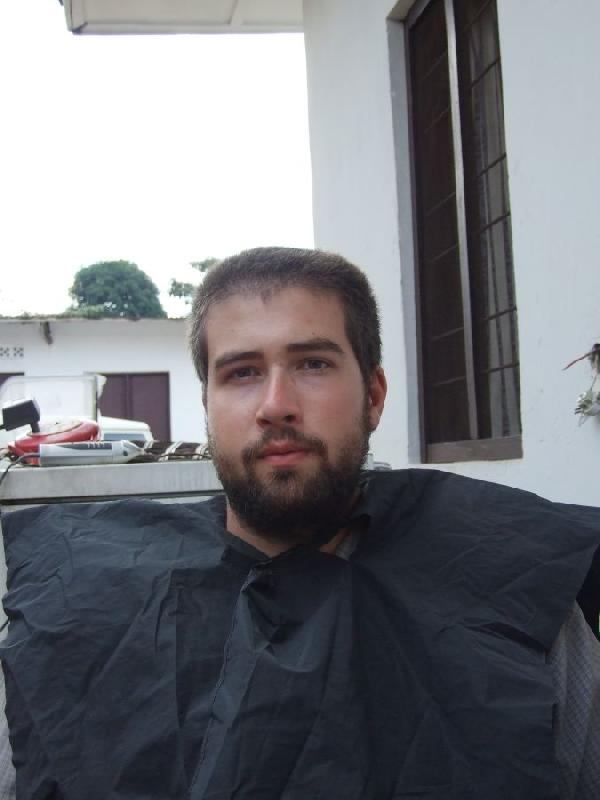
While we waited for the money transfer and the parts to arrive we explored a bit of Kikwit (without a camera, we were suspicious enough already). In the city center 'on the hill' is an area that must have once been a very posh area. I could see the plush gardens and big villa's in my imagination, it was now transformed into rundown buildings. Green walls and makeshift corrugated roofs.
There was a recent asphalt road connecting the RN1 to the airport and across the only bridge over the Kwilu river. Most of the other roads had varying kinds of decaying asphalt or just dirt. On the asphalt road in town there were 'road works'. A big pile of sand was blocking the road with just a narrow path to get a car trough. They had made a toll booth ofcourse. Paolo told us the pile of sand was there now for over 4 years. They would constantly dig away and move the pile back and forth. There were no works, the road underneath the sand was perfectly fine.
Next to the river were a few 'bars'. A few plastic chairs and a cooler with hot drinks (no electricity-no money for ice). The owner of the bar was really glad to see us. He was complaining about business, the prices of basic goods had gone up recently and even less people now had a budget to go for a drink.
The price of eggs had gone up too. Josephine went to buy eggs at the small mission of the sisters. They too were complaining as they actually had too many eggs. They did not dare to reduce the price as that would make the other 'eggsalesman' angry. But it was clear that people could no longer afford eggs now. The sisters kept a monkey as a pet. It was a vicious monkey. Strange pet!
The mechanics fixed what they could without the missing parts (the gears, one hub for the rear axle + all the bolt required for the hub). We got hold of two new batteries. Indian made this time. 100$ a pop. They were junk but it worked for now.
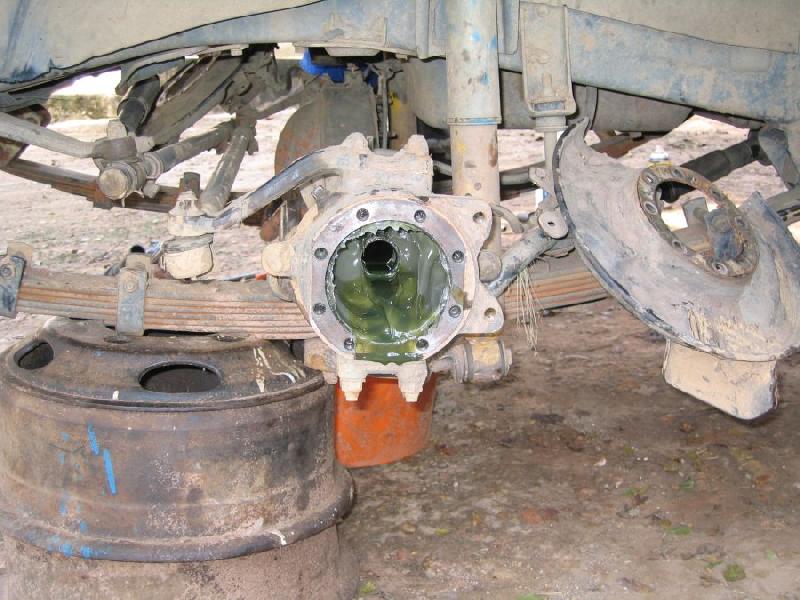
Day 35 - 36 - 37
The souvenir guy came every day, a bit of haggling, a bit of talking. But we could not agree on a price.
We waited and generaly had an enjoyable stay in Kikwit... Paolo is one the most interesting persons we ever met. You should hear his stories!
That night we were introduced to Timothé, Paolo's cuisinier. Timothé had this angry way of talking and looking, but friendly at the same time. He had special skills. Paolo (and his predecessor in Kikwit) had learned him the art of Italian cooking. He could cook up a pasta - from local ingredients - that an Italian would not critisize... and that is a feature! He was probably the best Italian chef in DRC!
Day 34
The souvenir seller was back that morning, he was in a bit of a hurry because a UN convoy would come for a day visit today. A quick round of haggling but we did not agree on a price.
We made use of the privacy Paolo's house provided to finally relax a bit. It's been a hectic month for us! Josephine decided that now was a good time to get rid of my beard and the carpet on my head. After 40 days of neglect, I couldn't agree more

While we waited for the money transfer and the parts to arrive we explored a bit of Kikwit (without a camera, we were suspicious enough already). In the city center 'on the hill' is an area that must have once been a very posh area. I could see the plush gardens and big villa's in my imagination, it was now transformed into rundown buildings. Green walls and makeshift corrugated roofs.
There was a recent asphalt road connecting the RN1 to the airport and across the only bridge over the Kwilu river. Most of the other roads had varying kinds of decaying asphalt or just dirt. On the asphalt road in town there were 'road works'. A big pile of sand was blocking the road with just a narrow path to get a car trough. They had made a toll booth ofcourse. Paolo told us the pile of sand was there now for over 4 years. They would constantly dig away and move the pile back and forth. There were no works, the road underneath the sand was perfectly fine.
Next to the river were a few 'bars'. A few plastic chairs and a cooler with hot drinks (no electricity-no money for ice). The owner of the bar was really glad to see us. He was complaining about business, the prices of basic goods had gone up recently and even less people now had a budget to go for a drink.
The price of eggs had gone up too. Josephine went to buy eggs at the small mission of the sisters. They too were complaining as they actually had too many eggs. They did not dare to reduce the price as that would make the other 'eggsalesman' angry. But it was clear that people could no longer afford eggs now. The sisters kept a monkey as a pet. It was a vicious monkey. Strange pet!
The mechanics fixed what they could without the missing parts (the gears, one hub for the rear axle + all the bolt required for the hub). We got hold of two new batteries. Indian made this time. 100$ a pop. They were junk but it worked for now.

Day 35 - 36 - 37
The souvenir guy came every day, a bit of haggling, a bit of talking. But we could not agree on a price.
We waited and generaly had an enjoyable stay in Kikwit... Paolo is one the most interesting persons we ever met. You should hear his stories!
Nice video. It is more or less the same road yes. We did not go via Kolwezi, but took an alternative track before kolwezi (the part with the private roads). Most of the road must have been similar though.
It's interesting to see that the camera crew probably did not expect it would take that long and did not make it until the end. As you see, it's quite common that journeys into the Congo take a bit longer then a few hours. We reached Bukama (the destination of this truck)after a few days. After Bukama traffic virtually stops at all. Nobody really continues past there. You'd have to be nuts to do that really ;-)
Also interesting to see that they have 3 guys as pointers for the driver. They walk the road and make the decisions. This was Josephine's role in the Congo, and she was on her own obviously. The importance of her role cannot be underestimated!
I should add that Josephine usually does a fair bit of driving as well. As I have a bit more experience with technical driving, I did all the driving in Congo. Many days she walked more in front of the car then she was in it.
Day 38
Guess who was there that morning? Yep! We talked about that nifty looking handmade chessgame, but we couldn't agree on a price...
The whole money transfer thing went pretty smoothly. It is quite amazing really. We just rang up a lady in Kinshasa we have never met and asked her if she could give us a 1000$US please. She obviously waited until the money was on her Belgian account but she then gave the money to some other guy in Kinshasa. Another person we had never met who was now walking around with 1000$US of our money in Kinshasa. Shopping around for spare parts based on a list with spare part numbers. (we had. the Toyota EPC on our laptop). He used our money to pay for the parts, pay for the airfreight into Kikwit and holds on to the rest of the money until we come and pick it up later. An amazing amount of trust was involved in these transactions! And all of that thanks to the contacts we created in Lubumbashi. Amazing! Great thanks to Paolo, Erwin, Thièrry & Valerie!
The airplane that flew our parts in was one of those two engined LET L-410's. They have a really bad reputation because of the many crashes they make. Everybody here tries to avoid them as much as possible. One of the latest crashes made the International news (the crocodile crash): http://www.telegraph.co.uk/news/worldnews/africaandindianocean/democraticrepublicofcongo/8078612/Aircraft-crashes-after-crocodile-on-board-escapes-and-sparks-panic.html
It was now just a matter to get all the parts mounted. As usual, that did not really go as planned. We had ordered a new hub and new bolts to keep the sideshaft in place. But they shipped us the bolts (and the important conic washers) for the Landcruiser 79. Which are different in size from the 75. I was not going to drill my brand new hub to make them fit so we had set out again to find some second-hand bolts. We eventually found a few that fit, it would be good to get us to Kinshasa, but they would have to replaced again in Kinshasa. What a great prospect: even more time to be spent in a greasy workshop!
We still hadn't found decent quality oil. I had really tried my best to find diff oil where it was not explicitly stated "Not for use in cars". The local mechanic said they never change the diff or gearbox oil on new cars. The oil that's put in from the fabric is superior with the oil they can replace it with. They just top up, but never change. When a diff has to be openen, they recycle the original oil.
That brought us on the topic of cars the NGO's and the missions here use. The cars that are deployed in the jungle have a lifespan of no more then 15 to 20.000km. After that they are completely shot. Bodywork, drivetrain, everything. Not surprising really considering the state of the loads and the payloads. Paolo was quite fanatical in his choice for those vehicles: Landcruiser 7x only! The Landcruiser 10* are often used as well, but they don't last on the rough tracks (too much bodywork). He once worked on a project were they had sponsored Mitsubishi's. They were written off after just 2000km.
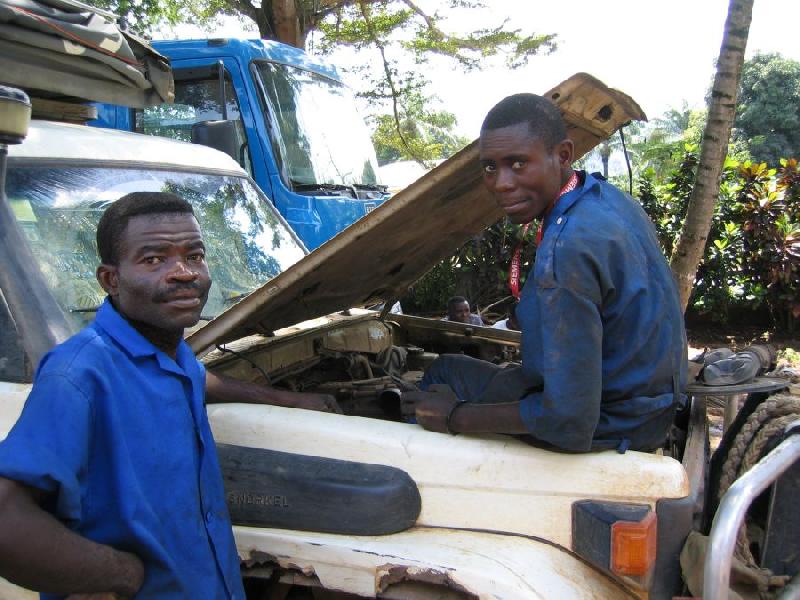
The teacher and his apprentice.
Guess who was there that morning? Yep! We talked about that nifty looking handmade chessgame, but we couldn't agree on a price...
The whole money transfer thing went pretty smoothly. It is quite amazing really. We just rang up a lady in Kinshasa we have never met and asked her if she could give us a 1000$US please. She obviously waited until the money was on her Belgian account but she then gave the money to some other guy in Kinshasa. Another person we had never met who was now walking around with 1000$US of our money in Kinshasa. Shopping around for spare parts based on a list with spare part numbers. (we had. the Toyota EPC on our laptop). He used our money to pay for the parts, pay for the airfreight into Kikwit and holds on to the rest of the money until we come and pick it up later. An amazing amount of trust was involved in these transactions! And all of that thanks to the contacts we created in Lubumbashi. Amazing! Great thanks to Paolo, Erwin, Thièrry & Valerie!
The airplane that flew our parts in was one of those two engined LET L-410's. They have a really bad reputation because of the many crashes they make. Everybody here tries to avoid them as much as possible. One of the latest crashes made the International news (the crocodile crash): http://www.telegraph.co.uk/news/worldnews/africaandindianocean/democraticrepublicofcongo/8078612/Aircraft-crashes-after-crocodile-on-board-escapes-and-sparks-panic.html
It was now just a matter to get all the parts mounted. As usual, that did not really go as planned. We had ordered a new hub and new bolts to keep the sideshaft in place. But they shipped us the bolts (and the important conic washers) for the Landcruiser 79. Which are different in size from the 75. I was not going to drill my brand new hub to make them fit so we had set out again to find some second-hand bolts. We eventually found a few that fit, it would be good to get us to Kinshasa, but they would have to replaced again in Kinshasa. What a great prospect: even more time to be spent in a greasy workshop!
We still hadn't found decent quality oil. I had really tried my best to find diff oil where it was not explicitly stated "Not for use in cars". The local mechanic said they never change the diff or gearbox oil on new cars. The oil that's put in from the fabric is superior with the oil they can replace it with. They just top up, but never change. When a diff has to be openen, they recycle the original oil.
That brought us on the topic of cars the NGO's and the missions here use. The cars that are deployed in the jungle have a lifespan of no more then 15 to 20.000km. After that they are completely shot. Bodywork, drivetrain, everything. Not surprising really considering the state of the loads and the payloads. Paolo was quite fanatical in his choice for those vehicles: Landcruiser 7x only! The Landcruiser 10* are often used as well, but they don't last on the rough tracks (too much bodywork). He once worked on a project were they had sponsored Mitsubishi's. They were written off after just 2000km.

The teacher and his apprentice.
You know it's time to clean your car when...
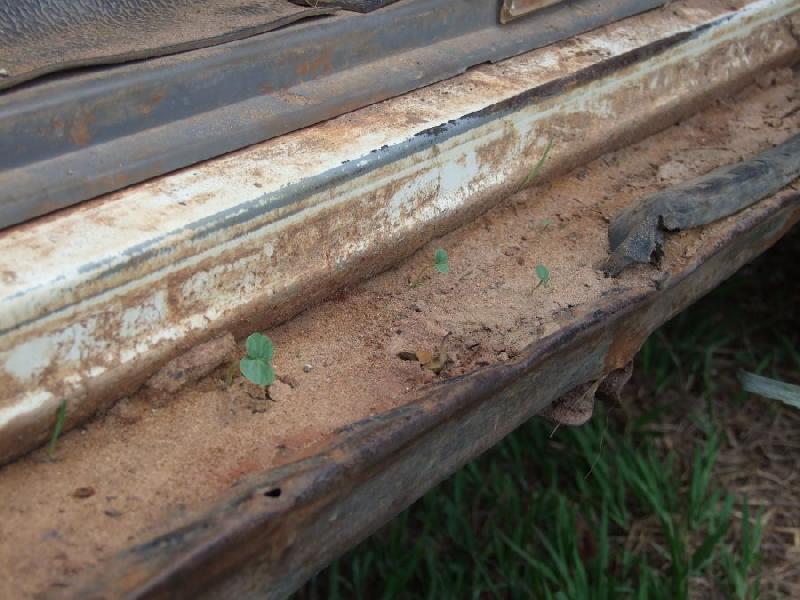
Plants start growing on our sidesteps!
Tomorrow would be the big day. Kikwit to Kinshasa can be done in a day, a 6 to 8 hour drive, depending on the weather (and consequently the state of the road). We'd start early as the closer you get to Kinshasa, the dodgier it gets. Not that it's really dangerous, just the usual problem areas that accompany large cities. We just hoped that all the repairs would hold up.
We had already said our goodbyes to everybody we met in Kikwit.
Day 39
Our favourite souvenir seller was there again. By now we actually got quite fond of his chessgame. I cannot remember his asking price but after all these days of haggling he was still at the same price! He hadn't dropped his price with a single franc! We could talk to him for hours. Providing arguments to drop his price, but at the end of the conversation he would just keep repeating the original price with a smug smile on his face. An amazing guy this was. He knew we were leaving that day so we made him a final offer. Way more then what it was worth and what we were actually prepared to spend on something we really didn't need. He accepted, and while he counted his money he moppered about how he couldn't feed his wives and children. He gave us fat wink at the end. We got tricked into buying something we didn't want for a price we did not want. But he did it so good we didn't even feel bad about it. ;-)
It was time to go. The final stretch to Kinshasa. We had to get organized again in Kinshasa. Fix up our car a bit better. Organize a few visa's. Organize the bac (ferry) across the Congo river to Brazzavile and generally prepare for our final trek north, back to Belgium. 15.000km north, all the way trough Africa. We knew that road north, we had already taken it earlier in this trip in the other direction. This would be our third North-South crossing of the African continent in the same trip... a sad one as it would also mean our 'big trip' would be almost over.
The asphalt road leading out of Kikwit was pretty darn good. And pretty darn straight too.
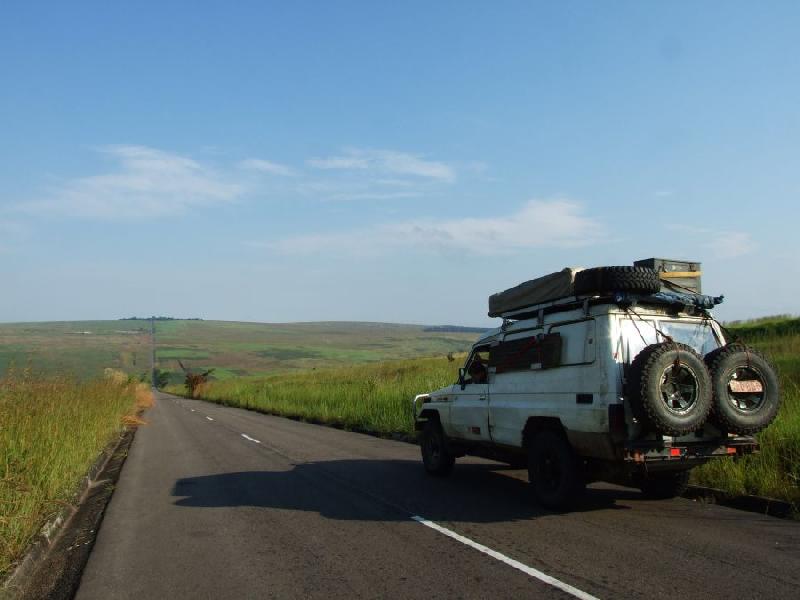
But only a very small part of the road is tarred. Most of it sandy, but it is maintained (by the UN mostly). Some stretches are fast, some are rutted and the known bogholes usually have good detours. Despite this being one of the best roads we had travelled over since entering the Congo, we were still a bit nervous. For the first time since long we had set a goal for the day - Kinshasa - and we would be dissapointed if we did not make it today.
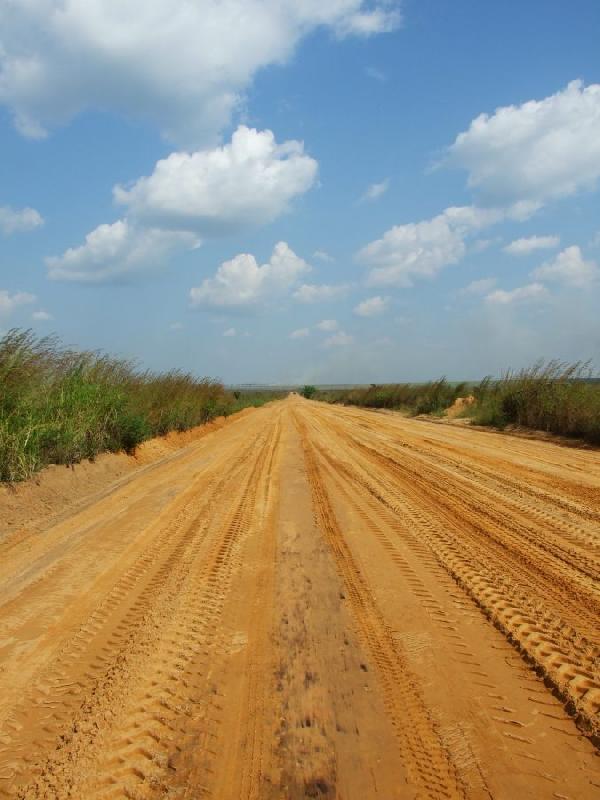
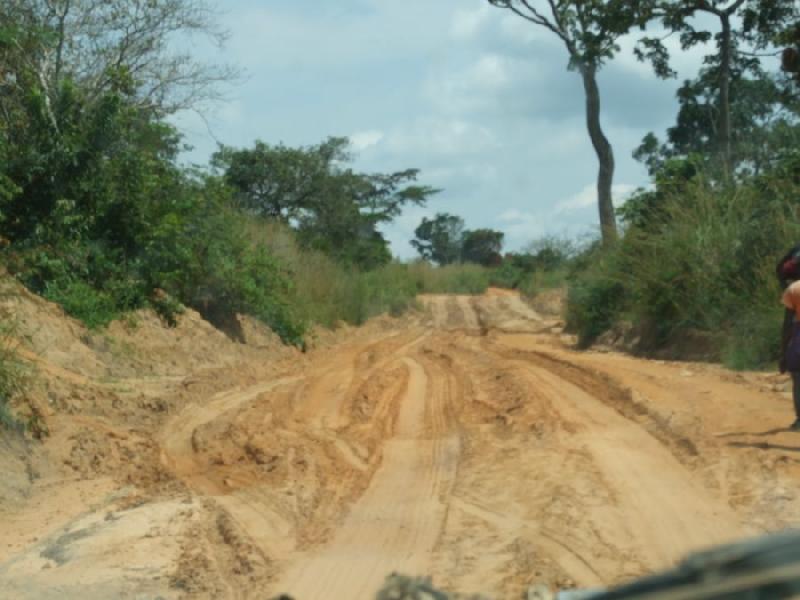
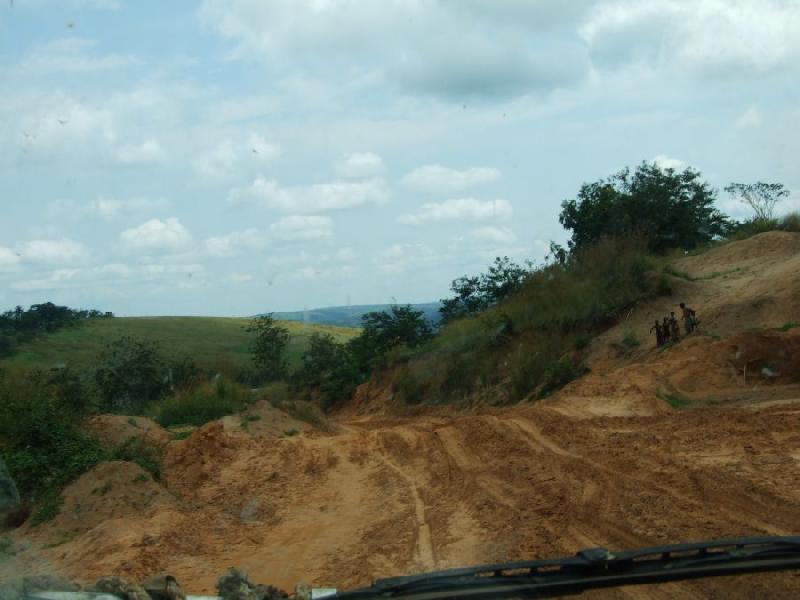

Plants start growing on our sidesteps!
Tomorrow would be the big day. Kikwit to Kinshasa can be done in a day, a 6 to 8 hour drive, depending on the weather (and consequently the state of the road). We'd start early as the closer you get to Kinshasa, the dodgier it gets. Not that it's really dangerous, just the usual problem areas that accompany large cities. We just hoped that all the repairs would hold up.
We had already said our goodbyes to everybody we met in Kikwit.
Day 39
Our favourite souvenir seller was there again. By now we actually got quite fond of his chessgame. I cannot remember his asking price but after all these days of haggling he was still at the same price! He hadn't dropped his price with a single franc! We could talk to him for hours. Providing arguments to drop his price, but at the end of the conversation he would just keep repeating the original price with a smug smile on his face. An amazing guy this was. He knew we were leaving that day so we made him a final offer. Way more then what it was worth and what we were actually prepared to spend on something we really didn't need. He accepted, and while he counted his money he moppered about how he couldn't feed his wives and children. He gave us fat wink at the end. We got tricked into buying something we didn't want for a price we did not want. But he did it so good we didn't even feel bad about it. ;-)
It was time to go. The final stretch to Kinshasa. We had to get organized again in Kinshasa. Fix up our car a bit better. Organize a few visa's. Organize the bac (ferry) across the Congo river to Brazzavile and generally prepare for our final trek north, back to Belgium. 15.000km north, all the way trough Africa. We knew that road north, we had already taken it earlier in this trip in the other direction. This would be our third North-South crossing of the African continent in the same trip... a sad one as it would also mean our 'big trip' would be almost over.
The asphalt road leading out of Kikwit was pretty darn good. And pretty darn straight too.

But only a very small part of the road is tarred. Most of it sandy, but it is maintained (by the UN mostly). Some stretches are fast, some are rutted and the known bogholes usually have good detours. Despite this being one of the best roads we had travelled over since entering the Congo, we were still a bit nervous. For the first time since long we had set a goal for the day - Kinshasa - and we would be dissapointed if we did not make it today.



39 days after we rolled out of
Lubumbashi, we limped into Kinshasa. People who have driven around
Kinshasa will surely recognize the tension that is always present in the
city, to us it felt like coming home. This "Kinshasa tension" is so
much tamer the "interior-of-Congo tension". Strange how perceptions
change during a trip. The previous time we were in Kinshasa we were
pretty impressed with this 'tension' and did not feel at ease at all.
Granted, it might have had something to do with the elections that were
going on at that time.
The other reason it felt like coming home was because of the great reception we had from Erwin & Diana. We had met Erwin in Lubumbashi (he was visiting there) and they lived here. Not only were they genuinely nice people. They also knew how to cook a genuine Belgian meal. Never before have I enjoyed "hesperollekes met kaassaus" before!
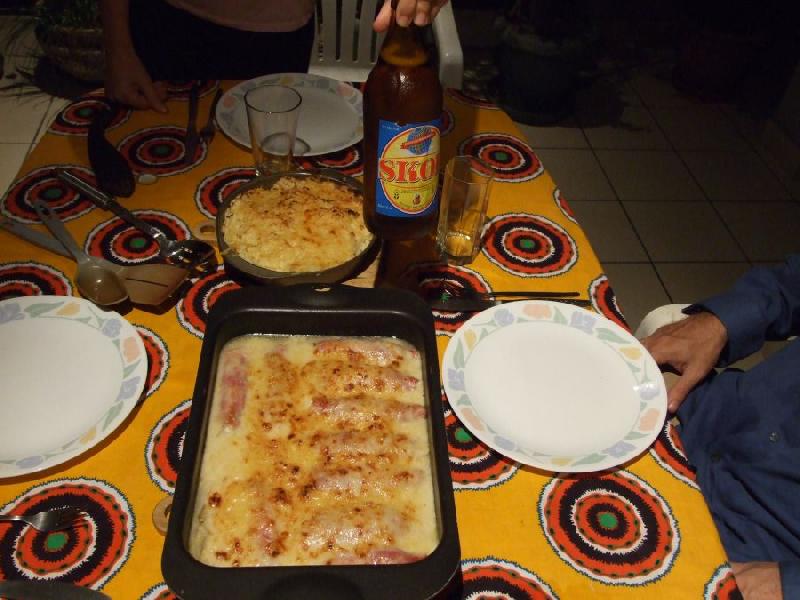
Note the Skol without the diamond on the label.
The nervousness and anxiousness I discussed all the way in the beginning of the trip finally dissapeared. That nervous feeling when crossing a border of a country had up to now always dissapeared within minutes after meeting the first people. In Congo it had taken 44 days.
The other reason it felt like coming home was because of the great reception we had from Erwin & Diana. We had met Erwin in Lubumbashi (he was visiting there) and they lived here. Not only were they genuinely nice people. They also knew how to cook a genuine Belgian meal. Never before have I enjoyed "hesperollekes met kaassaus" before!

Note the Skol without the diamond on the label.
The nervousness and anxiousness I discussed all the way in the beginning of the trip finally dissapeared. That nervous feeling when crossing a border of a country had up to now always dissapeared within minutes after meeting the first people. In Congo it had taken 44 days.
Progress after Day 39 since we left Lubumbashi. Day 44 since we crossed the border into DRC.
Kinshasa
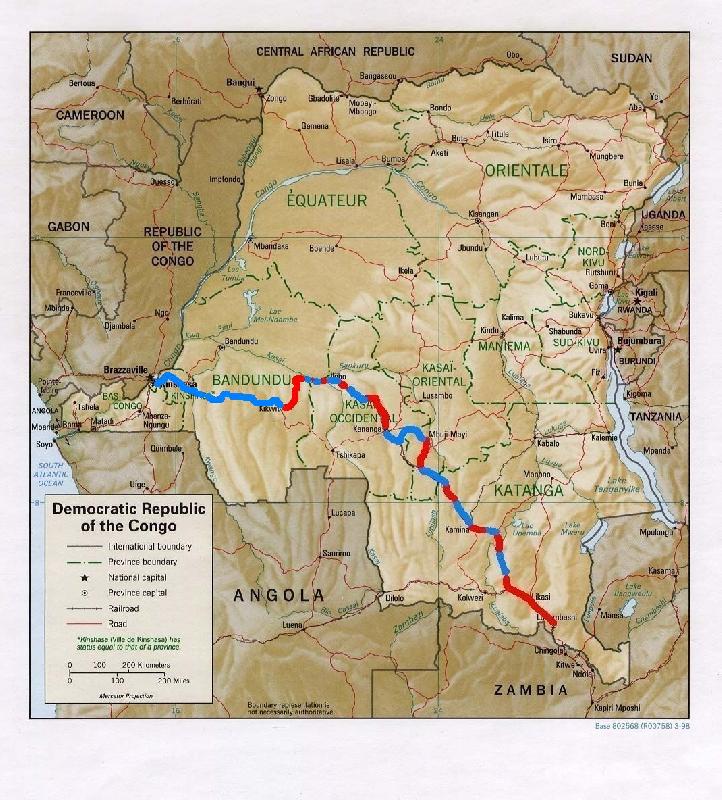
Kinshasa

Day 40 - 41 - 42 - 43 - 44 - 45
We had a lot of things to do in Kinshasa. We did not have a visa yet to get out of the country (Congo-Brazzaville). And to avoid having to drive all the way to Franceville in Gabon we already applied for our Cameroon visa too. Gabon did not want to give us a visa for reasons not really clear to us. We would have to apply for that visa in Brazza. This whole process takes a few days.
Then there was the car. On the road from kikwit to Kinshasa we had noticed our rear differential was leaking again. Problem is the seal and the liquid sealant they use here. Normally there is a rubber gasket, but nobody stocks this gasket in the entire DRC. A lot of differentials here are leaking, that's for sure. We had to buy a sheet of plasticky gasket material and cut one out ourselves. A lengthy task. At the same time we had to get our lights fixed, most of them were smashed up by now. And then there were the brakes that still had to replaced (although I got quite good at driving without brakes now. It's an art in itself!) and it was about time to change all the filters too.
Somehow we managed to engange the most horrible mechanic we have ever met. We actually went to some sort of 'upmarket' workshop as we wanted to get things fixed properly this time. The manager was a nice guy, unfortunatly his chief-mechanic, a Lebanese youngster, was nothing more then a prick. He treated his mechanics as slaves and was uncapable of doing anything useful himself. He 'fixed up' our electrics. He could not find the reason why the fuse of the brake light kept jumping. His solution was to bypass the fuse. He declared it fixed and ofcourse did not tell us he had bypassed that fuse. We almost lost our car to the flames a few days later when a fire started behind the dashboard when the stoplight wiring shorted out again.
It was pretty cool to find some western goods again. We could not really afford much of it, as prices here are prohibitively expensive. Kinshasa ranks high up the list of most expensive cities in the world (right next to Luanda). This is because the country is so unstable that all businesses are high-risk business. Building a house to rent it out? You'd better make sure you get your investment back within a few years time, before the next ransacking starts, or before some official claims your house. Running a business? Better account for all the theft, the bribes, etc and include it in your margin.
When all was done (well.. more or less done) we were ready to hit the road. This little ride in the Congo was quite something, but it was time to explore other regions now.
We drove to 'le beach' the ferryport in Kinshasa. Only to notice that is was remarkebly quiet here. Not the usual bustle that is going on here.
The bac (ferry) was not running. "Problème administratif". We couldn't find out the exact reason, but we were not leaving Kinshasa today!
"Peut-être demain" - "Maybe tomorrow"
The bac to Brazzavile is the only way to get out of Kinshasa and into Congo-Brazzaville.
We had a lot of things to do in Kinshasa. We did not have a visa yet to get out of the country (Congo-Brazzaville). And to avoid having to drive all the way to Franceville in Gabon we already applied for our Cameroon visa too. Gabon did not want to give us a visa for reasons not really clear to us. We would have to apply for that visa in Brazza. This whole process takes a few days.
Then there was the car. On the road from kikwit to Kinshasa we had noticed our rear differential was leaking again. Problem is the seal and the liquid sealant they use here. Normally there is a rubber gasket, but nobody stocks this gasket in the entire DRC. A lot of differentials here are leaking, that's for sure. We had to buy a sheet of plasticky gasket material and cut one out ourselves. A lengthy task. At the same time we had to get our lights fixed, most of them were smashed up by now. And then there were the brakes that still had to replaced (although I got quite good at driving without brakes now. It's an art in itself!) and it was about time to change all the filters too.
Somehow we managed to engange the most horrible mechanic we have ever met. We actually went to some sort of 'upmarket' workshop as we wanted to get things fixed properly this time. The manager was a nice guy, unfortunatly his chief-mechanic, a Lebanese youngster, was nothing more then a prick. He treated his mechanics as slaves and was uncapable of doing anything useful himself. He 'fixed up' our electrics. He could not find the reason why the fuse of the brake light kept jumping. His solution was to bypass the fuse. He declared it fixed and ofcourse did not tell us he had bypassed that fuse. We almost lost our car to the flames a few days later when a fire started behind the dashboard when the stoplight wiring shorted out again.
It was pretty cool to find some western goods again. We could not really afford much of it, as prices here are prohibitively expensive. Kinshasa ranks high up the list of most expensive cities in the world (right next to Luanda). This is because the country is so unstable that all businesses are high-risk business. Building a house to rent it out? You'd better make sure you get your investment back within a few years time, before the next ransacking starts, or before some official claims your house. Running a business? Better account for all the theft, the bribes, etc and include it in your margin.
When all was done (well.. more or less done) we were ready to hit the road. This little ride in the Congo was quite something, but it was time to explore other regions now.
We drove to 'le beach' the ferryport in Kinshasa. Only to notice that is was remarkebly quiet here. Not the usual bustle that is going on here.
The bac (ferry) was not running. "Problème administratif". We couldn't find out the exact reason, but we were not leaving Kinshasa today!
"Peut-être demain" - "Maybe tomorrow"
The bac to Brazzavile is the only way to get out of Kinshasa and into Congo-Brazzaville.
Day 46
We tried again to take the ferry. It was still not running. Some paperwork was not in order to release the ferry and apparantly the official who had to sign the document could not be located. Both ferries were stuck on the other side. Maybe that afternoon.
We came back that afternoon: Nope.
Day 47
Great news: all the paperwork was done. But today was an official holiday in Congo. Nobody worked that day... so no ferry
Day 48
We were finally able to board the ferry. We had previously used the other ferry which are three boats attached to eachother (in a rather dodgy way). This time we took the bigger ferry. Bigger did not mean we had more space. As the ferry hadn't run for a few days there was a lot of stuff that needed to get across.
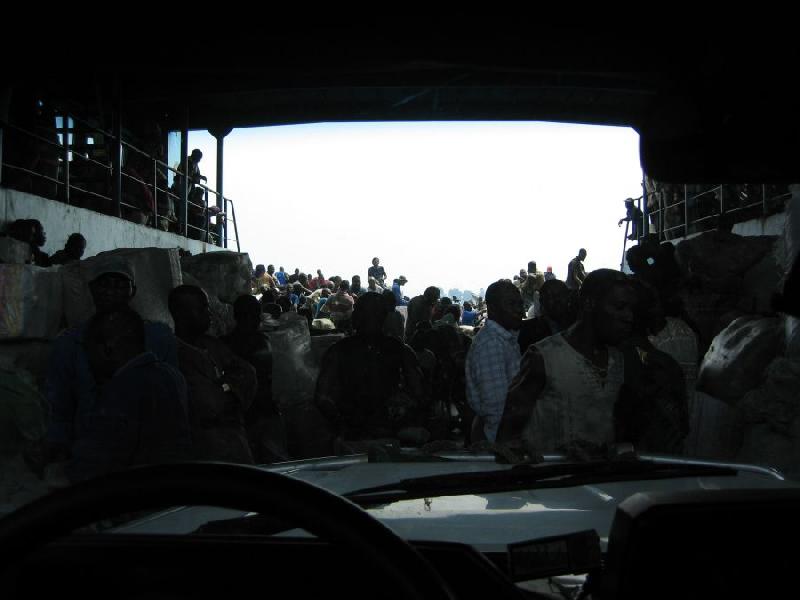
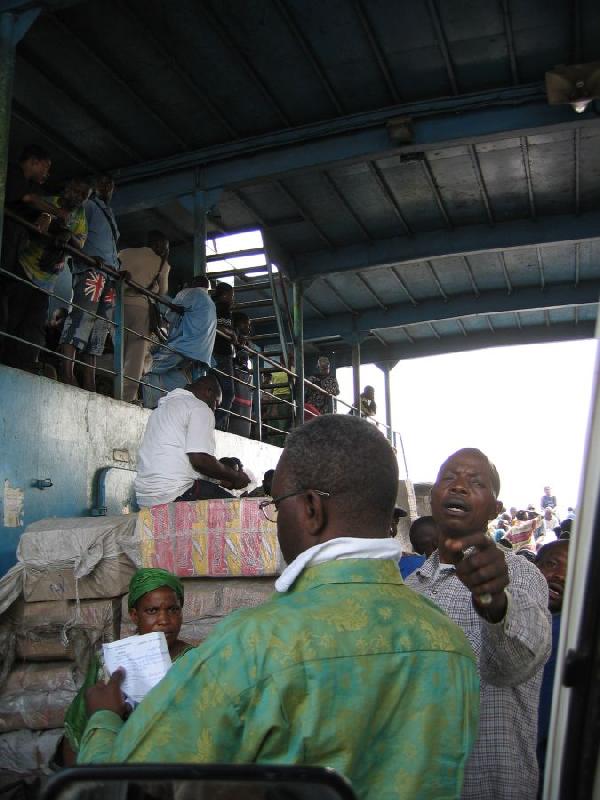
The ferry's diesel engine made a slow rythmic noise and struggled to push the heavy ferry upstream over the Congo river. The skyline of Kinshasa became smaller with every beat.
We had spent 53 days in Congo, and had gotten out just in time. Our visa was expiring in 2 days time.

And thus ends our leisurely stroll trough the Congo..
(Keep reading, wrap-up and more background information still to come)
We tried again to take the ferry. It was still not running. Some paperwork was not in order to release the ferry and apparantly the official who had to sign the document could not be located. Both ferries were stuck on the other side. Maybe that afternoon.
We came back that afternoon: Nope.
Day 47
Great news: all the paperwork was done. But today was an official holiday in Congo. Nobody worked that day... so no ferry
Day 48
We were finally able to board the ferry. We had previously used the other ferry which are three boats attached to eachother (in a rather dodgy way). This time we took the bigger ferry. Bigger did not mean we had more space. As the ferry hadn't run for a few days there was a lot of stuff that needed to get across.


The ferry's diesel engine made a slow rythmic noise and struggled to push the heavy ferry upstream over the Congo river. The skyline of Kinshasa became smaller with every beat.
We had spent 53 days in Congo, and had gotten out just in time. Our visa was expiring in 2 days time.

And thus ends our leisurely stroll trough the Congo..
(Keep reading, wrap-up and more background information still to come)
The Wrap-up
(It's going to be long... sorry. I normally don't like to be so serious, but I feel I have started something and I have to finish it. If you're only interested in the technical bits, they are the end)
So is that what Congo is really like?
Ofcourse not! This is what Congo could be like if you try to drive a 4x4 from Lubumbashi to Kinshasa.
In the beginning of the rainy season.
Unsupported.
In 2008.
After being on the road non-stop for more then 600 days travelling half of the world.
...
That is a very specific situation and leads to very specific events with specific people who show a specific behaviour. It can hardly draw a representative picture about the Congo, about us or about overland travel in general. (I feel like I am writing a typical American disclaimer here, please don't put your children in the microwave oven! )
)
The important bit here is: it's a trip report. Nothing more nothing less. I have told the events as they have happened. I have added the extra dimension to describe our feelings and thoughts at that moment. I have no hidden agenda. I am not trying to push my own agenda/principles/opinions on you. I am not paid to write this trip report nor am I representing some company whose interest I might be defending. My job or my future does not depend on it. As a result I have no reason to paint a nicer, or worse, picture then how it really was. I have been very honest about everything that has happened and made ourselves very vulnerable for critisism at that as I also do not hide our mistakes. It is also important to note that we are not complaining or whining when we repeat certain things (the corruption, the bribes, ..). Those are just the things that happened, I tell them how it happened and how we felt at that moment. When all is said and done you must certainly not forget that this report is just a simple unambitious report. Not an opinion article in your favourite magazine. Not an official report describing humanity in Congo. Not an overland handbook on how to traverse the Congo and interact with the 'locals'. Oh.. and English is my third language, so sorry about the spelling!
The result is a very crude story. Certainly not a happy story. You might even have a foul taste in your mouth when reading certain passages. Because of the description of the misery. Because of our behaviour.
Please, allow me to add a bit more perspective and hopefully make you understand - if only a little - the view of Congo we gave trough our eyes.
What happened before you entered Congo?
The complete answer is ofcourse impossibly long, but I feel it is important to summarize a bit what we have been up to before, as I think some people think the Congo story is a stand-alone event where we flew in and when it was done flew back out again. An impulsive plan just for the sake of adventure. It wasn't.
in 2006 we sold all our belongings (literally: ALL), quit our jobs, took all of our saving money and decided to go on a little trip. We had done our homework during the many months/years we had saved up for it and bought and prepared a Landcruiser. (I will go into further detail on the preperations later on). We planned to travel for 1 year. People who have done this too will certainly remember the moment when you say goodbye to all your family and friends knowing you will not see them for an entire year. That is a big decision to make. We travelled overland, 25.000km down Africa (west route) and after 9 months found ourselves in South Africa. We liked the travelling so much and found it such a pitty that we had such little time left to drive back that we started counting our money: Lo-and-behold, if we didn't do crazy stuff we could extend our 1 year trip with another year. We shipped our car to Japan and from there drove trough Siberian Russia, Mongolia, Central Asia (all the *stan countries), the middle east back to Africa. Once there, we really longed to visit the East side of Africa and while we were at it we could visit DRC, a country that I have dreamed and read about for so long. So that is what we did. After the traverse of DRC we would find ourselves back on the westcoast and we would drive back north as central as possible (via Niger-Algeria) which was a pretty daunty route in 2008. We travelled for 715 days non-stop. 100.000km. We never went home or even set foot on the European continent during that time. In fact, we did not have a 'home' apart from our car. We had crossed dozens of remote deserts, driven trough some of the most barren mountain ranges in the world, hacked ourway trough many jungles. Returned on our paths many times when we though we were risking it too much. Always unsupported. Always with the two of us. Always with the same car.
We had been in Kinshasa the first time in 2006 with the plan to drive to Lubumbashi. We had done our preperations and were ready. But then the elections came and Kinshasa transformed into a war zone, and lef the rest of the country as unstable as it could be. We rushed out of the country towards Angola at that time.
By no means do we consider ourselves experienced travellers or experts in Africa or "Third World problems" (and certainly not in their solutions). The first months of our trip were quite difficult. Learning to adapt to the cultural differences, how to deal with officials, bribes, corruption. Seeing and living between poor people. Seeing the influence foreign aid has (good and bad). Seeing the attitude of people change when crossing country borders... when crossing continents. After a while we got the hang of it. It's a continuous search for balance and when you think you found it, things change again and you need to rethink everything all over again. It never ends. But that's allright for us. We did stupid things every single day. We still do. We have always done. But we do try to learn from our mistakes.
You just did this for your own pleasure? What about supporting a good cause?
We prepared this trip for many, many months so ofcourse this topic came across. Many people do it. But if you dig a bit deeper one really needs sponsorship to get started. We have also seen people who only do the good cause thing to get sponsorship. Fair enough, they get a few bits and pieces to bolt onto their car and in return raise a bit of money for some NGO in return. Usually not too much, but every bit helps. A win-win situation. But this did not fully convince me. I do not feel comfortable with sponsorship if I have the feeling I am not retuning something valuable. I am just not good at selling myself(and too honest). I also don't like a car plastered with stickers when travelling around, it draws way too much attention. I also feel uncomfortable with many NGO's. There are many, many good projects, but there are probably an equal amount of nonsense projects as well. If I attach my name to a project, I want it to be a genuine project. To make a long story short I am not good at this entire sponsorship/aid thing and would probably have made a mess of it. That does not make us heroes, but that is allright because we are no heroes.
How can you travel trough such impoverished countries without providing them with some sort of aid? Be it money or supplies or volunteer work?
I felt guilty about that in the beginning, certainly when we decided not to attach support to some good cause to our trip. But why was that?
Why is it that we have no problem spending millions on a house and a new car. Eat out, wear fancy clothes. Go on a beach holiday to the other side of the world. And never feel guilty about it? But as soon as we set foot in poor-poor Africa that attitude changes and we feel we MUST provide aid. We could all cancel that Internet subscription we have and send that money to Africa every month. A ridiculous thought ofcourse... but yet, we cannot set foot on African soil without bringing a stash of old clothes, a gazillion of pens and feel best about it when our car is plastered in stickers from NGO's. Not that there is anything wrong with that (well, sometimes there a few things wrong with that), but why do we feel as if it is a necessity?
Isn't there a poor part of our hometown? Don't we ever pass trough there? Do we support these local causes?
Do we feel guilty when we see a begger in our hometown? Do we have the instant reflex to give that begger a ridiculously large amount of money and a pen? Ofcourse not, because we are afraid he'll spend it on a bottle of liquor from the nightshop. But why don't we care about what happens to the aid we all sent to Africa? Ever been to a market in Africa? You can buy your donated T-shirt back and all the pens we have thrown out of the window when blasting past.
Give sweets to children? You'll get paid with an instant smile and it will make you feel realy good about yourself. Do you also give them toothpaste and brush? Pay the dentist? Do you know these kids can earn more by looking sad at the side of the road then their parents earn working? Parents actually stop sending them to school and make them stand at the side of the road as it is so profitable. So by giving a sweet to a kid you could have potentially been (partly) responsible for it dropping out of school and waisiting all chances of a good future. Far fetched you think? Not really I'm afraid. I have seen that first-hand in several countries. Does that mean you cannot do something as simple as give a sweet to a kid? Ofcourse you can. But in our hometowns, we don't just give sweets to children we don't know, do we? We usually even ask at the parents if we can. Providing aid requires a bit more then just giving away a few things. That is what makes it so hard when you are constantly on the move. Now substitue sweet with any other thing you would like to donate.
I can go on for a long time with questions like that.. There is SO much that can go wrong with providing aid. That is ofcourse no reason not to provide aid, but at least we should appreciate the fact that it is a bit more complicated then we would like to think. I have no answers, I don't know how to do it 'right'. I try my best in own way and I can only hope others do the same.
Jay Leno, of all people, once said: "In America, we like everybody to know about the good work we do anonymously". The in America bit is not important(replace it with 'western world' maybe?), but the rest is. He said this about why the Toyota Prius was so popular while he thought it was not really saving the planet at all. It's all about image.
Sensitive topics. Who doesn't want to save the planet? Who doesn't want to do something about poverty in Africa? The reality is, we don't do much AT ALL, but we want to keep up the image. And we even convince ourselves that we do. And preferably we want to boast about it on the Internet, show off on our websites, talk about it on forums. We want to write books about it, want to discuss it. We want everyone to know how important WE think it is. And preferably at the same time belittle people whom we think don't do enough. And you know what, at the end of the day there is no more time, money or resources left to actually do something about it. But we sleep good at night ofcourse, it's the others who failed, not us! And we have a portfolio to prove it!
This is ofcourse very unfair to the many people who are actually helping out on the field. Or assisting with logistics from abroad. As always it is very unfair to generalize. People like Frère Louis we met in Congo is one of these people. Their generosity and engagement is endless. I have immense respect for him. Nobody knows about him ofcourse... he's too busy doing 'the good thing'. He is definitaly somebody worth supporting in any way possible. If you really want to donate, I think that is the way to go. Find a reliable organisation person and give it them with as little in-between people as possible. Who would have thought that providing aid would be such hard work eh?
So how does that correlate to our adventure in Congo? The reality is: there was very little we could on the ground. We did not have the time, we did not have the money, we did not have the supplies. Time, money and supplies, all of it can be generated. But for us, at that time, it was not possible. Period.
The everyday little gestures(giving and receiving) don't usually make our trip reports. They are just the most normal things in the world - not worth mentioning(at least not for the right reasons). If we receive exceptional hospitality, we will write about it. I we provide exceptional help, we will (probably) write about it. If you do not read many good experiences in our trip report... that's because they did not happen and I did not want to make the little gestures - both directions - look bigger then they really were.
I wrote the anecdote of the guy on a little motorbike who asked for oil. If I had just given it to him and nothing would have happened I would not have written about it. I wrote about it because it struck me that I was so hard at that time to him. The whole series of events prior to that situation made me act that way. I do not approve my behaviour. I felt bad for that guy afterwords, I wished I would have reacted otherwise. But put me in exactly the same situation and I would react exactly the same. That's the whole point: Congo changed our normal behaviour. Nowhere in Africa (or elsewhere) had we experienced this to such an extent. That is what I write about. That is also why I dared referencing to Conrad's book.
Have you noticed how little this entire explication actually takes the Congolese (or other benificiaries of our aid) opinion into account? It does not seem to matter much in most discussions I have seen. I often make the mistake of forgetting that all this aid we are discussing is actually meant for a real live person. And I don't think I am alone. So what is his idea about all this aid stuff? Do we actually care when, for the umpteenth time, we have this discussion? Or do we think we are expert enough to know his opinion without asking?
Ok, but why don't you pay for services you receive? Why do you expect freebies from some of the poorest people in the world?
That seems to be a hot topic for many people and for starters I would like to recommend to reread my report again. Because asking something for free is something I never do. I don't even dare it at home. That does not mean I will not accept anything for free if people insist. But asking? Sorry, no. Expecting? Even less.
I am very proud on the way we take our responsibility if we take risks. We often take risks (as you might have noticed), but never will we not accept the concequences. We got stuck hundreds of time and we knew we would before we entered Congo. We always started working our way out on our own. We did not ask for help when we thought we did not need it, and we rarely did. Yes, I did get cross when people begged when we were digging. But it's not like they were offering help in return for money, they were just begging. Was it friendly to be cross? Ofcourse not.. but hey, I am a human being like all of us you know.
If we get offered help (we did not ask, remember) in return for money and we do not really need it, we usually decline. Our experience tells us that we lose more time with negotiating about the price then with fixing it ourselves. Our experience in Congo tells us that, unlike most other parts of Africa, the asking price will be insanely high to start with anyway and the discussions will probably be very heated (we have to think about our security too). Does that mean we have denied them the chance for a quick job? It certainly does! But it is just impossible, and dangerous, to proceed like that all the time. That is the reality and sorry to dissapoint you that it does not correspond to what you would have liked us to do.
What if people started helping us, why did I tell them they would not get any money? Unlike us, westerners, these people do not need fancy contracts with addendums and disclaimers. They know perfectly well what I am saying. They also know I am a mundele who might not know the regular customs, so they take a very small risk that they will not actually receive anything. But these people are not stupid. Nor are they ignorant. They know they will get rewarded. They know they will get rewarded more then if they would be helping a fellow Congolese. But it will not the be the 'Grand Prize' they had hoped for in the beginning.
(It's going to be long... sorry. I normally don't like to be so serious, but I feel I have started something and I have to finish it. If you're only interested in the technical bits, they are the end)
So is that what Congo is really like?
Ofcourse not! This is what Congo could be like if you try to drive a 4x4 from Lubumbashi to Kinshasa.
In the beginning of the rainy season.
Unsupported.
In 2008.
After being on the road non-stop for more then 600 days travelling half of the world.
...
That is a very specific situation and leads to very specific events with specific people who show a specific behaviour. It can hardly draw a representative picture about the Congo, about us or about overland travel in general. (I feel like I am writing a typical American disclaimer here, please don't put your children in the microwave oven!
The important bit here is: it's a trip report. Nothing more nothing less. I have told the events as they have happened. I have added the extra dimension to describe our feelings and thoughts at that moment. I have no hidden agenda. I am not trying to push my own agenda/principles/opinions on you. I am not paid to write this trip report nor am I representing some company whose interest I might be defending. My job or my future does not depend on it. As a result I have no reason to paint a nicer, or worse, picture then how it really was. I have been very honest about everything that has happened and made ourselves very vulnerable for critisism at that as I also do not hide our mistakes. It is also important to note that we are not complaining or whining when we repeat certain things (the corruption, the bribes, ..). Those are just the things that happened, I tell them how it happened and how we felt at that moment. When all is said and done you must certainly not forget that this report is just a simple unambitious report. Not an opinion article in your favourite magazine. Not an official report describing humanity in Congo. Not an overland handbook on how to traverse the Congo and interact with the 'locals'. Oh.. and English is my third language, so sorry about the spelling!
The result is a very crude story. Certainly not a happy story. You might even have a foul taste in your mouth when reading certain passages. Because of the description of the misery. Because of our behaviour.
Please, allow me to add a bit more perspective and hopefully make you understand - if only a little - the view of Congo we gave trough our eyes.
What happened before you entered Congo?
The complete answer is ofcourse impossibly long, but I feel it is important to summarize a bit what we have been up to before, as I think some people think the Congo story is a stand-alone event where we flew in and when it was done flew back out again. An impulsive plan just for the sake of adventure. It wasn't.
in 2006 we sold all our belongings (literally: ALL), quit our jobs, took all of our saving money and decided to go on a little trip. We had done our homework during the many months/years we had saved up for it and bought and prepared a Landcruiser. (I will go into further detail on the preperations later on). We planned to travel for 1 year. People who have done this too will certainly remember the moment when you say goodbye to all your family and friends knowing you will not see them for an entire year. That is a big decision to make. We travelled overland, 25.000km down Africa (west route) and after 9 months found ourselves in South Africa. We liked the travelling so much and found it such a pitty that we had such little time left to drive back that we started counting our money: Lo-and-behold, if we didn't do crazy stuff we could extend our 1 year trip with another year. We shipped our car to Japan and from there drove trough Siberian Russia, Mongolia, Central Asia (all the *stan countries), the middle east back to Africa. Once there, we really longed to visit the East side of Africa and while we were at it we could visit DRC, a country that I have dreamed and read about for so long. So that is what we did. After the traverse of DRC we would find ourselves back on the westcoast and we would drive back north as central as possible (via Niger-Algeria) which was a pretty daunty route in 2008. We travelled for 715 days non-stop. 100.000km. We never went home or even set foot on the European continent during that time. In fact, we did not have a 'home' apart from our car. We had crossed dozens of remote deserts, driven trough some of the most barren mountain ranges in the world, hacked ourway trough many jungles. Returned on our paths many times when we though we were risking it too much. Always unsupported. Always with the two of us. Always with the same car.
We had been in Kinshasa the first time in 2006 with the plan to drive to Lubumbashi. We had done our preperations and were ready. But then the elections came and Kinshasa transformed into a war zone, and lef the rest of the country as unstable as it could be. We rushed out of the country towards Angola at that time.
By no means do we consider ourselves experienced travellers or experts in Africa or "Third World problems" (and certainly not in their solutions). The first months of our trip were quite difficult. Learning to adapt to the cultural differences, how to deal with officials, bribes, corruption. Seeing and living between poor people. Seeing the influence foreign aid has (good and bad). Seeing the attitude of people change when crossing country borders... when crossing continents. After a while we got the hang of it. It's a continuous search for balance and when you think you found it, things change again and you need to rethink everything all over again. It never ends. But that's allright for us. We did stupid things every single day. We still do. We have always done. But we do try to learn from our mistakes.
You just did this for your own pleasure? What about supporting a good cause?
We prepared this trip for many, many months so ofcourse this topic came across. Many people do it. But if you dig a bit deeper one really needs sponsorship to get started. We have also seen people who only do the good cause thing to get sponsorship. Fair enough, they get a few bits and pieces to bolt onto their car and in return raise a bit of money for some NGO in return. Usually not too much, but every bit helps. A win-win situation. But this did not fully convince me. I do not feel comfortable with sponsorship if I have the feeling I am not retuning something valuable. I am just not good at selling myself(and too honest). I also don't like a car plastered with stickers when travelling around, it draws way too much attention. I also feel uncomfortable with many NGO's. There are many, many good projects, but there are probably an equal amount of nonsense projects as well. If I attach my name to a project, I want it to be a genuine project. To make a long story short I am not good at this entire sponsorship/aid thing and would probably have made a mess of it. That does not make us heroes, but that is allright because we are no heroes.
How can you travel trough such impoverished countries without providing them with some sort of aid? Be it money or supplies or volunteer work?
I felt guilty about that in the beginning, certainly when we decided not to attach support to some good cause to our trip. But why was that?
Why is it that we have no problem spending millions on a house and a new car. Eat out, wear fancy clothes. Go on a beach holiday to the other side of the world. And never feel guilty about it? But as soon as we set foot in poor-poor Africa that attitude changes and we feel we MUST provide aid. We could all cancel that Internet subscription we have and send that money to Africa every month. A ridiculous thought ofcourse... but yet, we cannot set foot on African soil without bringing a stash of old clothes, a gazillion of pens and feel best about it when our car is plastered in stickers from NGO's. Not that there is anything wrong with that (well, sometimes there a few things wrong with that), but why do we feel as if it is a necessity?
Isn't there a poor part of our hometown? Don't we ever pass trough there? Do we support these local causes?
Do we feel guilty when we see a begger in our hometown? Do we have the instant reflex to give that begger a ridiculously large amount of money and a pen? Ofcourse not, because we are afraid he'll spend it on a bottle of liquor from the nightshop. But why don't we care about what happens to the aid we all sent to Africa? Ever been to a market in Africa? You can buy your donated T-shirt back and all the pens we have thrown out of the window when blasting past.
Give sweets to children? You'll get paid with an instant smile and it will make you feel realy good about yourself. Do you also give them toothpaste and brush? Pay the dentist? Do you know these kids can earn more by looking sad at the side of the road then their parents earn working? Parents actually stop sending them to school and make them stand at the side of the road as it is so profitable. So by giving a sweet to a kid you could have potentially been (partly) responsible for it dropping out of school and waisiting all chances of a good future. Far fetched you think? Not really I'm afraid. I have seen that first-hand in several countries. Does that mean you cannot do something as simple as give a sweet to a kid? Ofcourse you can. But in our hometowns, we don't just give sweets to children we don't know, do we? We usually even ask at the parents if we can. Providing aid requires a bit more then just giving away a few things. That is what makes it so hard when you are constantly on the move. Now substitue sweet with any other thing you would like to donate.
I can go on for a long time with questions like that.. There is SO much that can go wrong with providing aid. That is ofcourse no reason not to provide aid, but at least we should appreciate the fact that it is a bit more complicated then we would like to think. I have no answers, I don't know how to do it 'right'. I try my best in own way and I can only hope others do the same.
Jay Leno, of all people, once said: "In America, we like everybody to know about the good work we do anonymously". The in America bit is not important(replace it with 'western world' maybe?), but the rest is. He said this about why the Toyota Prius was so popular while he thought it was not really saving the planet at all. It's all about image.
Sensitive topics. Who doesn't want to save the planet? Who doesn't want to do something about poverty in Africa? The reality is, we don't do much AT ALL, but we want to keep up the image. And we even convince ourselves that we do. And preferably we want to boast about it on the Internet, show off on our websites, talk about it on forums. We want to write books about it, want to discuss it. We want everyone to know how important WE think it is. And preferably at the same time belittle people whom we think don't do enough. And you know what, at the end of the day there is no more time, money or resources left to actually do something about it. But we sleep good at night ofcourse, it's the others who failed, not us! And we have a portfolio to prove it!
This is ofcourse very unfair to the many people who are actually helping out on the field. Or assisting with logistics from abroad. As always it is very unfair to generalize. People like Frère Louis we met in Congo is one of these people. Their generosity and engagement is endless. I have immense respect for him. Nobody knows about him ofcourse... he's too busy doing 'the good thing'. He is definitaly somebody worth supporting in any way possible. If you really want to donate, I think that is the way to go. Find a reliable organisation person and give it them with as little in-between people as possible. Who would have thought that providing aid would be such hard work eh?
So how does that correlate to our adventure in Congo? The reality is: there was very little we could on the ground. We did not have the time, we did not have the money, we did not have the supplies. Time, money and supplies, all of it can be generated. But for us, at that time, it was not possible. Period.
The everyday little gestures(giving and receiving) don't usually make our trip reports. They are just the most normal things in the world - not worth mentioning(at least not for the right reasons). If we receive exceptional hospitality, we will write about it. I we provide exceptional help, we will (probably) write about it. If you do not read many good experiences in our trip report... that's because they did not happen and I did not want to make the little gestures - both directions - look bigger then they really were.
I wrote the anecdote of the guy on a little motorbike who asked for oil. If I had just given it to him and nothing would have happened I would not have written about it. I wrote about it because it struck me that I was so hard at that time to him. The whole series of events prior to that situation made me act that way. I do not approve my behaviour. I felt bad for that guy afterwords, I wished I would have reacted otherwise. But put me in exactly the same situation and I would react exactly the same. That's the whole point: Congo changed our normal behaviour. Nowhere in Africa (or elsewhere) had we experienced this to such an extent. That is what I write about. That is also why I dared referencing to Conrad's book.
Have you noticed how little this entire explication actually takes the Congolese (or other benificiaries of our aid) opinion into account? It does not seem to matter much in most discussions I have seen. I often make the mistake of forgetting that all this aid we are discussing is actually meant for a real live person. And I don't think I am alone. So what is his idea about all this aid stuff? Do we actually care when, for the umpteenth time, we have this discussion? Or do we think we are expert enough to know his opinion without asking?
Ok, but why don't you pay for services you receive? Why do you expect freebies from some of the poorest people in the world?
That seems to be a hot topic for many people and for starters I would like to recommend to reread my report again. Because asking something for free is something I never do. I don't even dare it at home. That does not mean I will not accept anything for free if people insist. But asking? Sorry, no. Expecting? Even less.
I am very proud on the way we take our responsibility if we take risks. We often take risks (as you might have noticed), but never will we not accept the concequences. We got stuck hundreds of time and we knew we would before we entered Congo. We always started working our way out on our own. We did not ask for help when we thought we did not need it, and we rarely did. Yes, I did get cross when people begged when we were digging. But it's not like they were offering help in return for money, they were just begging. Was it friendly to be cross? Ofcourse not.. but hey, I am a human being like all of us you know.
If we get offered help (we did not ask, remember) in return for money and we do not really need it, we usually decline. Our experience tells us that we lose more time with negotiating about the price then with fixing it ourselves. Our experience in Congo tells us that, unlike most other parts of Africa, the asking price will be insanely high to start with anyway and the discussions will probably be very heated (we have to think about our security too). Does that mean we have denied them the chance for a quick job? It certainly does! But it is just impossible, and dangerous, to proceed like that all the time. That is the reality and sorry to dissapoint you that it does not correspond to what you would have liked us to do.
What if people started helping us, why did I tell them they would not get any money? Unlike us, westerners, these people do not need fancy contracts with addendums and disclaimers. They know perfectly well what I am saying. They also know I am a mundele who might not know the regular customs, so they take a very small risk that they will not actually receive anything. But these people are not stupid. Nor are they ignorant. They know they will get rewarded. They know they will get rewarded more then if they would be helping a fellow Congolese. But it will not the be the 'Grand Prize' they had hoped for in the beginning.
But why don't you pay them the 'Grand Prize"? For you it's almost nothing
I have read this trip report from a backpacker a long time ago. I can't remember his name or website so I cannot give credit. But he told of something that had happened to him in a south-east asian capital city. It went something like this (free interpretation)
There is a big boghole. We get stuck. We ask for help. It takes them a long time and its hard work, but in the end we pay them 600$ After all, that is what it would have cost us in the US if we called a tow truck and these guys worked hard. We can afford 600$, we came prepared with a lot of money for cases like this.
Guess what happens when the next truck arrives and gets stuck? They will not ask 600$ because they know they can get that. They ask 1200$ as it is quite normal to double the initial asking price. How much will that truck be able to talk it down?
And what about the fact that in this little village there is now 1 guy who owns 600$ while the rest his village owns nothing at all. Imagine the turmoil that is going to cause? It is not going to be pretty! (that was one the underlying messages from "The gods must be crazy" if I am not mistaken.)
The consequences of paying 400%, 500%, 600%, ... more then the normal going rates is quite dramatic. Not just to you, but to the economy. And it only enforces the image that all "whites" are rich and stupid (and can be treated as such). We are very much aware that we ALWAYS paid more then what locals would have paid. We don't mind. But we made sure we kept it reasonable.
Having said all that. No we were not surprised to see the attitude from the locals towards us. We had seen it many times elsewhere. But yes, the sheer scale of it surprised us.
In dibaya-lubwe we had a (very friendly) conversation with a group of young, curious and intelligent guys. They asked how many mobile phones we had. That question surprised us. And our answer (one) surprised them. They asked how many mobile phone networks there were? We have 3 in Belgium. So why didn't we have 3 mobile phones then? "In Belgium the mobile phones are for free and you do not have to pay for the conversations". They honestly believed that! Where do they get that kind of information? Why do they think things like that? Why do they even consider believing it? Not surprising really if the few white people they have met are spending money as if they get it for free.
I can go on forever and I notice this is getting more into a rant then into background information. For which I apologize.
But you don't pay the official fees either?
I see 'The Internet' has accused us of not paying the toll fees in Lubumbashi. Please, once again, reread the trip report, I actually explained why. I also explained why us normally do pay them. I am not going to repeat it here.
Some other random thing you should have done better. Why are you so arrogant about *random thing*?
It saddens me that some people have the impression that we are angry in everything we do. That we wildly kick about but are generally clueless. I can only say: we're not really like that. Honestly! ;-)
I hope you understand by now that there are little things we do/did that we do not think about. So much even that I often get completely fed up with it all, as I do not know the answers to all these difficult questions I keep asking myself. And I hope you understand that the situation in Congo is quite exceptional. It cannot be compared to other African countries. It is certainly not representative Even with the best intentions and the best preperations, once you are down there, crawling out of your capsized 4x4 things change. I am sure psychologist can explain this very well.
We really try hard to be responsible in our travels. Travelling means everything to us. The impressions we leave are as dear to us as the impressions we gained during our trips. Our opinions constantly change. But we are not Mother Theresa. This whole idea that travelling trough the third wolrd dictates that we must act like saints makes me very tired. We are normal persons, who do normal things. We just like to do those things in unusual places I guess ;-)
When I initially started writing this trip report I planned on writing a very brief item about everything I said above. Due to the surprising amount of attention this report got and the surprising amount of (sometimes very negative) reactions I felt obliged to do it a bit more elaborate. Sorry if I bored you with that.
The reason why I wanted to keep it short initialy is because I know from experience this would start a pointless dicussion. Everybody has their own opinions about it. Strong emotions are usually involved. I sometimes think it is because it handles about solidarity. And solidarity is something we get fed from our religion (be it Christian, Muslim, ...). And you know how people are when they see opinions that do not stroke with their religion..
It's a discussion usually held in a pub. And when the beers start flowing, the discussion gets heated and ends in a fistfight. The next day everybody will feel embarrased for what they have said and done, but nobody will apologize because they are too proud. In the end nothing is accomplished except some dented ego's. And the topic of the discussion? You know, those poor souls in Africa? Nothing will have changed for them...
For that reason, I agree that this belongs in Fireside Chat. But I will leave that up to the moderators to decide. http://www.expeditionportal.com/foru...ad.php?t=52054
Before you respond in that thread I have one favour to ask. Or make that two.
Firstly, don't take this all too seriously, it's just a silly trip report.
Secondly, wait 24 hours before you reply. How can one reply to such a heated matter seconds after they have read this?
But you don't have to ofcourse... it's a free world!
--------------------------------------------------------------------
More wrap-up is coming on everything specific to the truck and the route, the preparation. You know, the interesting stuff ;-) I'll promise I will not make that such a long read!
I have read this trip report from a backpacker a long time ago. I can't remember his name or website so I cannot give credit. But he told of something that had happened to him in a south-east asian capital city. It went something like this (free interpretation)
This is ofcourse oversimplified, but I think it holds some truth. Let's create the following fictionial, but not unrealistic, situation:Uknown backpacker said:
There is a big boghole. We get stuck. We ask for help. It takes them a long time and its hard work, but in the end we pay them 600$ After all, that is what it would have cost us in the US if we called a tow truck and these guys worked hard. We can afford 600$, we came prepared with a lot of money for cases like this.
Guess what happens when the next truck arrives and gets stuck? They will not ask 600$ because they know they can get that. They ask 1200$ as it is quite normal to double the initial asking price. How much will that truck be able to talk it down?
And what about the fact that in this little village there is now 1 guy who owns 600$ while the rest his village owns nothing at all. Imagine the turmoil that is going to cause? It is not going to be pretty! (that was one the underlying messages from "The gods must be crazy" if I am not mistaken.)
The consequences of paying 400%, 500%, 600%, ... more then the normal going rates is quite dramatic. Not just to you, but to the economy. And it only enforces the image that all "whites" are rich and stupid (and can be treated as such). We are very much aware that we ALWAYS paid more then what locals would have paid. We don't mind. But we made sure we kept it reasonable.
Having said all that. No we were not surprised to see the attitude from the locals towards us. We had seen it many times elsewhere. But yes, the sheer scale of it surprised us.
In dibaya-lubwe we had a (very friendly) conversation with a group of young, curious and intelligent guys. They asked how many mobile phones we had. That question surprised us. And our answer (one) surprised them. They asked how many mobile phone networks there were? We have 3 in Belgium. So why didn't we have 3 mobile phones then? "In Belgium the mobile phones are for free and you do not have to pay for the conversations". They honestly believed that! Where do they get that kind of information? Why do they think things like that? Why do they even consider believing it? Not surprising really if the few white people they have met are spending money as if they get it for free.
I can go on forever and I notice this is getting more into a rant then into background information. For which I apologize.
But you don't pay the official fees either?
I see 'The Internet' has accused us of not paying the toll fees in Lubumbashi. Please, once again, reread the trip report, I actually explained why. I also explained why us normally do pay them. I am not going to repeat it here.
Some other random thing you should have done better. Why are you so arrogant about *random thing*?
It saddens me that some people have the impression that we are angry in everything we do. That we wildly kick about but are generally clueless. I can only say: we're not really like that. Honestly! ;-)
I hope you understand by now that there are little things we do/did that we do not think about. So much even that I often get completely fed up with it all, as I do not know the answers to all these difficult questions I keep asking myself. And I hope you understand that the situation in Congo is quite exceptional. It cannot be compared to other African countries. It is certainly not representative Even with the best intentions and the best preperations, once you are down there, crawling out of your capsized 4x4 things change. I am sure psychologist can explain this very well.
We really try hard to be responsible in our travels. Travelling means everything to us. The impressions we leave are as dear to us as the impressions we gained during our trips. Our opinions constantly change. But we are not Mother Theresa. This whole idea that travelling trough the third wolrd dictates that we must act like saints makes me very tired. We are normal persons, who do normal things. We just like to do those things in unusual places I guess ;-)
When I initially started writing this trip report I planned on writing a very brief item about everything I said above. Due to the surprising amount of attention this report got and the surprising amount of (sometimes very negative) reactions I felt obliged to do it a bit more elaborate. Sorry if I bored you with that.
The reason why I wanted to keep it short initialy is because I know from experience this would start a pointless dicussion. Everybody has their own opinions about it. Strong emotions are usually involved. I sometimes think it is because it handles about solidarity. And solidarity is something we get fed from our religion (be it Christian, Muslim, ...). And you know how people are when they see opinions that do not stroke with their religion..
It's a discussion usually held in a pub. And when the beers start flowing, the discussion gets heated and ends in a fistfight. The next day everybody will feel embarrased for what they have said and done, but nobody will apologize because they are too proud. In the end nothing is accomplished except some dented ego's. And the topic of the discussion? You know, those poor souls in Africa? Nothing will have changed for them...
For that reason, I agree that this belongs in Fireside Chat. But I will leave that up to the moderators to decide. http://www.expeditionportal.com/foru...ad.php?t=52054
Before you respond in that thread I have one favour to ask. Or make that two.
Firstly, don't take this all too seriously, it's just a silly trip report.
Secondly, wait 24 hours before you reply. How can one reply to such a heated matter seconds after they have read this?
But you don't have to ofcourse... it's a free world!
--------------------------------------------------------------------
More wrap-up is coming on everything specific to the truck and the route, the preparation. You know, the interesting stuff ;-) I'll promise I will not make that such a long read!
Allow me to add the perspective of the author a trip report.
Writing a trip report like this is a lot of work. I dare not count the hours I spent on it. Like most people here I have a huge list of things I want to do, but only so much time to do it in. Yet I chose to spent some of my valuable (to me) time in writing the trip report. I do not get paid for it. I am not obliged to do this. The only reason I do this is out of passion for the travelling, and the will to share this passion with others. It actually costs me money too, the bandwith of all these pictures is not for free you know.
I do not expect anything in return for this. I do not expect a thank you. Ofcourse, positive comments are nice to receive and it will motivate me to post more trip reports. Snotty remarks will make me think twice before I post another report. Or will change the way I write my reports (in a defensive way instead of an open and honest way).
I know quite a few travellers out there. They have stories to tell that would make my little trip report look pretty boring. But they do not share them on the Expedition Portal. Partly because they are not so Internet minded like I am. But mostly because they know they will have to deal with all the silly remarks and questions. They fear that they either have to endure the remarks and get branded or spent A LOT of time trying to explain everthing they do. These people have better things to do... so they do not bother with it. Our loss!
The thing is, these people are usually willing to share their stories. And Expedition Portal would be a great site to do it on. It has everything it needs: a huge userbase (audience), great knowledgable and interested people, ... .
ADVrider is a nice example where a constant trickle of extremely interesting trip reports. Some time ago MetalJockey posted one of his epic trip reports where he took his little kid on the back of the bike. The first thing that crossed my mind was that he was going to get a lot of comments on taking a kid on the back of a dirt bike with minimal protection. Sure enough, remarks came in, but they were extremely civilised and contained no judgements (and the others were moderated out). Things like:
That is a very different question then (for example):
Spot the difference? The first will probably get you an answer. The latter will annoy the author, push him into the defence and he will certainly think again before sharing something with you again. With you, and the community you are part of. You might not get all the information you want out of a trip report, but if an author of a trip report feels appreciation, you have a much bigger chance he will eventually check out the technical forums as well and contribute there. Short term vs. long term thinking.
Does that mean you are not entitled to voice your opinion? That you cannot question what has happened? Ofcourse not, but do not forget everything you say - and how you say - has consequences.
Do not take this personally RMPO, I am convinced you have nothing but good intentions. I just make use of the opportunity to make a general point. Why don't we make this Trip Report section of the forum a nice and welcome place for authors of trip reports? We would all benefit from it.
A screenshot of the GPS data we
collected in OziExplorer. I have some cleaning up to do regarding the
waypoints but will make them available as soon as possible.
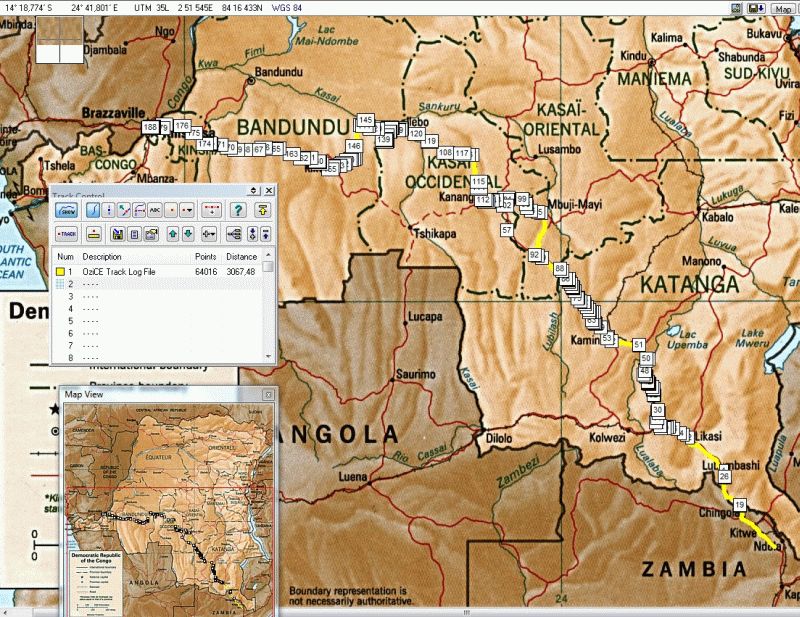
You can see from our track that we covered 3067km in total. While the road should actually be something like 2300km.
A note on the road, if you are planning to drive yourself: the situation has changed quite a bit since 2008. You might have noticed we had most problems north of Kananga. We had little choice at the time because of the "coupeurs de route" and because the ferry in Tshikapa was not functional.
Last I heard is that the ferry is back in bussines. The Chinese are also doing some major work on the RN1 between kikwit and Tshikapa. Quite a bit is tarred now. The road between Tshikapa and Kananga is notoriously muddy.
Mbuji-Mayi to Lubumbashi wil be pretty much the unchanged since we were there. It's hard but doable (preferably outside the rainy season). Most of the terrain is sandy. If you do decide to go via Ilebo, do not forget to have 2 batteries handy to start the ferry.
Ofcourse, always check the security situation, the best information can be had locally. Do not trust sources who are not actually in the country, they usually have no idea.
More information coming up as soon as I have sorted the waypoints out. (And yes, a bit of info on the car is still coming.. as promised ;-) )

You can see from our track that we covered 3067km in total. While the road should actually be something like 2300km.
A note on the road, if you are planning to drive yourself: the situation has changed quite a bit since 2008. You might have noticed we had most problems north of Kananga. We had little choice at the time because of the "coupeurs de route" and because the ferry in Tshikapa was not functional.
Last I heard is that the ferry is back in bussines. The Chinese are also doing some major work on the RN1 between kikwit and Tshikapa. Quite a bit is tarred now. The road between Tshikapa and Kananga is notoriously muddy.
Mbuji-Mayi to Lubumbashi wil be pretty much the unchanged since we were there. It's hard but doable (preferably outside the rainy season). Most of the terrain is sandy. If you do decide to go via Ilebo, do not forget to have 2 batteries handy to start the ferry.
Ofcourse, always check the security situation, the best information can be had locally. Do not trust sources who are not actually in the country, they usually have no idea.
More information coming up as soon as I have sorted the waypoints out. (And yes, a bit of info on the car is still coming.. as promised ;-) )
Funny but you are right, we have very few picturs of our tent deployed. I guess it's a bit like taking pictures of your own house... I have never done that either. Strange...
Here's one from another country (Benin) in a more relaxed mode ;-)
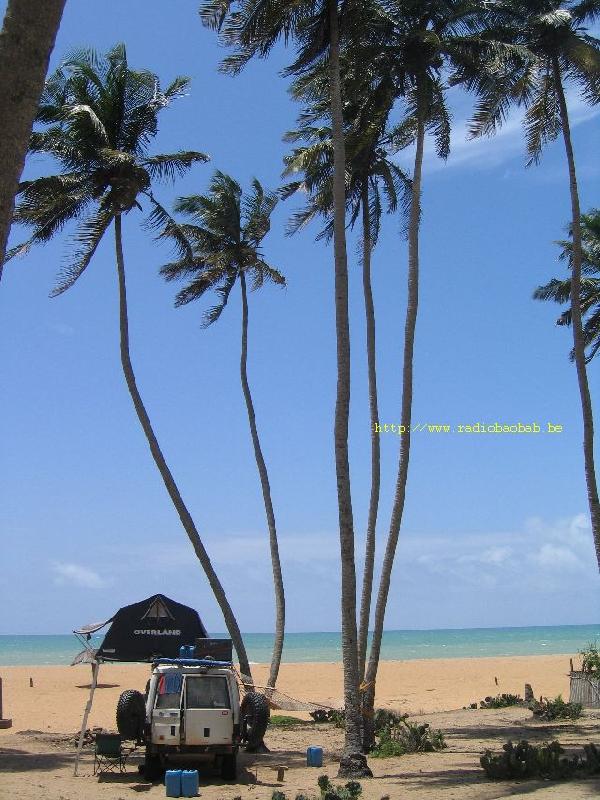
Those are some very cool drawings by the way! Thanks!
Thanks
to everybody for leaving comments, we really appreciate it. The amount
of attention this trip report is getting is insane!
A quick round of answers to some questions. Sorry for not replying to everybody personally, we do read everything!
a
Don't forget there is this live session next Sunday. We are curious to how that will work out!
A quick round of answers to some questions. Sorry for not replying to everybody personally, we do read everything!
Not "none", but it's close. The picture many people have of wildlife roaming everywhere is a picture drawn by documentaries in the wildparks of Eastern and Southern Africa. Most of Central (and western) Africa has very little wildlife left. I mean the traditional, spectacular wildlife (lions, elephant, ..). Congo is the only country in the world where one can still encounter Okapi's and is home to some of the last remaining Gorilla's. But the bulk of animals is gone. Eaten, poached, ... . And what remains stays well clear of humans.
Thanks for the tip, it would be an apt name indeed. But, to me, it feels funny to name cars. I will explain it a bit more when I talk about the car and its equipment (soon).
In that particular case I think we drove around it. Cut a way trough the bush. It really depends on the situation. Sometimes it is quicker and easier to just drive trough the bog. Sometimes it is easier to create a detour. Sometimes one takes the wrong decision too ;-)
Thanks I guess ;-) I like to believe that too. Although I have the feeling I have only had a little glimpse of the world. It made me even more curious. It made me realize I do not understand most of what I have seen. It gave me many answers, but even more new questions. Often I am jealous about people who are content with their little world, often not bigger then their own town (I am talking about most people in the 'first world'), oblivious to what is happening in the rest of the world. It make life so much simpler!
You have no idea how happy and proud that makes us. We sincerely hope you make 'your trip' one day and enjoy every minute of it!
It crossed our mind briefly, but I did not really seriously consider it. Experiments like this take time and effort, so we only tried 'new things' when we believed it had a fair chance of succes. If it were just a straight hill, sure. But the tracks was often very narrow with little room for driving mistakes. And mistakes were always punished hard by getting stuck or tipping over.
Nothing serious. The usual 'traveller problems' occured frequently and sometimes for long periods. A few cuts and bruises from time to time. We had an extensive medical kit with us, but we barely used anything from it. In general I would say we were much healthier while travelling then we were/are at home. The outdoor life and lack of stress I guess.
a
Don't forget there is this live session next Sunday. We are curious to how that will work out!
Sorry for the lack of updates the last few days, we've been terribly busy (planing trips :sombrero: ).
Last night we had a test for the "Overland Live" session this Sunday. We will surely address some (most) of the questions asked here. Tickets are still available, but you need register in advance(free). Hope to see you then?
http://overland-live.com/podcast.htm
Last night we had a test for the "Overland Live" session this Sunday. We will surely address some (most) of the questions asked here. Tickets are still available, but you need register in advance(free). Hope to see you then?
http://overland-live.com/podcast.htm
Hi
guys, thanks again for all the great feedback! Apologies for our
silence of the last weeks. We spent some much needed time in Marocco...
With our Landcruiser ofcourse ;-)
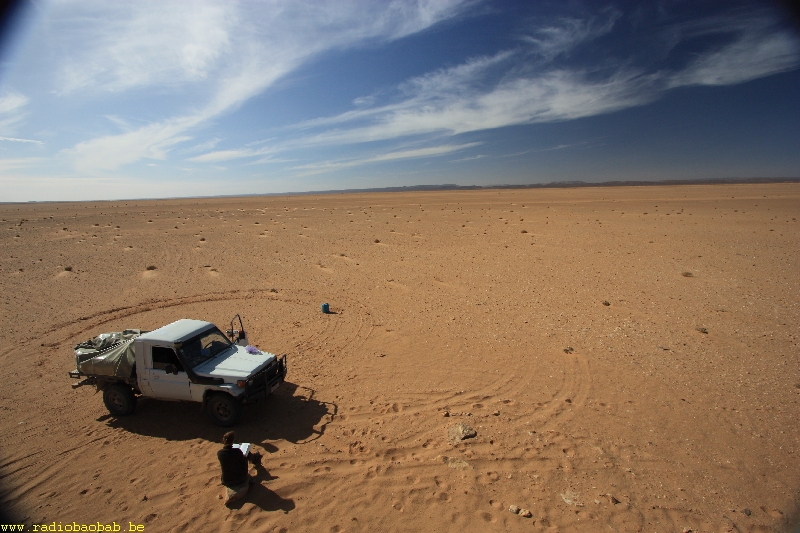
I still owe you guys two posts: one with practicalities about the route (gps info,..) and one with a bit more info about equipment. It will not be for this week, but it's coming... soon(ish).

I still owe you guys two posts: one with practicalities about the route (gps info,..) and one with a bit more info about equipment. It will not be for this week, but it's coming... soon(ish).
I really ought to start a few new threads... So many things to tell, so little time.
A teaser of the evolution:
From this
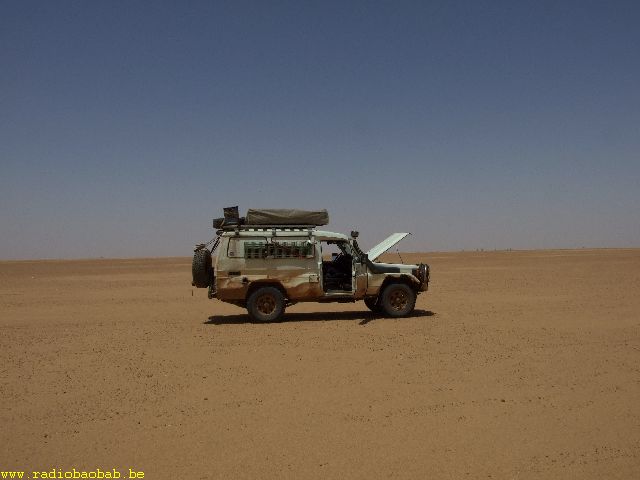
To this
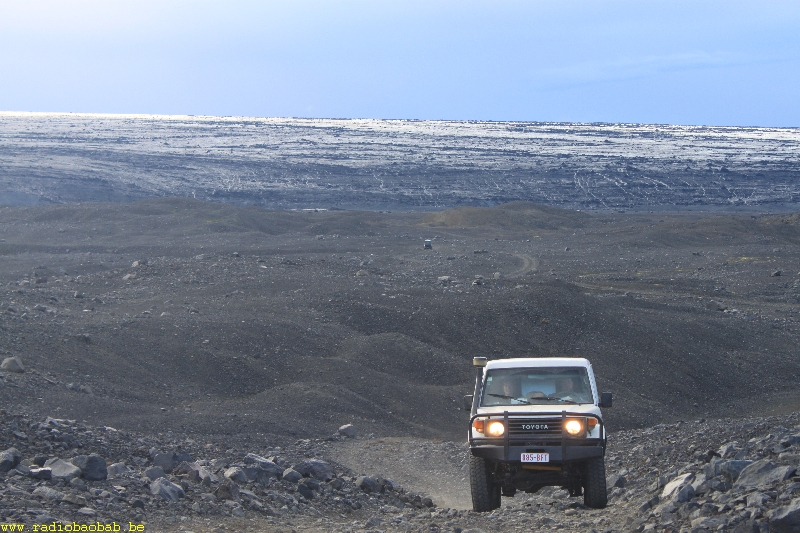
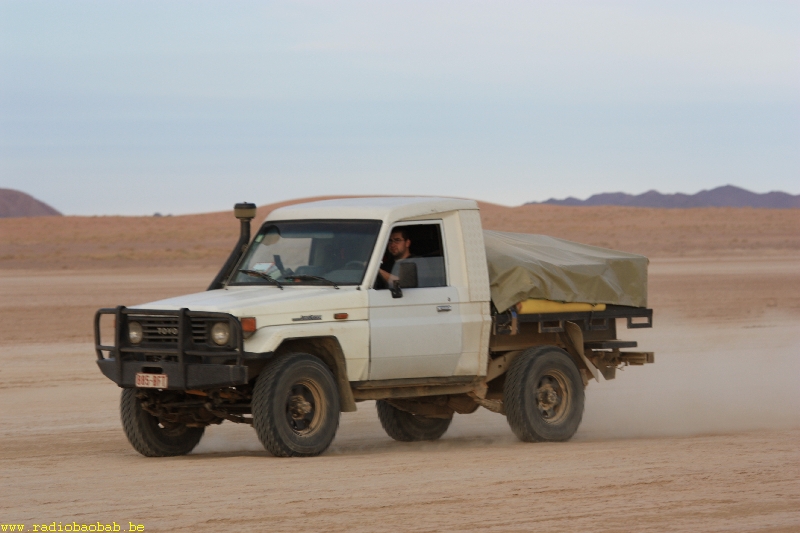
To this
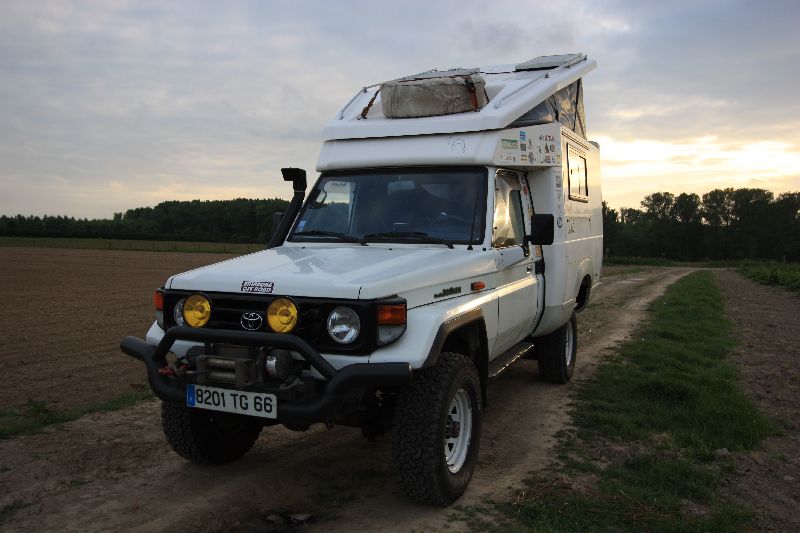
Yes, that is a winch you see! It's broken though... ;-)
A teaser of the evolution:
From this

To this


To this

Yes, that is a winch you see! It's broken though... ;-)
I might take you up on that offer one day. I am an avid fan of the desert.
We have an Azalai now. Not the lababouch, but the dedicated one. I love it, provides a huge amount of comfort in a small package. For me this is about as big as I want my vehicle to be (for now, maybe one day you'll see mee driving in a huge truck... or on a bicycle..). I cannot really fault it up until now. Only problem for me is the legroom in the bed area, but this is specific to my model (they made changes in later models). I am planning to make some changes in the way the bed is organised to fix that.
Great prospect you have. Enjoy every minute of it!
(sorry for the off topic in my own thread :-o )
